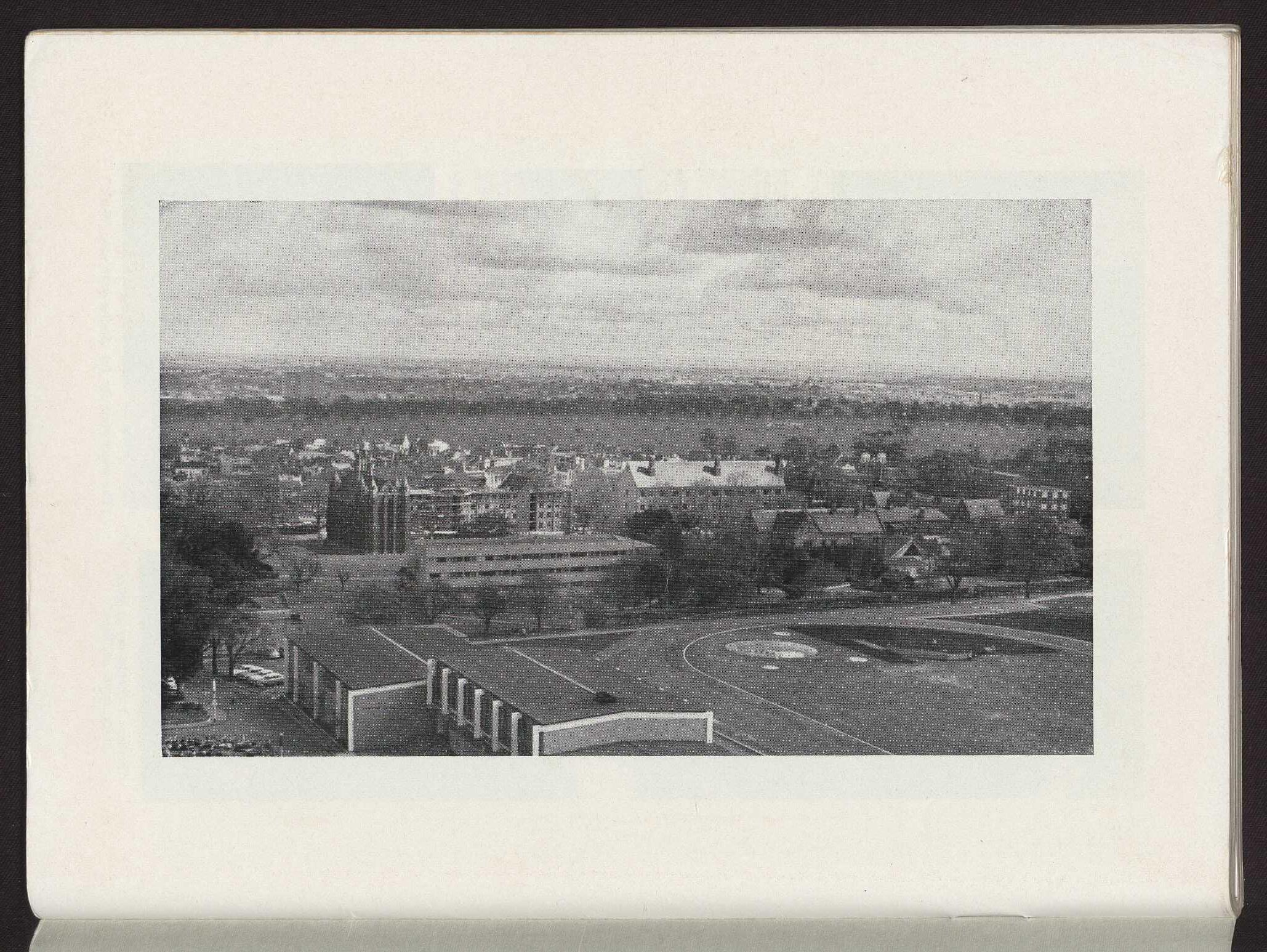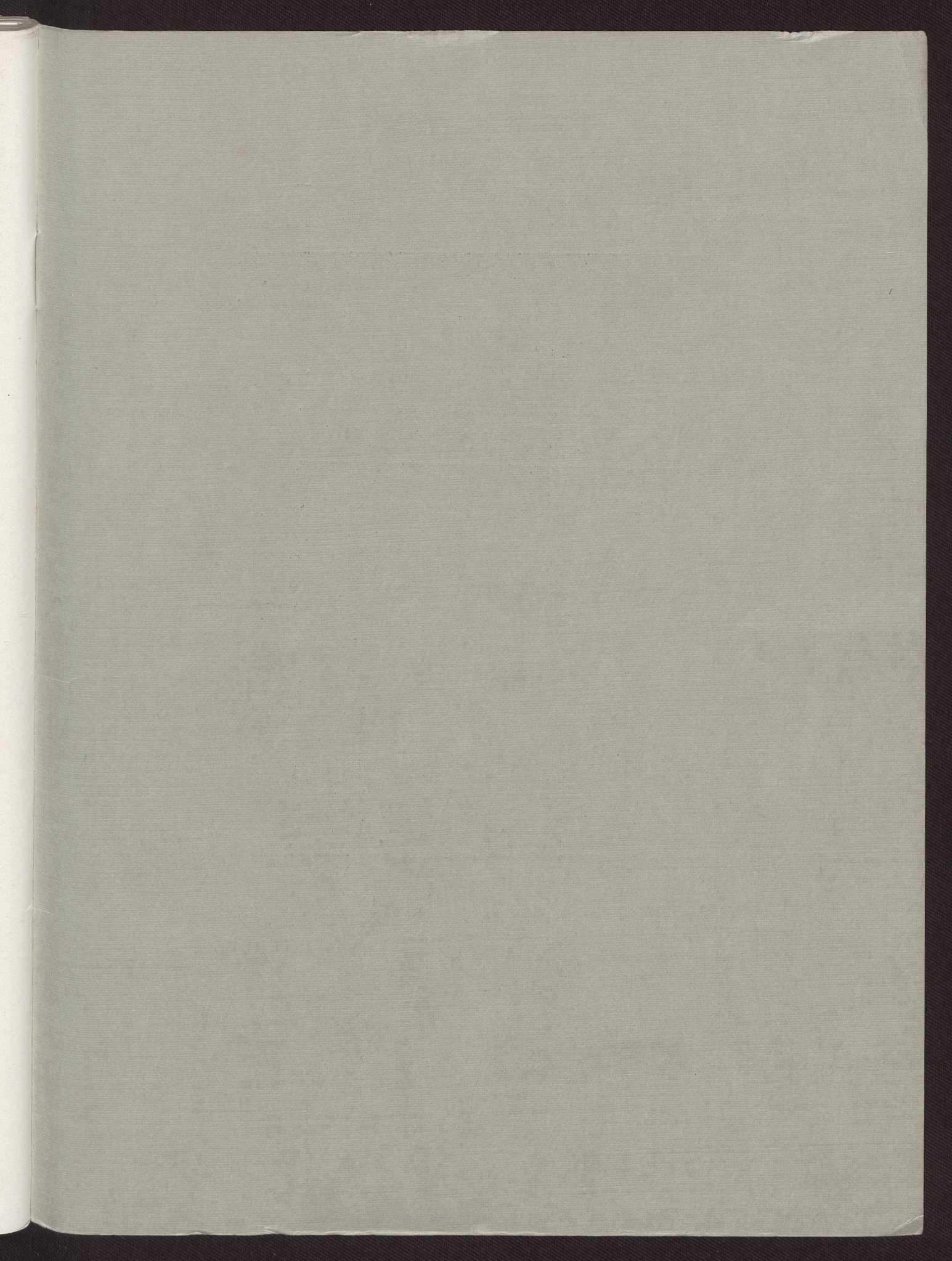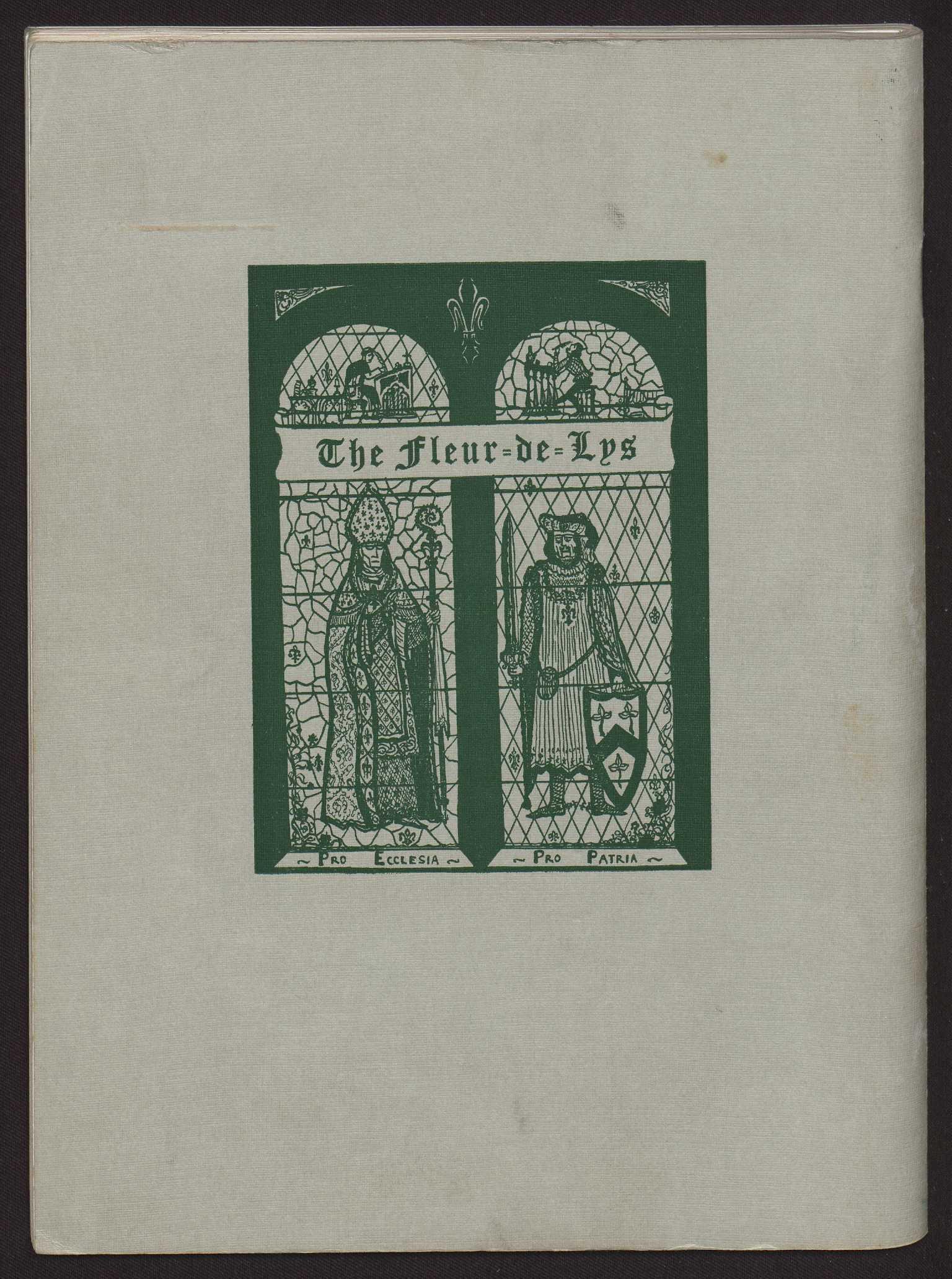
november mcmlxiv
Registered at G..P8s H O., Melbourne, for transmissionby post as a periodical +



november mcmlxiv
Registered at G..P8s H O., Melbourne, for transmissionby post as a periodical +

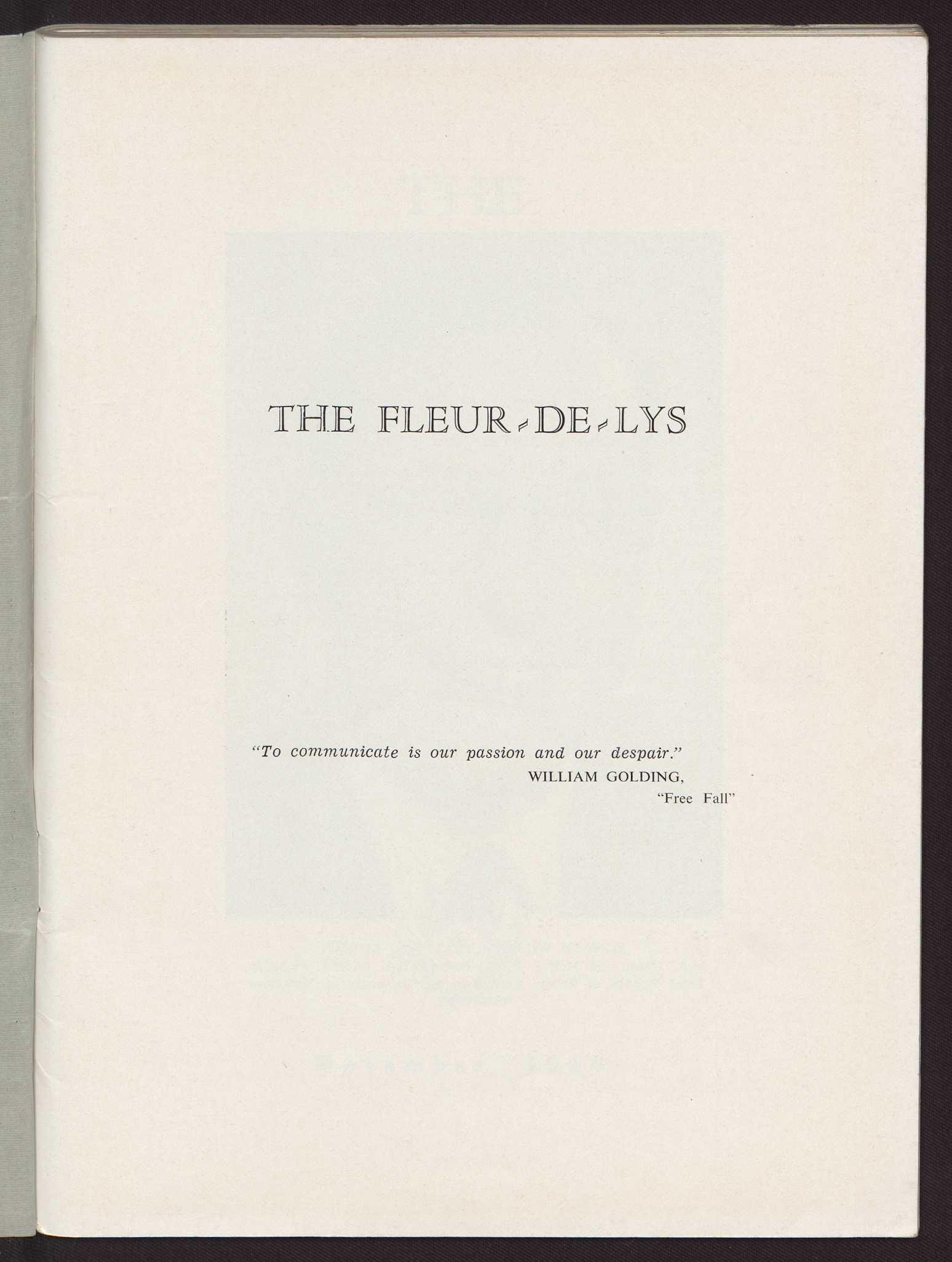
"To communicate is our passion and our despair."
WILLIAM
GOLDING, "Free Fall"
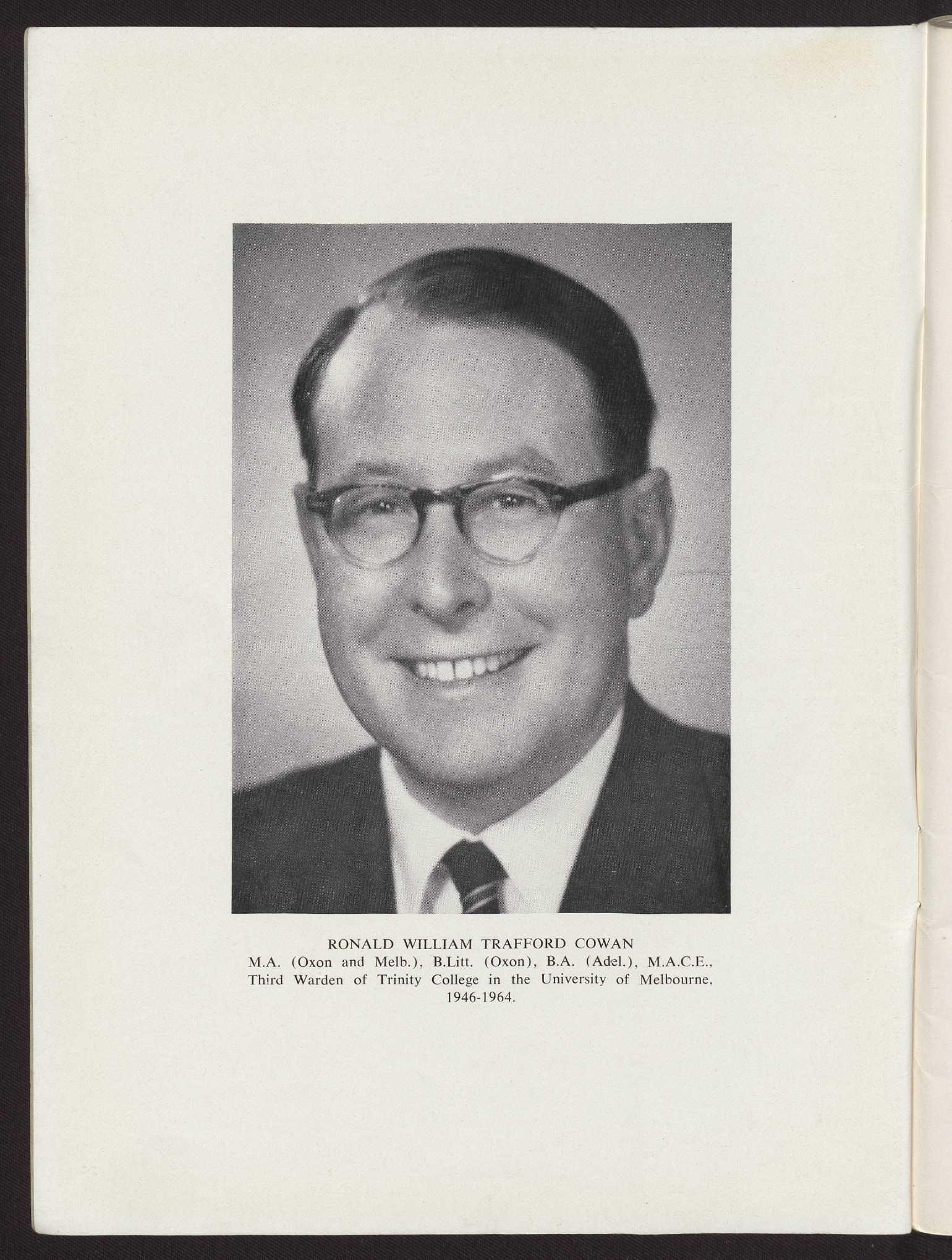
the University of Melbourne, 1946-1964.
The Magazine of Trinity College and Janet Clarke Hall in the University of Melbourne
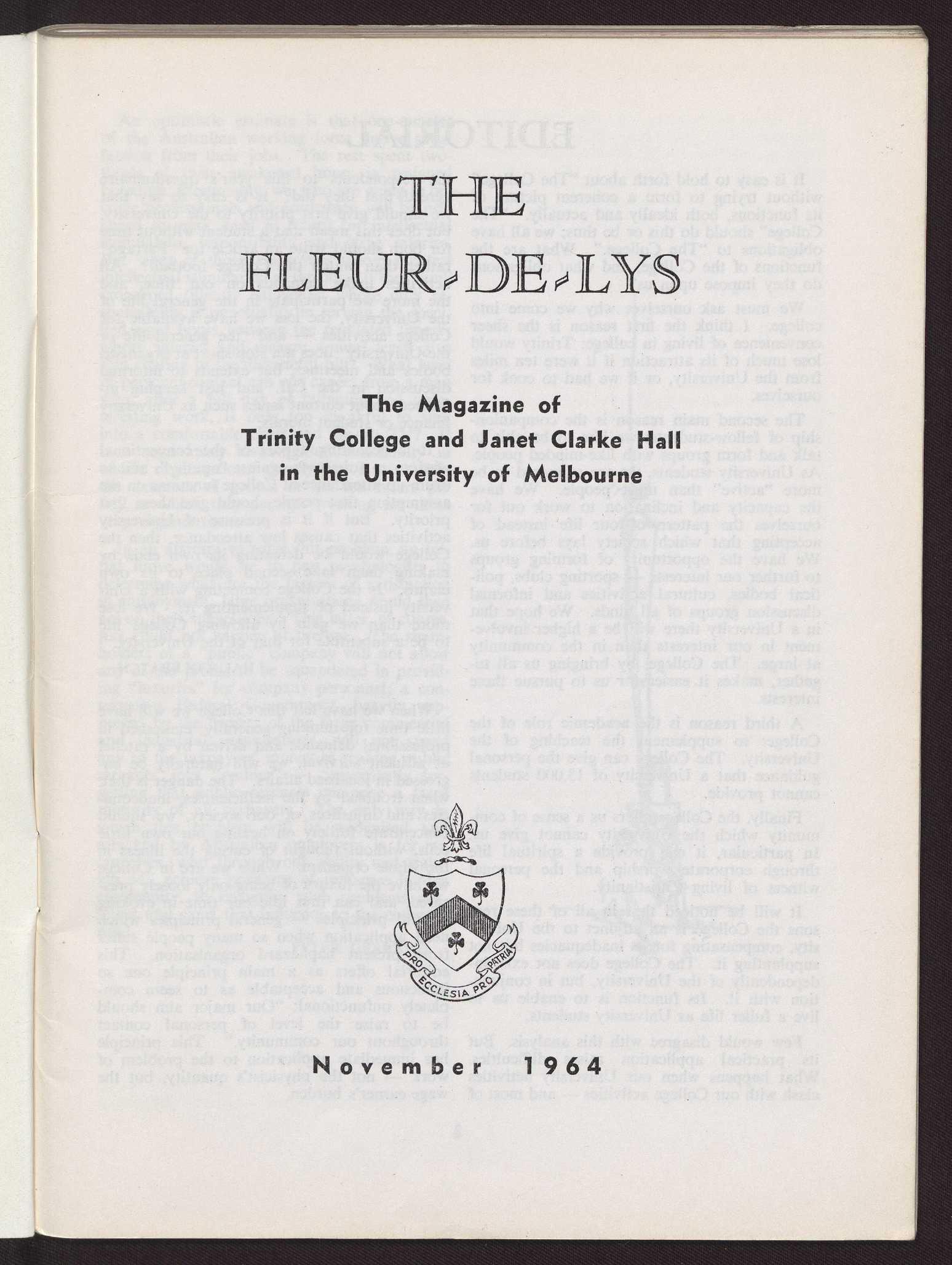
November 1964
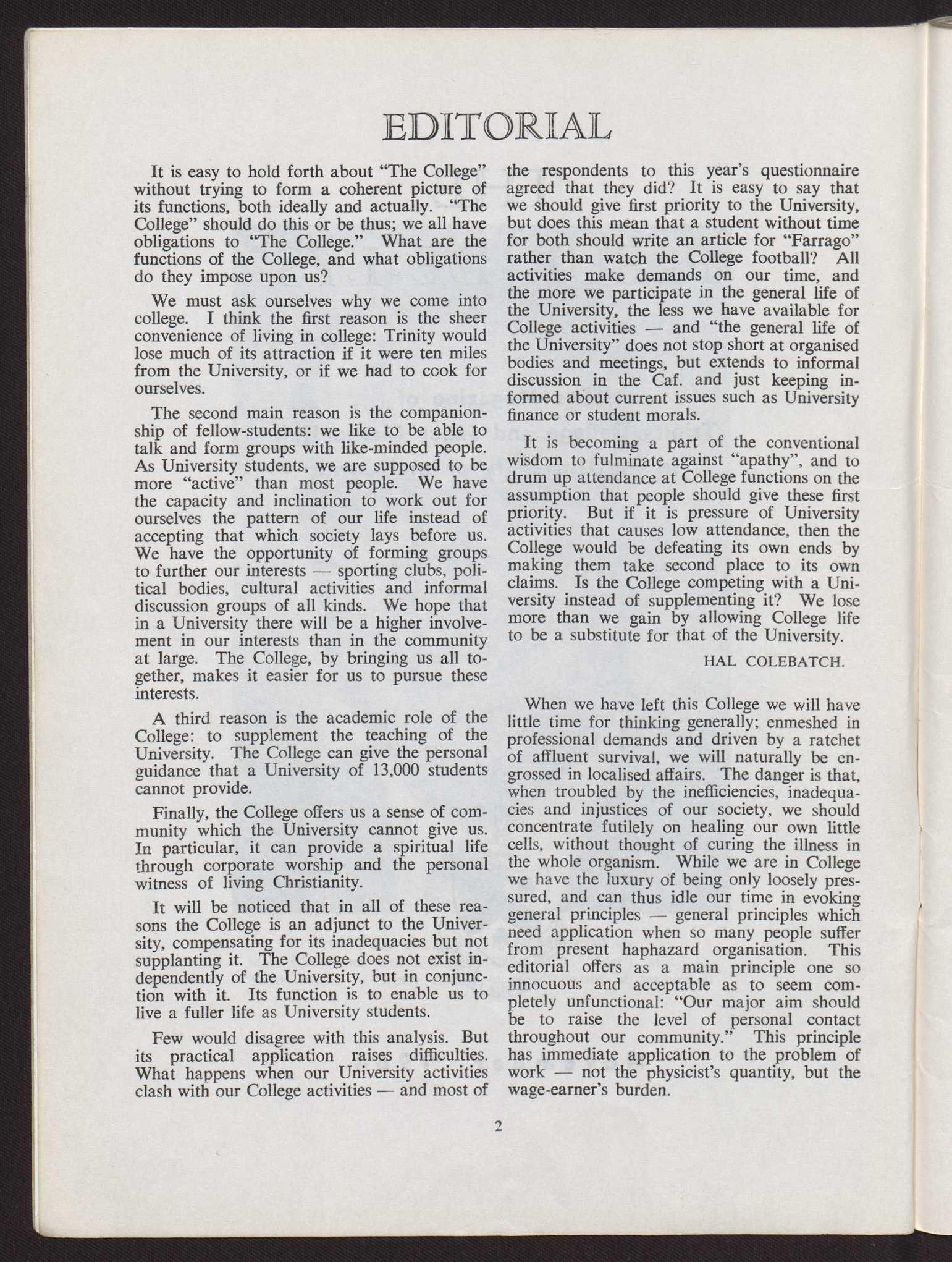
It is easy to hold forth about "The College" without trying to form a coherent picture of its functions, both ideally and actually. "The College" should do this or be thus; we all have obligations to "The College." What are the functions of the College, and what obligations do they impose upon us?
We must ask ourselves why we come into college. I think the first reason is the sheer convenience of living in college: Trinity would lose much of its attraction if it were ten miles from the University, or if we had to cook for ourselves.
The second main reason is the companionship of fellow-students: we like to be able to talk and form groups with like-minded people. As University students, we are supposed to be more "active" than most people. We have the capacity and inclination to work out for ourselves the pattern of our life instead of accepting that which society lays before us. We have the opportunity of forming groups to further our interests — sporting clubs, political bodies, cultural activities and informal discussion groups of all kinds. We hope that in a University there will be a higher involvement in our interests than in the community at large. The College, by bringing us all together, makes it easier for us to pursue these interests.
A third reason is the academic role of the College: to supplement the teaching of the University. The College can give the personal guidance that a University of 13,000 students cannot provide.
Finally, the College offers us a sense of community which the University cannot give us. In particular, it can provide a spiritual life through corporate worship and the personal witness of living Christianity.
It will be noticed that in all of these reasons the College is an adjunct to the University, compensating for its inadequacies but not supplanting it. The College does not exist independently of the University, but in conjunction with it. Its function is to enable us to live a fuller life as University students.
Few would disagree with this analysis. But its practical application raises difficulties. What happens when our University activities clash with our College activities — and most of
the respondents to this year's questionnaire agreed that they did? It is easy to say that we should give first priority to the University, but does this mean that a student without time for both should write an article for "Farrago" rather than watch the College football? All activities make demands on our time, and the more we participate in the general life of the University, the less we have available for College activities — and "the general life of the University" does not stop short at organised bodies and meetings, but extends to informal discussion in the Caf. and just keeping informed about current issues such as University finance or student morals.
It is becoming a part of the conventional wisdom to fulminate against "apathy", and to drum up attendance at College functions on the assumption that people should give these first priority. But if it is pressure of University activities that causes low attendance, then the College would be defeating its own ends by making them take second place to its own claims. Is the College competing with a University instead of supplementing it? We lose more than we gain by allowing College life to be a substitute for that of the University.
HAL COLEBATCH.
When we have left this College we will have little time for thinking generally; enmeshed in professional demands and driven by a ratchet of affluent survival, we will naturally be engrossed in localised affairs. The danger is that, when troubled by the inefficiencies, inadequacies and injustices of our society, we should concentrate futilely on healing our own little cells, without thought of curing the illness in the whole organism. While we are in College we have the luxury of being only loosely pressured, and can thus idle our time in evoking general principles — general principles which need application when so many people suffer from present haphazard organisation. This editorial offers as a main principle one so innocuous and acceptable as to seem completely unfunctional: "Our major aim should be to raise the level of personal contact throughout our community." This principle has immediate application to the problem of work — not the physicist's quantity, but the wage-earner's burden.

An optimistic estimate is that one-quarter of the Australian working force derive satisfaction from their jobs. The rest spent twothirds of their awakened hours in resigned boredom. Presumably, we, who are going to become professionals and academics, will be prepared to work hard in return for intellectual stimulation, responsibility and large salaries. But what of those employees whose greatest intellectual stimulation at the office is the "Sun" crossword (illicitly enjoyed)?: whose only responsibility is punctuality in serving the specified eight hours between the regulated times?: whose salaries and meagre annual leave give thin coating to the distasteful pill? What level of personal contact can one expect from a man who, after a full day of fatiguing and uninteresting work, is only too thankful to sink into a comfortable chair and absorb TV? It is a remarkably short-sighted community in which organisations merely strive to satisfy the demands of people in the few hours per day in which they are not working for these very organisations.
In an attempt to solve this problem, an initial move would be to pay psychologists to determine what are the factors of satisfaction in employment; large organisations would then act on their suggestions. This latter, of course, just could not happen at present. The shareholders of a "public" company will not allow any of the profits to be squandered in providing "luxuries" for company personnel; a conservative Federal Government, heavily supported by the owners of the large commercial and industrial organisations, will not spend any of the taxpayers' money in making public servants' jobs "cushier" — conveniently forgetting that public servants comprise a large minority of all taxpayers. The only way in which this problem will be recognised and attacked by Australian employers is for we ourselves, who through our ability and training will achieve positions of influence in this community, to recognise such problems ourselves and exert that influence to the common weal.
PETER GERRAND.
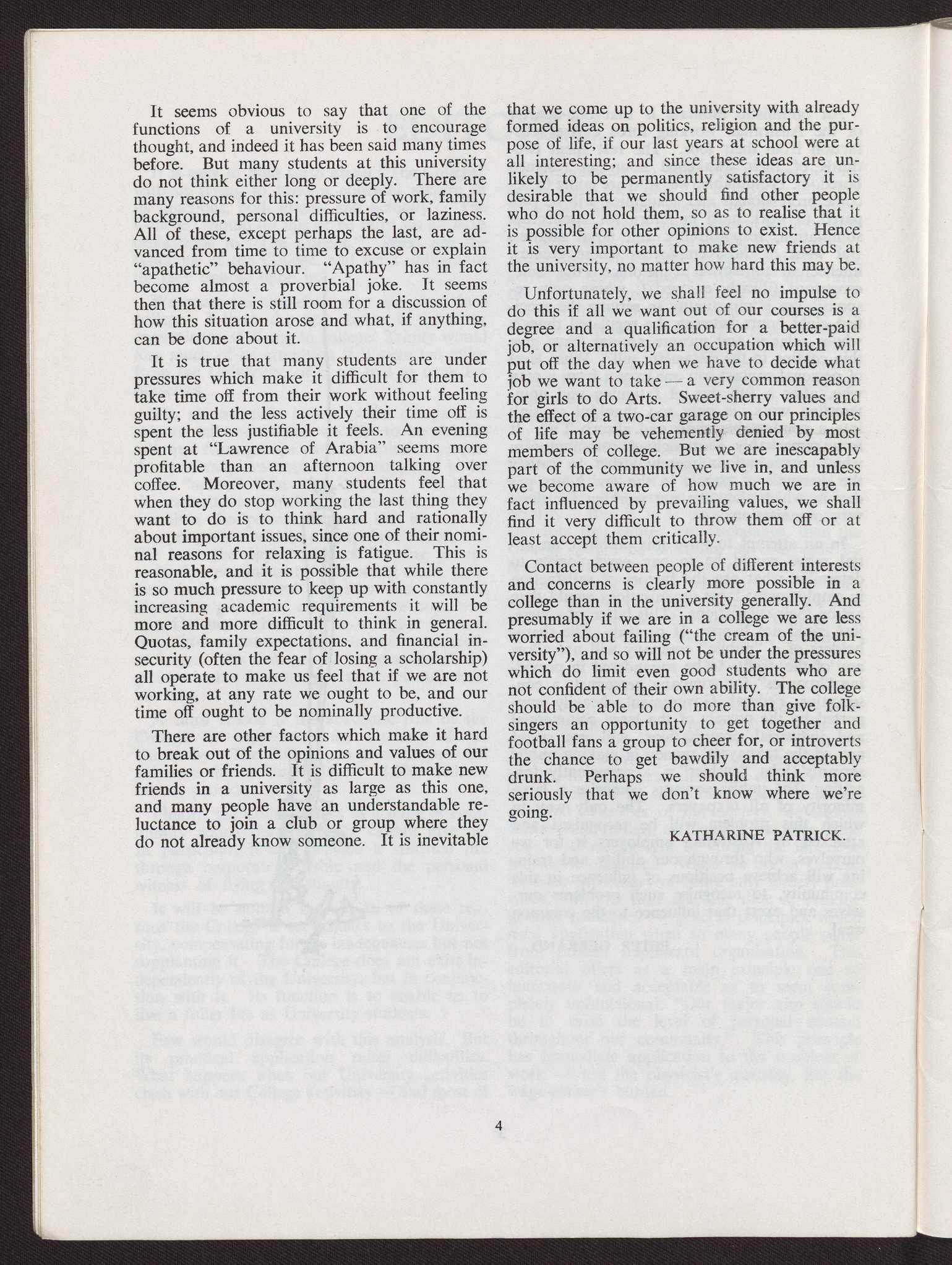
It seems obvious to say that one of the functions of a university is to encourage thought, and indeed it has been said many times before. But many students at this university do not think either long or deeply. There are many reasons for this: pressure of work, family background, personal difficulties, or laziness. All of these, except perhaps the last, are advanced from time to time to excuse or explain "apathetic" behaviour. "Apathy" has in fact become almost a proverbial joke. It seems then that there is still room for a discussion of how this situation arose and what, if anything, can be done about it.
It is true that many students are under pressures which make it difficult for them to take time off from their work without feeling guilty; and the less actively their time off is spent the less justifiable it feels. An evening spent at "Lawrence of Arabia" seems more profitable than an afternoon talking over coffee. Moreover, many students feel that when they do stop working the last thing they want to do is to think hard and rationally about important issues, since one of their nominal reasons for relaxing is fatigue. This is reasonable, and it is possible that while there is so much pressure to keep up with constantly increasing academic requirements it will be more and more difficult to think in general. Quotas, family expectations, and financial insecurity (often the fear of losing a scholarship) all operate to make us feel that if we are not working, at any rate we ought to be, and our time off ought to be nominally productive.
There are other factors which make it hard to break out of the opinions and values of our families or friends. It is difficult to make new friends in a university as large as this one, and many people have an understandable reluctance to join a club or group where they do not already know someone. It is inevitable
that we come up to the university with already formed ideas on politics, religion and the purpose of life, if our last years at school were at all interesting; and since these ideas are unlikely to be permanently satisfactory it is desirable that we should find other people who do not hold them, so as to realise that it is possible for other opinions to exist. Hence it is very important to make new friends at the university, no matter how hard this may be.
Unfortunately, we shall feel no impulse to do this if all we want out of our courses is a degree and a qualification for a better-paid job, or alternatively an occupation which will put off the day when we have to decide what job we want to take — a very common reason for girls to do Arts. Sweet-sherry values and the effect of a two-car garage on our principles of life may be vehemently denied by most members of college. But we are inescapably part of the community we live in, and unless we become aware of how much we are in fact influenced by prevailing values, we shall fmd it very difficult to throw them off or at least accept them critically.
Contact between people of different interests and concerns is clearly more possible in a college than in the university generally. And presumably if we are in a college we are less worried about failing ("the cream of the university"), and so will not be under the pressures which do limit even good students who are not confident of their own ability. The college should be able to do more than give folksingers an opportunity to get together and football fans a group to cheer for, or introverts the chance to get bawdily and acceptably drunk. Perhaps we should think more seriously that we don't know where we're going.
KATHARINE PATRICK.
With the death of Ronald Cowan, an era of College history has ended.
In appreciation of this man, we publish five articles below. The first is of the man and his career: it is the sermon preached at the funeral service in St. Paul's Cathedral by the Chaplain of the College, the Rev. Dr. B. R. Marshall, O.G.S. The other four are of the man as Warden: the authors were members of the College at different periods of his rule. Peter Balmford was a student at Trinity from 1946 to 1949, and a resident tutor from 1950 to 1962. Robe rt Todd (1951-1954) was Senior Student in 1954 and a tutor in 1958. Ian Donaldson (1954-1957) was also Senior Student in his final year. Michael Jones (19571963) was Senior Student in 1960 and 1962.
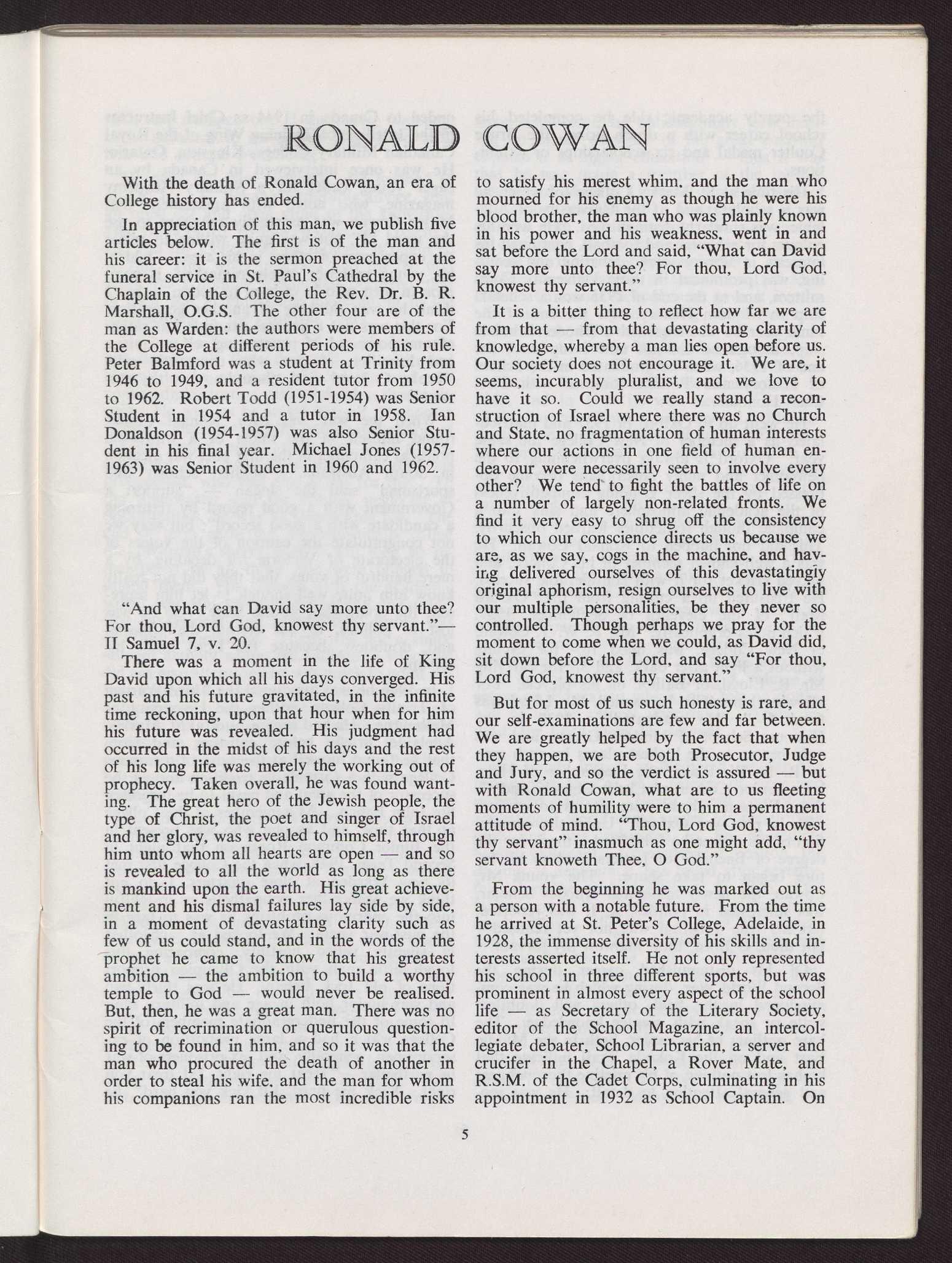
"And what can David say more unto thee? For thou, Lord God, knowest thy servant."— II Samuel 7, v. 20.
There was a moment in the life of King David upon which all his days converged. His past and his future gravitated, in the infinite time reckoning, upon that hour when for him his future was revealed. His judgment had occurred in the midst of his days and the rest of his long life was merely the working out of prophecy. Taken overall, he was found wanting. The great hero of the Jewish people, the type of Christ, the poet and singer of Israel and her glory, was revealed to himself, through him unto whom all hearts are open — and so is revealed to all the world as long as there is mankind upon the earth. His great achievement and his dismal failures lay side by side, in a moment of devastating clarity such as few of us could stand, and in the words of the prophet he came to know that his greatest ambition — the ambition to build a worthy temple to God — would never be realised. But, then, he was a great man. There was no spirit of recrimination or querulous questioning to be found in him, and so it was that the man who procured the death of another in order to steal his wife, and the man for whom his companions ran the most incredible risks
to satisfy his merest whim, and the man who mourned for his enemy as though he were his blood brother, the man who was plainly known in his power and his weakness. went in and sat before the Lord and said, "What can David say more unto thee? For thou, Lord God, knowest thy servant."
It is a bitter thing to reflect how far we are from that — from that devastating clarity of knowledge, whereby a man lies open before us. Our society does not encourage it. We are, it seems, incurably pluralist, and we love to have it so. Could we really stand a reconstruction of Israel where there was no Church and State. no fragmentation of human interests where our actions in one field of human endeavour were necessarily seen to involve every other? We tend' to fight the battles of life on a number of largely non-related fronts. We find it very easy to shrug off the consistency to which our conscience directs us because we are, as we say, cogs in the machine, and having delivered ourselves of this devastatingly original aphorism, resign ourselves to live with our multiple personalities, be they never so controlled. Though perhaps we pray for the moment to come when we could, as David did, sit down before the Lord, and say "For thou, Lord God, knowest thy servant."
But for most of us such honesty is rare, and our self-examinations are few and far between. We are greatly helped by the fact that when they happen, we are both Prosecutor, Judge and Jury, and so the verdict is assured — but with Ronald Cowan, what are to us fleeting moments of humility were to him a permanent attitude of mind. "Thou, Lord God, knowest thy servant" inasmuch as one might add, "thy servant knoweth Thee, O God."
From the beginning he was marked out as a person with a notable future. From the time he arrived at St. Peter's College, Adelaide, in 1928, the immense diversity of his skills and interests asserted itself. He not only represented his school in three different sports, but was prominent in almost every aspect of the school life — as Secretary of the Literary Society, editor of the School Magazine, an intercollegiate debater, School Librarian, a server and crucifer in the Chapel, a Rover Mate, and R.S.M. of the Cadet Corps, culminating in his appointment in 1932 as School Captain. On
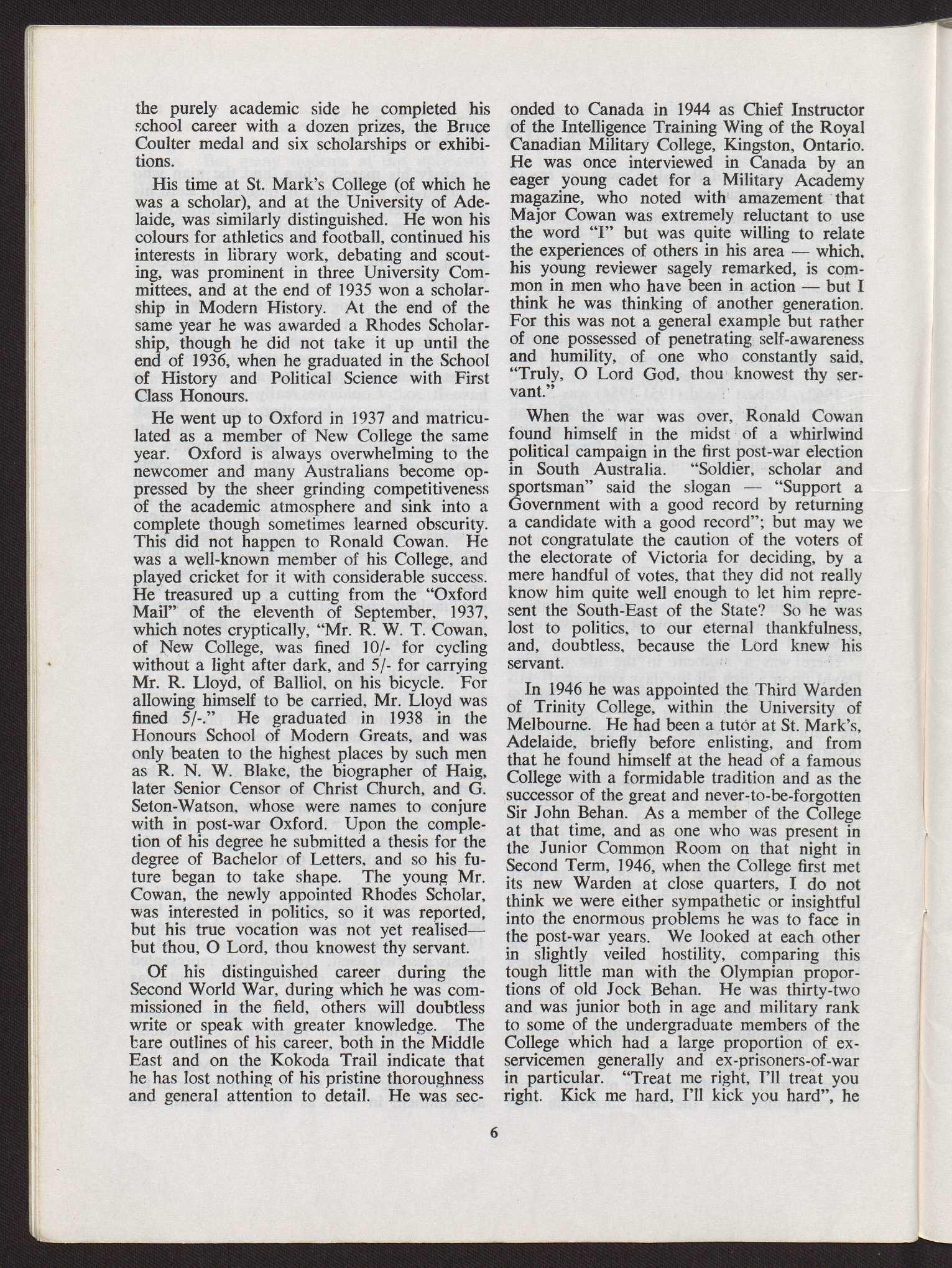
the purely academic side he completed his school career with a dozen prizes, the Bruce Coulter medal and six scholarships or exhibitions.
His time at St. Mark's College (of which he was a scholar), and at the University of Adelaide, was similarly distinguished. He won his colours for athletics and football, continued his interests in library work, debating and scouting, was prominent in three University Committees, and at the end of 1935 won a scholarship in Modern History. At the end of the same year he was awarded a Rhodes Scholarship, though he did not take it up until the end of 1936, when he graduated in the School of History and Political Science with First Class Honours.
He went up to Oxford in 1937 and matriculated as a member of New College the same year. Oxford is always overwhelming to the newcomer and many Australians become oppressed by the sheer grinding competitiveness of the academic atmosphere and sink into a complete though sometimes learned obscurity. This did not happen to Ronald Cowan. He was a well-known member of his College, and played cricket for it with considerable success. He treasured up a cutting from the "Oxford Mail" of the eleventh of September, 1937, which notes cryptically, "Mr. R. W. T. Cowan, of New College, was fined 10/- for cycling without a light after dark, and 5/- for carrying Mr. R. Lloyd, of Balliol, on his bicycle. For allowing himself to be carried, Mr. Lloyd was fined 5/-." He graduated in 1938 in the Honours School of Modern Greats, and was only beaten to the highest places by such men as R. N. W. Blake, the biographer of Haig, later Senior Censor of Christ Church, and G. Seton-Watson, whose were names to conjure with in post-war Oxford. Upon the completion of his degree he submitted a thesis for the degree of Bachelor of Letters, and so his future began to take shape. The young Mr. Cowan, the newly appointed Rhodes Scholar, was interested in politics, so it was reported, but his true vocation was not yet realised— but thou, O Lord, thou knowest thy servant.
Of his distinguished career during the Second World War, during which he was commissioned in the field, others will doubtless write or speak with greater knowledge. The bare outlines of his career, both in the Middle East and on the Kokoda Trail indicate that he has lost nothing of his pristine thoroughness and general attention to detail. He was sec-
onded to Canada in 1944 as Chief Instructor of the Intelligence Training Wing of the Royal Canadian Military College, Kingston, Ontario. He was once interviewed in Canada by an eager young cadet for a Military Academy magazine, who noted with amazement that Major Cowan was extremely reluctant to use the word "I" but was quite willing to relate the experiences of others in his area — which, his young reviewer sagely remarked, is common in men who have been in action — but I think he was thinking of another generation. For this was not a general example but rather of one possessed of penetrating self-awareness and humility, of one who constantly said, "Truly, O Lord God, thou knowest thy servant."
When the war was over, Ronald Cowan found himself in the midst of a whirlwind political campaign in the first post-war election in South Australia. "Soldier, scholar and sportsman" said the slogan — "Support a Government with a good record by returning a candidate with a good record"; but may we not congratulate the caution of the voters of the electorate of Victoria for deciding, by a mere handful of votes, that they did not really know him quite well enough to let him represent the South-East of the State? So he was lost to politics, to our eternal thankfulness, and, doubtless, because the Lord knew his servant.
In 1946 he was appointed the Third Warden of Trinity College, within the University of Melbourne. He had been a tutor at St. Mark's, Adelaide, briefly before enlisting, and from that he found himself at the head of a famous College with a formidable tradition and as the successor of the great and never-to-be-forgotten Sir John Behan. As a member of the College at that time, and as one who was present in the Junior Common Room on that night in Second Term, 1946, when the College first met its new Warden at close quarters, I do not think we were either sympathetic or insightful into the enormous problems he was to face in the post-war years. We looked at each other in slightly veiled hostility, comparing this tough little man with the Olympian proportions of old Jock Behan. He was thirty-two and was junior both in age and military rank to some of the undergraduate members of the College which had a large proportion of exservicemen generally and ex-prisoners-of-war in particular. "Treat me right, I'll treat you right. Kick me hard, I'll kick you hard", he
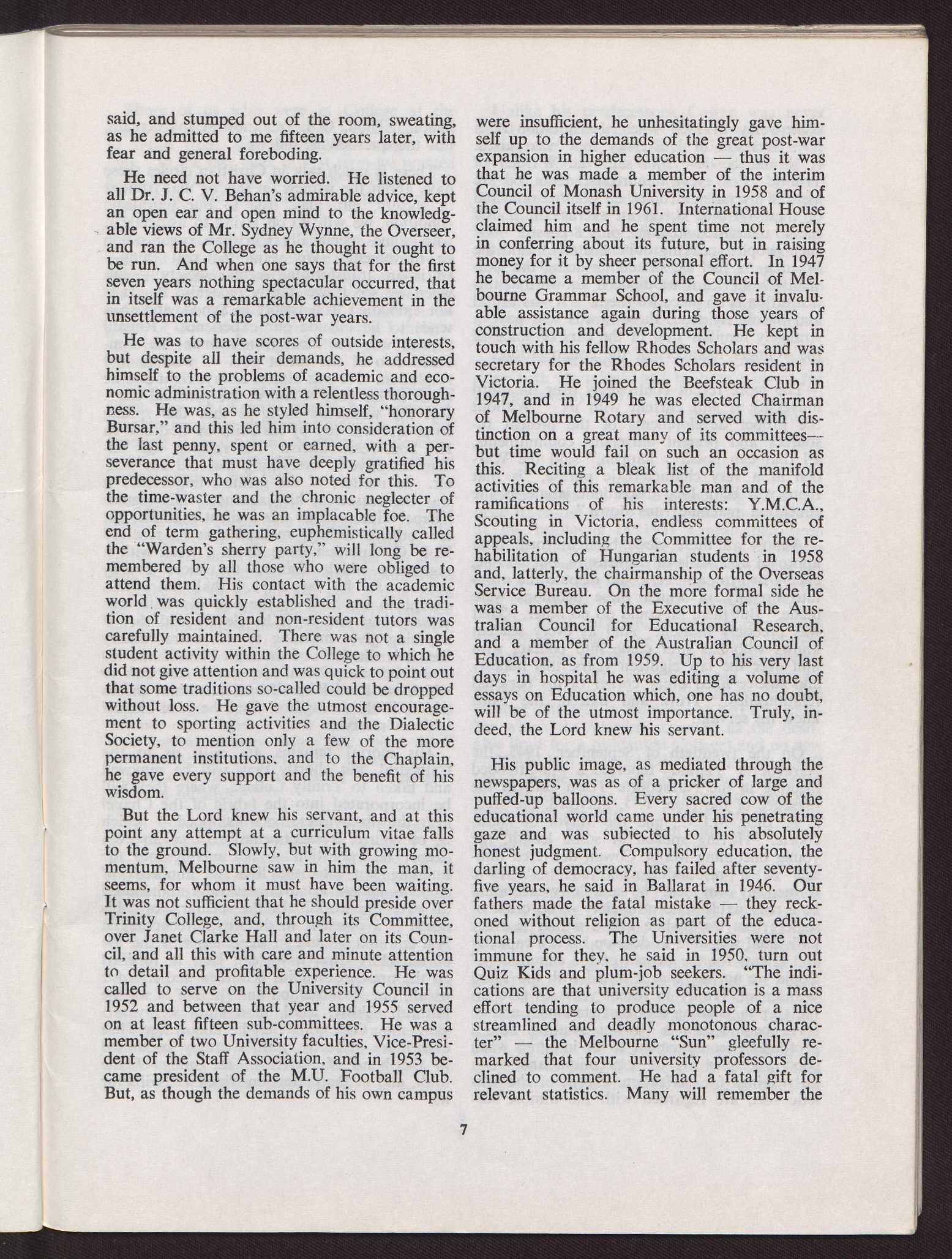
said, and stumped out of the room, sweating, as he admitted to me fifteen years later, with fear and general foreboding.
He need not have worried. He listened to all Dr. J. C. V. Behan's admirable advice, kept an open ear and open mind to the knowledgable views of Mr. Sydney Wynne, the Overseer, and ran the College as he thought it ought to be run. And when one says that for the first seven years nothing spectacular occurred, that in itself was a remarkable achievement in the unsettlement of the post-war years.
He was to have scores of outside interests, but despite all their demands, he addressed himself to the problems of academic and economic administration with a relentless thoroughness. He was, as he styled himself, "honorary Bursar," and this led him into consideration of the Last penny, spent or earned, with a perseverance that must have deeply gratified his predecessor, who was also noted for this. To the time-waster and the chronic neglecter of opportunities, he was an implacable foe. The end of term gathering, euphemistically called the "Warden's sherry party," will long be remembered by all those who were obliged to attend them. His contact with the academic world was quickly established and the tradition of resident and non-resident tutors was carefully maintained. There was not a single student activity within the College to which he did not give attention and was quick to point out that some traditions so-called could be dropped without loss. He gave the utmost encouragement to sporting activities and the Dialectic Society, to mention only a few of the more permanent institutions, and to the Chaplain, he gave every support and the benefit of his wisdom.
But the Lord knew his servant, and at this point any attempt at a curriculum vitae falls to the ground. Slowly, but with growing momentum, Melbourne saw in him the man, it seems, for whom it must have been waiting. It was not sufficient that he should preside over Trinity College, and, through its Committee, over Janet Clarke Hall and later on its Council, and all this with care and minute attention to detail and profitable experience. He was called to serve on the University Council in 1952 and between that year and 1955 served on at least fifteen sub-committees. He was a member of two University faculties, Vice-President of the Staff Association, and in 1953 became president of the M.U. Football Club. But, as though the demands of his own campus
were insufficient, he unhesitatingly gave himself up to the demands of the great post-war expansion in higher education — thus it was that he was made a member of the interim Council of Monash University in 1958 and of the Council itself in 1961. International House claimed him and he spent time not merely in conferring about its future, but in raising money for it by sheer personal effort. In 1947 he became a member of the Council of Melbourne Grammar School, and gave it invaluable assistance again during those years of construction and development. He kept in touch with his fellow Rhodes Scholars and was secretary for the Rhodes Scholars resident in Victoria. He joined the Beefsteak Club in 1947, and in 1949 he was elected Chairman of Melbourne Rotary and served with distinction on a great many of its committees— but time would fail on such an occasion as this. Reciting a bleak list of the manifold activities of this remarkable man and of the ramifications of his interests: Y.M.C.A., Scouting in Victoria, endless committees of appeals, including the Committee for the rehabilitation of Hungarian students in 1958 and, latterly, the chairmanship of the Overseas Service Bureau. On the more formal side he was a member of the Executive of the Australian Council for Educational Research, and a member of the Australian Council of Education, as from 1959. Up to his very last days in hospital he was editing a volume of essays on Education which, one has no doubt, will be of the utmost importance. Truly, indeed, the Lord knew his servant.
His public image, as mediated through the newspapers, was as of a pricker of large and puffed-up balloons. Every sacred cow of the educational world came under his penetrating gaze and was subjected to his absolutely honest judgment. Compulsory education, the darling of democracy, has failed after seventyfive years, he said in Ballarat in 1946. Our fathers made the fatal mistake — they reckoned without religion as part of the educational process. The Universities were not immune for they, he said in 1950, turn out Quiz Kids and plum-job seekers. "The indications are that university education is a mass effort tending to produce people of a nice streamlined and deadly monotonous character" — the Melbourne "Sun" gleefully remarked that four university professors declined to comment. He had a fatal gift for relevant statistics. Many will remember the

controversy in 1953 when the question of a 25% increase of University fees was raised. It should be 33-1/3%, said the Warden of Trinity. For every hundred students, 60 are assisted by outside funds, he pointed out, and of these 60 only 8, on an average, fail. Of the 40 unassisted students, only 8 passed. "Of such people, speaking quite brutally," said the Warden, "I feel we should be doing the University a service if we made it known that this institution is no place for them." It was brutal and absolutely true; those words will have a strangely familiar ring in the ears of some of the younger members of the congregation.
The more recent controversy over the third university is still current with us. "Without the proper developments of the present resources and present university commitments, all that can possibly happen," said the Warden in a very characteristic phrase, "is that there will be a long discordant jangle as the education machine runs down."
Almost all these views brought forth both approval and wails of displeasure, but no one, enemy or sympathiser, could dispute the absolute honesty in which these decisions were made. But then, he could do no other. That was precisely himself. And as every student knows who has ever come into contact with him over the last eighteen years, this honesty and justice filled every corner of his personal relationships. Truly and indeed, the Lord knew his servant.
On the twentieth of September, 1945, the Naracoorte "Herald" reported a well-attended meeting in the Naracoorte Town Hall in the presence of the Hon. T. J. Playford, the Hon. J. L. Bice, M.L.C., and the Mayor of Naracoorte. Having spoken at some length, the young oncoming Major Cowan delivered himself of a resounding platitude. "I have formed my own idea," he said, "of what should be a reasonable state of Society — no order of society was worthwhile unless within it every individual was able to develop his full capacity and talents for the benefit of the community." Could we not say that it rested with the Third Warden of Trinity in recent years to give his life to put meaning into that statement and to leave behind him a blazing example and a profound encouragement to us in times when good examples are at a premium and when all strivings for perfection, except of the athletic sort, are regarded with the utmost sus-
picion. Thou, O Lord, knowest thy servant, but the question is, did we?
There is much talk in Christian circles these days about the witness on this or that frontier of society, but, alas, true to our pluralistic condition, we will go on trying to associate it with some specifically Christian organisation or movement. We want the real thing— Christians transforming secular society — but when we see it we hardly recognise it. It is not embodied in a report to Synod, and so it tends to lie outside our experience. Ronald Cowan was the ideal frontiersman; he combined two of the rarest gifts — wisdom and resolution. He was almost always right and he stuck to his guns whatever the personal costs. But the wondrous thing is that this sprang from and was fed by his faith in God and in His Son, Jesus Christ. His religion was undemonstrative in everything that did not matter. In matters of the greatest importance it was the reason of his existence. His regular Chapel witness alone was a silent example, but few outside College realised that he received Holy Communion three times a week with a regularity which shamed the more overtly ardent. Of his last days I shall not speak, except to say that to the end his faith was unwavering; and let it be clearly said that if anything gives meaning to this extraordinary life, it is the faith of the man himself and his clear and unequivocal response to the task to which our Lord Himself had called him and to which, in the strength of God, he gave himself without reserve.
His mortal remains are with us in the Cathedral, but shortly they will be removed and taken to Trinity College, where they will be incorporated into the fabric of the Chapel near the place where he worshipped — which is, of course, a sacramental sign of an even deeper incorporation — not merely into the building but into the lives of hundreds of students spread all over Australia and indeed all over the world. In the secular world his death is a disaster: in the divine reckoning it is a triumph — and in the context of the life of the Holy Church we can bear it, fortified by the presence of. Him who died and rose for us all, our Resurrection and the life of all the faithful. Truly, Lord, thou knowest thy servant: may God grant that he may know Thee ever more perfectly, until we may be united in the bond of peace, in the unity of the faith, and in the perfection which He wills for us.
Those of us who were in College at the beginning of 1946 knew that Dr. Behan was to retire from the Wardenship before very long. In the last week of first term we noticed a figure wandering round the College with Dr. Behan, and we realised that this must be his successor.
There was the usual end of term dinner, and that was the first occasion at which Cowan formally appeared before us. Behind him, on the wall between the paintings of Leeper and Behan, someone had strung up a small photograph of Cowan — in army uniform, I think— and beneath it the legend "Postera Crescam Laude."
"Wisdom is not, as knowledge is, something which can be directly sought and acquired. Like many other desirable things, it is a byproduct; it is the fruit of balanced development." So Cowan wrote in his brilliant Stawell Oration for 1961.
Wisdom was, in fact, one of the main characteristics of the late Warden — "perhaps the wisest of all my students," wrote G. V. Portus in his autobiography. It was this characteristic which induced so many organisations to make use of his services and which, from the beginning of his time at Trinity, enabled him to direct the affairs of the College so well.
I must confess that Cowan's wisdom was not so apparent to me when a student as it afterwards became. Perhaps it was the same for others, for he seldom sought out students and was not often seen in their studies — except after formal dinners, when he would drink large quantities of port, quite unperturbedly, and then go off to play one of his quarterly games of billiards.
But Cowan had an uncanny knowledge of his students and of what was going on in the College: his sources of information were not obvious, but the most undistinguished of reticent freshmen would be pretty much of an open book to him. He had an amazing knowledge, too, of those who had been members of the College before his time — and not merely of their Christian names, the more sonorous of which he loved to roll around his tongue. The names he might have learned from prolonged study of the College roll, but he knew much more than their names: information as to their academic and subsequent careers and their characters could be produced whenever appropriate.
Unlike his predecessors, Cowan was never faced with the problem of keeping up the numbers of men in College: his problem was to select those who were to be permitted to come into residence. It was no doubt his consciousness of the demand for places in College which led to his somewhat intransigent attitude on matters of discipline and his somewhat ruthless attitude to those who did not employ their talents to full advantage. As he put it in his Stawell Oration, "admission to a university is a privilege which ought not to be wasted on anyone who cannot or will not use it well."
How much more still might Cowan have done with his talents had he been with us for another twenty years.
PETER BALMFORD.
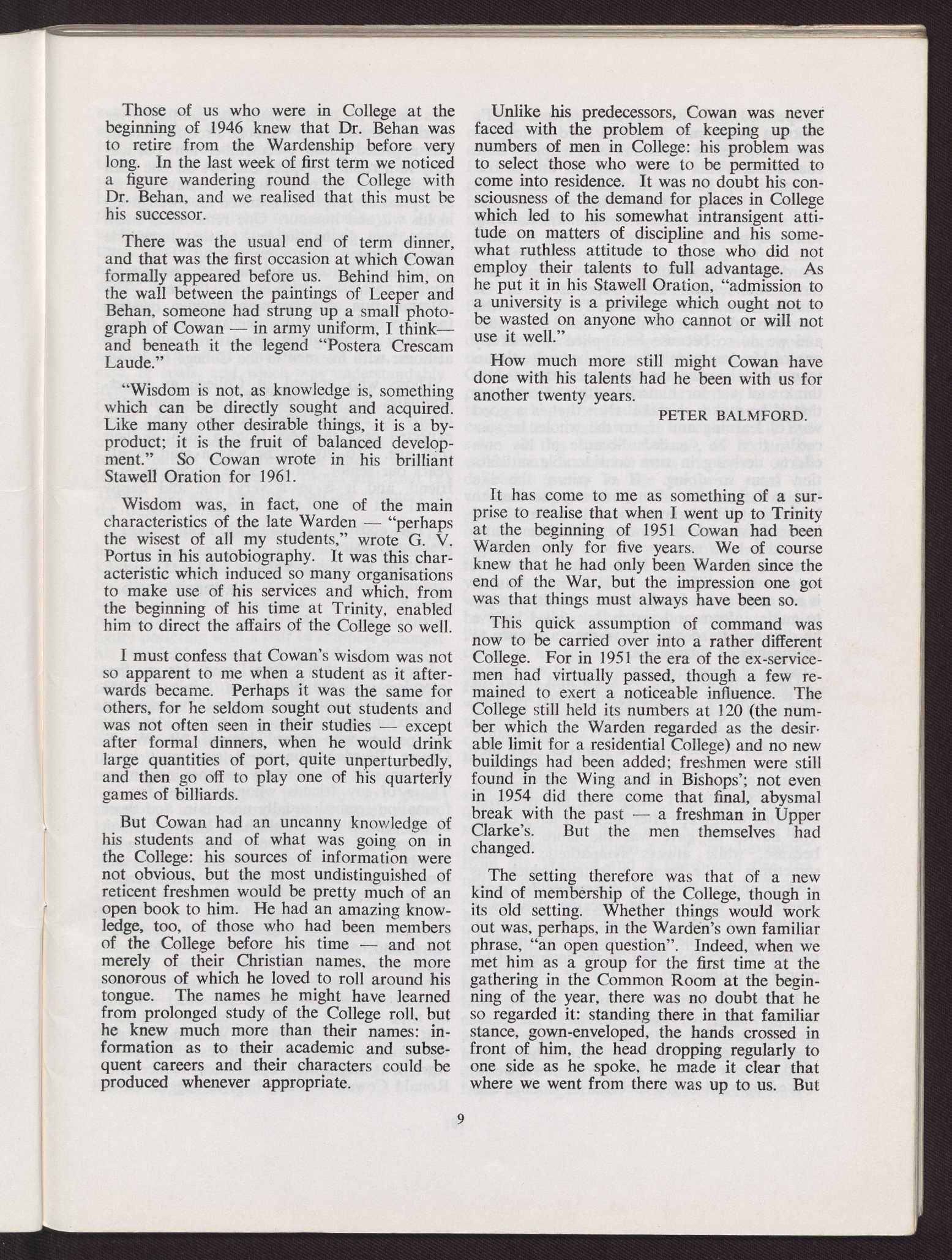
It has come to me as something of a surprise to realise that when I went up to Trinity at the beginning of 1951 Cowan had been Warden only for five years. We of course knew that he had only been Warden since the end of the War, but the impression one got was that things must always have been so.
This quick assumption of command was now to be carried over into a rather different College. For in 1951 the era of the ex-servicemen had virtually passed, though a few remained to exert a noticeable influence. The College still held its numbers at 120 (the number which the Warden regarded as the deskable limit for a residential College) and no new buildings had been added; freshmen were still found in the Wing and in Bishops'; not even in 1954 did there come that final, abysmal break with the past — a freshman in Upper Clarke's. But the men themselves had changed.
The setting therefore was that of a new kind of membership of the College, though in its old setting. Whether things would work out was, perhaps, in the Warden's own familiar phrase, "an open question". Indeed, when we met him as a group for the first time at the gathering in the Common Room at the beginning of the year, there was no doubt that he so regarded it: standing there in that familiar stance, gown-enveloped, the hands crossed in front of him, the head dropping regularly to one side as he spoke, he made it clear that where we went from there was up to us. But
he pointed out that of the previous year's Wooden Wing only four had lived to tell the tale — and left it to us to draw the appropriate conclusion. This was his method, and in following it up he moved with assurance. In striking a balance between what was and what was not permissible, and even more, knowing when to permit on some occasions activities that could not be accepted on others, the Warden was outstanding. There are no doubt those who expect close supervision of his charges from a College head. Those of us who went through Trinity under Cowan know better and we do so because he applied successfully one of his dominant principles, namely, that a man of University age should be expected to think and act for himself, with the corollary that if he makes mistakes then that is a good way of learning and if, on the whole, he succeeds, then he succeeds because of his own efforts, deriving in turn considerable satisfaction from so doing. If of course the axe had to fall, it did. But he always seemed to know the right moment, and because he did in fact have a close knowledge of his men and showed a keen and sympathetic understanding of them, I believe that he dealt justly. It is not on the whole difficult to be a disciplinarian; it is not easy, as the head of a community, simply to guide, inform and watch, but this I believe he did, and in so doing gave men a chance to be masters of themselves.
The extent to which he knew and cared for us was further demonstrated when someone went to him for advice, or simply for a friendly talk, in the years after leaving College. I know that many people did seek him out, and they found in him a source of wise counsel and encouragement. Here again he knew his men, not only from their College days, but also from following their steps after they had left College. The advice he gave was the more valuable because, while always sympathetic, it had sometimes to be frank, a feature which was always apparent in the references he gave. These were much prized, because they owed nothing to a desire to please, and all to a desire to advance the merits and define the limitations of the whole man, in the interest of his proper advancement.
To stop at that point might suggest that he was simply a brooding figure in the background, and this he assuredly was not. He was, above all, a friendly man, and his genial good humour a iov to all. How much we all looked forward to his speeches at College din-
ners and to his conversation and company over a drink afterwards in someone's room. Here he was a prized guest: I remember him particularly in a room in Upper Clarke's on one such occasion, the centre of fantastic conversations as a press of people surrounded him, delighting in his wit and humour. One remembers small things, too: giving the key to that incredible song at dinners with a resounding "Fill ...". Also his billiards match against the Senior Student after a Valedictory Dinner. The determination of a beaming Warden bending (not too easily) over his cue amidst a roaring company of delighted spectators found him at home with his men in the College he loved.
Those who arrived in College as undergraduates at the time of his appointment, mostly as ex-servicemen, perhaps might have expected easy manners from a man of their own age. To my era he was a man twenty years our senior, yet he came among us as a friend, and it is as a very true and happy friend that we shall most remember him.
"The gods from afar look kindly upon a gracious master."
—"The Browning Version", T.C.D.C., 1951. ROBERT TODD.
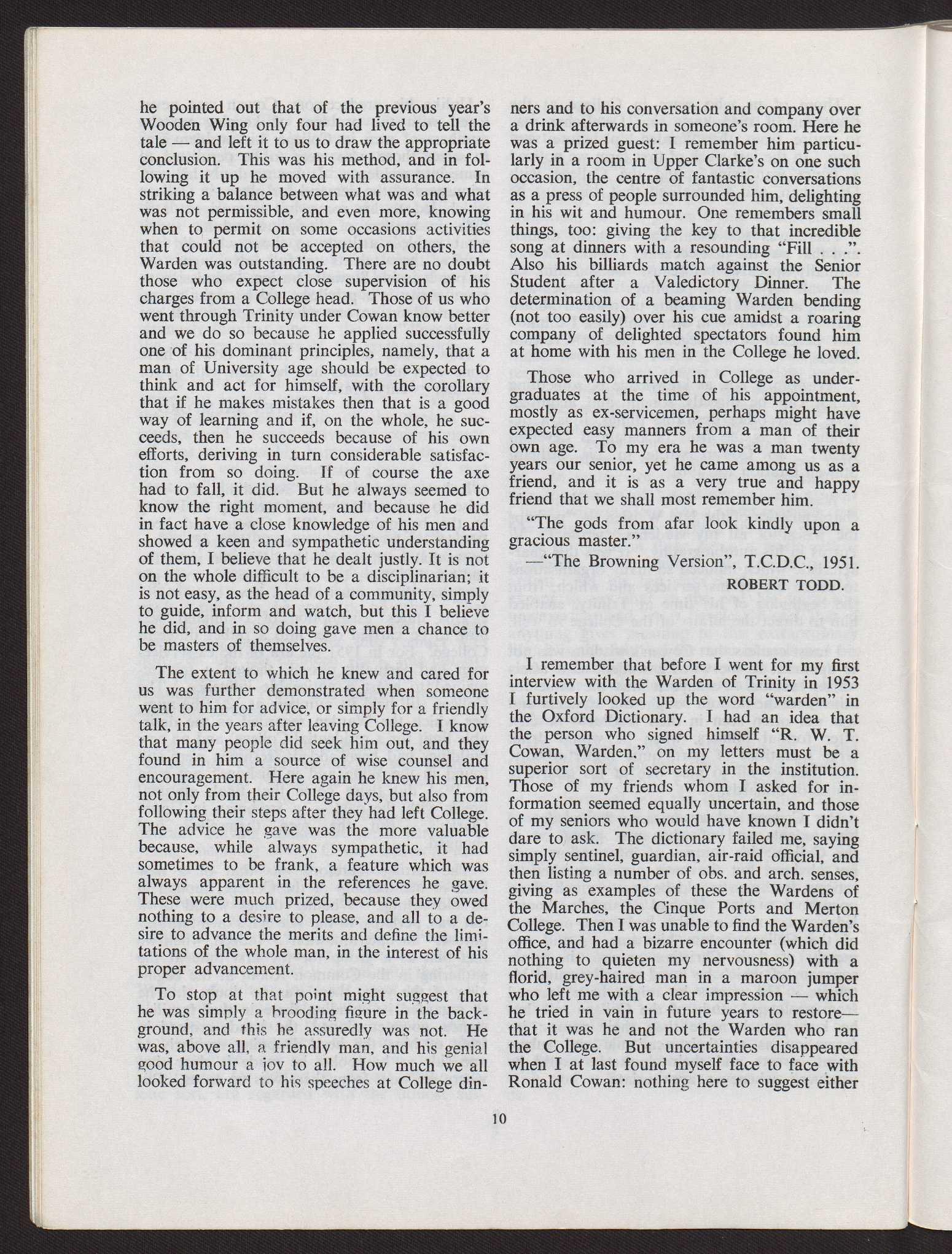
I remember that before I went for my first interview with the Warden of Trinity in 1953 I furtively looked up the word "warden" in the Oxford Dictionary. I had an idea that the person who signed himself "R. W. T. Cowan, Warden," on my letters must be a superior sort of secretary in the institution. Those of my friends whom I asked for information seemed equally uncertain, and those of my seniors who would have known I didn't dare to ask. The dictionary failed me, saying simply sentinel, guardian, air-raid official, and then listing a number of obs. and arch. senses, giving as examples of these the Wardens of the Marches, the Cinque Ports and Merton College. Then I was unable to find the Warden's office, and had a bizarre encounter (which did nothing to quieten my nervousness) with a florid, grey-haired man in a maroon jumper who left me with a clear impression — which he tried in vain in future years to restore— that it was he and not the Warden who ran the College. But uncertainties disappeared when I at last found myself face to face with Ronald Cowan: nothing here to suggest either
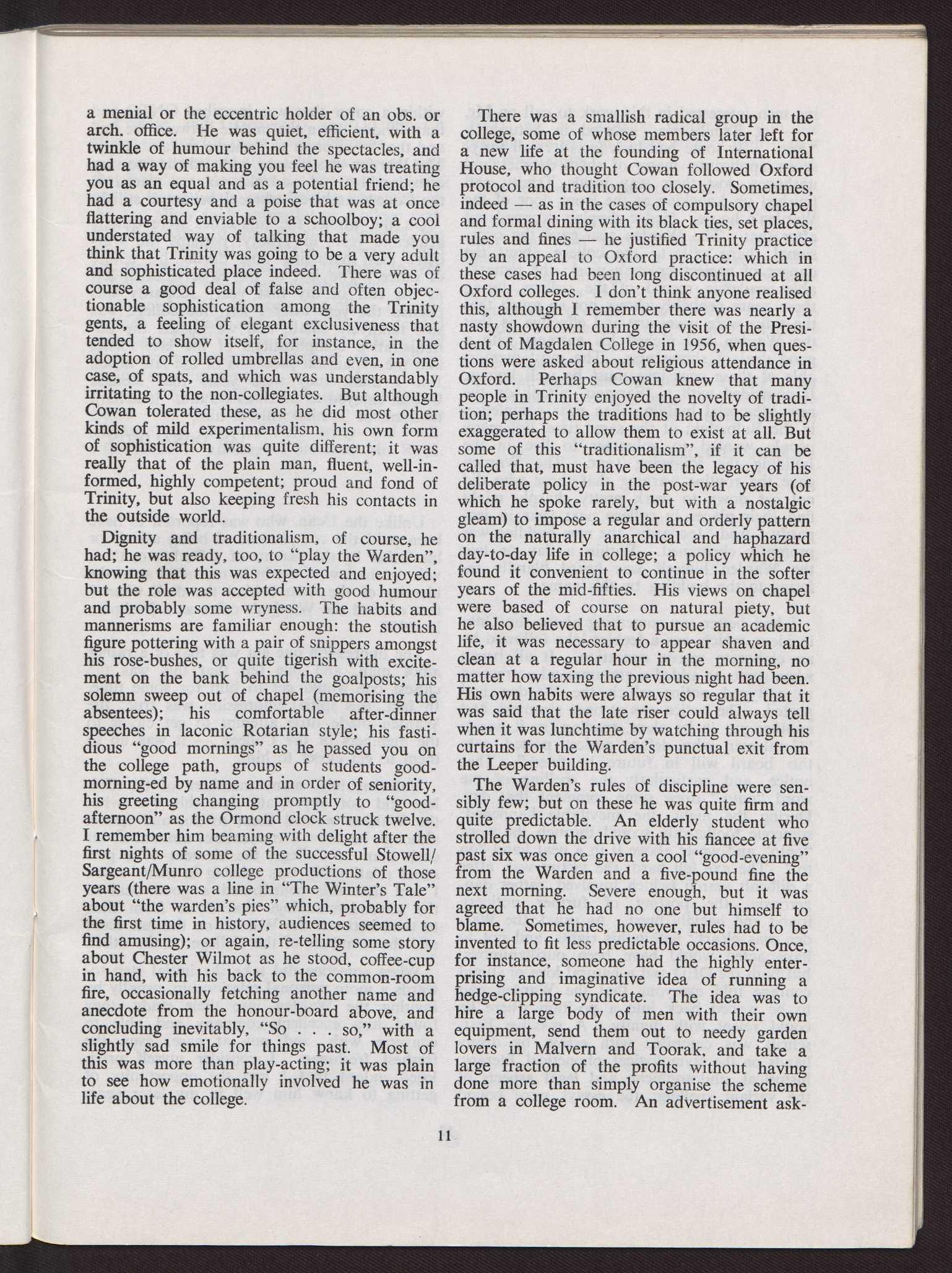
a menial or the eccentric holder of an obs. or arch. office. He was quiet, efficient. with a twinkle of humour behind the spectacles, and had a way of making you feel he was treating you as an equal and as a potential friend; he had a courtesy and a poise that was at once flattering and enviable to a schoolboy; a cool understated way of talking that made you think that Trinity was going to be a very adult and sophisticated place indeed. There was of course a good deal of false and often objectionable sophistication among the Trinity gents, a feeling of elegant exclusiveness that tended to show itself, for instance, in the adoption of rolled umbrellas and even, in one case, of spats, and which was understandably irritating to the non-collegiates. But although Cowan tolerated these, as he did most other kinds of mild experimentalism, his own form of sophistication was quite different; it was really that of the plain man, fluent, well-informed, highly competent; proud and fond of Trinity, but also keeping fresh his contacts in the outside world.
Dignity and traditionalism, of course, he had; he was ready, too, to "play the Warden", knowing that this was expected and enjoyed; but the role was accepted with good humour and probably some wryness. The habits and mannerisms are familiar enough: the stoutish figure pottering with a pair of snippers amongst his rose-bushes, or quite tigerish with excitement on the bank behind the goalposts; his solemn sweep out of chapel (memorising the absentees); his comfortable after-dinner speeches in laconic Rotarian style; his fastidious "good mornings" as he passed you on the college path, groups of students goodmorning-ed by name and in order of seniority, his greeting changing promptly to "goodafternoon" as the Ormond clock struck twelve. I remember him beaming with delight after the first nights of some of the successful Stowell/ Sargeant/Munro college productions of those years (there was a line in "The Winter's Tale" about "the warden's pies" which, probably for the first time in history, audiences seemed to find amusing); or again, re-telling some story about Chester Wilmot as he stood, coffee-cup in hand, with his back to the common-room fire, occasionally fetching another name and anecdote from the honour-board above, and concluding inevitably, "So . . . so," with a slightly sad smile for things past. Most of this was more than play-acting; it was plain to see how emotionally involved he was in life about the college.
There was a smallish radical group in the college, some of whose members later left for a new life at the founding of International House, who thought Cowan followed Oxford protocol and tradition too closely. Sometimes, indeed — as in the cases of compulsory chapel and formal dining with its black ties, set places, rules and fines — he justified Trinity practice by an appeal to Oxford practice: which in these cases had been long discontinued at all Oxford colleges. I don't think anyone realised this, although I remember there was nearly a nasty showdown during the visit of the President of Magdalen College in 1956, when questions were asked about religious attendance in Oxford. Perhaps Cowan knew that many people in Trinity enjoyed the novelty of tradition; perhaps the traditions had to be slightly exaggerated to allow them to exist at all. But some of this "traditionalism", if it can be called that, must have been the legacy of his deliberate policy in the post-war years (of which he spoke rarely, but with a nostalgic gleam) to impose a regular and orderly pattern on the naturally anarchical and haphazard day-to-day life in college; a policy which he found it convenient to continue in the softer years of the mid-fifties. His views on chapel were based of course on natural piety, but he also believed that to pursue an academic life, it was necessary to appear shaven and clean at a regular hour in the morning, no matter how taxing the previous night had been. His own habits were always so regular that it was said that the late riser could always tell when it was lunchtime by watching through his curtains for the Warden's punctual exit from the Leeper building.
The Warden's rules of discipline were sensibly few; but on these he was quite firm and quite predictable. An elderly student who strolled down the drive with his fiancee at five past six was once given a cool "good-evening" from the Warden and a five-pound fine the next morning. Severe enough, but it was agreed that he had no one but himself to blame. Sometimes, however, rules had to be invented to fit less predictable occasions. Once, for instance, someone had the highly enterprising and imaginative idea of running a hedge-clipping syndicate. The idea was to hire a large body of men with their own equipment, send them out to needy garden lovers in Malvern and Toorak, and take a large fraction of the profits without having done more than simply organise the scheme from a college room. An advertisement ask-
ing men interested in this work to call on Mr. at Trinity was inserted in Saturday's "Age." By some bad luck (was it?) all fortyseven applicants, many of them derelict and unshaven, lost their way inside Trinity and finished up knocking at the front door of the Warden's house. Hedge-clipping dropped out after that. The Warden also gave the occasional sharp talk to the college about the danger of neglecting one's work; the remarkable academic record of the college during these years probably shows not so much that the talks were necessary and effective as that the Warden had picked his entrants with a good deal of shrewdness. The most memorable of these occasions must be well known. It coincided with a "Farrago" attack on the new Memorial building then near completion in the Bulpadok; at the same time, not many people wanted to volunteer to live in the building the following year. The Warden gave the routine warning that those who did not get down to work pretty sharply might find their places in college next year in jeopardy. And "Jeopardy" the new building was promptly christened. Within a day or two the Warden himself was heard blandly refering to the building by this name.
I had better say something about the Onto incident, which was a feebler joke followed by an elaborate rescue operation. It all began when someone added a grammatical correction to a typed notice which the Warden had posted. The notice was at once removed, and another put in its place, reading (as it were): "Gentlemen who deface notices posted onto this board will in future be fined." That notice, and particularly the spelling of the word "onto," drew some comment that day. During the night, the inevitable happened: someone foolhardily scored through the word "onto" and wrote above it in a neat hand "on to." The axe fell hard: the victim was, after a difficult search (which involved, rather dangerously, the posting of further notices), found and heavily fined. As usual, the Warden was clearly within his rights, and not to have acted would have been pusillanimous; but both the OED and a natural love of stupid courage told everyone that the Warden had to be wooed back into a position where he could relent with dignity. A massive Festschrift was compiled with essays by divers hands on the etymological, phonetical, literary, historical, philosophical, and legal aspects of the variant spelling; the essays were bound
within a cover that was inscribed ONTO. and that divided down the middle between the "nand the "t" in order to preserve the ambiguity. The Warden was pleased, reduced the fine very considerably, and had the volume placed in the College archives, where I believe it still is..
On the whole, the mid-fifties were quietly academic years in Trinity; perhaps the Warden's least harassing time during his tenure of office. The last of the ex-servicemen left at the end of my first year; Jeopardy was opened the year after I left; the college was still relatively small, and we missed the administrative complications of the late forties and the expansion problems of the late fifties. But I think they were years that Ronald Cowan enjoyed as much as we did. It is hard to think of Trinity without him.
IAN DONALDSON.
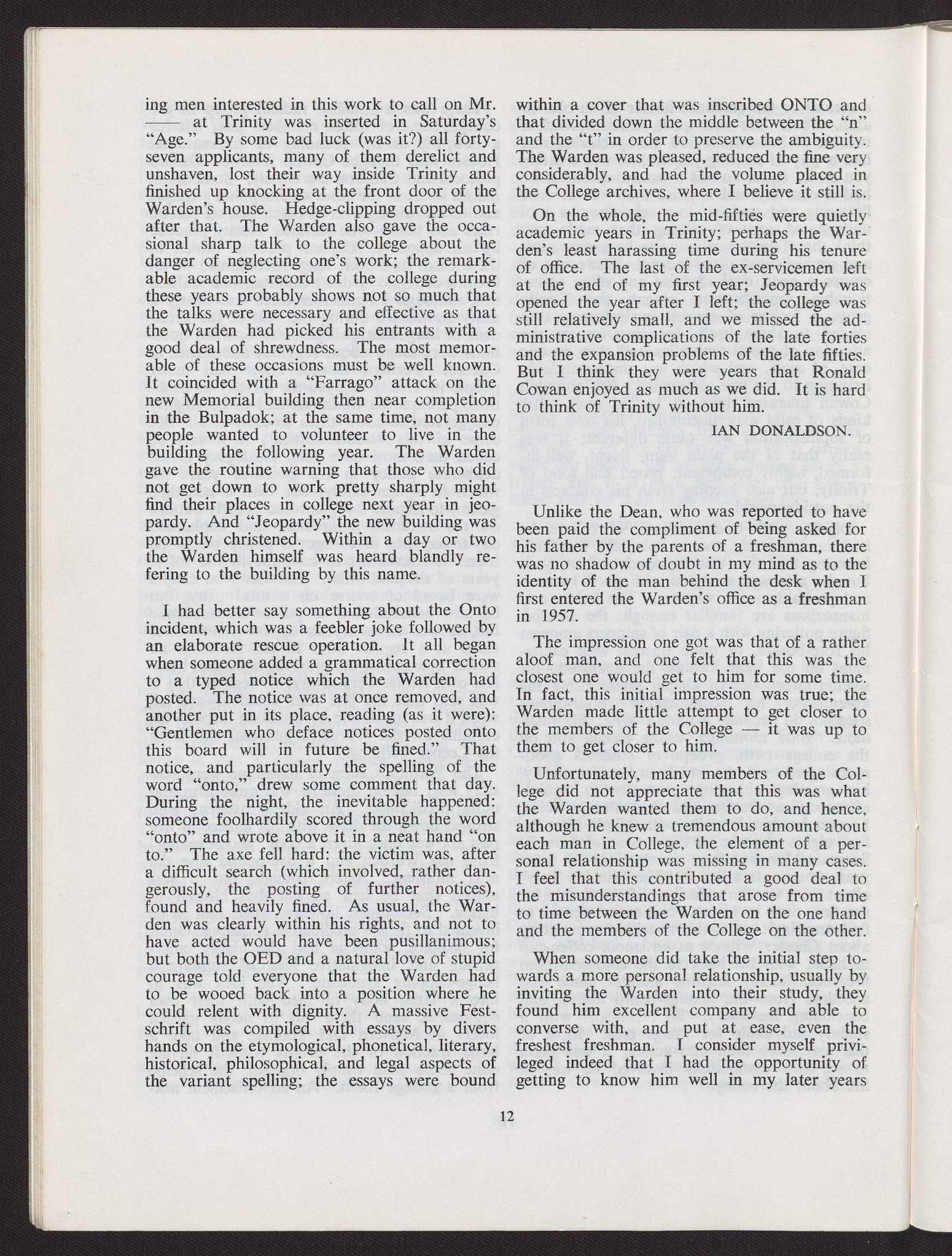
Unlike the Dean, who was reported to have been paid the compliment of being asked for his father by the parents of a freshman, there was no shadow of doubt in my mind as to the identity of the man behind the desk when I first entered the Warden's office as a freshman in 1957.
The impression one got was that of a rather aloof man, and one felt that this was the closest one would get to him for some time. In fact, this initial impression was true; the Warden made little attempt to get closer to the members of the College — it was up to them to get closer to him.
Unfortunately, many members of the College did not appreciate that this was what the Warden wanted them to do, and hence, although he knew a tremendous amount about each man in College, the element of a personal relationship was missing in many cases. I feel that this contributed a good deal to the misunderstandings that arose from time to time between the Warden on the one hand and the members of the College on the other.
When someone did take the initial step towards a more personal relationship, usually by inviting the Warden into their study, they found him excellent company and able to converse with, and put at ease, even the freshest freshman. I consider myself privileged indeed that I had the opportunity of getting to know him well in my later years
in College, and I frequently went to him for advice or just for plain good company.
I cannot pretend that I always agreed with the Warden's decisions — frequently I did not — but it was a great help to learn that he did not allow such antipathy on College matters to descend to any personal animosity. His advice on personal matters was always sound and practical, and those who troubled to seek it found their effort well worth while.
His interest in all facets of College life was genuine and unfailing; he regularly attended meetings of the various Associated Clubs, and was always present to support the College during sporting events.
One of his qualities which everyone appreciated was his ability as an after-dinner speaker: his speeches were witty and wellconstructed — although I did hear Mr. R. K.
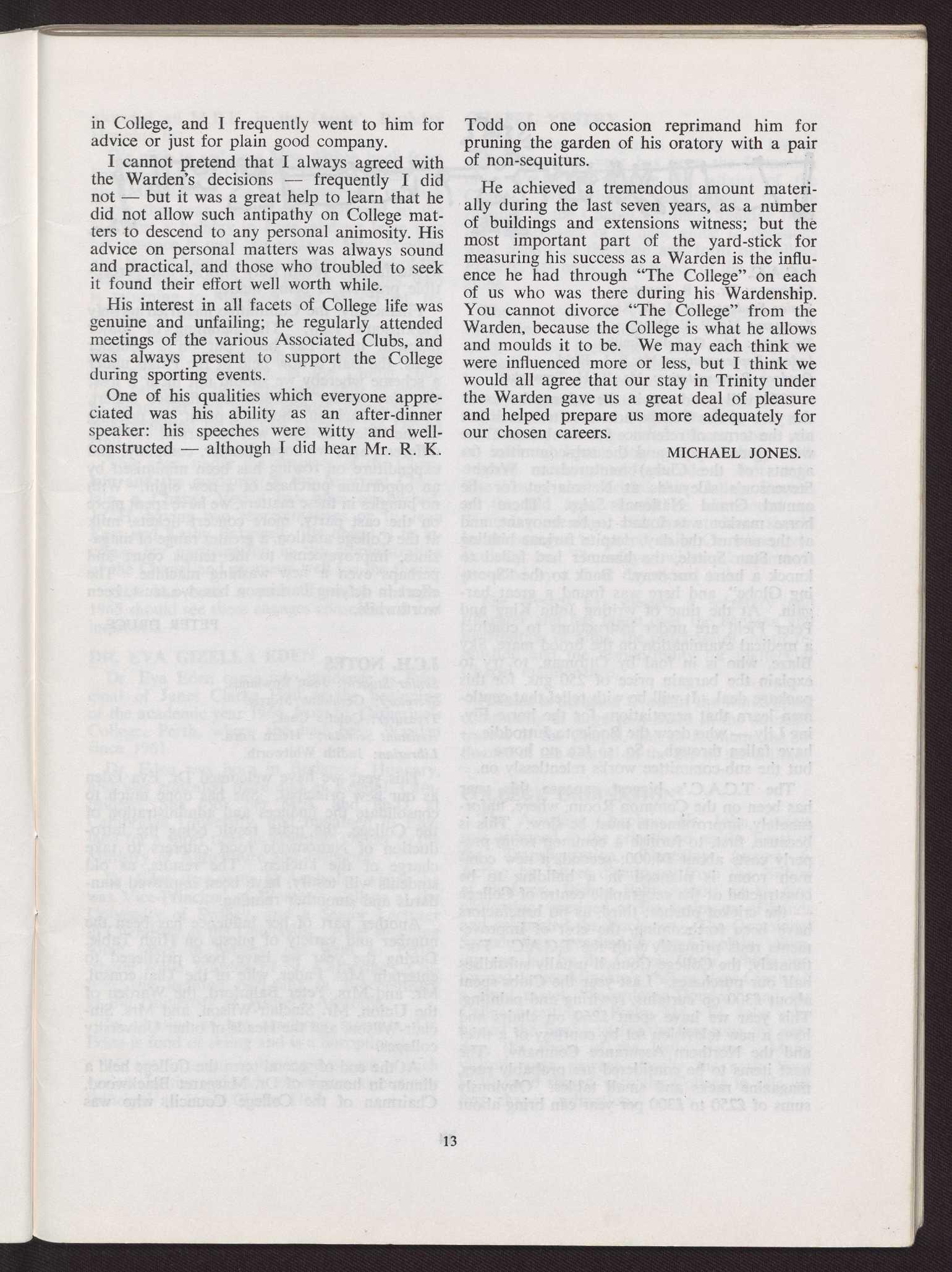
Todd on one occasion reprimand him for pruning the garden of his oratory with a pair of non-sequiturs.
He achieved a tremendous amount materially during the last seven years, as a number of buildings and extensions witness; but the most important part of the yard-stick for measuring his success as a Warden is the influence he had through "The College" on each of us who was there during his Wardenship. You cannot divorce "The College" from the Warden, because the College is what he allows and moulds it to be. We may each think we were influenced more or less, but I think we would all agree that our stay in Trinity under the Warden gave us a great deal of pleasure and helped prepare us more adequately for our chosen careers.
MICHAEL JONES.
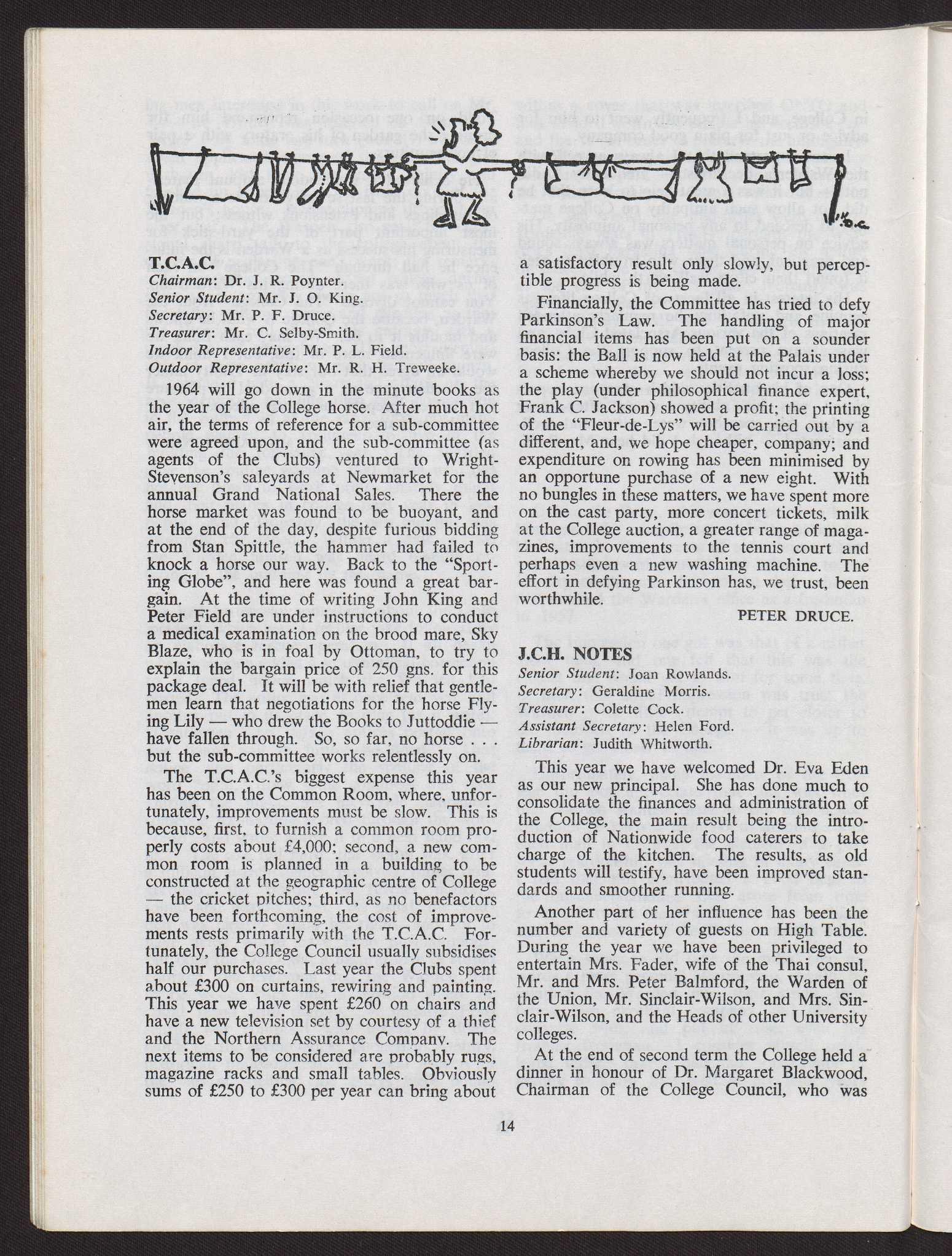
T.C.A.C.
Chairman: Dr. J. R. Poynter.
Senior Student: Mr. J. O. King.
Secretary: Mr. P. F. Druce.
Treasurer: Mr. C. Selby-Smith.
Indoor Representative: Mr. P. L. Field.
Outdoor Representative: Mr. R. H. Treweeke.
1964 will go down in the minute books as the year of the College horse. After much hot air, the terms of reference for a sub-committee were agreed upon, and the sub-committee (as agents of the Clubs) ventured to WrightStevenson's saleyards at Newmarket for the annual Grand National Sales. There the horse market was found to be buoyant, and at the end of the day, despite furious bidding from Stan Spittle, the hammer had failed to knock a horse our way. Back to the "Sporting Globe", and here was found a great bargain. At the time of writing John King and Peter Field are under instructions to conduct a medical examination on the brood mare, Sky Blaze, who is in foal by Ottoman, to try to explain the bargain price of 250 gns. for this package deal. It will be with relief that gentlemen learn that negotiations for the horse Flying Lily — who drew the Books to Juttoddie — have fallen through. So, so far, no horse .. . but the sub-committee works relentlessly on.
The T.C.A.C.'s biggest expense this year has been on the Common Room, where, unfortunately, improvements must be slow. This is because, first, to furnish a common room properly costs about £4,000; second, a new common room is planned in a building to be constructed at the geographic centre of College — the cricket pitches; third, as no benefactors have been forthcoming, the cost of improvements rests primarily with the T.C.A.C. Fortunately, the College Council usually subsidises half our purchases. Last year the Clubs spent about £300 on curtains, rewiring and painting. This year we have spent £260 on chairs and have a new television set by courtesy of a thief and the Northern Assurance Company. The next items to be considered are probably rugs, magazine racks and small tables. Obviously sums of £250 to £300 per year can bring about
a satisfactory result only slowly, but perceptible progress is being made.
Financially, the Committee has tried to defy Parkinson's Law. The handling of major financial items has been put on a sounder basis: the Ball is now held at the Palais under a scheme whereby we should not incur a loss; the play (under philosophical finance expert, Frank C. Jackson) showed a profit; the printing of the "Fleur-de-Lys" will be carried out by a different, and, we hope cheaper, company; and expenditure on rowing has been minimised by an opportune purchase of a new eight. With no bungles in these matters, we have spent more on the cast party, more concert tickets, milk at the College auction, a greater range of magazines, improvements to the tennis court and perhaps even a new washing machine. The effort in defying Parkinson has, we trust, been worthwhile.
PETER DRUCE.
Senior Student: Joan Rowlands.
Secretary: Geraldine Morris.
Treasurer: Colette Cock.
Assistant Secretary: Helen Ford.
Librarian: Judith Whitworth.
This year we have welcomed Dr. Eva Eden as our new principal. She has done much to consolidate the finances and administration of the College, the main result being the introduction of Nationwide food caterers to take charge of the kitchen. The results, as old students will testify, have been improved standards and smoother running.
Another part of her influence has been the number and variety of guests on High Table. During the year we have been privileged to entertain Mrs. Fader, wife of the Thai consul, Mr. and Mrs. Peter Balmford, the Warden of the Union, Mr. Sinclair-Wilson, and Mrs. Sinclair-Wilson, and the Heads of other University colleges.
At the end of second term the College held a dinner in honour of Dr. Margaret Blackwood, Chairman of the College Council, who was
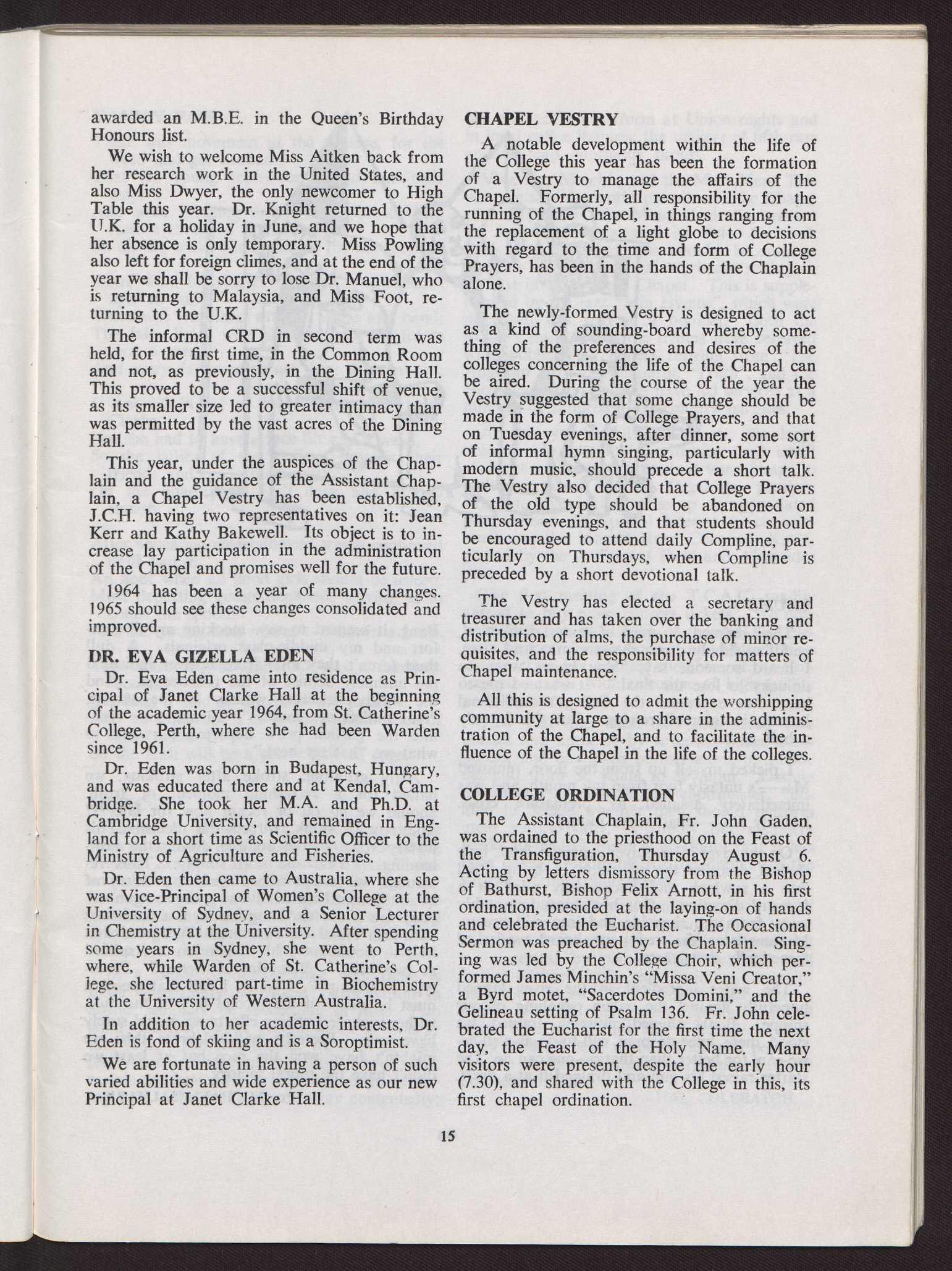
awarded an M.B.E. in the Queen's Birthday Honours list.
We wish to welcome Miss Aitken back from her research work in the United States, and also Miss Dwyer, the only newcomer to High Table this year. Dr. Knight returned to the U.K. for a holiday in June, and we hope that her absence is only temporary. Miss Powling also left for foreign climes, and at the end of the year we shall be sorry to lose Dr. Manuel, who is returning to Malaysia, and Miss Foot, returning to the U.K.
The informal CRD in second term was held, for the first time, in the Common Room and not, as previously, in the Dining Hall. This proved to be a successful shift of venue, as its smaller size led to greater intimacy than was permitted by the vast acres of the Dining Hall.
This year, under the auspices of the Chaplain and the guidance of the Assistant Chaplain, a Chapel Vestry has been established, J.C.H. having two representatives on it: Jean Kerr and Kathy Bakewell. Its object is to increase lay participation in the administration of the Chapel and promises well for the future. 1964 has been a year of many changes. 1965 should see these changes consolidated and improved.
Dr. Eva Eden came into residence as Principal of Janet Clarke Hall at the beginning of the academic year 1964, from St. Catherine's College, Perth, where she had been Warden since 1961.
Dr.. Eden was born in Budapest, Hungary, and was educated there and at Kendal, Cambridge. She took her M.A. and Ph.D. at Cambridge University, and remained in England for a short time as Scientific Officer to the Ministry of Agriculture and Fisheries.
Dr. Eden then came to Australia, where she was Vice-Principal of Women's College at the University of Sydney, and a Senior Lecturer in Chemistry at the University. After spending some years in Sydney, she went to Perth, where, while Warden of St. Catherine's College, she lectured part-time in Biochemistry at the University of Western Australia.
Li addition to her academic interests, Dr. Eden is fond of skiing and is a Soroptimist.
We are fortunate in having a person of such varied abilities and wide experience as our new Principal at Janet Clarke Hall.
A notable development within the life of the College this year has been the formation of a Vestry to manage the affairs of the Chapel. Formerly, all responsibility for the running of the Chapel, in things ranging from the replacement of a light globe to decisions with regard to the time and form of College Prayers, has been in the hands of the Chaplain alone.
The newly-formed Vestry is designed to act as a kind of sounding-board whereby something of the preferences and desires of the colleges concerning the life of the Chapel can be aired. During the course of the year the Vestry suggested that some change should be made in the form of College Prayers, and that on Tuesday evenings, after dinner, some sort of informal hymn singing, particularly with modern music, should precede a short talk. The Vestry also decided that College Prayers of the old type should be abandoned on Thursday evenings, and that students should be encouraged to attend daily Compline, particularly on Thursdays, when Compline is preceded by a short devotional talk.
The Vestry has elected a secretary and treasurer and has taken over the banking and distribution of alms, the purchase of minor requisites, and the responsibility for matters of Chapel maintenance.
All this is designed to admit the worshipping community at large to a share in the administration of the Chapel, and to facilitate the influence of the Chapel in the life of the colleges.
The Assistant Chaplain, Fr. John Gaden, was ordained to the priesthood on the Feast of the Transfiguration, Thursday August 6. Acting by letters dismissory from the Bishop of Bathurst, Bishop Felix Arnott, in his first ordination, presided at the laying-on of hands and celebrated the Eucharist. The Occasional Sermon was preached by the Chaplain. Singing was led by the College Choir, which performed James Minchin's "Missa Veni Creator," a Byrd motet, "Sacerdotes Domini," and the Gelineau setting of Psalm 136. Fr. John celebrated the Eucharist for the first time the next day, the Feast of the Holy Name. Many visitors were present, despite the early hour (7.30), and shared with the College in this, its first chapel ordination.
They seemed a crew of some distinction, paddling lithely down the stream. And after, I heard someone say, "You know, we were unlucky to lose the final." It warmed me to hear thus expressed the College's traditional interest in intercoll rowing. But this is only a half a story.
I picked myself up from the floor, removed M 's untasty foot from my mouth, and was immediately assailed by premature crisis. Luckily M had more money.
On the river all a-quiver centuries later, how shall I describe the sensation of being fitted into a rowlock and backwardly plied in a forward direction? Our boat moved smoothly away from the riverside and into mid-stream. Minutes later, the crew now aboard, we jerked frenetically downyarra.
The water ingredient in the river lapped hopefully against the oaken panelling of our shippe. Boats aligned, muscles strained, we stood there knee-deep in will-to-do-as-well-aswe-can, for better than that no-one can do. The starter raised his gun and drained it at a draft.
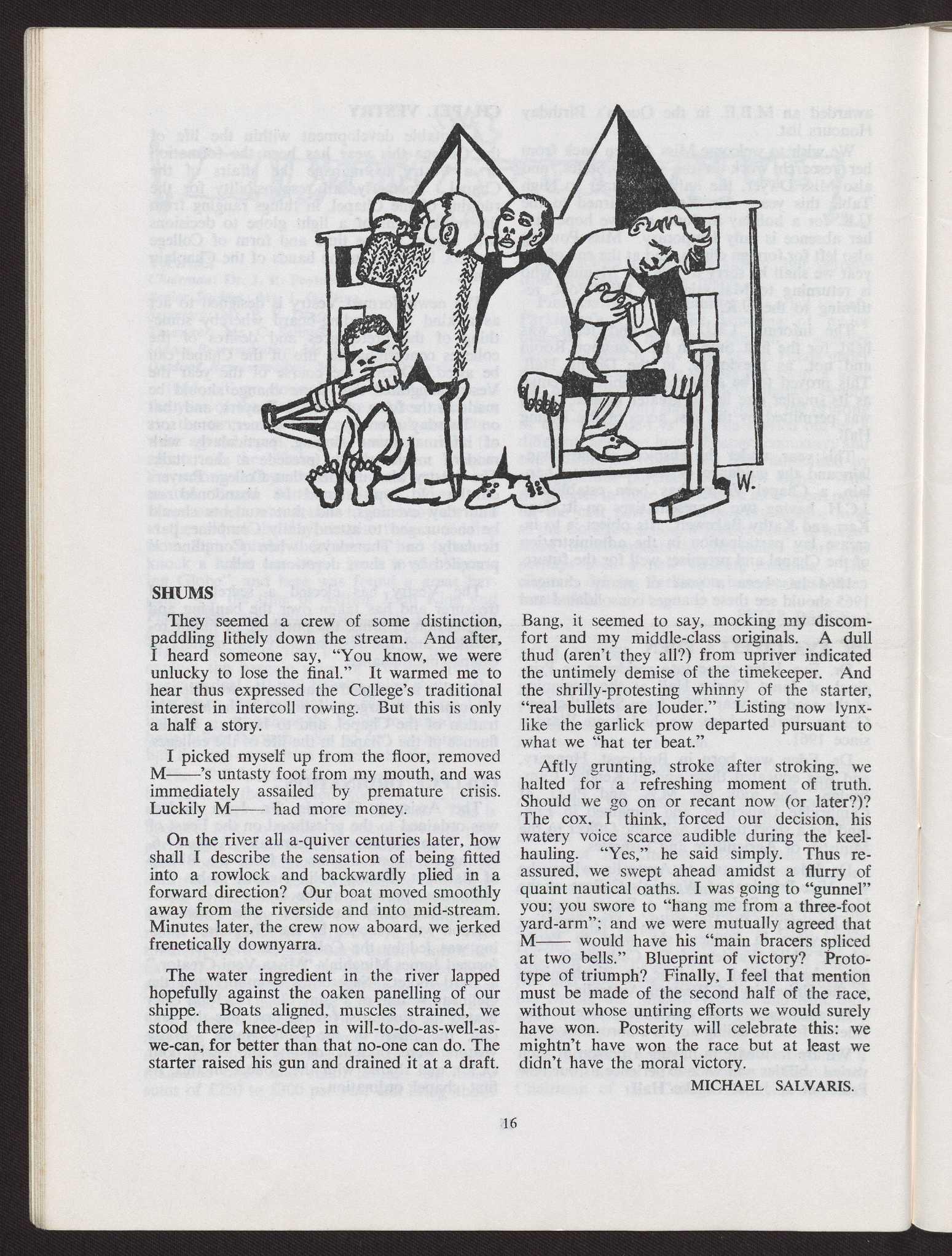
Bang, it seemed to say, mocking my discomfort and my middle-class originals. A dull thud (aren't they all?) from upriver indicated the untimely demise of the timekeeper. And the shrilly-protesting whinny of the starter, "real bullets are louder." Listing now lynxlike the garlick prow departed pursuant to what we "hat ter beat."
Aftly grunting, stroke after stroking, we halted for a refreshing moment of truth. Should we go on or recant now (or later?)? The cox. I think, forced our decision, his watery voice scarce audible during the keelhauling. "Yes," he said simply. Thus reassured, we swept ahead amidst a flurry of quaint nautical oaths. I was going to "gunnel" you; you swore to "hang me from a three-foot yard-arm"; and we were mutually agreed that M would have his "main bracers spliced at two bells." Blueprint of victory? Prototype of triumph? Finally, I feel that mention must be made of the second half of the race, without whose untiring efforts we would surely have won. Posterity will celebrate this: we mightn't have won the race but at least we didn't have the moral victory.
MICHAEL SALVARIS.
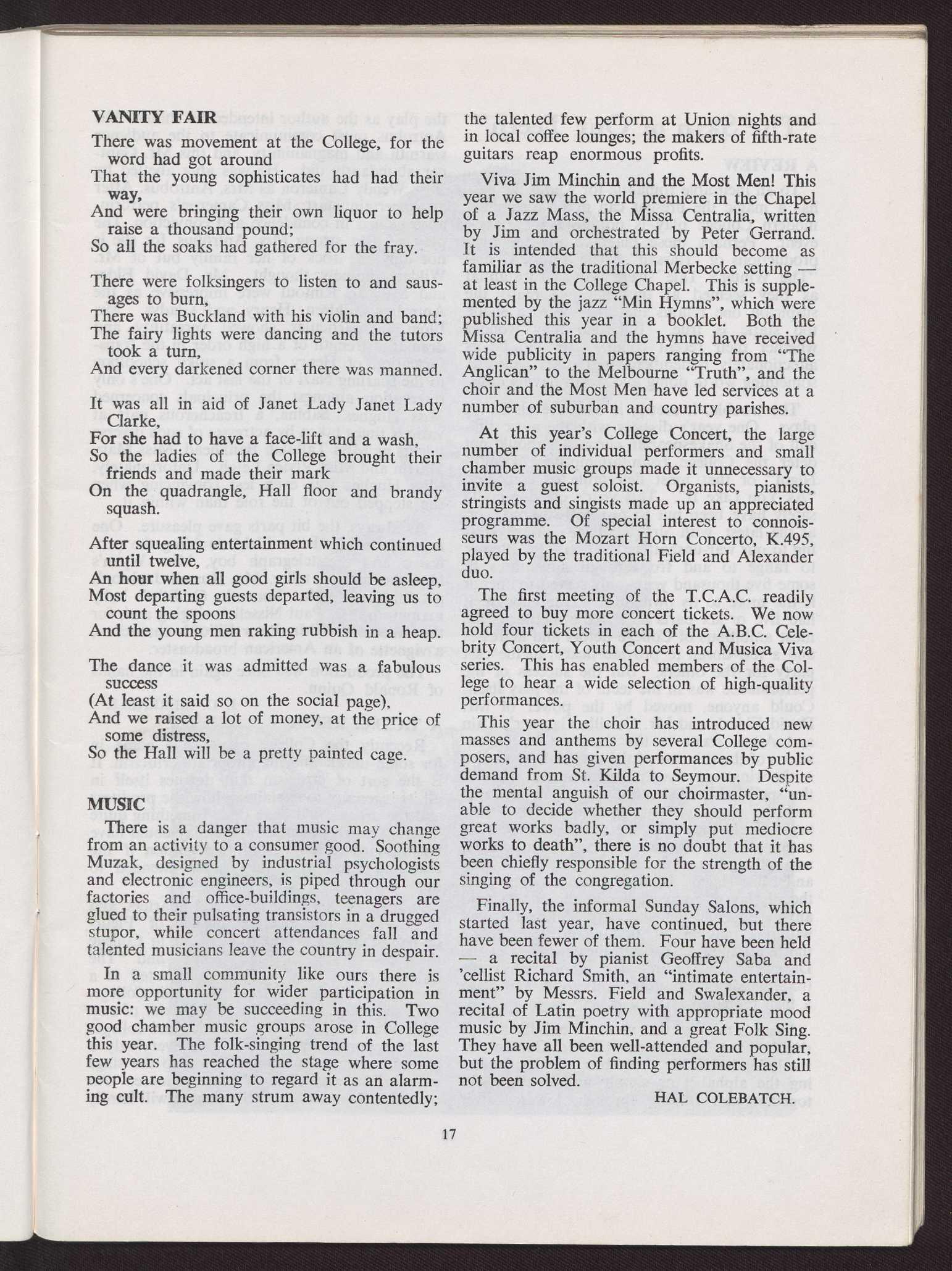
There was movement at the College, for the word had got around
That the young sophisticates had had their way,
And were bringing their own liquor to help raise a thousand pound; So all the soaks had gathered for the fray.
There were folksingers to listen to and sausages to burn, There was Buckland with his violin and band; The fairy lights were dancing and the tutors took a turn,
And every darkened corner there was manned.
It was all in aid of Janet Lady Janet Lady Clarke, For she had to have a face-lift and a wash,
So the ladies of the College brought their friends and made their mark
On the quadrangle, Hall floor and brandy squash.
After squealing entertainment which continued until twelve,
An hour when all good girls should be asleep, Most departing guests departed, leaving us to count the spoons
And the young men raking rubbish in a heap.
The dance it was admitted was a fabulous success
(At least it said so on the social page), And we raised a lot of money, at the price of some distress,
So the Hall will be a pretty painted cage.
There is a danger that music may change from an activity to a consumer good. Soothing Muzak, designed by industrial psychologists and electronic engineers, is piped through our factories and office-buildings, teenagers are glued to their pulsating transistors in a drugged stupor, while concert attendances fall and talented musicians leave the country in despair.
In a small community like ours there is more opportunity for wider participation in music: we may be succeeding in this. Two good chamber music groups arose in College this year. The folk-singing trend of the last few years has reached the stage where some people are beginning to regard it as an alarming cult. The many strum away contentedly;
the talented few perform at Union nights and in local coffee lounges; the makers of fifth-rate guitars reap enormous profits.
Viva Jim Minchin and the Most Men! This year we saw the world premiere in the Chapel of a Jazz Mass, the Missa Centralia, written by Jim and orchestrated by Peter Gerrand. It is intended that this should become as familiar as the traditional Merbecke setting — at least in the College Chapel. This is supplemented by the jazz "Min Hymns", which were published this year in a booklet. Both the Missa Centralia and the hymns have received wide publicity in papers ranging from "The Anglican" to the Melbourne "Truth", and the choir and the Most Men have led services at a number of suburban and country parishes.
At this year's College Concert, the large number of individual performers and small chamber music groups made it unnecessary to invite a guest soloist. Organists, pianists, stringists and singists made up an appreciated programme. Of special interest to connoisseurs was the Mozart Horn Concerto, K.495, played by the traditional Field and Alexander duo.
The first meeting of the T.C.A.C. readily agreed to buy more concert tickets. We now hold four tickets in each of the A.B.C. Celebrity Concert, Youth Concert and Musica Viva series. This has enabled members of the College to hear a wide selection of high-quality performances.
This year the choir has introduced new masses and anthems by several College composers, and has given performances by public demand from St. Kilda to Seymour. Despite the mental anguish of our choirmaster, "unable to decide whether they should perform great works badly, or simply put mediocre works to death", there is no doubt that it has been chiefly responsible for the strength of the singing of the congregation.
Finally, the informal Sunday Salons, which started last year, have continued, but there have been fewer of them. Four have been held — a recital by pianist Geoffrey Saba and 'cellist Richard Smith, an "intimate entertainment" by Messrs. Field and Swalexander, a recital of Latin poetry with appropriate mood music by Jim Minchin, and a great Folk Sing. They have all been well-attended and popular, but the problem of finding performers has still not been solved.
HAL COLEBATÇH.
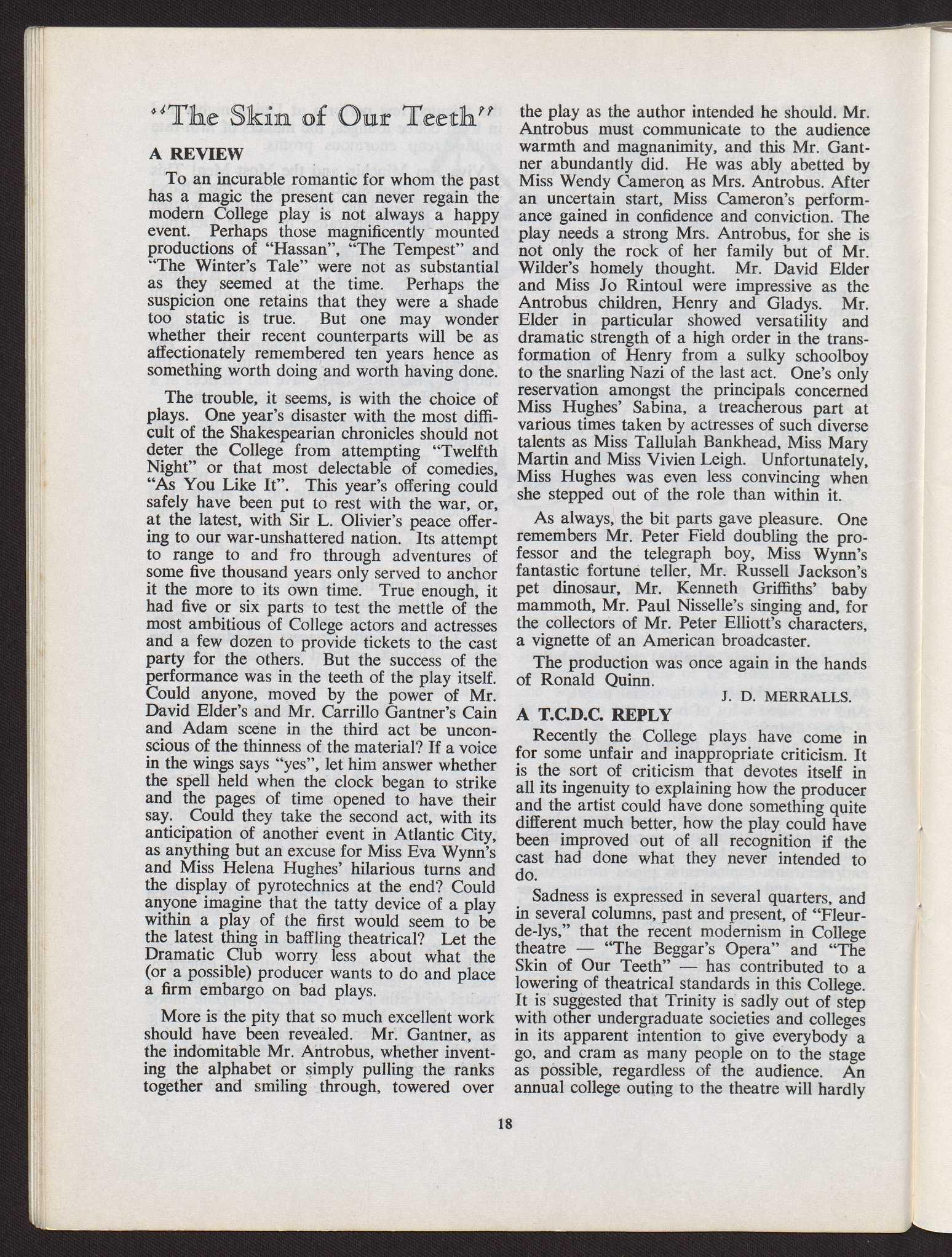
To an incurable romantic for whom the past has a magic the present can never regain the modern College play is not always a happy event. Perhaps those magnificently mounted productions of "Hassan", "The Tempest" and "The Winter's Tale" were not as substantial as they seemed at the time. Perhaps the suspicion one retains that they were a shade too static is true. But one may wonder whether their recent counterparts will be as affectionately remembered ten years hence as something worth doing and worth having done.
The trouble, it seems, is with the choice of plays. One year's disaster with the most difficult of the Shakespearian chronicles should not deter the College from attempting "Twelfth Night" or that most delectable of comedies, "As You Like It". This year's offering could safely have been put to rest with the war, or, at the latest, with Sir L. Olivier's peace offering to our war-unshattered nation. Its attempt to range to and fro through adventures of some five thousand years only served to anchor it the more to its own time. True enough, it had five or six parts to test the mettle of the most ambitious of College actors and actresses and a few dozen to provide tickets to the cast party for the others. But the success of the performance was in the teeth of the play itself. Could anyone, moved by the power of Mr. David Elder's and Mr. Carrillo Gantner's Cain and Adam scene in the third act be unconscious of the thinness of the material? If a voice in the wings says "yes", let him answer whether the spell held when the clock began to strike and the pages of time opened to have their say. Could they take the second act, with its anticipation of another event in Atlantic City, as anything but an excuse for Miss Eva Wynn's and Miss Helena Hughes' hilarious turns and the display of pyrotechnics at the end? Could anyone imagine that the tatty device of a play within a play of the first would seem to be the latest thing in baffling theatrical? Let the Dramatic Club worry less about what the (or a possible) producer wants to do and place a firm embargo on bad plays.
More is the pity that so much excellent work should have been revealed. Mr. Gantner, as the indomitable Mr. Antrobus, whether inventing the alphabet or simply pulling the ranks together and smiling through, towered over
the play as the author intended he should. Mr. Antrobus must communicate to the audience warmth and magnanimity, and this Mr. Gantner abundantly did. He was ably abetted by Miss Wendy Cameron as Mrs. Antrobus. After an uncertain start, Miss Cameron's performance gained in confidence and conviction. The play needs a strong Mrs. Antrobus, for she is not only the rock of her family but of Mr. Wilder's homely thought. Mr. David Elder and Miss Jo Rintoul were impressive as the Antrobus children, Henry and Gladys. Mr. Elder in particular showed versatility and dramatic strength of a high order in the transformation of Henry from a sulky schoolboy to the snarling Nazi of the last act. One's only reservation amongst the principals concerned Miss Hughes' Sabina, a treacherous part at various times taken by actresses of such diverse talents as Miss Tallulah Bankhead, Miss Mary Martin and Miss Vivien Leigh. Unfortunately, Miss Hughes was even less convincing when she stepped out of the role than within it.
As always, the bit parts gave pleasure. One remembers Mr. Peter Field doubling the professor and the telegraph boy, Miss Wynn's fantastic fortune teller, Mr. Russell Jackson's pet dinosaur, Mr. Kenneth Griffiths' baby mammoth, Mr. Paul Nisselle's singing and, for the collectors of Mr. Peter Elliott's characters, a vignette of an American broadcaster.
The production was once again in the hands of Ronald Quinn.
J. D. MERRALLS.
Recently the College plays have come in for some unfair and inappropriate criticism. It is the sort of criticism that devotes itself in all its ingenuity to explaining how the producer and the artist could have done something quite different much better, how the play could have been improved out of all recognition if the cast had done what they never intended to do.
Sadness is expressed in several quarters, and in several columns, past and present, of "Fleurde-lys," that the recent modernism in College theatre — "The Beggar's Opera" and "The Skin of Our Teeth" — has contributed to a lowering of theatrical standards in this College. It is suggested that Trinity is sadly out of step with other undergraduate societies and colleges in its apparent intention to give everybody a go, and cram as many people on to the stage as possible, regardless of the audience. An annual college outing to the theatre will hardly
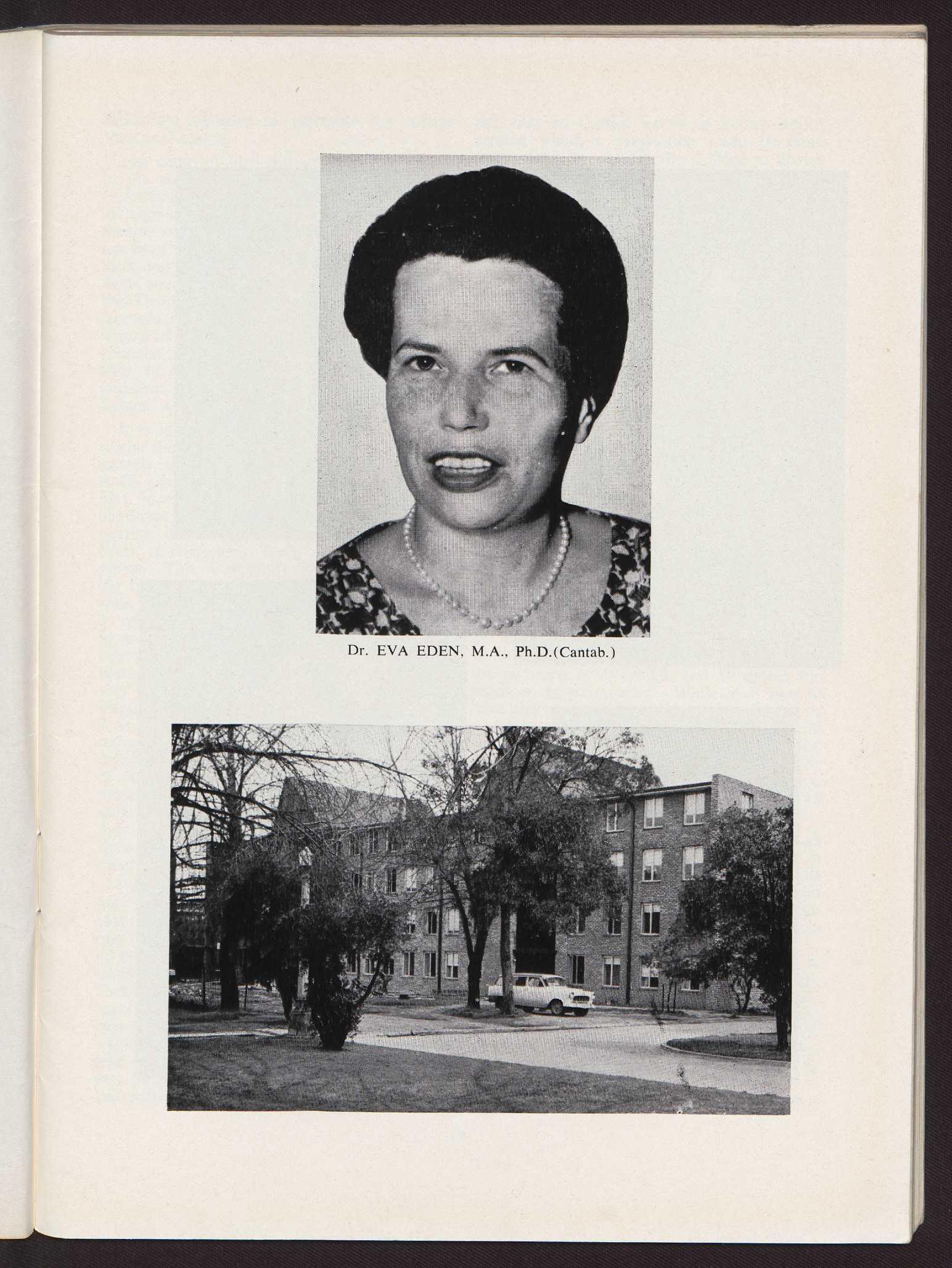

"Oh why can't we have plays like we used to have . .

entice an audience to patronise the college theatrical season.
The cause of such disparagement originates in the choice made in recent years of plays containing a large cast. The recent experience in large-cast plays is an innovation in College theatre which, since "The Dark of the Moon," has been met not with appreciative encouragement but with disapproval, in spite of the obvious success of such plays. The College and the Theatre can no more pander to the preferences of the audience than it can to the whims of Critics: it must feel itself to be unconfined. "The Beggar's Opera" and "The Skin of Our Teeth" showed both that the audience can be outraged, infuriated and delighted, and the Theatre kept alive.
It is in connection with the appropriateness of the choice of play that a second issue arises, namely, the current vogue of anti-Shakespeare & Co. plays, which are no substitute for a good play in the classical tradition; the argument continues that one or two failures in Shakespearian theatre should not deter the College from re-attempting some of these masterpieces. This is certainly true and, of course, the College should, in the long run, put on a wide variety of plays, but no one should be so mistaken as to think that four years away from . the classics will disappoint the audience any more than it should disappoint us; and because the last three years have given three very good seasons, "Dark of the Moon", "The Beggar's Opera" and "The Skin of Our Teeth", it is surely insulting to read of the annual college romp to the theatre. Audiences were delighted with "The Beggar's Opera", in spite of its many short-comings. To those who prefer a lifetime of happiness with Shakespeare, I would say this: he who desires a lifetime of happiness with a beautiful woman desires to enjoy the taste of wine by keeping his mouth always full of it.
This anti-Shakespeare & Co. notion extends into the field of what is and is not a good play. "Pla ce a firm embargo on bad plays", one hears it said, but is there not much folly in the T.C.D.C. doggedly leaping into Greek tragedy, Shakespearian comedy, or perhaps "brutalistic" theatre with a characteristic disregard for reality, and hoping to make a success of it, without for one moment considering whether or not there is acting ability in College sufficient to meet with the demands of, say, Shakespearian comedy? With regard to this year's play, there were at the beginning of
the year no College actors of known ability around whom a production could be built; quite a risk to commit the College to Shakespeare in these circumstances. There is an impression being created by local critics that something Shakespearian is naturally good, and something even a little bit modern as being intrinsically sub-standard. It is no good saying Shakespeare is best three times a day after meals, and hoping it will be, and then gratifying it all by doing Shakespeare in April; it just does not work.
It is important to bear in mind the limitations and difficulties inherent in producing a College play. Trinity and Janet Clarke Hall are not always possessed of a rare handful of actors and actresses who have had notable experience on the stage, and for this reason the College cannot guarantee that each year its production will be of a similar vintage. Critics should not be surprised at gaps in College acting, rather they should be more ready to notice improvements in College theatre.
There is obvious disagreement as to the success or otherwise of recent College plays, and it is clear that the word success is being used ambiguously. Is the play made a success by the profit it makes from the public? Is it in satisfying the audience? Is it in satisfying the cast and the College that it was worth while after all? The premium on satisfying the audience is very high, and altogether too much to insure against. While it is nice to have the profit derived from the public, it is certainly no criterion of success. The secret surely is to make certain that the College, having fulfilled its obligation to the public by perfecting the presentation of the play it has chosen, should be thoroughly satisfied that all was done that could be done.
It is this manner of success, success from the point of view of those in the play and in the College, that is of prime importance. The College play has now become a College event similar in tradition to Juttoddie in that it implies and people expect this general involvement of people in. College in the play.
This article has been written primarily to clarify the alternative attitude to the College play, and to suggest that much of the published criticism has come from people all too distantly associated with the play. The College play is distinctly different from professional performances, and much could be achieved by critics recognising this.
JOHN OLIVER.
ELLIOTT FOURS
A Theological Approach
Circa 2 p.m.: Arrived. Lager broached. Sun out. Thirsty . . . not thirsty.
2.10 p.m.: Thirsty . . . not thirsty (etc., ad nauseam).
2.20 p.m.: At last the races start! ... 'bout time, too . . . —! Who's organising this — show? Oh. Nice day, Gal!
2.30-3 p.m.: Races ... thirsty ... quenched .. can't remember who's rowing ... shuddup an' go away!
3 p.m.: —! Look at Hone skolling all down the river. Good on you Geoff! Three cheers for Geoffrey.
3.15 p.m.: There goes Bainbridge Jr. with a pair, going the wrong way. It figures.
3.20 p.m.: Another — rigged crew! . . trust Rennie.
3.25 p.m.: Getting thirsty again . . . where did they get that cheese from? . . . Really! Mr. Fenton, really!
3.30 p.m.: WHO brought a football down? They should be . . . Here come the clergy. This'll set the tone!
3.40 p.m.: Get a load of Mr. Buzzard coxing a boat with Mr. Nankivell in the middle. Well, they couldn't put HIM at the end . . . er, "bow"? So that's what they call it? Thanks (smile) for nothing (mutter), you poor drunken ... (immediate penitential thoughts).
3.45 p.m.: Another — rigged crew! Mr. Stephen Larkins coxing, and Messrs. Pullen and Richards (very versatile coxes) at least KNOW how to row.
3.50 p.m.: The Larkins gang v. the Buzzard gentry . . . and the rigged crew wins! disqualified, that's better ... Quaff ... Quaff ... Go away.
3.55 p.m.: Mr. Larkins is swearing. Saith Mr. McPherson, "It's nasty, juvenile and petulent." Enlarge on that Mr. McP. "Next Elliott Fours — no football, no rigged crews, and the only prerequisite — sheer and utter incompetenshy at rowing!" Thank you, Mr. McP.
4 p.m.: Mr. Larkins tells Mr. Galbraith to go and...
4.5 p.m.: Messrs. Pullen and Richards howling and wingeing. ". . . and WE told Father Marshall and HE said ..." "Oh, shuddup, ya poor little . . ." quoth Gal.
4.10 p.m.: Mr. Larkins tells everybody to go and...
4.15 p.m.: Silly b—s still kicking the footy in the river ...—! I'm thirsty ... not thirshty now. Struth! The sunset already ... Mmm August? . . . That couple on the other bank don't seem to mind . . . Shame! (celibate ire raised) . . . Rob Murray's crew won a race? ... probably rigged ... Look, go away and leave me alone! Can't you lishen, you poor sot! Leggo! Leggo, I say, leggo!
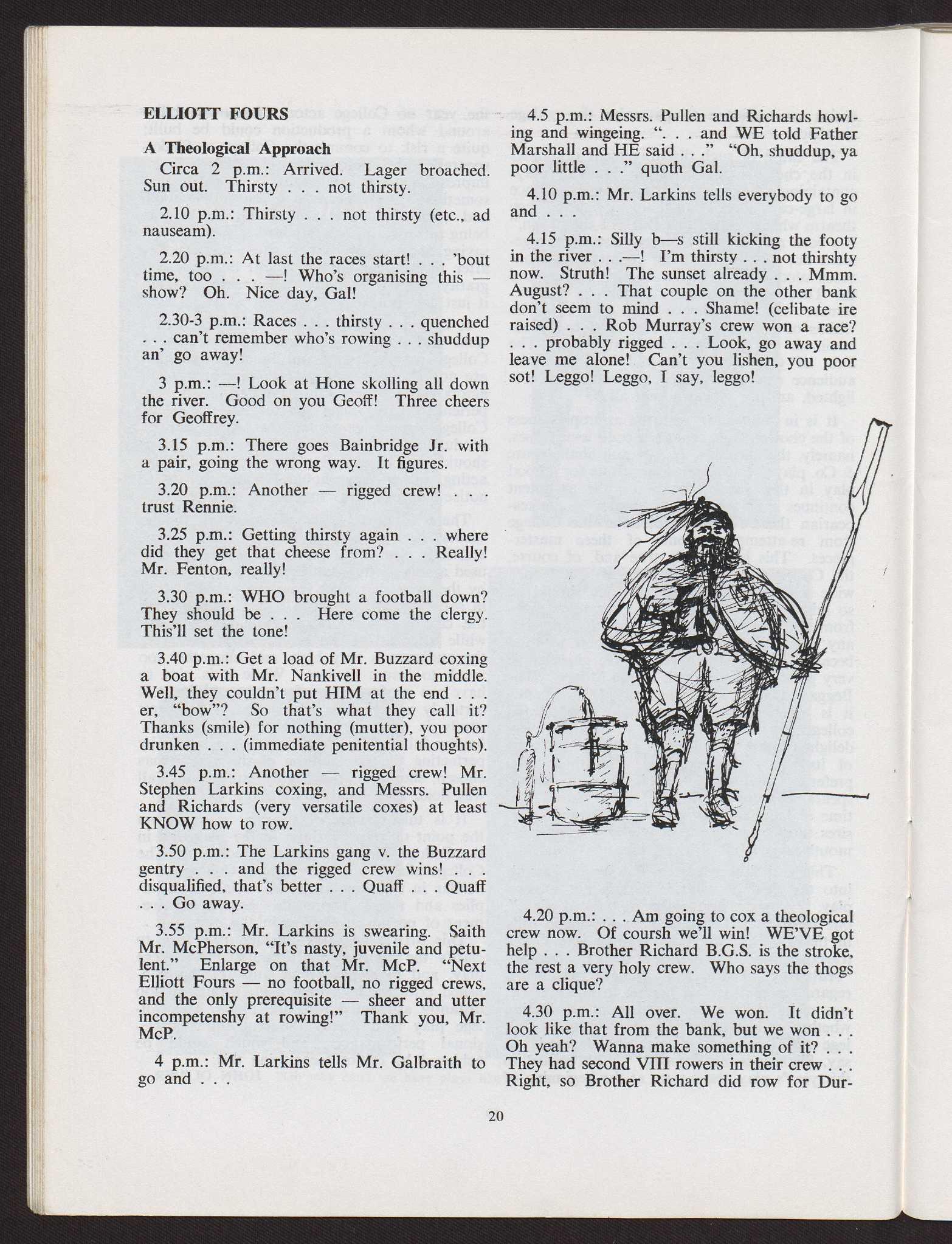
4.20 p.m.:... Am going to cox a theological crew now. Of coursh we'll win! WE'VE got help ... Brother Richard B.G.S. is the stroke, the rest a very holy crew. Who says the thogs are a clique?
4.30 p.m.: All over. We won. It didn't look like that from the bank, but we won . . . Oh yeah? Wanna make something of it? . . . They had second VIII rowers in their crew .. . Right, so Brother Richard did row for Dur-
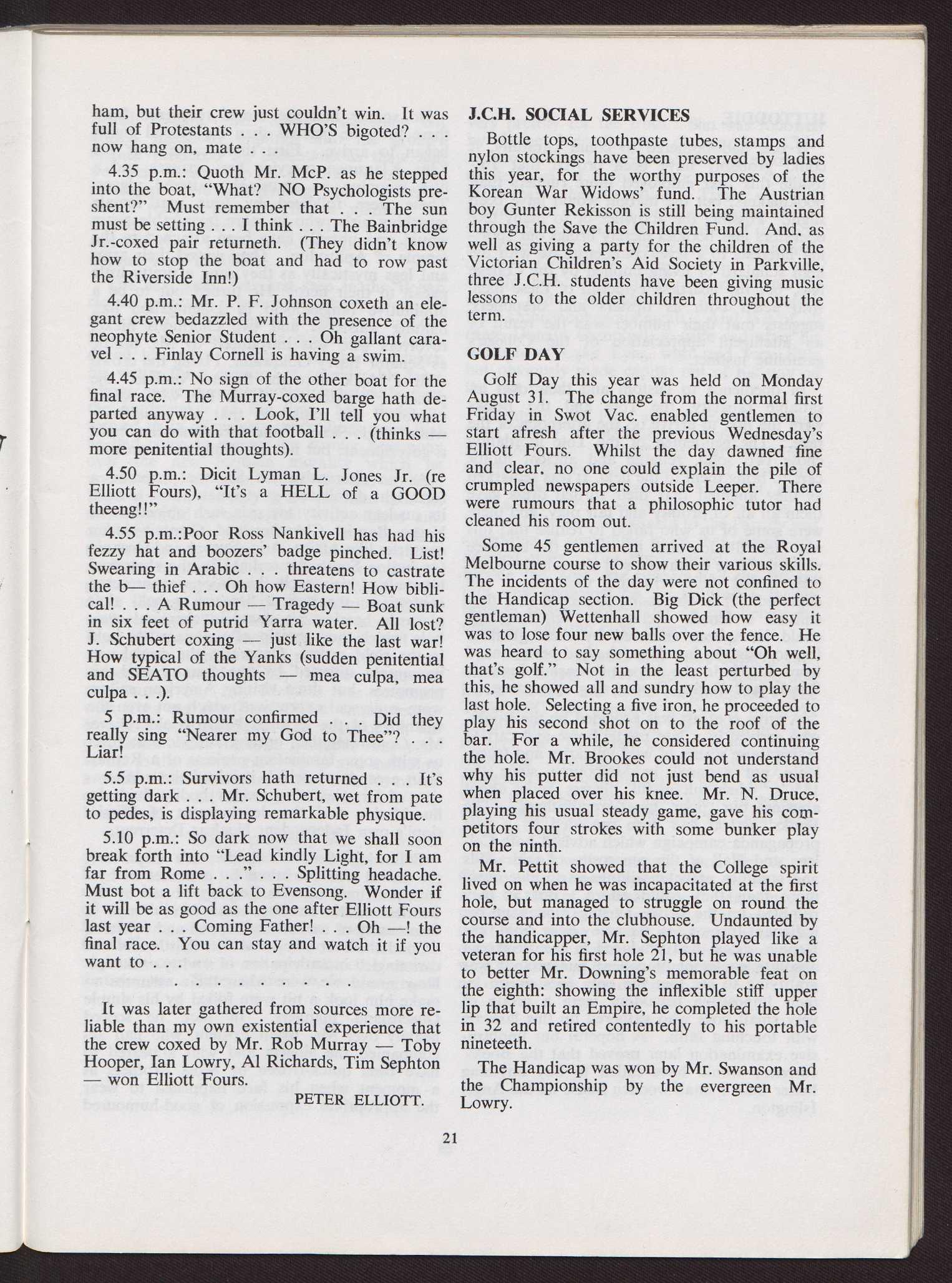
ham, but their crew just couldn't win. It was full of Protestants ... WHO'S bigoted? .. . now hang on, mate .. .
4.35 p.m.: Quoth Mr. McP. as he stepped into the boat, "What? NO Psychologists preshent?" Must remember that . . . The sun must be setting ... I think ... The Bainbridge Jr.-coxed pair returneth. (They didn't know how to stop the boat and had to row past the Riverside Inn!)
4.40 p.m.: Mr. P. F. Johnson coxeth an elegant crew bedazzled with the presence of the neophyte Senior Student ... Oh gallant caravel ... Finlay Cornell is having a swim.
4.45 p.m.: No sign of the other boat for the final race. The Murray-coxed barge hath departed anyway . . . Look, I'll tell you what you can do with that football ... (thinks — more penitential thoughts).
4.50 p.m.: Dicit Lyman L. Jones Jr. (re Elliott Fours), "It's a HELL of a GOOD theeng!!"
4.55 p.m.:Poor Ross Nankivell has had his fezzy hat and boozers' badge pinched. List! Swearing in Arabic . . . threatens to castrate the b— thief ... Oh how Eastern! How biblical! ... A Rumour — Tragedy — Boat sunk in six feet of putrid Yarra water. All lost? J. Schubert coxing — just like the last war! How typical of the Yanks (sudden penitential and SEATO thoughts — mea culpa, mea culpa ...).
5 p.m.: Rumour confirmed . . . Did they really sing "Nearer my God to Thee"? . . . Liar!
5.5 p.m.: Survivors hath returned . . . It's getting dark ... Mr. Schubert, wet from pate to pedes, is displaying remarkable physique.
5.10 p.m.: So dark now that we shall soon break forth into "Lead kindly Light, for I am far from Rome ..." ... Splitting headache. Must bot a lift back to Evensong. Wonder if it will be as good as the one after Elliott Fours last year ... Coming Father! ... Oh —! the final race. You can stay and watch it if you want to .. .
It was later gathered from sources more reliable than my own existential experience that the crew coxed by Mr. Rob Murray — Toby Hooper, Ian Lowry, Al Richards, Tim Sephton — won Elliott Fours.
PETER ELLIOTT.
Bottle tops, toothpaste tubes, stamps and nylon stockings have been preserved by ladies this year, for the worthy purposes of the Korean War Widows' fund. The Austrian boy Gunter Rekisson is still being maintained through the Save the Children Fund. And, as well as giving a party for the children of the Victorian Children's Aid Society in Parkville, three J.C.H. students have been giving music lessons to the older children throughout the term.
Golf Day this year was held on Monday August 31. The change from the normal first Friday in Swot Vac. enabled gentlemen to start afresh after the previous Wednesday's Elliott Fours. Whilst the day dawned fine and clear, no one could explain the pile of crumpled newspapers outside Leeper. There were rumours that a philosophic tutor had cleaned his room out.
Some 45 gentlemen arrived at the Royal Melbourne course to show their various skills. The incidents of the day were not confined to the Handicap section. Big Dick (the perfect gentleman) Wettenhall showed how easy it was to lose four new balls over the fence. He was heard to say something about "Oh well, that's golf." Not in the least perturbed by this, he showed all and sundry how to play the last hole. Selecting a five iron, he proceeded to play his second shot on to the roof of the bar. For a while, he considered continuing the hole. Mr. Brookes could not understand why his putter did not just bend as usual when placed over his knee. Mr. N. Druce, playing his usual steady game, gave his competitors four strokes with some bunker play on the ninth.
Mr. Pettit showed that the College spirit lived on when he was incapacitated at the first hole, but managed to struggle on round the course and into the clubhouse. Undaunted by the handicapper, Mr. Sephton played like a veteran for his first hole 21, but he was unable to better Mr. Downing's memorable feat on the eighth: showing the inflexible stiff upper lip that built an Empire, he completed the hole in 32 and retired contentedly to his portable nineteeth.
The Handicap was won by Mr. Swanson and the Championship by the evergreen Mr. Lowry.

If one had bothered to count carefully, it could probably have been proved that Juttoddie this year employed more runners than bookmakers; but the margin would have been slight. Possibly the activities of so many tote operators and bookies merely brings our sporting interests to a level commensurate with the high standard of living implied by the College fees, but the heartless cynicism of these men, who acted both as tipsters and despoilers, suggests that their number was the result of an intelligent appreciation of the College's gambling instinct.
In obedience to custom and their own insatiable rapacity, the Tote and the Books were the first to arrive on the afternoon of the race. The gentlemen of the Tote mordantly chose two solid, reliable and ancient motor cars to bring them to the field. It was remarked as they alighted that their formal dress gave them an air of probity and fair play, and there were some of us who failed to realise that this was mere illusion until the end of the last race when the Tote operators, still charmingly plausible, closed their brimming cash boxes and departed. It is distressing to record that they enlisted a female accomplice; but then she could have been ensnared by their glamour for, to judge by her dress, she had been coaxed from J.C.H. in the hope of hearing Jean de Reszke and Enrico Caruso sing once more.
A gross contrast was provided by the Books, who arrived in a late model horse and cart to revive those scenes of wild vulgarity and truculence not endured in. Melbourne since the 1850's, when successful diggers rode about abusing our poor great-grandfathers. The Books' arrival had been preceded by a vast propaganda campaign which advised both College and Hall of the generosity of their odds and a rather pathetic willingness to give away more than they could afford. But as they rumbled up the drive, hurling money at the indignant crowd, it became clear that the Rennie system had produced in the Books an absolute contempt of college punters. It was gratifying to see that the only ones duped by their impossible behaviour were a group of very small boys who gathered up this largesse with touching faith. A hopeful but unobtrusive examination later proved that the Books' currency would have failed to buy anything better than a small wooden house on the Angel Islington.
No sooner had the crowd recovered from these tiresome persons than the official guests began to arrive. First there came four Ku Klux Klansmen carrying fiery crosses and a fifth wopping an amusingly tattered nigger. These were followed by four real female marching girls, who in more favourable times would undoubtedly have been attached to the temple of Aphrodite. They waved their arms and legs mystically as they sang a pretty little paean to their hero. He turned out to be a diminutive braggadocio in a ten-gallon hat, flaming waistcoat and two enormous nickel revolvers who was introduced by Mr. Spittle as Senator Barry Goldwater. Fixing the crowd with a bleak stare the Senator outlined the principal convictions of his life with weary candour. He explained that all equal-born white Anglo-Saxon Protestant Americans need a government: but not a tyranny as at present.
As an alternative the Senator proposed a forthright defoliating government, able to turn its nuclear activity towards such objectives as Negro Baptist Churches and Commie-ridden countries like Africa, Asia, Europe and Oceania (excluding South Australia). In the rhetorical intervals of his speech, the majorettes showered confetti on the patient Senator or held aloft placards bearing his name in chemical symbols, which they occasionally managed to hold in the right order. Generally, the crowd was immensely diverted by the Senator and his promoters, but three visiting American sailors wore equivocal expressions which not even the writhings of the tortured Negro could relieve. Mr. Goldwater then opened Juttoddie and left us with some fascinating projects of a Republican ascendancy which involved the adulteration of Dr. Castro's precious bodily fluids by fluoridation and the development of Mississippi's own Independent Nuclear Deterrent.
Following Senator Goldwater's departure, the crowd was convulsed by extremes of hysteria and unobtainable longings caused by the Beatles. Like starlings who have found a community of snails they hopped and twittered around the ever-composed Mr. Spittle and our ears tingled in anticipation of a witty exchange. How proud we were when their attemtps to make him look a nit were foiled by his simple Queensland manners. In fact, he scored heavily over Mr. Brian Epstein, who had accompanied the singers and who appeared to have been quick-frozen by Moss Brothers at a moment when his face happened to wear the appropriate expression of good-humoured
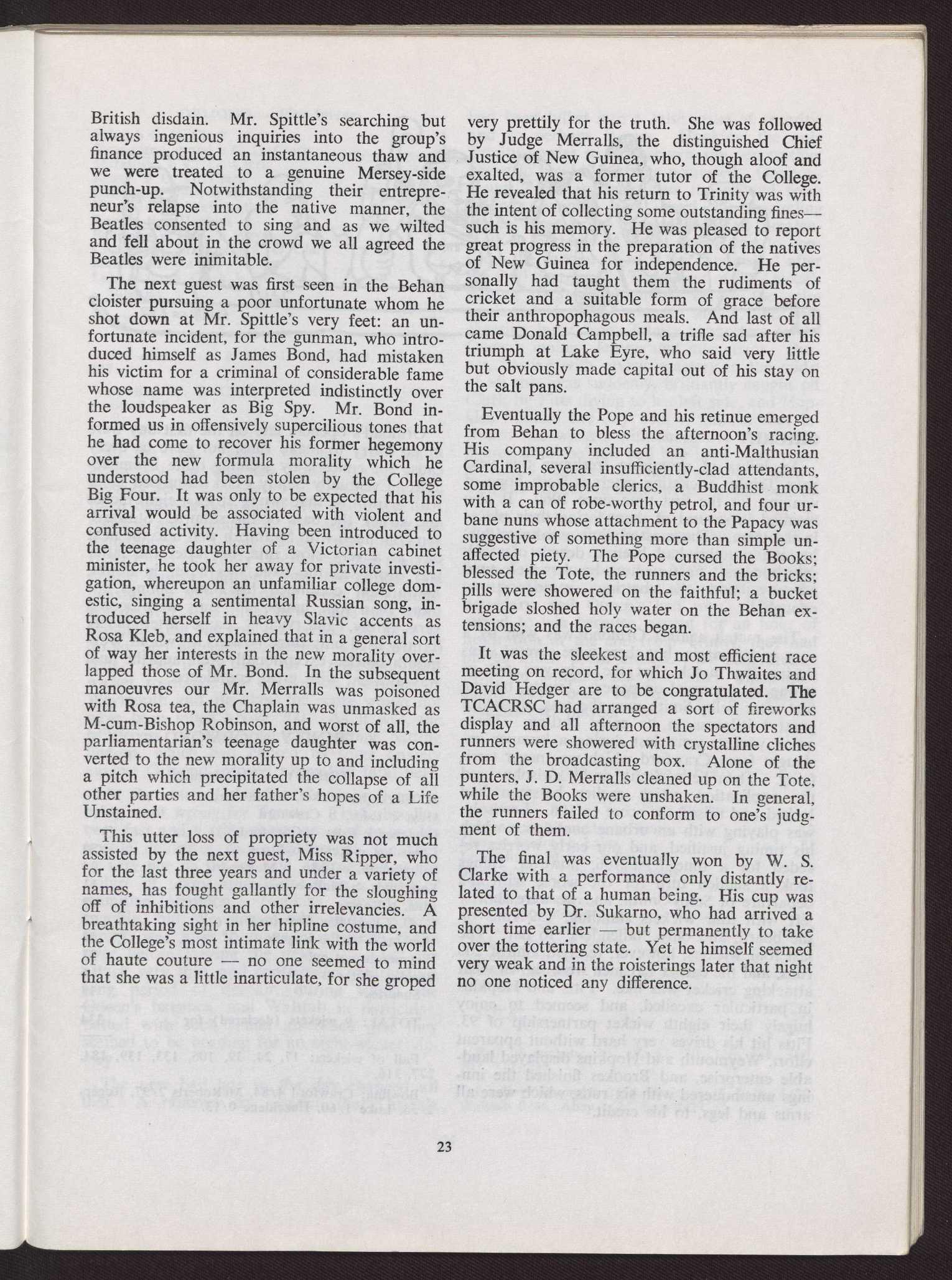
British disdain. Mr. Spittle's searching but always ingenious inquiries into the group's finance produced an instantaneous thaw and we were treated to a genuine Mersey-side punch-up. Notwithstanding their entrepreneur's relapse into the native manner, the Beatles consented to sing and as we wilted and fell about in the crowd we all agreed the Beatles were inimitable.
The next guest was first seen in the Behan cloister pursuing a poor unfortunate whom he shot down at Mr. Spittle's very feet: an unfortunate incident, for the gunman, who introduced himself as James Bond, had mistaken his victim for a criminal of considerable fame whose name was interpreted indistinctly over the loudspeaker as Big Spy. Mr. Bond informed us in offensively supercilious tones that he had come to recover his former hegemony over the new formula morality which he understood had been stolen by the College Big Four. It was only to be expected that his arrival would be associated with violent and confused activity. Having been introduced to the teenage daughter of a Victorian cabinet minister, he took her away for private investigation, whereupon an unfamiliar college domestic, singing a sentimental Russian song, introduced herself in heavy Slavic accents as Rosa Kleb, and explained that in a general sort of way her interests in the new morality overlapped those of Mr. Bond. In the subsequent manoeuvres our Mr. Merralls was poisoned with Rosa tea, the Chaplain was unmasked as M-cum-Bishop Robinson, and worst of all, the parliamentarian's teenage daughter was converted to the new morality up to and including a pitch which precipitated the collapse of all other parties and her father's hopes of a Life Unstained.
This utter loss of propriety was not much assisted by the next guest, Miss Ripper, who for the last three years and under a variety of names, has fought gallantly for the sloughing off of inhibitions and other irrelevancies. A breathtaking sight in her hipline costume, and the College's most intimate link with the world of haute couture — no one seemed to mind that she was a little inarticulate, for she groped
very prettily for the truth. She was followed by Judge Merralls, the distinguished Chief Justice of New Guinea, who, though aloof and exalted, was a former tutor of the College. He revealed that his return to Trinity was with the intent of collecting some outstanding fines— such is his memory. He was pleased to report great progress in the preparation of the natives of New Guinea for independence. He personally had taught them the rudiments of cricket and a suitable form of grace before their anthropophagous meals. And last of all came Donald Campbell, a trifle sad after his triumph at Lake Eyre, who said very little but obviously made capital out of his stay on the salt pans.
Eventually the Pope and his retinue emerged from Behan to bless the afternoon's racing. His company included an anti-Malthusian Cardinal, several insufficiently-clad attendants, some improbable clerics, a Buddhist monk with a can of robe-worthy petrol, and four urbane nuns whose attachment to the Papacy was suggestive of something more than simple unaffected piety. The Pope cursed the Books; blessed the Tote, the runners and the bricks; pills were showered on the faithful; a bucket brigade sloshed holy water on the Behan extensions; and the races began.
It was the sleekest and most efficient race meeting on record, for which Jo Thwaites and David Hedger are to be congratulated. The TCACRSC had arranged a sort of fireworks display and all afternoon the spectators and runners were showered with crystalline cliches from the broadcasting box. Alone of the punters, J. D. Merralls cleaned up on the Tote, while the Books were unshaken. In general, the runners failed to conform to one's judgment of them.
The final was eventually won by W. S. Clarke with a performance only distantly related to that of a human being. His cup was presented by Dr. Sukarno, who had arrived a short time earlier — but permanently to take over the tottering state. Yet he himself seemed very weak and in the roisterings later that night no one noticed any difference.
An influx of promising freshmen this year gave Trinity cricketing veterans fresh hope of winning for the first time since 1960. It also resulted in several of them losing their places in the team. The most obvious weakness during net practice had been a dearth of stock spin bowlers. Fast-medium bowlers were twoa-penny, and the batting seemed strong enough.
The match against Ormond was won by a very wide margin, but there were several signs during the match that the side was not as strong as it seemed on paper. Trinity, batting first after Selby-Smith won the toss, showed a great brittleness in its early batting. Three quick wickets were lost during a bumper onslaught from Crawford which was never terrifying. Then Selby-Smith and Lewisohn used the application which earlier batsmen had lacked and raised the score to 106. Lewisohn was playing with an urbane confidence which his timing justified, and our early worries receded for a time. At 106, however, things took a sudden turn for the worse with the departure of Selby-Smith, and we were shortly left with four wickets standing, 139 runs on the board, and only "tailenders" to bat. The last four wickets, however, realised almost 200 runs, and the earlier batsmen were shown what attacking cricket was like. Fitts and Hopkins in particular excelled, and seemed to enjoy hugely their eighth wicket partnership of 93. Fitts hit his drives very hard without apparent eff ort, Weymouth and Hopkins displayed laudable enterprise, and Brookes finished the innings unconquered with six runs, which were all arms and legs, to his credit.
Ormond's openers late on the first day were in no hurry to make runs, but gave us every cause for concern by seeming quite irremoveable. Eventually Sandy Clark dismissed Esler with a full-toss that swung at least eight inches and struck the base of the stumps. Stewardson continued with McIntosh well into the next day at a very slow rate, but after the latter was dismissed the issue was never in doubt. Stewardson continued his dour innings for more than four hours, but runs were scored very rarely, and victory came after lunch. Trinity used only three bowlers, of whom Weymouth bowled exceptionally well, and the final was awaited with great confidence.
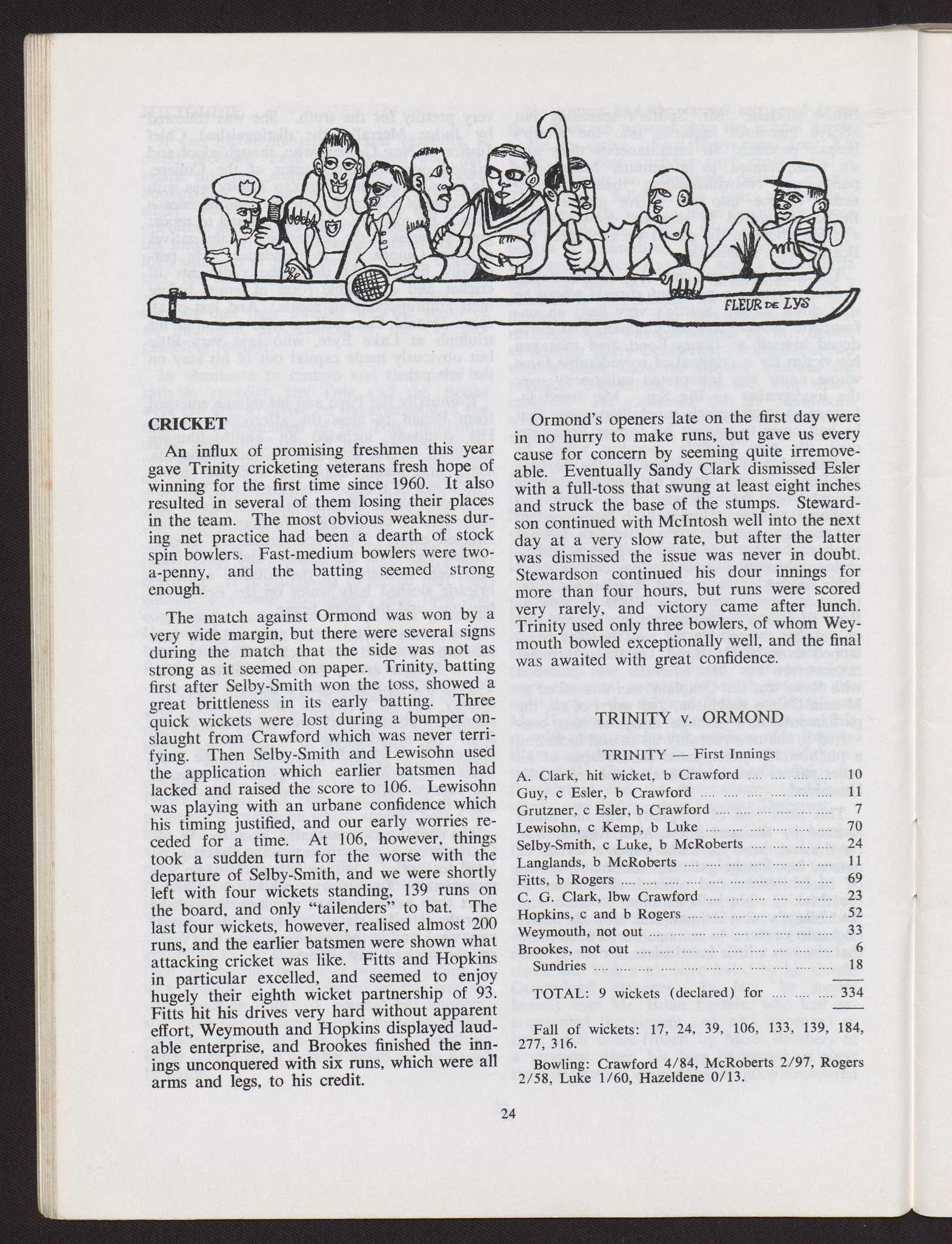
Fall of wickets: 17, 24, 39, 106, 133, 139, 184, 277, 316.
Bowli ng: Crawford 4/84, McRoberts 2/97, Rogers 2/58, Luke 1/60, Hazeldene 0/13.
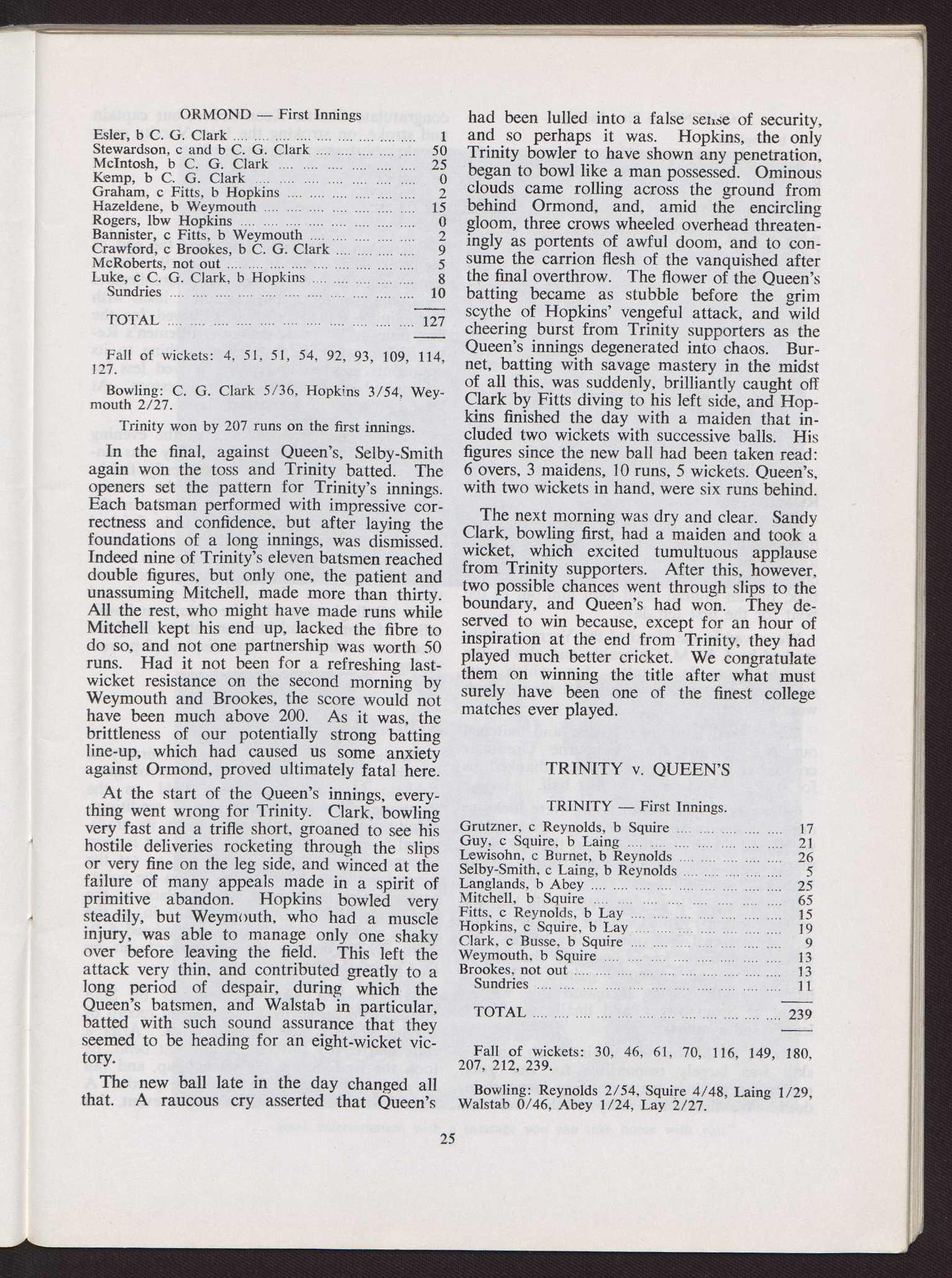
Fall of wickets: 4, 51, 51, 54, 92, 93, 109, 114, 127.
Bowling: C. G. Clark 5/36, Hopkins 3/54, Weymouth 2/27.
Trinity won by 207 runs on the first innings.
In the final, against Queen's, Selby-Smith again won the toss and Trinity batted. The openers set the pattern for Trinity's innings. Each batsman performed with impressive correctness and confidence, but after laying the foundations of a long innings, was dismissed. Indeed nine of Trinity's eleven batsmen reached double figures, but only one, the patient and unassuming Mitchell, made more than thirty. All the rest, who might have made runs while Mitchell kept his end up, lacked the fibre to do so, and not one partnership was worth 50 runs. Had it not been for a refreshing lastwicket resistance on the second morning by Weymouth and Brookes, the score would not have been much above 200. As it was, the brittleness of our potentially strong batting line-up, which had caused us some anxiety against Ormond, proved ultimately fatal here.
At the start of the Queen's innings, everything went wrong for Trinity. Clark, bowling very fast and a trifle short, groaned to see his hostile deliveries rocketing through the slips or very fine on the leg side, and winced at the failure of many appeals made in a spirit of primitive abandon. Hopkins bowled very steadily, but Weymouth, who had a muscle injury, was able to manage only one shaky over before leaving the field. This left the attack very thin, and contributed greatly to a long period of despair, during which the Queen's batsmen, and Walstab in particular, batted with such sound assurance that they seemed to be heading for an eight-wicket victory.
The new ball late in the day changed all that. A raucous cry asserted that Queen's
had been lulled into a false sense of security, and so perhaps it was. Hopkins, the only Trinity bowler to have shown any penetration, began to bowl like a man possessed. Ominous clouds came rolling across the ground from behind Ormond, and, amid the encircling gloom, three crows wheeled overhead threateningly as portents of awful doom, and to consume the carrion flesh of the vanquished after the final overthrow. The flower of the Queen's batting became as stubble before the grim scythe of Hopkins' vengeful attack, and wild cheering burst from Trinity supporters as the Queen's innings degenerated into chaos. Burnet, batting with savage mastery in the midst of all this, was suddenly, brilliantly caught off Clark by Fitts diving to his left side, and Hopkins finished the day with a maiden that included two wickets with successive balls. His figures since the new ball had been taken read: 6 overs, 3 maidens, 10 runs, 5 wickets. Queen's, with two wickets in hand, were six runs behind.
The next morning was dry and clear. Sandy Clark, bowling first, had a maiden and took a wicket, which excited tumultuous applause from Trinity supporters. After this, however, two possible chances went through slips to the boundary, and Queen's had won. They deserved to win because, except for an hour of inspiration at the end from Trinity, they had played much better cricket. We congratulate them on winning the title after what must surely have been one of the finest college matches ever played.
TRINITY v. QUEEN'S
TRINITY — First Innings.
Grutzner, c Reynolds, b Squire
Guy, c Squire, b Laing Lewisohn, c Burnet, b Reynolds Selby-Smith, c Laing, b Reynolds Langlands, b Abey
Mitchell, b Squire
Fitts, c Reynolds, b Lay Hopkins, c Squire, b Lay
Clark, c Busse, b Squire
Weymouth, b Squire
Brookes, not out :... Sundries
TOTAL ..
Fall of wickets: 30, 46, 61, 70, 116, 207, 212, 239. 149,
180,
Bowling: Reynolds 2/54, Squire 4/48, Laing 1/29, Walstab 0/46, Abey 1/24, Lay 2/27.

QUEEN'S — First Innings.
Lay, b Hopkins ...........................
Mitchell, c Lewisohn, b Hopkins ..... .
Walstab, b Hopkins ..
Reynolds, b Hopkins :.
Burnet, c Fitts, b Clark
Fau11, st Fitts, b Hopkins ...
Clark, c Fitts, b Hopkins
Busse, b Clark ................
Laing, lbw Hopkins .....:.
Squire, c Lewisohn, b Clark
Abey, not out Sundries
TOTAL .... ...
Fall of wickets: 43, 1.25, 201, 214, 228, 229, 233, 233,233, 267.
Bowling: Clark 3/110, Hopkins 7/77, Weymouth 0/14, Langlands 0/20, Brookes 0/23, Mitchell 0/5.
Queen's won on the first innings by one wicket.
AXEL CLARK.
One glance at the size of this year's oarsmen convinced our stroke that we would have to be made a high-rating crew. His masochistic temperament was ideally suited to the task, but an injured hand kept him out of the boat for the first ten days.
We rowed in the Head of the Yarra, daintily stroked by I. K. M. Galbraith, and also in the Scotch-Mercantile regatta, for which our stroke rejoined us. his hand and tongue both working well.
We worked hard over Easter, and matched ourselves against the Melbourne Grammar crew over a mile course. They thanked us for sticking so close in the first half.
In our heat with Newman we were lucky to draw the centre station: After a shaky start, we gained a half-length's lead at the 500 metre mark. We held the lead, and sprinted away to win by a length.
The next day it rained. We again had the centre station, with Ormond on the north. A bad start cost us a quarter of a length. Although we were level again at the More11 Bridge, Ormond gradually gained a lead of half a length. They increased this with a sprint at Swan Street, and finally won by a length and a quarter.
Mr. J. W. Michie was again coach, and his skill was largely responsible for our good performance, since we were very inexpert indeed. We thank him very much. We also
congratulate Chester Keon-Cohen, our captain and stroke, on stroking the Inter-Varsity crew for the third successive year.
By reason of its having reached the end of the brick, Trinity was foiled this April in its attempt to lower even further the Intercollegiate Swimming standard, but contented itself with maintaining fourth position, achieved for the first time in 1963. Even the Gentlemen's Relay Team, while it gave away nothing to its opponents in class and poise, proved less inspired and efficient than its predecessors. At least two spectators escaped dry
The least bad performances of the evening were given by freshmen: Peter Guy was unlucky to fill third place in the Butterfly, finishing as he did within a touch of the winner, and Ted Gallagher swam powerfully in the 100 and 200 metre events. Sev Clarke finished second in the underwater trial, covering almost two-and-a-half laps in a valiant effort to drown himself. The happiest people in the pool were the two members of the Trinity springboard team. Still glowing with the afternoon hospitality of some roadside inn, they delighted spectators with an effortless display of powerdiving.
On the occasion of the tenth anniversary of the first four-minute mile, the Intercollegiate Athletic Championships were held on the Beaurepaire arena, in near-perfect conditions. Trinity opened the afternoon with its traditional failure in the hundred yards, but it soon became evident that this was not to set the general pattern. Tom Hasker began the pointgathering by taking out second place in the high jump. Having cleared 6 ft. 1 in. at the second attempt, he only narrowly missed 6 ft. 3 in., which became the new record, set by D. Coster of Queen's.
Trinity's first win was notched by Stan Spittle, who broke by 2 sec. the old record of 1 min. 57.2 sec. for the 880 yards. After a start marred by jostling on the first bend, he took the lead during the second lap, and ran on easily to win by about fifteen yards. A record was also set in the shot put event, this
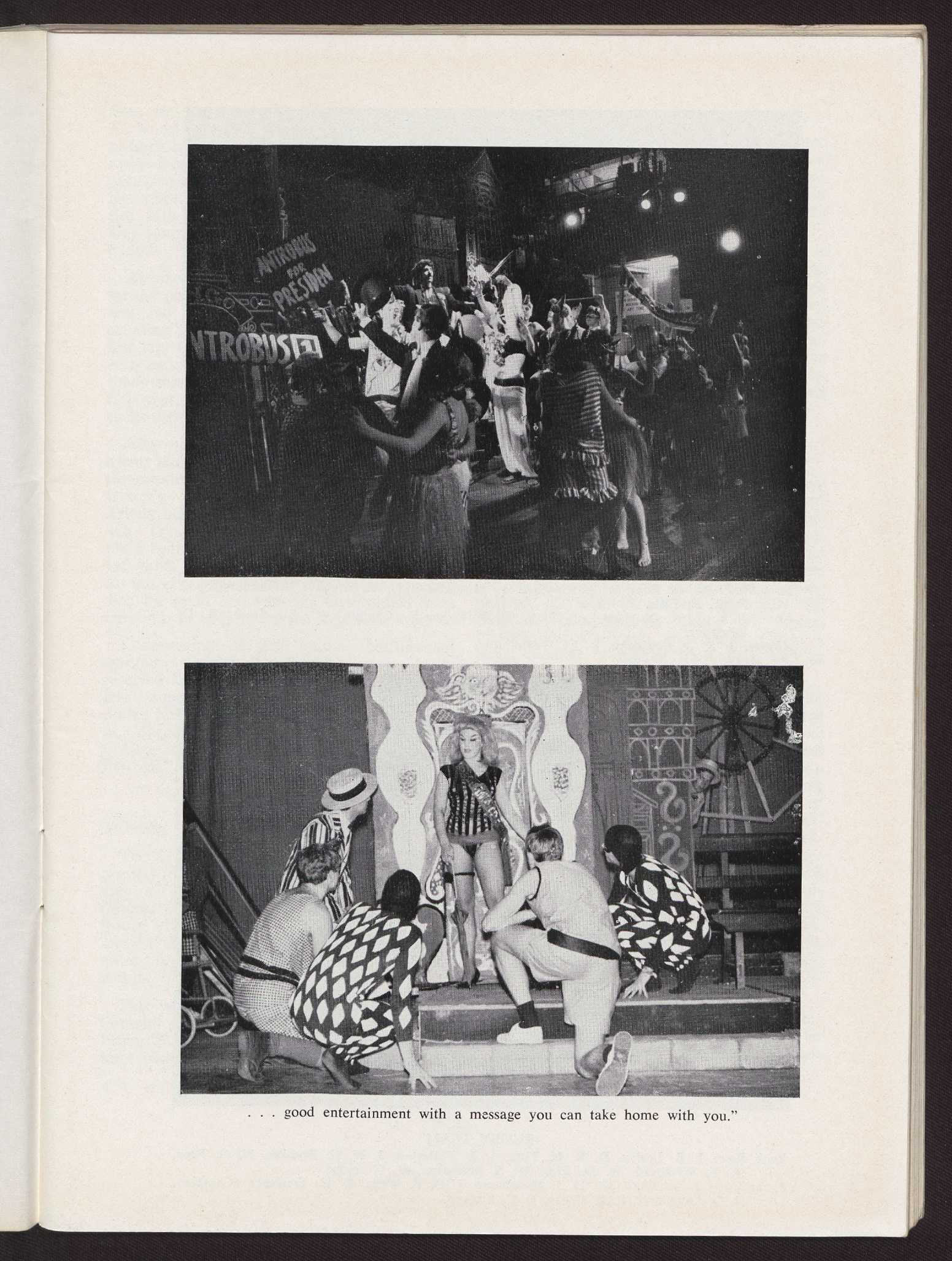
. . . good entertainment with a message you can take home with you."
Back Row: N. G. Ross, R. A. Guy, A. T. Mitchell, J. H. H. Brookes, J. O. Langlands, D. R. H. Fitts.
Front Row: I. R. Hopkins, A. Clark, C. Selby-Smith (Captain), C. G. Clark, B. D. Grutzner.
Absent: J. R. P. Lewisohn, R. D. Weymouth.
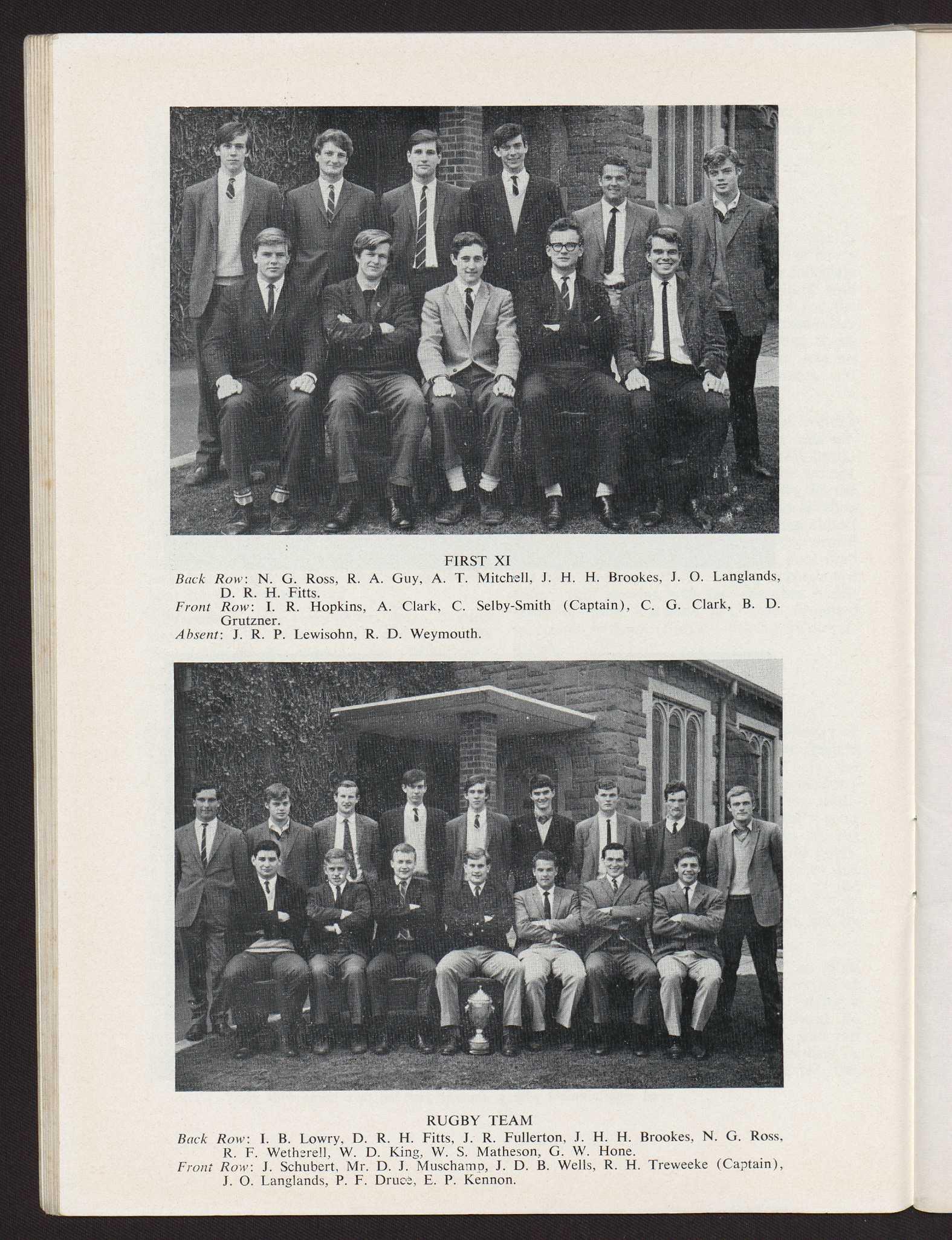
J. O. Langlands, P. F. Druce, E. P. Kennon.
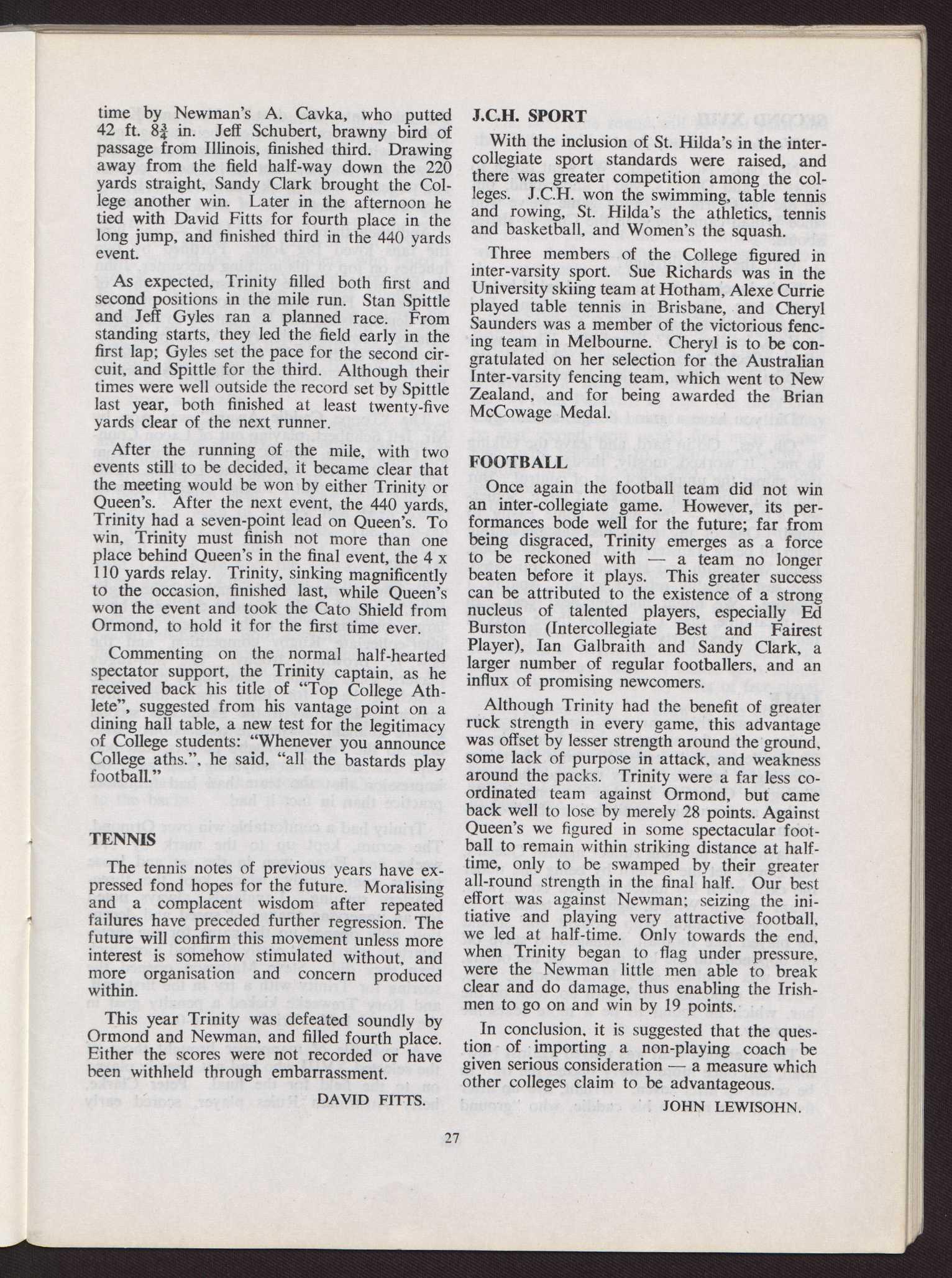
time by Newman's A. Cavka, who putted 42 ft. 8i in. Jeff Schubert, brawny bird of passage from Illinois, finished third. Drawing away from the field half-way down the 220 yards straight, Sandy Clark brought the College another win. Later in the afternoon he tied with David Fitts for fourth place in the long jump, and finished third in the 440 yards event.
As expected, Trinity filled both first and second positions in the mile run. Stan Spittle and Jeff Gyles ran a planned race. From standing starts, they led the field early in the first lap; Gyles set the pace for the second circuit, and Spittle for the third. Although their times were well outside the record set by Spittle last year, both finished at least twenty-five yards clear of the next runner.
After the running of the mile, with two events still to be decided, it became clear that the meeting would be won by either Trinity or Queen's. After the next event, the 440 yards, Trinity had a seven-point lead on Queen's. To win, Trinity must finish not more than one place behind Queen's in the final event, the 4 x 110 yards relay. Trinity, sinking magnificently to the occasion, finished last, while Queen's won the event and took the Cato Shield from Ormond, to hold it for the first time ever.
Commenting on the normal half-hearted spectator support, the Trinity captain, as he received back his title of "Top College Athlete", suggested from his vantage point on a dining hall table, a new test for the legitimacy of College students: "Whenever you announce College aths.", he said, "all the bastards play football."
The tennis notes of previous years have expressed fond hopes for the future. Moralising and a complacent wisdom after repeated failures have preceded further regression. The future will confirm this movement unless more interest is somehow stimulated without, and more organisation and concern produced within.
This year Trinity was defeated soundly by Ormond and Newman, and filled fourth place. Either the scores were not recorded or have been withheld through embarrassment.
DAVID FITTS.
With the inclusion of St. Hilda's in the intercollegiate sport standards were raised, and there was greater competition among the colleges. J.C.H. won the swimming, table tennis and rowing, St. Hilda's the athletics, tennis and basketball, and Women's the squash.
Three members of the College figured in inter-varsity sport. Sue Richards was in the University skiing team at Hotham, Alexe Currie played table tennis in Brisbane, and Cheryl Saunders was a member of the victorious fencing team in Melbourne. Cheryl is to be congratulated on her selection for the Australian Inter-varsity fencing team, which went to New Zealand, and for being awarded the Brian McCowage Medal.
Once again the football team did not win an inter-collegiate game. However, its performances bode well for the future; far from being disgraced, Trinity emerges as a force to be reckoned with — a team no longer beaten before it plays. This greater success can be attributed to the existence of a strong nucleus of talented players, especially Ed Burston (Intercollegiate Best and Fairest Player), Ian Galbraith and Sandy Clark, a larger number of regular footballers, and an influx of promising newcomers.
Although Trinity had the benefit of greater ruck strength in every game, this advantage was off set by lesser strength around the ground, some lack of purpose in attack, and weakness around the packs. Trinity were a far less coordinated team against Ormond, but came back well to lose by merely 28 points. Against Queen's we figured in some spectacular football to remain within striking distance at halftime, only to be swamped by their greater all-round strength in the final half. Our best effort was against Newman; seizing the initiative and playing very attractive football, we led at half-time. Only towards the end, when Trinity began to flag under pressure, were the Newman little men able to break clear and do damage, thus enabling the Irishmen to go on and win by 19 points.
In conclusion, it is suggested that the question of importing a non-playing coach be given serious consideration — a measure which other colleges claim to be advantageous.
JOHN LEWISOHN.

"Wonderful season, Axel."
"Not bad. No, indeed. We went down to Newman and Queen's, you'll understand, but we did beat Ormond. First game we've won since Wotan came home in the Cup, or thereabouts."
"Why the breakthrough?"
"Syd's lunches. Steak, eggs and salad before every game. The effect was electrifying. Did you see Hasker marking? Or Cowan passing to Ross, leading out? Wonderful. There were others affected, too. Jackson, Larkins, Watts, Archibald they all played well. A great game."
"Did you have a grand design, a strategy?"
"Oh, yes. Go in hard, and leave the talking to me. It worked, mostly, though in the last two games the umpire got out of control. But the team fought on. Stuckey, Clarke, Somerset, a'Beckett — the names come easily to mind. One of my problems was preventing them all being transferred to the Firsts. Hone, King, Weymouth and Haskett were translated. The rest probably refused to go. Apathy, I suppose. We might find out next year. In the meantime, may I show you those shots of the footballers' party?"
The team this year was assessed by the critics to be the strongest ever fielded in an inter-collegiate golf series. For once, the critics were right, because Trinity retained the InterCollegiate Golf Cup in what can only be described as a crushing annihilation of all opposition.
Playing the morning rubber against Queen's, Tan Lowry set the pattern by being one under the card when his match finished on thirteen. Team captain Wright, fighting a tendency to hook and a caddie who thought golf should be played like football, managed to stave off his opponent on the last green. Of the others, none was troubled save John Brookes, who, when his opponent didn't turn up, took on the bar, which he found to be a more fearsome adversary.
The afternoon final was played against Newman, and once more Lowry blazed the trail to be seven up after seven. Wright, five up after five, left the rest to his caddie, who "ground
the mick into the dust." Veterans KeonCohen and Druce completed their college golf careers with fine wins, while greenhorn Heard showed fine temperament on his home course, and together with Dick Larkins and Lowry should form the nucleus of next year's team.
And then there was Big John — and how the fans loved Big John. Fortified by two lunches on top of his morning encounter, John blasted his first drive a measured distance of 317 yards. His subsequent form, if not good, was demoralising, and he went on to complete Trinity's seven-love victory. At his press conference he chatted with characteristic modesty, giving all the credit for his win to his morning opponent.
The "Toppe Caddie Award" was won by Mr. Jeff Schubert, playing out of Lacon Country Club, Lacon, Illinois, in a close finish from caddies Renwick, Ogilvie and Larkins This is the first time that a foreign entrant has won this coveted trophy.
On the afternoon of September 2 the rugby team, a team made stronger this year by a large complement of rugby players, won the inter-collegiate Rugby competition, and the new D. Brownhill trophy. The non-rugby players, some of whom have rugby experience stretching back for three years and three matches, played as if the game was second nature to them; they gave tremendous assistance to the full-time rugby players, and perhaps this more than anything else gave the impression that the team had had far more practice than in fact it had.
Trinity had a comfortable win over Ormond. The scrum, kept up to the mark by Treweeke and Hone, won in the set and loose scrums continuously, which kept the threequarters running. Langlands, always noted for an unnerving change of speed and deception, ably opened up the game for the threequarters, who might easily have had more luck than they did. Steve Matheson opened the scoring for Trinity with a try in the first half, and Rory Treweeke kicked a penalty goal in the second half. Trinity won 6-0.
A reshuffle of manpower brought those of the selected XVIII who had not already played on to the field for the final. Peter Clarke, hefty Australian Rules player, scored early
for Queen's, showing that brawn, not necessarily rugby acumen, was in Queen's favour. The game quickly became bogged down in the scrums, which had lost Hone to the threequarters, and Treweeke through injury. Twice Jeff Schubert put a long American-style pass out to Langlands, in an effort to clear the game out to the backs. The game did not look like being won in the three-quarters, who faced a sizable barrier. Penalty points appeared to be the answer, judging by the number of players continually off-side. The referee enforced the rule that the side with the most players off-side when the whistle blew had the decision given against them. By half-time the score was three-all, Trinity's only points coming from a penalty.
Early in the second half, Langlands kicked an astonishing penalty. 6-3 now. As late as nine minutes into the second half, a minute or so from full time, Queen's all but scored from a deft forward rush. It was only when a tremendous heap of people had been sorted out that a try was disallowed. The drop-out carried miles downfield over the defenders, with Dave King and the forwards charging along after it. King arrived on the scene first, smoothly took the ball on a kindly bounce, side-stepped two oncoming defenders, and roared downfield. Both sides stopped to watch the try. At this moment the referee blew "no side"; we believe that Queen's conceded the conversion.
The spectators, who usually have the last word on the subject, were not divided in their comment. John Brookes did well in the lineouts, Schubert was always in action, and Muschamp passed on the successes of the forwards to the backs.
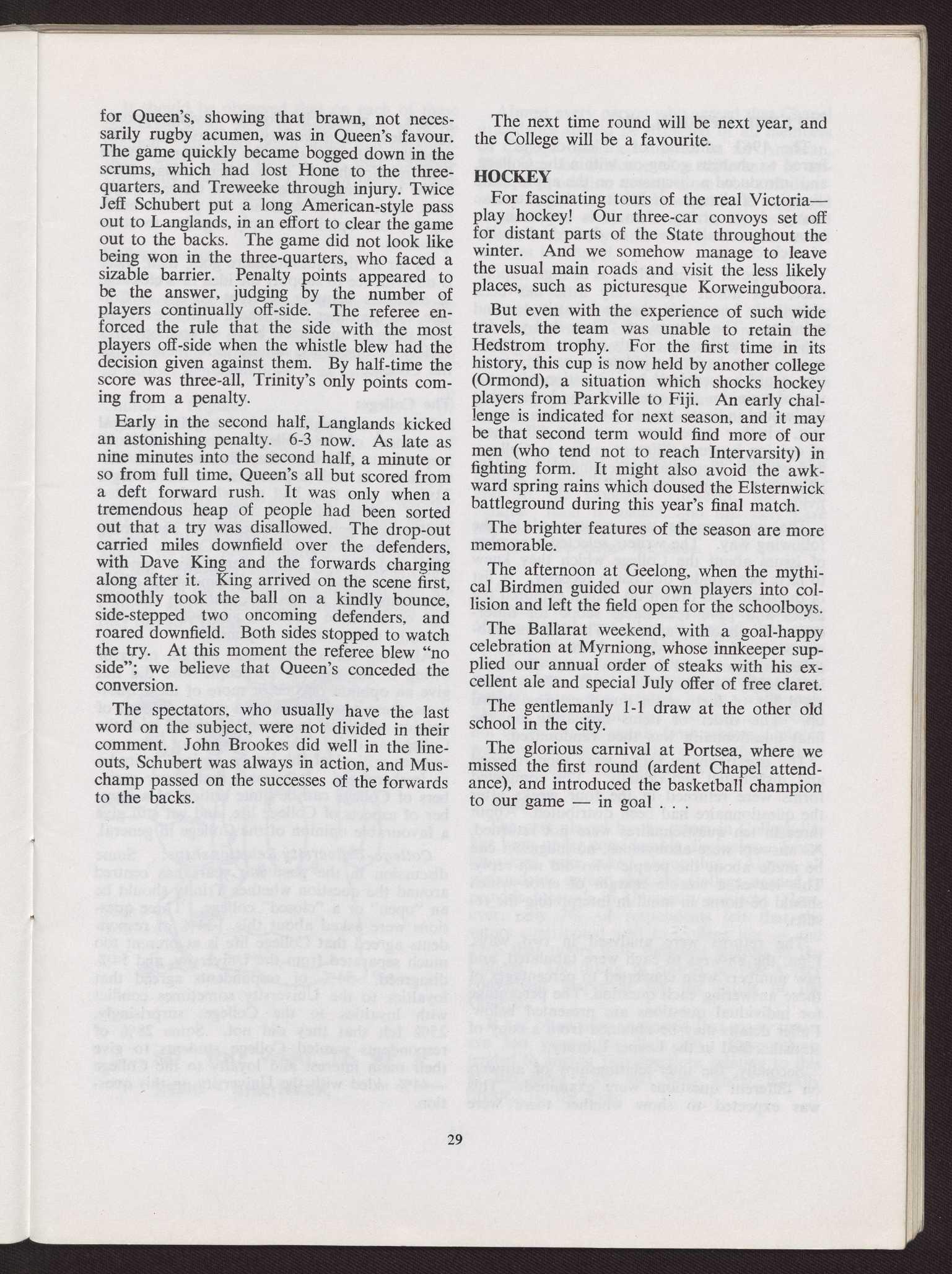
The next time round will be next year, and the College will be a favourite.
For fascinating tours of the real Victoria— play hockey! Our three-car convoys set off for distant parts of the State throughout the winter. And we somehow manage to leave the usual main roads and visit the less likely places, such as picturesque Korweinguboora.
But even with the experience of such wide travels, the team was unable to retain the Hedstrom trophy. For the first time in its history, this cup is now held by another college (Ormond), a situation which shocks hockey players from Parkville to Fiji. An early challenge is indicated for next season, and it may be that second term would find more of our men (who tend not to reach Intervarsity) in fighting form. It might also avoid the awkward spring rains which doused the Elsternwick battleground during this year's final match.
The brighter features of the season are more memorable.
The afternoon at Geelong, when the mythical Birdmen guided our own players into collision and left the field open for the schoolboys.
The Ballarat weekend, with a goal-happy celebration at Myrniong, whose innkeeper supplied our annual order of steaks with his excellent ale and special July offer of free claret.
The gentlemanly 1-1 draw at the other old school in the city.
The glorious carnival at Portsea, where we missed the first round (ardent Chapel attendance), and introduced the basketball champion to our game — in goal

The 1963 editorial of "Fleur-de-Lys" referred to changes going on within the College, and introduced a discussion on the appropriate direction of change. If it is true that extensive change is occurring, then it is important to know the actual, as well as desired, direction of such change.
One type of change which is of high importance, but about which very little has been objectively known, is change in attitudes and opinions. The editors of "Fleur-de-Lys" for 1964 and the writers of this report, felt that a much firmer basis for judgment on this question could be provided by a questionnaire survey of opinions this year. It was hoped that this would indicate the state of opinion at present, whether there were consistent differences of opinion between different groups in College, and whether there was something still identifiable as a "general attitude" towards College living.
The questionnaire was constructed in the following way. The writers selected a number of issues about the College which they knew to have been under discussion recently. A list of questions was drawn up, which explored the issues and gave reasonable scope for differences of opinion to appear. This list was submitted to four members of the College in different years and faculties, who discussed, individually, the items in detail. Then a revised list of forty-seven questions was drawn up. The order of items appearing on the final questionnaire was then randomized.
The questionnaire forms were then roneoed and distributed individually. 129 completed forms were returned in the four weeks after the questionnaire had been distributed. About three in ten questionnaires were not returned. As answers were anonymous, no judgment can be made about the people who did not reply. This leaves a sizable margin of error which should be borne in mind in interpreting the results.
The returns were analysed in two ways. First, the answers to each were tabulated, and raw numbers were converted to percentages of those answering each question. The percentage for individual questions are presented below. Fuller details may be obtained from a copy of statistics filed in the Leeper Library.
Secondly, the inter-relationships of answers on different questions were examined. This was expected to show whether there were
groups of people in College having opposed viewpoints on a variety of questions. The overall result was that the questions showed little relationship to each other. Apart from a few very similar questions on the same subjects, there was no tendency for persons holding any one opinion to reply together to other questions.
As far as this questionnaire goes, then, there is no evidence to support the idea of a cleavage of attitudes between different groups in College. On the other hand, there is little evidence that there is an agreed body of opinion on a variety of questions, among most members of the College.
Three questions were asked to gain a general assessment of the College's success. 82% of respondents felt that they had not been disappointed in their expectations of the College: 71% felt that they had got what they wanted out of College life; and 59% agreed that the College was generally successful in performing the functions of a University College. 10%, 11% and 16% of respondents gave opposite replies on these questions. Some 45% of respondents gave replies favourable to the College on all three questions and 5% gave consistently unfavourable responses.
Allowing for a substantial margin of error owing to the number of people who did not give an opinion on one or more of these questions, these results indicate a strong amount of opinion which is, in general, satisfied with the College as it is. This is in spite of other responses critical of the tutors, seniors' attitudes to freshers, etc. It appears that many members of College can be quite critical of a number of aspects of College life, and yet still give a favourable opinion of the College in general.
College- University Relationships: Some discussion in the past two years has centred around the question whether Trinity should be an "open" or a "closed" college. Three questions were asked about this. 34% of respondents agreed that College life is at present too much separated from the University, and 54% disagreed. 54% of respondents agreed that loyalties to the University sometimes conflict with loyalties to the College; surprisingly, 25% felt that they did not. Some 28% of respondents wanted College students to give their main interest and loyalty to the College —44% sided with the University on this question.
It should be observed that on each of these questions about 20% of respondents gave no opinion. This may mean either that the questions were badly framed, or that CollegeUniversity relationships have not been an issue for a sizable number of people.
Respondents were asked to state their religion. Not all responses were strictly comparable: but of the 125 persons answering the question, the estimated percentages adhering to various denominations is as follows:—
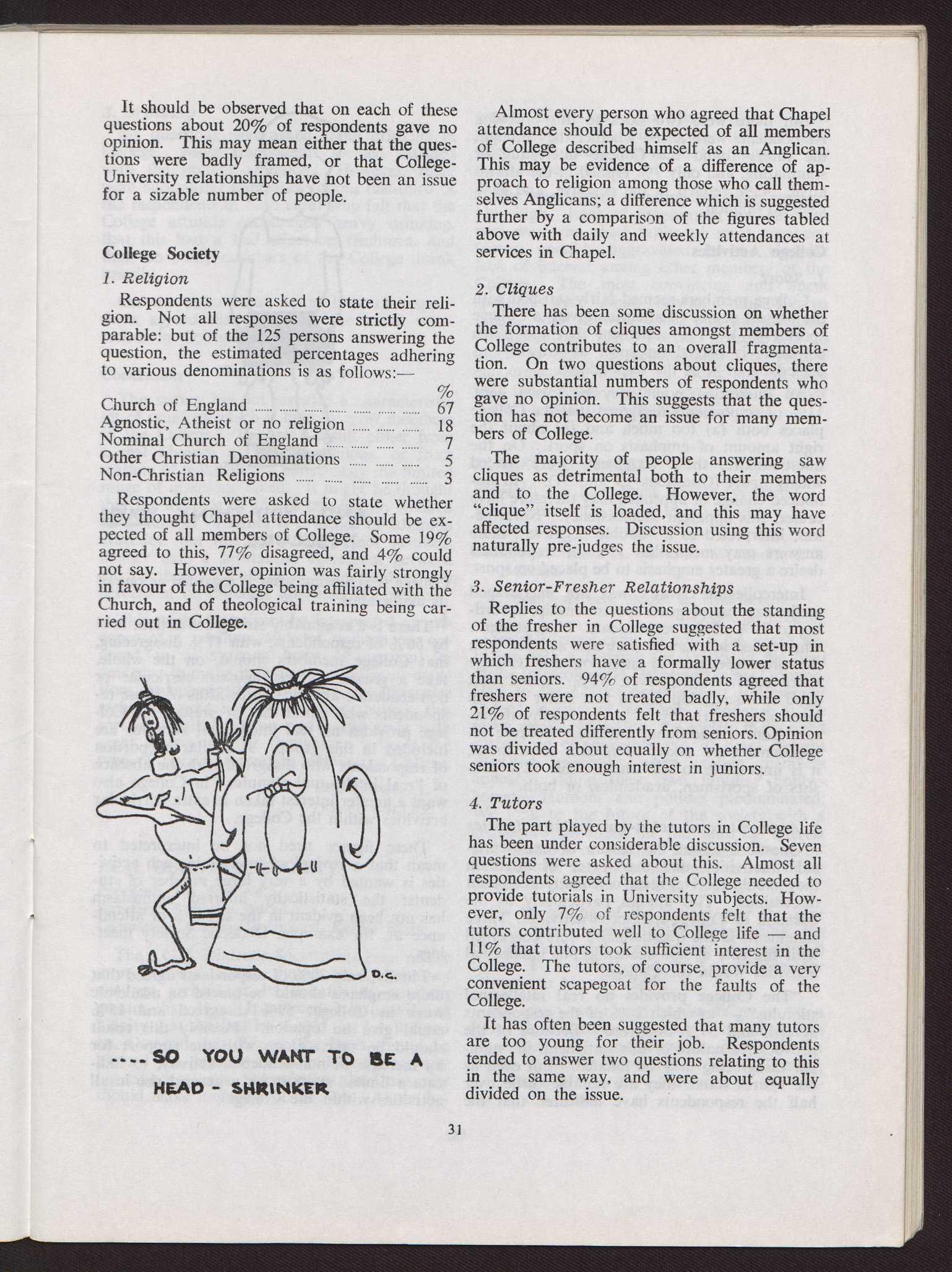
Respondents were asked to state whether they thought Chapel attendance should be expected of all members of College. Some 19% agreed to this, 77% disagreed, and 4% could not say. However, opinion was fairly strongly in favour of the College being affiliated with the Church, and of theological training being carried out in College.
Almost every person who agreed that Chapel attendance should be expected of all members of College described himself as an Anglican. This may be evidence of a difference of approach to religion among those who call themselves Anglicans; a difference which is suggested further by a comparison of the figures tabled above with daily and weekly attendances at services in Chapel.
There has been some discussion on whether the formation of cliques amongst members of College contributes to an overall fragmentation. On two questions about cliques, there were substantial numbers of respondents who gave no opinion. This suggests that the question has not become an issue for many members of College.
The majority of people answering saw cliques as detrimental both to their members and to the College. However, the word "clique" itself is loaded, and this may have affected responses. Discussion using this word naturally pre-judges the issue.
Replies to the questions about the standing of the fresher in College suggested that most respondents were satisfied with a set-up in which freshers have a formally lower status than seniors. 94% of respondents agreed that freshers were not treated badly, while only 21% of respondents felt that freshers should not be treated differently from seniors. Opinion was divided about equally on whether College seniors took enough interest in juniors.
The part played by the tutors in College life has been under considerable discussion. Seven questions were asked about this. Almost all respondents agreed that the College needed to provide tutorials in University subjects. However, only 7% of respondents felt that the tutors contributed well to College life — and 11% that tutors took sufficient interest in the College. The tutors, of course, provide a very convenient scapegoat for the faults of the College.
It has often been suggested that many tutors are too young for their job. Respondents tended to answer two questions relating to this in the same way, and were about equally divided on the issue.
But there were two sides to this problem. Respondents were asked whether they thought the tutors found the College interesting or stimulating, and only 9% replied in the affirmative. 43% replied in the negative, and 48% gave no opinion.
College members seemed fairly satisfied with the present degree of attention given to College sport (74%). The statement that too much emphasis is placed on sport at present was denied by 81% of the respondents.
An interesting point may be raised here. 11% of respondents disagreed that the College places both (a) too much and (b) about the right amount of emphasis on sport. On the questionnaire, these statements were spaced widely apart (Questions 13 and 31). An unnoticed change of approach may therefore have caused this apparent inconsistency. Nevertheless, interpreted as a "double negative", these answers may mean that 11% of respondents desire a greater emphasis to be placed on sport.
Intercollegiate rivalry was not encouraged at the expense of good sportsmanship, according to 71% of the respondents. Most students who replied in this way were also satisfied with the present degree of attention that College sport receives. However, 12% replied that good sportsmanship did in fact suffer through intercollegiate rivalry — a noteworthy departure from a traditional attitude. Because respondents were asked to remain anonymous, it is impossible to tell whether this 12% consists of sportsmen, academics, or both.
2. Academic and extra-curricular activities
Questions about the nature of extra-curricular activities, and the degree of attention they should receive, recur constantly in student discussions. This applies particularly to the question of College-sponsored activities. Three statements in the questionnaire were concerned with the role of non-academic but intellectual activities within the College.
"The College provides no real intellectual stimulus" — to which 28% of the respondents agreed, and 59% disagreed. Because of the provocative nature of this statement, the number disagreeing may be inflated. But even as the figures stand, they are notable: little over half the respondents have indicated that the
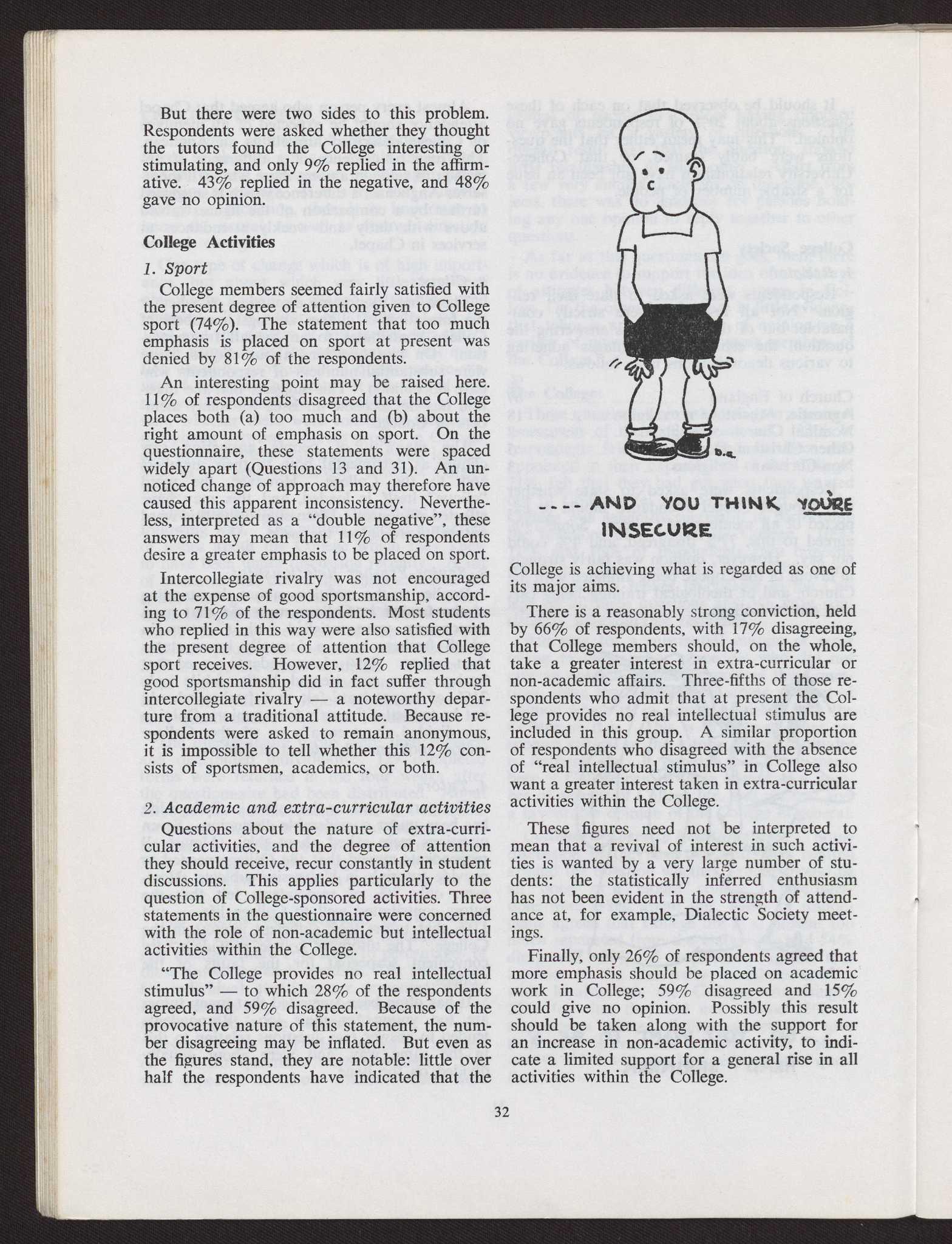
College is achieving what is regarded as one of its major aims.
There is a reasonably strong conviction, held by 66% of respondents, with 17% disagreeing, that College members should, on the whole, take a greater interest in extra-curricular or non-academic affairs. Three-fifths of those respondents who admit that at present the College provides no real intellectual stimulus are included in this group. A similar proportion of respondents who disagreed with the absence of "real intellectual stimulus" in College also want a greater interest taken in extra-curricular activities within the College.
These figures need not be interpreted to mean that a revival of interest in such activities is wanted by a very large number of students: the statistically inferred enthusiasm has not been evident in the strength of attendance at, for example, Dialectic Society meetings.
Finally, only 26% of respondents agreed that more emphasis should be placed on academic work in College; 59% disagreed and 15% could give no opinion. Possibly this result should be taken along with the support for an increase in non-academic activity, to indicate a limited support for a general rise in all activities within the College.
Six questions were asked about drinking in College. Most respondents seemed satisfied with the present situation. However, there were substantial minorities (about one-third of the respondents in each case) who felt that the College attitude encouraged heavy drinking, that this had a bad effect on freshmen, and that too many members of the College drank heavily.
On the other hand, some 19% of respondents agreed that there was too much wowserism in College.
Conclusion
This survey has not revealed a characteristic set of opinions which is held by most members of the College. This may result either from a real absence of agreed opinions, or from matters of technique — particularly the limited range of questions asked. It might be thought that the absence of groups consistently divided on a number of issues is evidence of common attitudes: but this conclusion is not justified. Rather than a substantial agreement between all members of College, a fairly random disagreement on different questions is observed.
This might tentatively be interpreted as evidence of a common style of opinion (as opposed to a common body of opinion): a tendency to make judgments on different questions independently. But the questionnaire technique used has itself a bias towards this sort of result, and the results can only with great reservations be thought to indicate the type of opinion-formation within the College.
BOB CONNELL. DOUG MILLER.
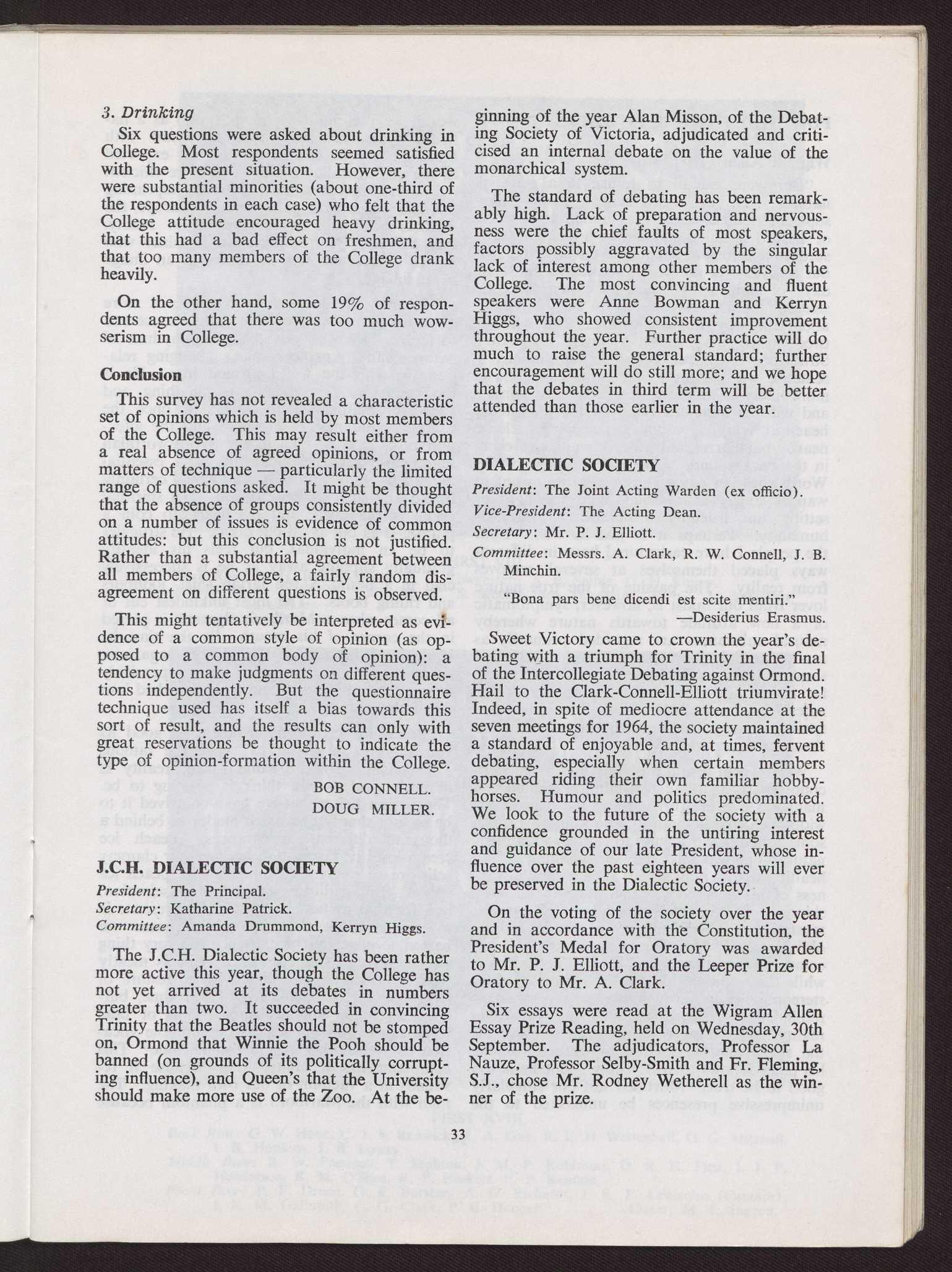
J.C.H.
President: The Principal.
Secretary: Katharine Patrick.
Committee: Amanda Drummond, Kerryn Higgs.
The J.C.H. Dialectic Society has been rather more active this year, though the College has not yet arrived at its debates in numbers greater than two. It succeeded in convincing Trinity that the Beatles should not be stomped on, Ormond that Winnie the Pooh should be banned (on grounds of its politically corrupting influence), and Queen's that the University should make more use of the Zoo. At the be-
ginning of the year Alan Misson, of the Debating Society of Victoria, adjudicated and criticised an internal debate on the value of the monarchical system.
The standard of debating has been remarkably high. Lack of preparation and nervousness were the chief faults of most speakers, factors possibly aggravated by the singular lack of interest among other members of the College. The most convincing and fluent speakers were Anne Bowman and Kerryn Higgs, who showed consistent improvement throughout the year. Further practice will do much to raise the general standard; further encouragement will do still more; and we hope that the debates in third term will be better attended than those earlier in the year.
President: The Joint Acting Warden (ex officio).
Vice-President: The Acting Dean.
Secretary: Mr. P. J. Elliott.
Committee: Messrs. A. Clark, R. W. Connell, J. B. Minchin.
"Bona pars bene dicendi est scite mentiri."
—Desiderius Erasmus.
Sweet Victory came to crown the year's debating with a triumph for Trinity in the final of the Intercollegiate Debating against Ormond. Hail to the Clark-Connell-Elliott triumvirate! Indeed, in spite of mediocre attendance at the seven meetings for 1964, the society maintained a standard of enjoyable and, at times, fervent debating, especially when certain members appeared riding their own familiar hobbyhorses. Humour and politics predominated. We look to the future of the society with a confidence grounded in the untiring interest and guidance of our late President, whose influence over the past eighteen years will ever be preserved in the Dialectic Society.
On the voting of the society over the year and in accordance with the Constitution, the President's Medal for Oratory was awarded to Mr. P. J. Elliott, and the Leeper Prize for Oratory to Mr. A. Clark.
Six essays were read at the Wigram Allen Essay Prize Reading, held on Wednesday, 30th September. The adjudicators, Professor La Nauze, Professor Selby-Smith and Fr. Fleming, S.J., chose Mr. Rodney Wetherell as the winner of the prize.
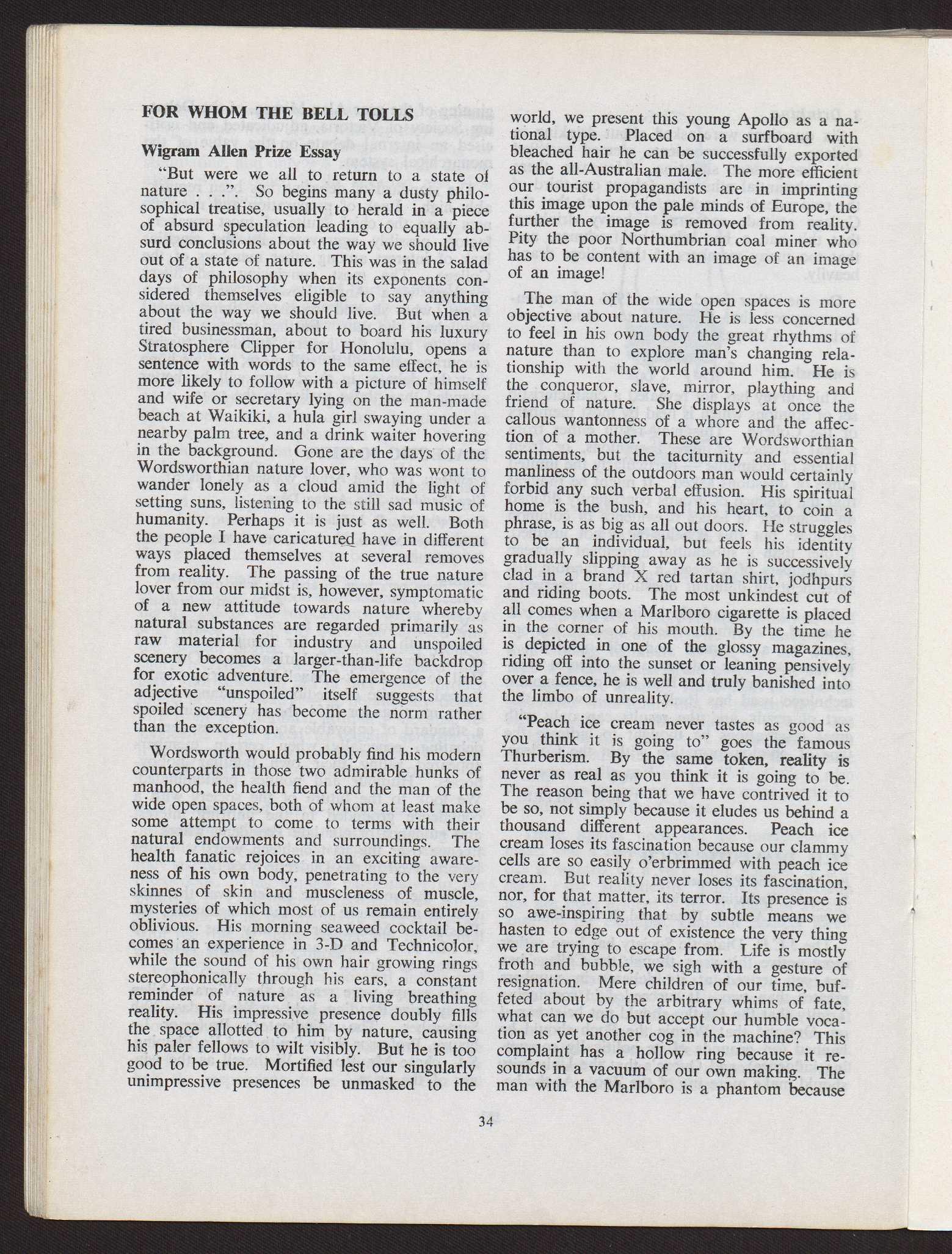
Wigram Allen Prize Essay
"But were we all to return to a state of nature ...". So begins many a dusty philo sophical treatise, usually to herald in a piece of absurd speculation leading to equally absurd conclusions about the way we should live out of a state of nature. This was in the salad days of philosophy when its exponents considered themselves eligible to say anything about the way we should live. But when a tired businessman, about to board his luxury Stratosphere Clipper for Honolulu, opens a sentence with words to the same effect, he is more likely to follow with a picture of himself and wife or secretary lying on the man-made beach at Waikiki, a hula girl swaying under a nearby palm tree, and a drink waiter hovering in the background. Gone are the days of the Wordsworthian nature lover, who was wont to wander lonely as a cloud amid the light of setting suns, listening to the still sad music of humanity. Perhaps it is just as well. Both the people I have caricatured have in different ways placed themselves at several removes from reality. The passing of the true nature lover from our midst is, however, symptomatic of a new attitude towards nature whereby natural substances are regarded primarily as raw material for industry and unspoiled scenery becomes a larger-than-life backdrop for exotic adventure. The emergence of the adjective "unspoiled" itself suggests that spoiled scenery has become the norm rather than the exception.
Wordsworth would probably find his modern counterparts in those two admirable hunks of manhood, the health fiend and the man of the wide open spaces, both of whom at least make some attempt to come to terms with their natural endowments and surroundings. The health fanatic rejoices in an exciting awareness of his own body, penetrating to the very skinnes of skin and muscleness of muscle, mysteries of which most of us remain entirely oblivious. His morning seaweed cocktail becomes an experience in 3-D and Technicolor, while the sound of his own hair growing rings stereophonically through his ears, a constant reminder of nature as a living breathing reality. His impressive presence doubly fills the space allotted to him by nature, causing. his paler fellows to wilt visibly. But he is too good to be true. Mortified lest our singularly unimpressive presences be unmasked to the
world, we present this young Apollo as a national type. Placed on a surfboard with bleached hair he can be successfully exported as the all-Australian male. The more efficient our tourist propagandists are in imprinting this image upon the pale minds of Europe, the further the image is removed from reality. Pity the poor Northumbrian coal miner who has to be content with an image of an image of an image!
The man of the wide open spaces is more objective about nature. He is less concerned to feel in his own body the great rhythms of nature than to explore man's changing relationship with the world around him. He is the conqueror, slave, mirror, plaything and friend of nature. She displays at once the callous wantonness of a whore and the affection of a mother. These are Wordsworthian sentiments, but the taciturnity and essential manliness of the outdoors man would certainly forbid any such verbal effusion. His spiritual home is the bush, and his heart, to coin a phrase, is as big as all out doors. He struggles to be an individual, but feels his identity gradually slipping away as he is successively clad in a brand X red tartan shirt, jodhpurs and riding boots. The most unkindest cut of all comes when a Marlboro cigarette is placed in the corner of his mouth. By the time he is depicted in one of the glossy magazines, riding off into the sunset or leaning pensively over a fence, he is well and truly banished into the limbo of unreality.
"Peach ice cream never tastes as good as you think it is going to" goes the famous Thurberism. By the same token, reality is never as real as you think it is going to be. The reason being that we have contrived it to be so, not simply because it eludes us behind a thousand different appearances. Peach ice cream loses its fascination because our clammy cells are so easily o'erbrimmed with peach ice cream. But reality never loses its fascination, nor, for that matter, its terror. Its presence is so awe-inspiring that by subtle means we hasten to edge out of existence the very thing we are trying to escape from. Life is mostly froth and bubble, we sigh with a gesture of resignation. Mere children of our time, buffeted about by the arbitrary whims of fate, what can we do but accept our humble vocation as yet another cog in the machine? This complaint has a hollow ring because it resounds in a vacuum of our own making. The man with the Marlboro is a phantom because
Back Row: A. H. Bainbridge, R. P. C. Lowenstern, S. B. Spittle, G. H. Ripper.
Middle Row: I. K. M. Galbraith, C. S. Keon-Cohen (Captain), R. G. A. a'Beckett, R. G. Larkins.
Front: G. D. Richards.
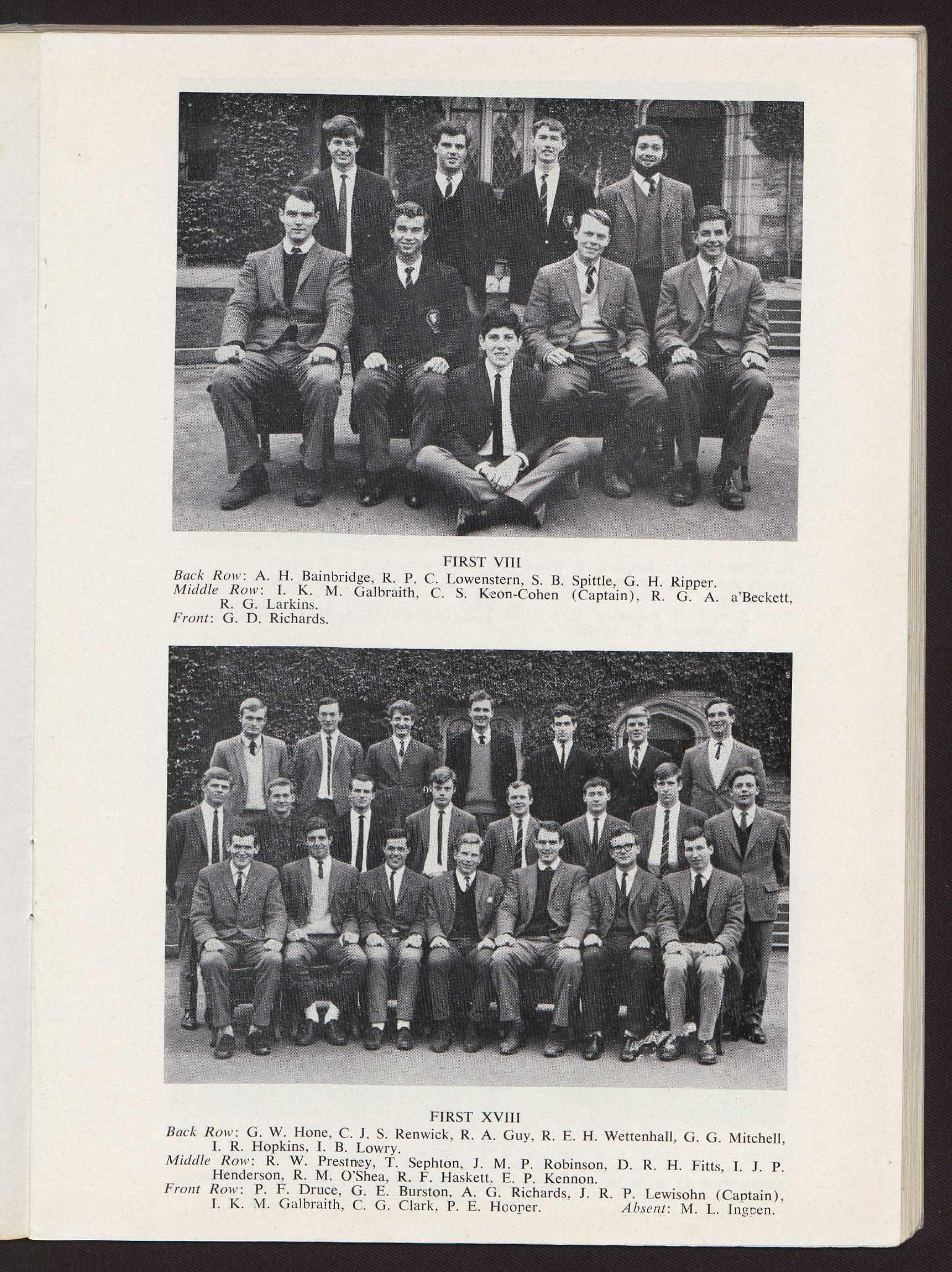
Back Row: G. W. Hone, C. J. S. Renwick, R. A. Guy, R. E. H. Wettenhall, G. G. Mitchell, I. R. Hopkins, I. B. Lowry.
Middle Row: R. W. Prestney, T. Sephton, J. M. P. Robinson, D. R. H. Fitts, I. J. P. Henderson, R. M. O'Shea, R. F. Hâskett, E. P. Kennon.
Front Row: P. F. Druce, G. E. Burston, A. G. Richards, J. R. P. Lewisohn (Captain), I. K. M. Galbraith, C. G. Clark, P. E. Hooper. Absent: M. L. Inggen.
Back Row: W. G. Martin, T. E. Blarney, M. J. Thwaites, A. J. R. Prentice.
Middle Row: D. A. Robbie, P. H. Gerrand, H. K. Colebatch, M. R. Gaylard, W. D. T. Cowan.
Front Row: T. H. Bainbridge, P. L. Field, V. S. Ramsden, G. H. Ripper (Captain), R. J. MacGregor, B. D. Grutzner.
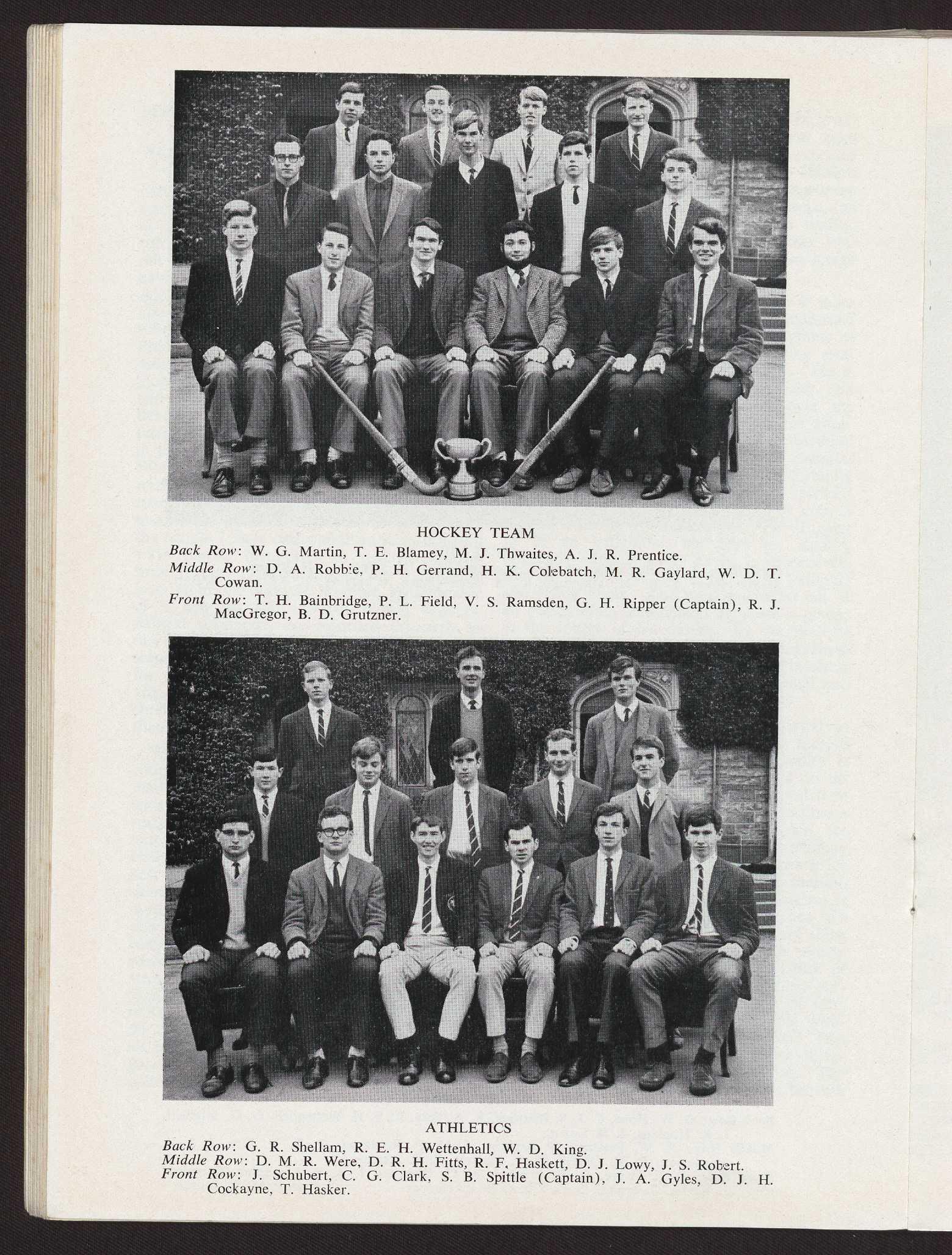
Back Row: G. R. Shellam, R. E. H. Wettenhall, W. D. King. Middle Row: D. M. R. Were, D. R. H. Fitts, R. F,
D. J. H.
Back Row: C. S. Keon-Cohen, J. H. H. Brookes, A. K. Heard. Middle Row: P. F. Druce, I. B. Lowry, H. McM. Wright (Captain), R. G. Larkins.
Front Row: J. Schubert, C. J. S. Renwick.

Back Row: J. Schubert, J. R. Fullerton, N. G. Ross, T. Hasker, R. G. a'Beckett, M. J. Thwaites.
Middle Row: D. M. R. Were, J. G. Stuckey, J. O. Langlands, W. S. Clarke, A. C. Archibald, K. J. F. Allen.
Front Row: G. J. Watts, F. C. Jackson, D. L. Harper, J. O. King, R. D. Weymouth, W. D. T. Cowan, R. G. Larkins.
Absent: A. Clark (Captain).
TRINITY COLLE(
Back Row: D. G. Gome, J. H. H. Brookes, R. E. H. Wettenhall, B. M. Armitage, I. R. Hons, R. M. O'Shea, M. R. Lane, G. J. Pullen, I. J. P. Henderson, R. K. Jackson, A. D. Míf K. J. F. Allen.
Second Row: R. W. Prestney, R. W. Connell, A. H. Bainbridge, W. T. McKay, J. R. Fu H. K. Colebatch, C. R. Dunstone, L. L. Jones Jnr., A. L. Yuncken, L. J. Buckland, C. G. Clark, R. F. Haskett, B. D. Grutzner, G. W. Hone.
Third. Row: S. G. Larkins, W. S. Kimpton, G. H. T. Wheler, J. E. Gardener, A. J. R. Prentice, Evans, K. R. Griffiths, M. W. Pearce, R. J. G. Smith, D. J. Fenton, R. J. MacGregor, Burston, P. E. Hooper, E. P. Kennon, J. B. Mitchell, C. D. McKellar, J. R. P. Lewisoh
Fourth Row: R. W. Fletcher, D. J. Lowy, M. P. C. Wentzell, R. L. Webb, J. F. McL. Oldham, S. B. Spittle, N. J. Alexander, J. D. B. Wells, J. A. Colebatch, W. D. T. Cowan, D. I. L. Barker, S. J. B. Williams, T. Sephton, G. R. Shellam, R. D. Pratt, I. B. Lowry, Stevens.
Fifth Row: R. G. Larkins, F. C. Jackson, J. B. Minchin, A. B. McPherson, E. J. White, M. Wilson, P. L. Field, R. H. Treweeke, J. O. King, P. F. Druce, G. H. Ripper, C. S. Keon A. J. Buzzard, D. J. H. Cockayne.
Front Row: M. R. Gaylard, N. G. Ross, P. F. Howard, R. A. Guy, C. E. Carter, P. J. Mitchell, Gaylard, J. M. Davis, D. S. Houghton, T. D. Buick, G. R. Davey, A. K. Gregson, G. D. E. Gallagher, R. G. A. a'Beckett, J. B. Somerset, W. S. Clarke, T. E. Blarney, J. Absent: S. A. H. Ames, A. Clark, D. D. Elder, L. B. Ellis, C. B. Gantner, R. C. Haddon, G. A. Mohr, R. M. L. Murray, P. Nisselle, L. G. J. Paynter, R. J. Peers, J. L. Pettit,
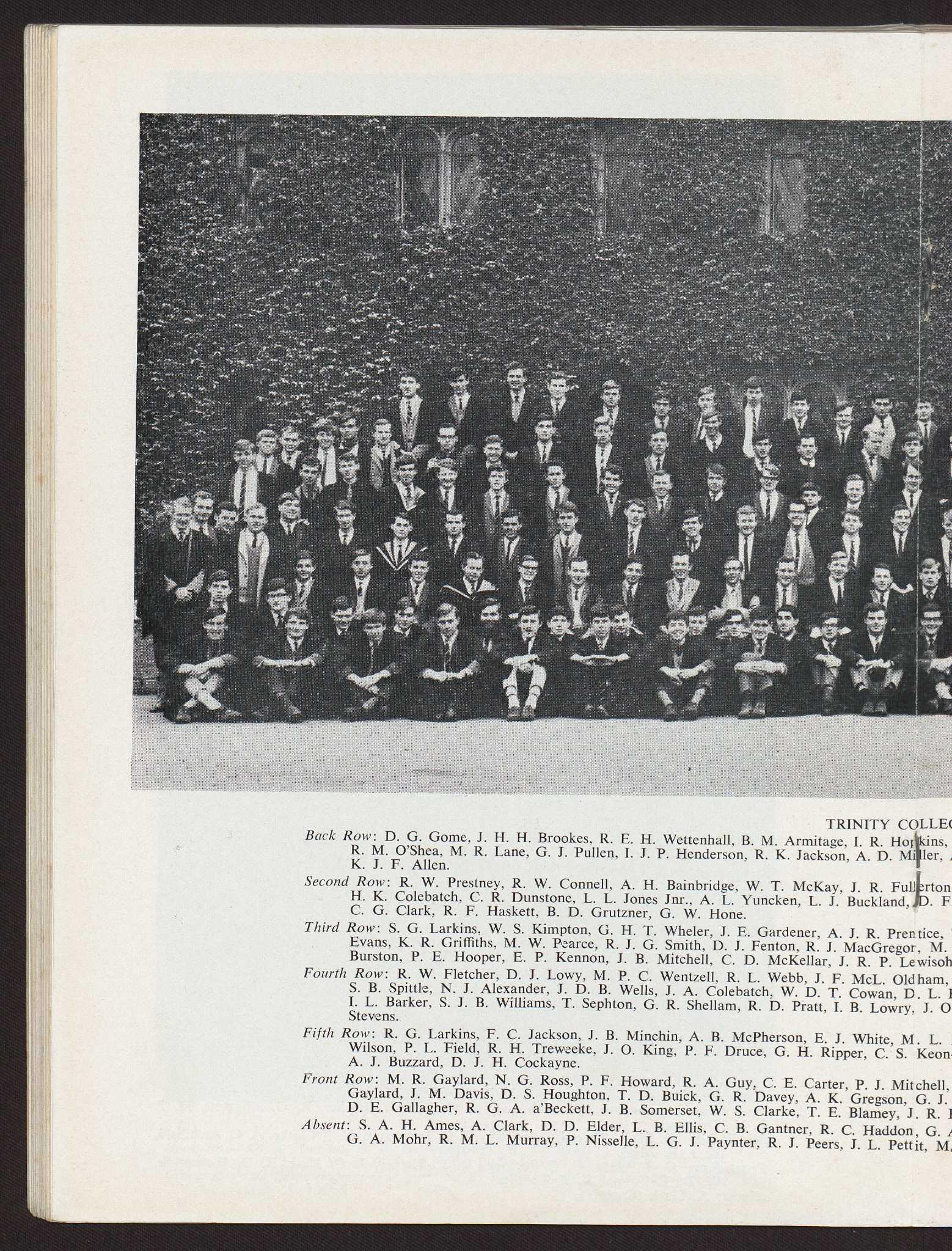
COLLEGE, 1964
ns, J. D. Corbet, D. J. E. King, T. Hasker, D. M. R. Were, R. R. Hammond, J. Schubert, ler, A. N. Stokes, A. K. Heard, G. G. Mitchell, C. J. Hamer, F. N. Cornell, J. G. Stuckey, rton, D. A. Robbie, A. W. Smith, A. T. Mitchell, T. H. Bainbridge, R. C. Oppenheim, . F. Hedger, J. G. W. Oliver, G. J. Watts, P. H. Gerrand, J. A. Gyles, W. G. Martin, Prentice, T. B. Minchin, G. J. Aplin, J. G. Down, D. S. Woodruff, J. R. W. Robinson, O. M. regor, M. Downing, W. F. Wilson, P. B. Greenberg, C. C. Creswell, C. J. S. Renwick, G. E. Lewisohn.
Old ham, R. D. Weymouth, D. W. Curtis, J. M. P. Robinson, A. G. Richards, J. S. Robert, D. L. Harper, M. J. Thwaites, P. J. Elliott, C. J. A. Game, V. S. Ramsden, W. S. Matheson, )wry, J. O'N. Brenan, H. McM. Wright, I. K. M. Galbraith, A. G. Bolton, J. G. Sellar, C. H. D. M. L. Ingpen, A. M. Mackinnon, N. B. Munro, W. E. S. Hasker, J. T. Dowling, J. R. E. Keon-Cohen, G. C. Rennie, H. W. Riggall, R. A. H. Wilson, W. J. Wakefield, P. F. Carnley, Mitchell, P. J. Hughes, R. G. Miller, R. M. C. Nankivell, A. L. Stewart, G. D. Richards, S. L. G. J. Saba, P. A. Guy, R. P. C. Lowenstern, P. A. H. Spear, W. D. King, A. C. Archibald, J. R. Harrison, D. R. H. Fitts, R. F. Wetherell, R. K. Woodruff, A. G. Newman-Morris. Mon, G. A. Heath, J. A. Langlands, A. H. LePage, D. G. Longmuir, H. J. Lowe, R. E. Mather, it, M, C. I. Salvaris, R. B. Scott, C. Selby-Smith, G. R. Stiles, J. C. Wilson.
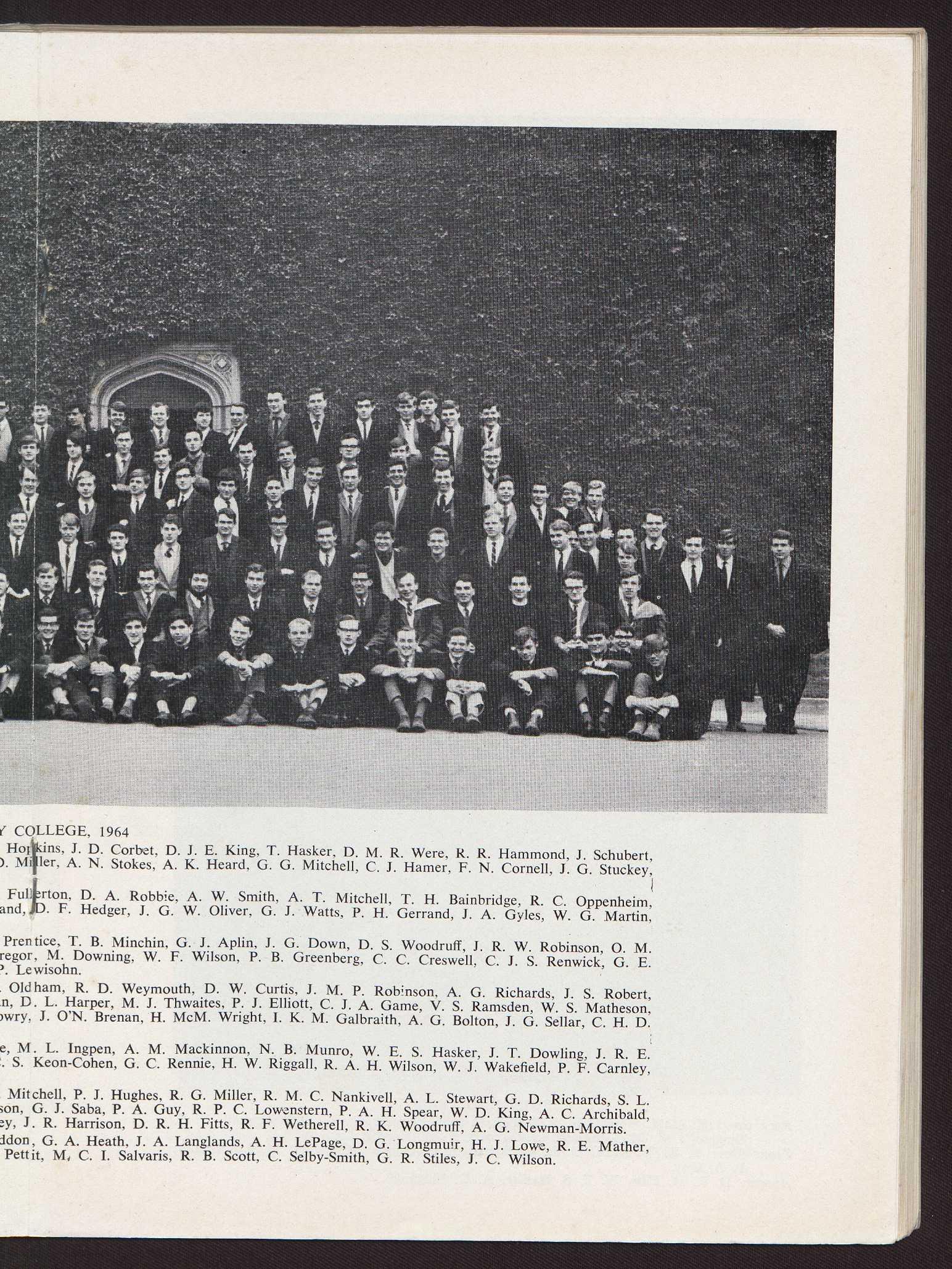

Back Row: H. McM. Wright, W. S. Clarke,, C. J. S. Renwick, Burston, I. K. M. Galbraith, I. B. Lowry, F. N. Cornell
Front Row: R. K. Woodruff, D. E. Gallagher, P. E. Hooper P. A. G uy.
Absent: D. R. H. Fitts, W. E. S. Hasker, A. G. Richards.
R. E. H. Wettenhall, G. E. (Captain), M. J. Thwaites,
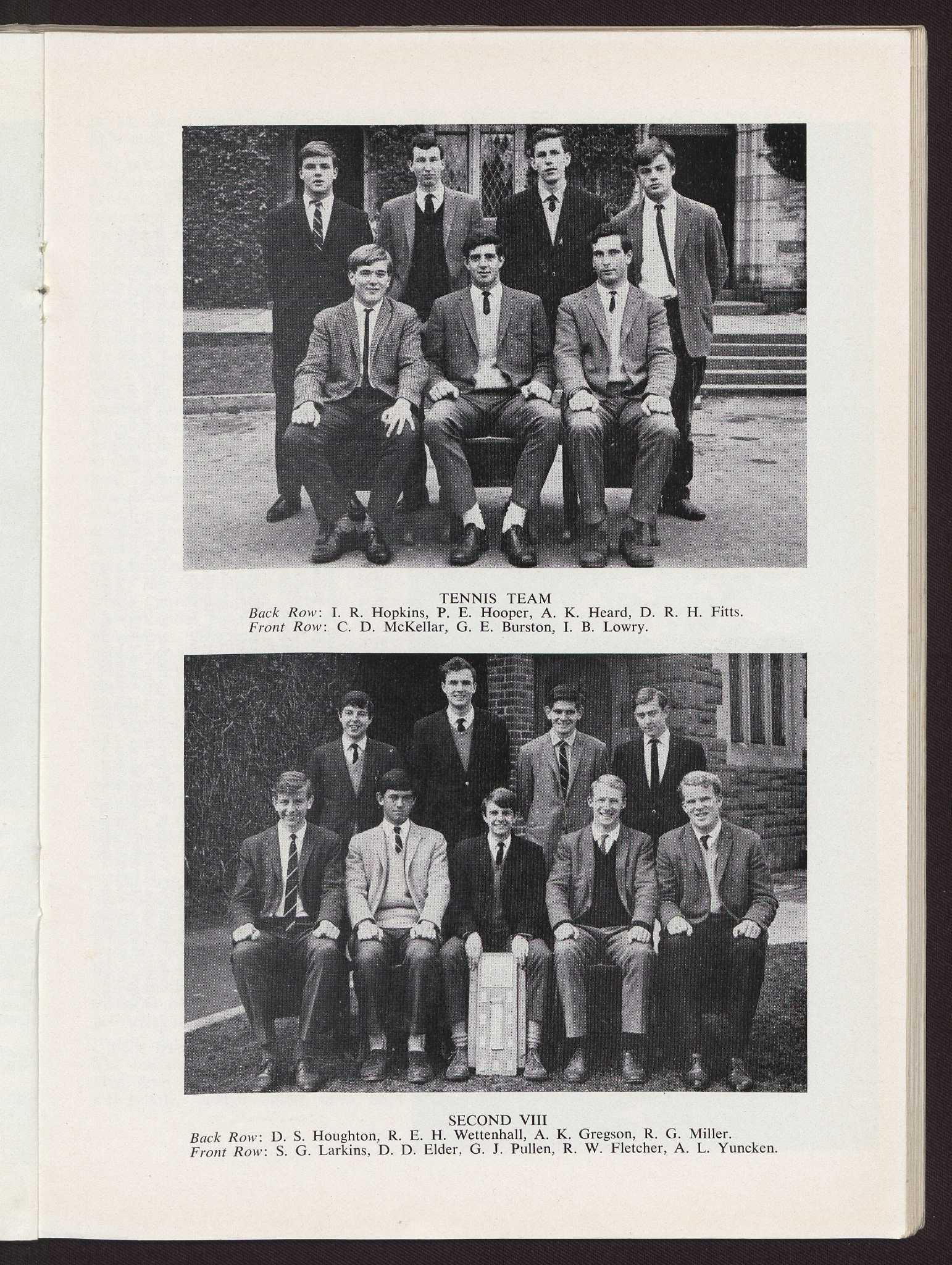
~ ~ 0 Q P ~ p R ";~EU ., ~â Q titi , • R Ó d 2.p ou gam. ~ ` Qa' T7 ocCb
ct / o u oa w âx O.7 0 A c , ~ o a, 00T''" cc
0« ,k aî (-) 4 0 ,_>-u,

i F, v ~ cdc ar
ó a~~i ó~ ~ti ai L) x imv]
x x 0 0 C7top.C7 ) w 0 0 0
4 °' ..4 Q ° ti ~'c 0 C7.~â a' 0 U 3 4 •o b ° ä • W U g a',g
ÿ W w : tiU ~ ti i 0
• ~ x o 0 • o ~ . a c G P b Ú c . a a Po ti â ÿ a s o 'óg F) < `] i ° G o t~ óI a 0 § w â R p U Q 5 W
z y Ä a? a' Ó i 42 i A â ¢ ° ,s1 cd ti , ) b ~ Â, o ,
EmaC7 `a ~ ~ > c t . ~ ° AQ a'. y > m 0 $.. ~ - â' 3 C.) c a ni ~ ?„, â~~2 (L) • , 4 a Nan A a' o ~ u "o ~ ó ~ ~ â ~ CU p f C o ti :d ~ g I) o
go ',74 0 • 9 ca, c, 4 PQ w ~ 1:° g' 2 g-9 3, °' 7 g >=ca vi âC3GQ d~ —
~° b ~~ ~rn , g -5, °ti ~Â ~cP.v' w o z h >)
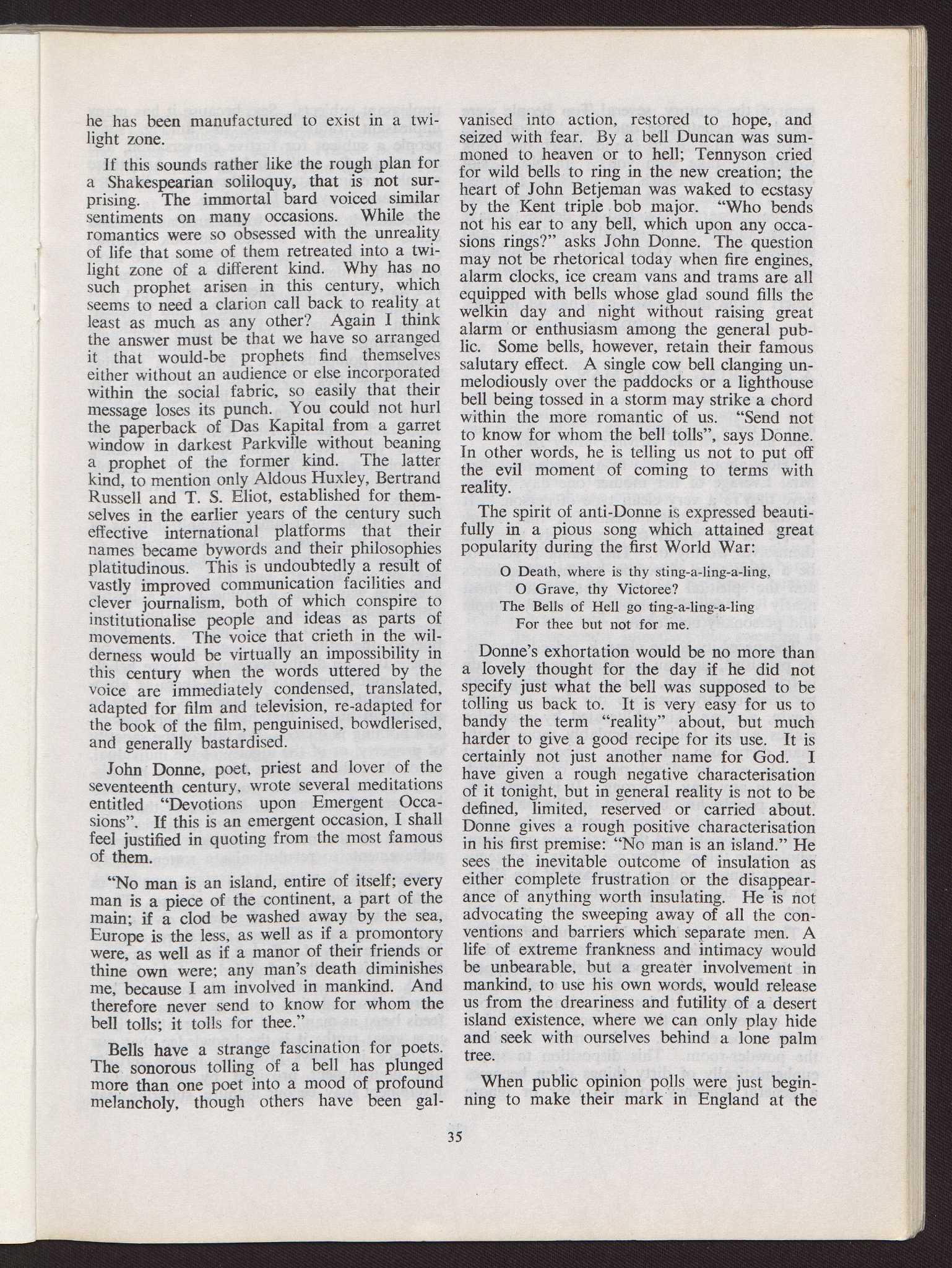
he has been manufactured to exist in a twilight zone.
If this sounds rather like the rough plan for a Shakespearian soliloquy, that is not surprising. The immortal bard voiced similar sentiments on many occasions. While the romantics were so obsessed with the unreality of life that some of them retreated into a twilight zone of a different kind. Why has no such prophet arisen in this century, which seems to need a clarion call back to reality at least as much as any other? Again I think the answer must be that we have so arranged it that would-be prophets find themselves either without an audience or else incorporated within the social fabric, so easily that their message loses its punch. You could not hurl the paperback of Das Kapital from a garret window in darkest Parkville without beaning a prophet of the former kind. The latter kind, to mention only Aldous Huxley, Bertrand Russell and T. S. Eliot, established for themselves in the earlier years of the century such effective international platforms that their names became bywords and their philosophies platitudinous. This is undoubtedly a result of vastly improved communication facilities and clever journalism, both of which conspire to institutionalise people and ideas as parts of movements. The voice that crieth in the wilderness would be virtually an impossibility in this century when the words uttered by the voice are immediately condensed, translated, adapted for film and television, re-adapted for the book of the film, penguinised, bowdlerised, and generally bastardised.
John Donne, poet, priest and lover of the seventeenth century, wrote several meditations entitled "Devotions upon Emergent Occasions". If this is an emergent occasion, I shall feel justified in quoting from the most famous of them.
"No man is an island, entire of itself; every man is a piece of the continent, a part of the main; if a clod be washed away by the sea, Europe is the less, as well as if a promontory were, as well as if a manor of their friends or thine own were; any man's death diminishes nie, because I am involved in mankind. And therefore never send to know for whom the bell tolls; it tolls for thee."
Bells have a strange fascination for poets. The sonorous tolling of a bell has plunged more than one poet into a mood of profound melancholy, though others have been gal-
vanised into action, restored to hope, and seized with fear. By a bell Duncan was summoned to heaven or to hell; Tennyson cried for wild bells to ring in the new creation; the heart of John Betjeman was waked to ecstasy by the Kent triple bob major. "Who bends not his ear to any bell, which upon any occasions rings?" asks John Donne. The question may not be rhetorical today when fire engines, alarm clocks, ice cream vans and trams are all equipped with bells whose glad sound fills the welkin day and night without raising great alarm ' or enthusiasm among the general public. Some bells, however, retain their famous salutary effect. A single cow bell clanging unmelodiously over the paddocks or a lighthouse bell being tossed in a storm may strike a chord within the more romantic of us. "Send not to know for whom the bell tolls", says Donne. In other words, he is telling us not to put off the evil moment of coming to terms with reality.
The spirit of anti-Donne is expressed beautifully in a pious song which attained great popularity during the first World War:
O Death, where is thy sting-a-ling-a-ling, O Grave, thy Victoree?
The Bells of Hell go ting-a-ling-a-ling For thee but not for me.
Donne's exhortation would be no more than a lovely thought for the day if he did not specify just what the bell was supposed to be tolling us back to. It is very easy for us to bandy the term "reality" about, but much harder to give a good recipe for its use. It is certainly not just another name for God. I have given a rough negative characterisation of it tonight, but in general reality is not to be defined, limited, reserved or carried about. Donne gives a rough positive characterisation in his first premise: "No man is an island." He sees the inevitable outcome of insulation as either complete frustration or the disappearance of anything worth insulating. He is not advocating the sweeping away of all the conventions and barriers which separate men. A life of extreme frankness and intimacy would be unbearable, but a greater involvement in mankind, to use his own words, would release us from the dreariness and futility of a desert island existence, where we can only play hide and seek with ourselves behind a lone palm tree.
When public opinion polls were just beginning to make their mark in England at the
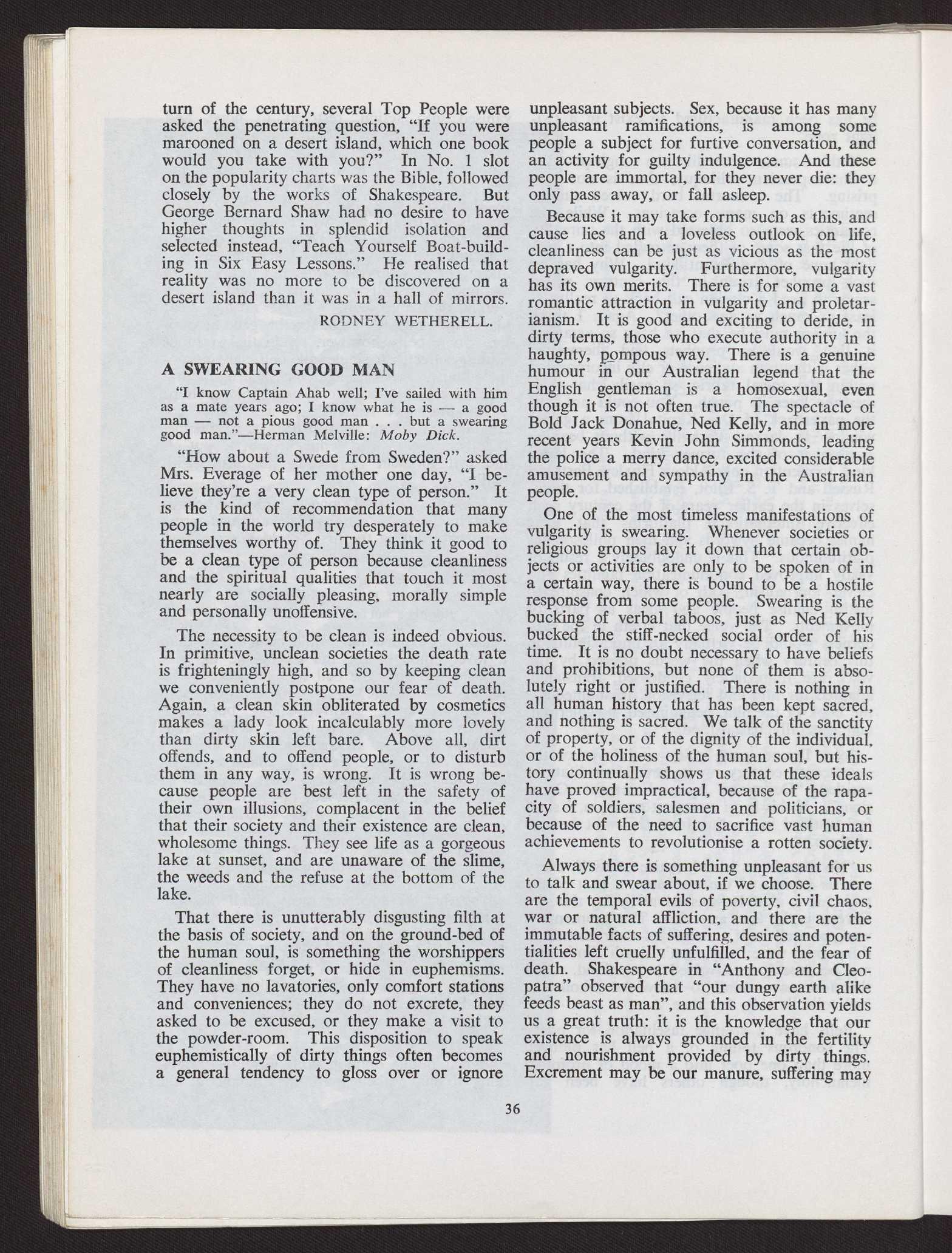
turn of the century, several Top People were asked the penetrating question, "If you were marooned on a desert island, which one book would you take with you?" In No. 1 slot on the popularity charts was the Bible, followed closely by the works of Shakespeare. But George Bernard Shaw had no desire to have higher thoughts in splendid isolation and selected instead, "Teach Yourself Boat-building in Six Easy Lessons." He realised that reality was no more to be discovered on a desert island than it was in a hall of mirrors.
RODNEY WETHERELL.
"I know Captain Ahab well; I've sailed with him as a mate years ago; I know what he is — a good man — not a pious good man . . . but a swearing good man."—Herman Melville: Moby Dick.
"How about a Swede from Sweden?" asked Mrs. Everage of her mother one day, "I believe they're a very clean type of person." It is the kind of recommendation that many people in the world try desperately to make themselves worthy of. They think it good to be a clean type of person because cleanliness and the spiritual qualities that touch it most nearly are socially pleasing, morally simple and personally unoffensive.
The necessity to be clean is indeed obvious. In primitive, unclean societies the death rate is frighteningly high, and so by keeping clean we conveniently postpone our fear of death. Again, a clean skin obliterated by cosmetics makes a lady look incalculably more lovely than dirty skin left bare. Above all, dirt offends, and to offend people, or to disturb them in any way, is wrong. It is wrong because people are best left in the safety of their own illusions, complacent in the belief that their society and their existence are clean, wholesome things. They see life as a gorgeous lake at sunset, and are unaware of the slime, the weeds and the refuse at the bottom of the lake.
That there is unutterably disgusting filth at the basis of society, and on the ground-bed of the human soul, is something the worshippers of cleanliness forget, or hide in euphemisms. They have no lavatories, only comfort stations and conveniences; they do not excrete, they asked to be excused, or they make a visit to the powder-room. This disposition to speak euphemistically of dirty things often becomes a general tendency to gloss over or ignore
unpleasant subjects. Sex, because it has many unpleasant ramifications, is among some people a subject for furtive conversation, and an activity for guilty indulgence. And these people are immortal, for they never die: they only pass away, or fall asleep.
Because it may take forms such as this, and cause lies and a loveless outlook on life, cleanliness can be just as vicious as the most depraved vulgarity. Furthermore, vulgarity has its own merits. There is for some a vast romantic attraction in vulgarity and proletarianism. It is good and exciting to deride, in dirty terms, those who execute authority in a haughty, pompous way. There is a genuine humour in our Australian legend that the English gentleman is a homosexual, even though it is not often true. The spectacle of Bold Jack Donahue, Ned Kelly, and in more recent years Kevin John Simmonds, leading the police a merry dance, excited considerable amusement and sympathy in the Australian people.
One of the most timeless manifestations of vulgarity is swearing. Whenever societies or religious groups lay it down that certain objects or activities are only to be spoken of in a certain way, there is bound to be a hostile response from some people. Swearing is the bucking of verbal taboos, just as Ned Kelly bucked the stiff-necked social order of his time. It is no doubt necessary to have beliefs and prohibitions, but none of them is absolutely right or justified. There is nothing in all human history that has been kept sacred, and nothing is sacred. We talk of the sanctity of property, or of the dignity of the individual, or of the holiness of the human soul, but history continually shows us that these ideals have proved impractical, because of the rapacity of soldiers, salesmen and politicians, or because of the need to sacrifice vast human achievements to revolutionise a rotten society.
Always there is something unpleasant for us to talk and swear about, if we choose. There are the temporal evils of poverty, civil chaos, war or natural affliction, and there are the immutable facts of suffering, desires and potentialities left cruelly unfulfilled, and the fear of death. Shakespeare in "Anthony and Cleopatra" observed that "our dungy earth alike feeds beast as man", and this observation yields us a great truth: it is the knowledge that our existence is always grounded in the fertility and nourishment provided by dirty things. Excrement may be our manure, suffering may
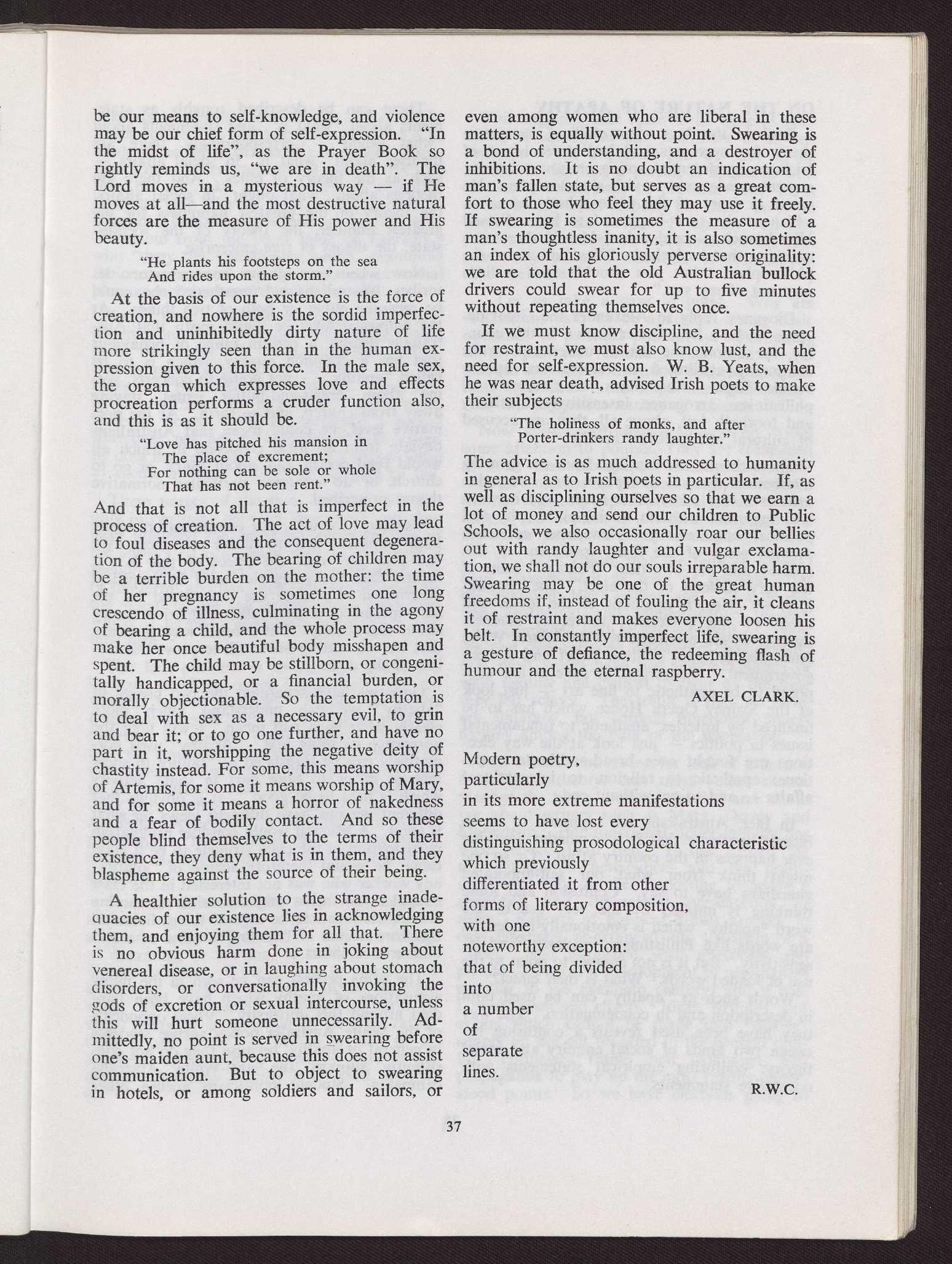
be our means to self-knowledge, and violence may be our chief form of self-expression. "In the midst of life", as the Prayer Book so rightly reminds us, "we are in death". The Lord moves in a mysterious way — if He moves at all—and the most destructive natural forces are the measure of His power and His beauty.
"He plants his footsteps on the sea And rides upon the storm."
At the basis of our existence is the force of creation, and nowhere is the sordid imperfection and uninhibitedly dirty nature of life more strikingly seen than in the human expression given to this force. In the male sex, the organ which expresses love and effects procreation performs a cruder function also, and this is as it should be.
"Love has pitched his mansion in The place of excrement; For nothing can be sole or whole That has not been rent."
And that is not all that is imperfect in the process of creation. The act of love may lead to foul diseases and the consequent degeneration of the body. The bearing of children may be a terrible burden on the mother: the time of her pregnancy is sometimes one long crescendo of illness, culminating in the agony of bearing a child, and the whole process may make her once beautiful body misshapen and spent. The child may be stillborn, or congenitally handicapped, or a financial burden, or morally objectionable. So the temptation is to deal with sex as a necessary evil, to grin and bear it; or to go one further, and have no part in it, worshipping the negative deity of chastity instead. For some, this means worship of Artemis, for some it means worship of Mary, and for some it means a horror of nakedness and a fear of bodily contact. And so these people blind themselves to the terms of their existence, they deny what is in them, and they blaspheme against the source of their being.
A healthier solution to the strange inadecluacies of our existence lies in acknowledging them, and enjoying them for all that. There is no obvious harm done in joking about venereal disease, or in laughing about stomach disorders, or conversationally invoking the gods of excretion or sexual intercourse, unless this will hurt someone unnecessarily. Admittedly, no point is served in swearing before one's maiden aunt, because this does not assist communication. But to object to swearing in hotels, or among soldiers and sailors, or
even among women who are liberal in these matters, is equally without point. Swearing is a bond of understanding, and a destroyer of inhibitions. It is no doubt an indication of man's fallen state, but serves as a great comfort to those who feel they may use it freely. If swearing is sometimes the measure of a man's thoughtless inanity, it is also sometimes an index of his gloriously perverse originality: we are told that the old Australian bullock drivers could swear for up to five minutes without repeating themselves once.
If we must know discipline, and the need for restraint, we must also know lust, and the need for self-expression. W. B. Yeats, when he was near death, advised Irish poets to make their subjects
"The holiness of monks, and after Porter-drinkers randy laughter."
The advice is as much addressed to humanity in general as to Irish poets in particular. If, as well as disciplining ourselves so that we earn a lot of money and send our children to Public Schools, we also occasionally roar our bellies out with randy laughter and vulgar exclamation, we shall not do our souls irreparable harm. Swearing may be one of the great human freedoms if, instead of fouling the air, it cleans it of restraint and makes everyone loosen his belt. In constantly imperfect life, swearing is a gesture of defiance, the redeeming flash of humour and the eternal raspberry.
AXEL CLARK.
Modern poetry, particularly in its more extreme manifestations seems to have lost every distinguishing prosodological characteristic which previously differentiated it from other forms of literary composition, with one noteworthy exception: that of being divided into a number of separate lines.
R.W.C.
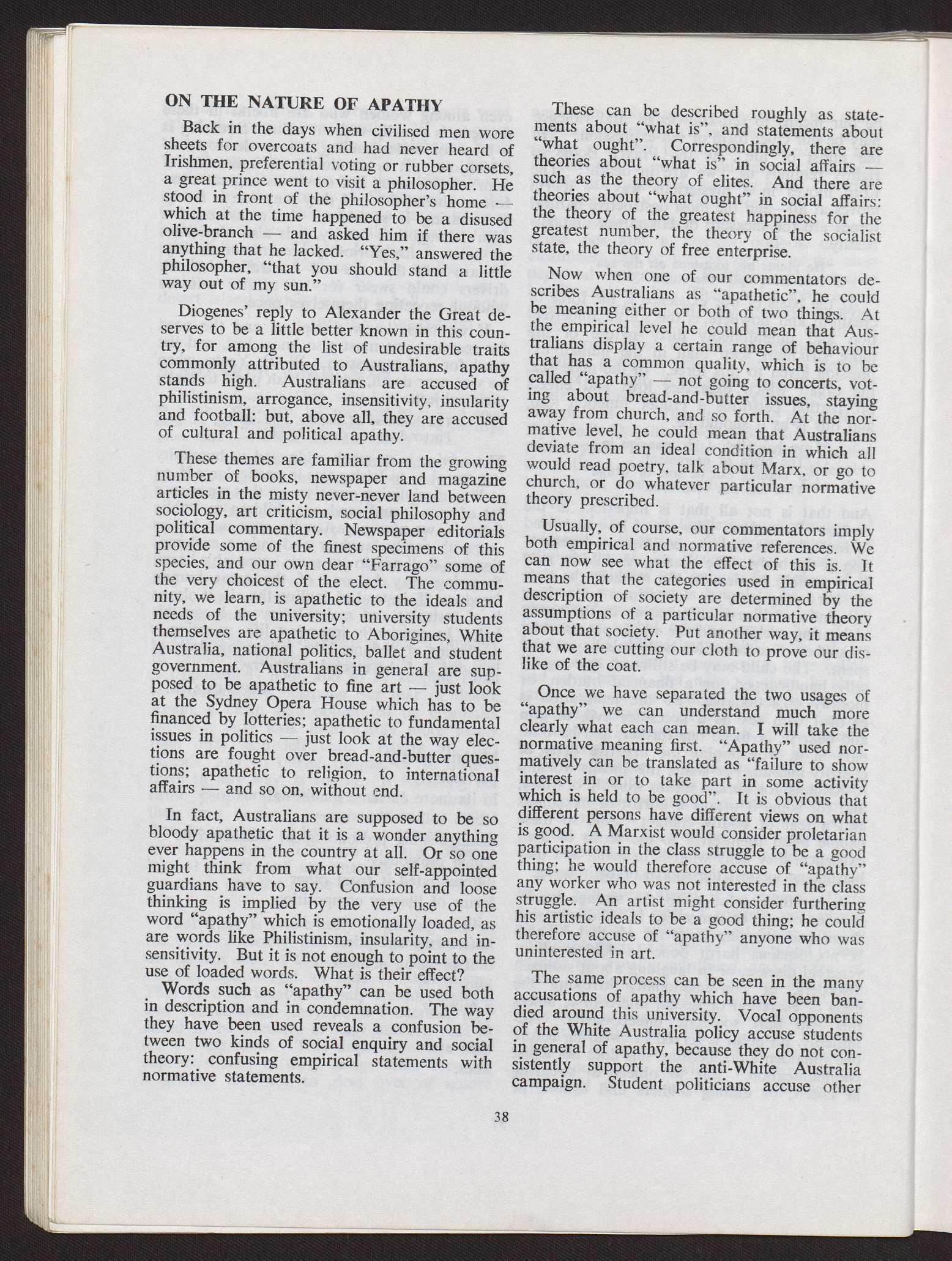
Back in the days when civilised men wore sheets for overcoats and had never heard of Irishmen, preferential voting or rubber corsets, a great prince went to visit a philosopher. He stood in front of the philosopher's home — which at the time happened to be a disused olive-branch — and asked him if there was anything that he lacked. "Yes," answered the philosopher, "that you should stand a little way out of my sun."
Diogenes' reply to Alexander the Great deserves to be a little better known in this country, for among the list of undesirable traits commonly attributed to Australians, apathy stands high. Australians are accused of philistinism, arrogance, insensitivity, insularity and football: but, above all, they are accused of cultural and political apathy.
These themes are familiar from the growing number of books, newspaper and magazine articles in the misty never-never land between sociology, art criticism, social philosophy and political commentary. Newspaper editorials provide some of the finest specimens of this species, and our own dear "Farrago" some of the very choicest of the elect. The community, we learn, is apathetic to the ideals and needs of the university; university students themselves are apathetic to Aborigines, White Australia, national politics, ballet and student government. Australians in general are supposed to be apathetic to fine art — just look at the Sydney Opera House which has to be financed by lotteries; apathetic to fundamental issues in politics — just look at the way elections are fought over bread-and-butter questions; apathetic to religion, to international affairs — and so on, without end.
In fact, Australians are supposed to be so bloody apathetic that it is a wonder anything ever happens in the country at all. Or so one might think from what our self-appointed guardians have to say. Confusion and loose thinking is implied by the very use of the word "apathy" which is emotionally loaded, as are words like Philistinism, insularity, and insensitivity. But it is not enough to point to the use of loaded words. What is their effect?
Words such as "apathy" can be used both in description and in condemnation. The way they have been used reveals a confusion between two kinds of social enquiry and social theory: confusing empirical statements with normative statements.
These can be described roughly as statements about "what is", and statements about "what ought". Correspondingly, there are theories about "what is" in social affairs — such as the theory of elites. And there are theories about "what ought" in social affairs: the theory of the greatest happiness for the greatest number, the theory of the socialist state, the theory of free enterprise.
Now when one of our commentators describes Australians as "apathetic", he could be meaning either or both of two things. At the empirical level he could mean that Australians display a certain range of behaviour that has a common quality, which is to be called "apathy" — not going to concerts, voting about bread-and-butter issues, staying away from church, and so forth. At the normative level, he could mean that Australians deviate from an ideal condition in which all would read poetry, talk about Marx, or go to church, or do whatever particular normative theory prescribed.
Usually, of course, our commentators imply both empirical and normative references. We can now see what the effect of this is. It means that the categories used in empirical description of society are determined by the assumptions of a particular normative theory about that society. Put another way, it means that we are cutting our cloth to prove our dislike of the coat.
Once we have separated the two usages of "apathy" we can understand much more clearly what each can mean. I will take the normative meaning first. "Apathy" used normatively can be translated as "failure to show interest in or to take part in some activity which is held to be good". It is obvious that different persons have different views on what is good. A Marxist would consider proletarian participation in the class struggle to be a good thing; he would therefore accuse of "apathy" any worker who was not interested in the class struggle. An artist might consider furthering his artistic ideals to be a good thing; he could therefore accuse of "apathy" anyone who was uninterested in art.
The same process can be seen in the many accusations of apathy which have been bandied around this university. Vocal opponents of the White Australia policy accuse students in general of apathy, because they do not consistently support the anti-White Australia campaign. Student politicians accuse other
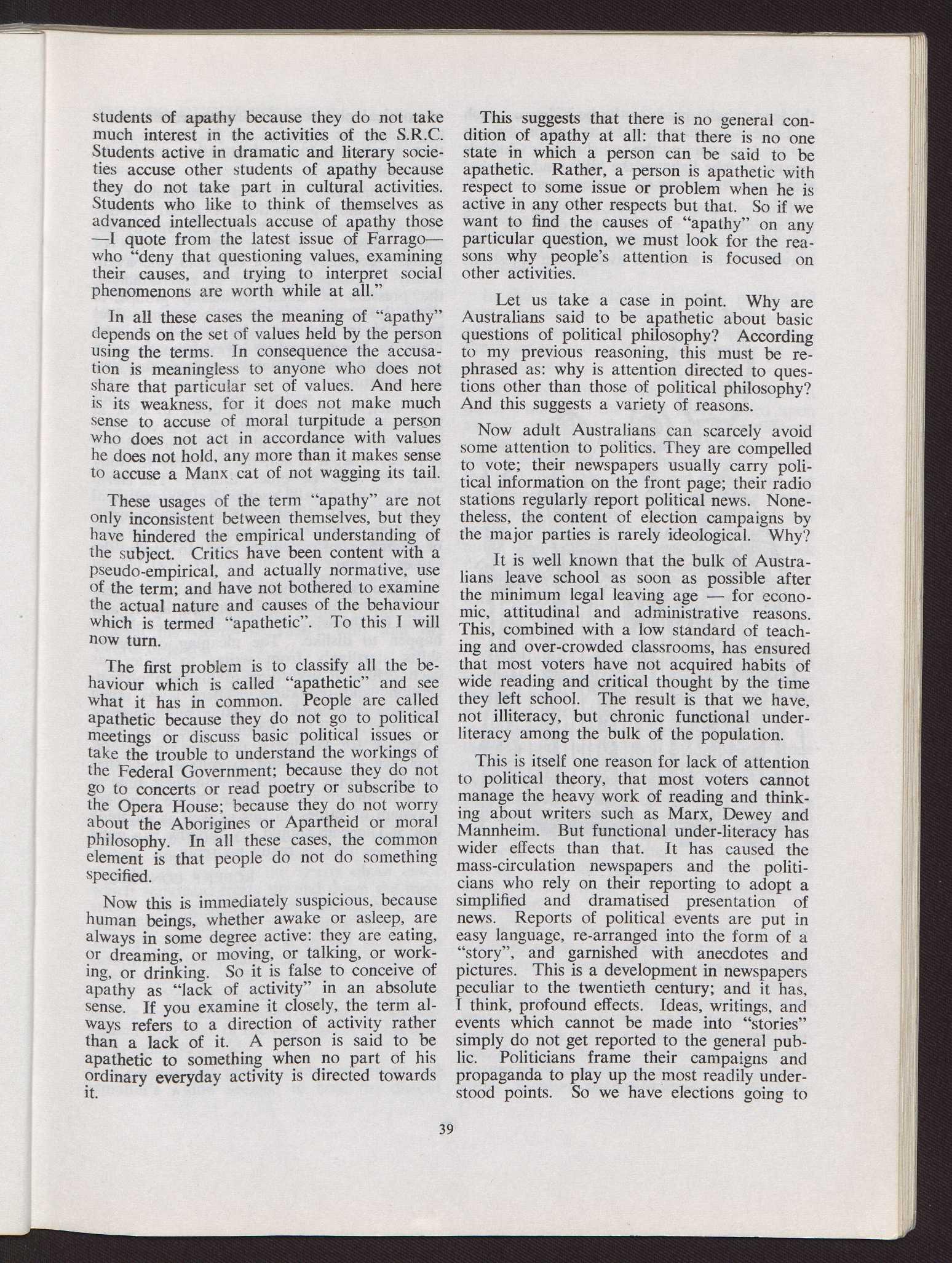
students of apathy because they do not take much interest in the activities of the S.R.C. Students active in dramatic and literary societies accuse other students of apathy because they do not take part in cultural activities. Students who like to think of themselves as advanced intellectuals accuse of apathy those —I quote from the latest issue of Farrago— who "deny that questioning values, examining their causes, and trying to interpret social phenomenons are worth while at all."
In all these cases the meaning of "apathy" depends on the set of values held by the person using the terms. In consequence the accusation is meaningless to anyone who does not share that particular set of values. And here is its weakness, for it does not make much sense to accuse of moral turpitude a person who does not act in accordance with values he does not hold, any more than it makes sense to accuse a Manx cat of not wagging its tail.
These usages of the term "apathy" are not only inconsistent between themselves, but they have hindered the empirical understanding of the subject. Critics have been content with a pseudo-empirical, and actually normative, use of the term; and have not bothered to examine the actual nature and causes of the behaviour which is termed "apathetic". To this I will now turn.
The first problem is to classify all the behaviour which is called "apathetic" and see what it has in common People are called apathetic because they do not go to political meetings or discuss basic political issues or take the trouble to understand the workings of the Federal Government; because they do not go to concerts or read poetry or subscribe to the Opera House; because they do not worry about the Aborigines or Apartheid or moral philosophy. In all these cases, the common element is that people do not do something specified.
Now this is immediately suspicious, because human beings, whether awake or asleep, are always in some degree active: they are eating, or dreaming, or moving, or talking, or working, or drinking. So it is false to conceive of apathy as "lack of activity" in an absolute sense. If you examine it closely, the term always refers to a direction of activity rather than a lack of it. A person is said to be apathetic to something when no part of his ordinary everyday activity is directed towards it.
This suggests that there is no general condition of apathy at all: that there is no one state in which a person can be said to be apathetic. Rather, a person is apathetic with respect to some issue or problem when he is active in any other respects but that. So if we want to find the causes of "apathy" on any particular question, we must look for the reasons why people's attention is focused on other activities.
Let us take a case in point. Why are Australians said to be apathetic about basic questions of political philosophy? According to my previous reasoning, this must be rephrased as: why is attention directed to questions other than those of political philosophy? And this suggests a variety of reasons.
Now adult Australians can scarcely avoid some attention to politics. They are compelled to vote; their newspapers usually carry political information on the front page; their radio stations regularly report political news. Nonetheless, the content of election campaigns by the major parties is rarely ideological. Why?
It is well known that the bulk of Australians leave school as soon as possible after the minimum legal leaving age — for economic, attitudinal and administrative reasons. This, combined with a low standard of teaching and over-crowded classrooms, has ensured that most voters have not acquired habits of wide reading and critical thought by the time they left school. The result is that we have, not illiteracy, but chronic functional underliteracy among the bulk of the population.
This is itself one reason for lack of attention to political theory, that most voters cannot manage the heavy work of reading and thinking about writers such as Marx, Dewey and Mannheim. But functional under-literacy has wider effects than that. It has caused the mass-circulation newspapers and the politicians who rely on their reporting to adopt a simplified and dramatised presentation of news. Reports of political events are put in easy language, re-arranged into the form of a "story", and garnished with anecdotes and pictures. This is a development in newspapers peculiar to the twentieth century; and it has, I think, profound effects. Ideas, writings, and events which cannot be made into "stories" simply do not get reported to the general public. Politicians frame their campaigns and propaganda to play up the most readily understood points. So we have elections going to
the leaders who produce the best slogans, such as Fisher's promise in 1914 to support Britain "to the last man and the last shilling"; Chifley's pursuit of "the light on the hill"; and Menzies' attack on "the thirty-six faceless men".
Thus we have a complex of causes focusing the attention of voters on the dramatic and simple issues in politics, and, in consequence, drawing their attention away from questions
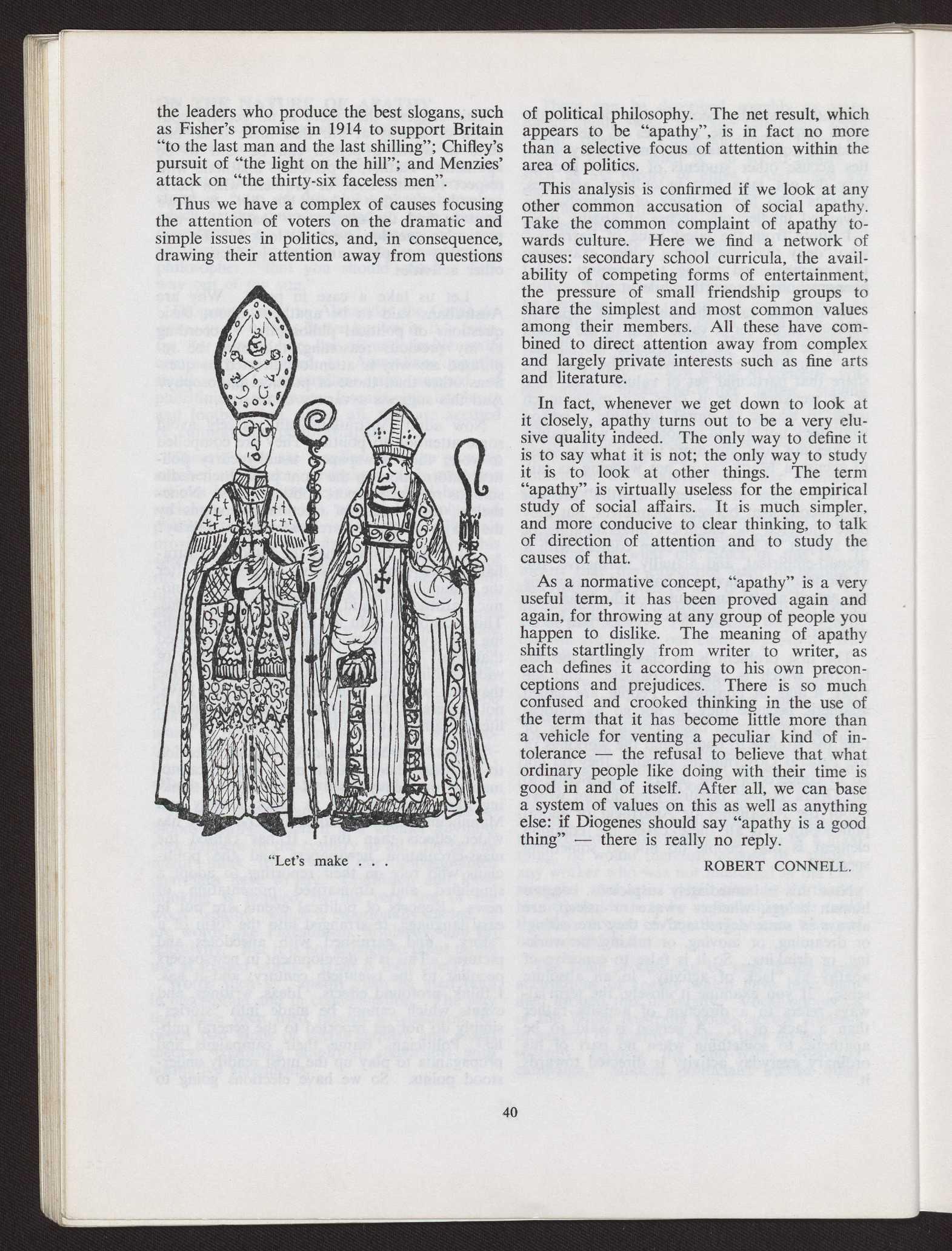
"Let's make . . .
of political philosophy. The net result, which appears to be "apathy", is in fact no more than a selective focus of attention within the area of politics.
This analysis is confirmed if we look at any other common accusation of social apathy. Take the common complaint of apathy towards culture. Here we find a network of causes: secondary school curricula, the availability of competing forms of entertainment, the pressure of small friendship groups to share the simplest and most common values among their members. All these have combined to direct attention away from complex and largely private interests such as fine arts and literature.
In fact, whenever we get down to look at it closely, apathy turns out to be a very elusive quality indeed. The only way to define it is to say what it is not; the only way to study it is to look at other things. The term "apathy" is virtually useless for the empirical study of social affairs. It is much simpler, and more conducive to clear thinking, to talk of direction of attention and to study the causes of that.
As a normative concept, "apathy" is a very useful term, it has been proved again and again, for throwing at any group of people you happen to dislike. The meaning of apathy shifts startlingly from writer to writer, as each defines it according to his own preconceptions and prejudices. There is so much confused and crooked thinking in the use of the term that it has become little more than a vehicle for venting a peculiar kind of intolerance — the refusal to believe that what ordinary people like doing with their time is good in and of itself. After all, we can base a system of values on this as well as anything else: if Diogenes should say "apathy is a good thing" — there is really no reply.
ROBERT CONNELL.
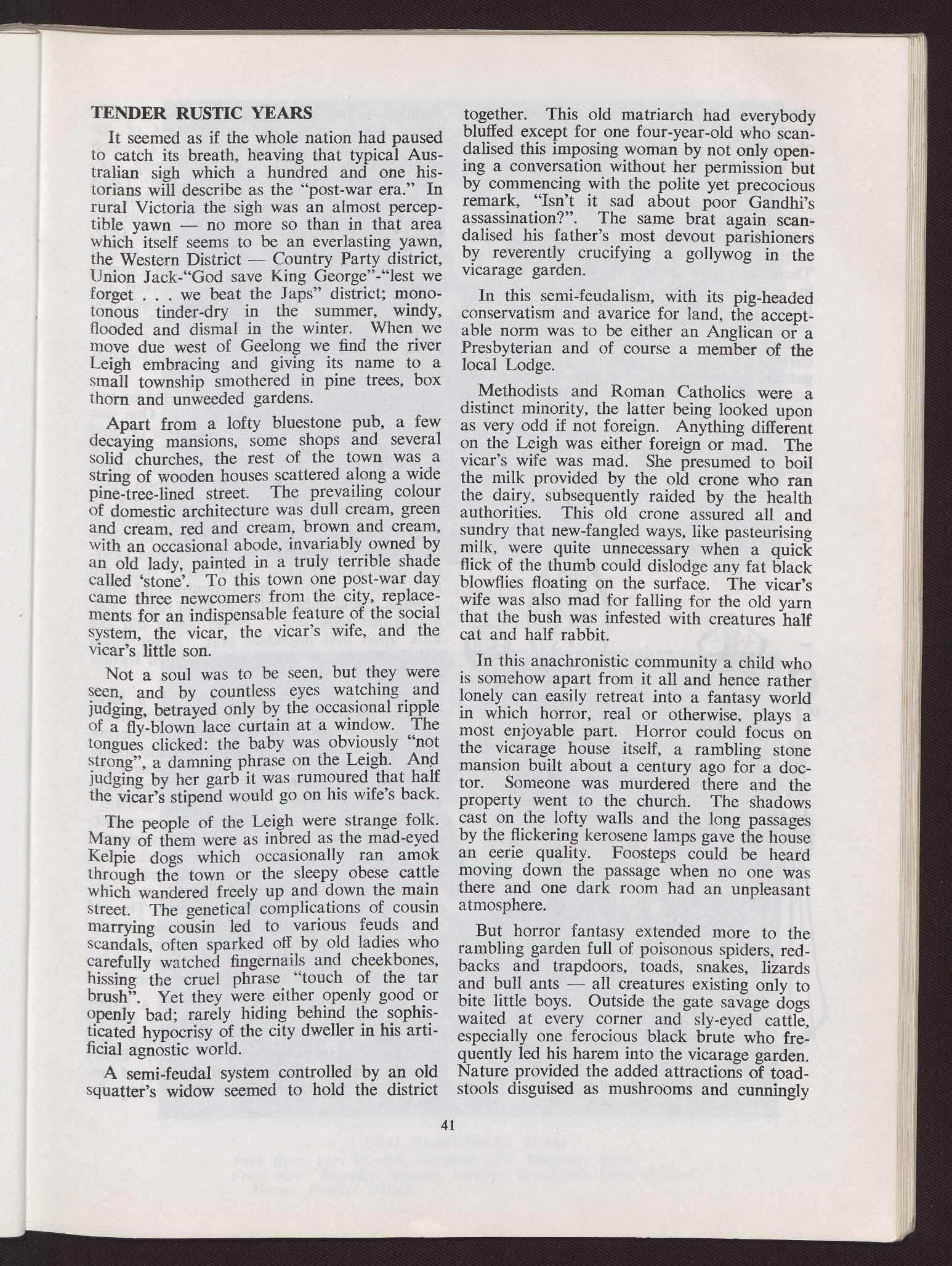
It seemed as if the whole nation had paused to catch its breath, heaving that typical Australian sigh which a hundred and one historians will describe as the "post-war era." In rural Victoria the sigh was an almost perceptible yawn — no more so than in that area which itself seems to be an everlasting yawn, the Western District — Country Party district, Union Jack-"God save King George"-"lest we forget . . . we beat the Japs" district; monotonous tinder-dry in the summer, windy, flooded and dismal in the winter. When we move due west of Geelong we find the river Leigh embracing and giving its name to a small township smothered in pine trees, box thorn and unweeded gardens.
Apart from a lofty bluestone pub, a few decaying mansions, some shops and several solid churches, the rest of the town was a string of wooden houses scattered along a wide pine-tree-lined street. The prevailing colour of domestic architecture was dull cream, green and cream, red and cream, brown and cream, with an occasional abode, invariably owned by an old lady, painted in a truly terrible shade called `stone'. To this town one post-war day came three newcomers from the city, replacements for an indispensable feature of the social system, the vicar, the vicar's wife, and the vicar's little son.
Not a soul was to be seen, but they were seen, and by countless eyes watching and judging, betrayed only by the occasional ripple of a fly-blown lace curtain at a window. The tongues clicked: the baby was obviously "not strong", a damning phrase on the Leigh. And judging by her garb it was rumoured that half the vicar's stipend would go on his wife's back.
The people of the Leigh were strange folk. Many of them were as inbred as the mad-eyed Kelpie dogs which occasionally ran amok through the town or the sleepy obese cattle which wandered freely up and down the main street. The genetical complications of cousin marrying cousin led to various feuds and scandals, often sparked off by old ladies who carefully watched fingernails and cheekbones, hissing the cruel phrase "touch of the tar brush". Yet they were either openly good or openly bad; rarely hiding behind the sophisticated hypocrisy of the city dweller in his artificial agnostic world.
A semi-feudal system controlled by an old squatter's widow seemed to hold the district
together. This old matriarch had everybody bluffed except for one four-year-old who scandalised this imposing woman by not only opening a conversation without her permission but by commencing with the polite yet precocious remark, "Isn't it sad about poor Gandhi's assassination?". The same brat again scandalised his father's most devout parishioners by reverently crucifying a gollywog in the vicarage garden.
In this semi-feudalism, with its pig-headed conservatism and avarice for land, the acceptable norm was to be either an Anglican or a Presbyterian and of course a member of the local Lodge.
Methodists and Roman Catholics were a distinct minority, the latter being looked upon as very odd if not foreign. Anything different on the Leigh was either foreign or mad. The vicar's wife was mad. She presumed to boil the milk provided by the old crone who ran the dairy, subsequently raided by the health authorities. This old crone assured all and sundry that new-fangled ways, like pasteurising milk, were quite unnecessary when a quick flick of the thumb could dislodge any fat black blowflies floating on the surface. The vicar's wife was also mad for falling for the old yarn that the bush was infested with creatures half cat and half rabbit.
In this anachronistic community a child who is somehow apart from it all and hence rather lonely can easily retreat into a fantasy world in which horror, real or otherwise, plays a most enjoyable part. Horror could focus on the vicarage house itself, a rambling stone mansion built about a century ago for a doctor. Someone was murdered there and the property went to the church. The shadows cast on the lofty walls and the long passages by the flickering kerosene lamps gave the house an eerie quality. Foosteps could be heard moving down the passage when no one was there and one dark room had an unpleasant atmosphere.
But horror fantasy extended more to the rambling garden full of poisonous spiders, redbacks and trapdoors, toads, snakes, lizards and bull ants — all creatures existing only to bite little boys. Outside the gate savage dogs waited at every corner and sly-eyed cattle, especially one ferocious black brute who frequently led his harem into the vicarage garden. Nature provided the added attractions of toadstools disguised as mushrooms and cunningly
p ace sties and boxthorn. Down at the river were slick black eels and goannas and, of course, the mysterious bunyip which could be heard hungering for little boys, especially when the older children were about.
There were also terrible people. The old milk lady was a witch (and not only children believed this), and considering some members of the ladies' guild, she was not the only one. There were gypsies passing through the town in battered pre-War American sedans with boots full of kidnapped children. There were swagmen, self-confessed cannibals carrying sinister black sacks. Above all, there was that dark furtive creature who crept around the garden at dusk carrying a large cylinder over one shoulder. Nose pressed to the window, a child could only shudder and shake with pure ghoulish joy.
Going on parochial visiting was a further delight for here fantasy was grounded in

. . an ecumenical gesture!"
reality. Three great squatters' homes added to a child's antiquarian impressions of the world. One was a perfect replica of a French chateau with chandeliers, marble paving, roc rococo alabaster mantlepieces and Louis Quinze furniture. Another near Meredith was an English manor, complete with a Palladian garden, sadly neglected oaken panelling, fourposter beds and armour. Yet another station homestead housed a large model of a Chinese pagoda complete with tiny bells to divert any child for hours. Alas, their virtual lords and ladies are now dead, their lands subdivided and homes demolished or "remodelled" by a generation which knows everything and values nothing.
Parochial visits were frequently paid to two spinster sisters who lived on a hill. One was small and sweet-faced, the other was fat and rather ugly. Both had warm hearts and an unrivalled capacity for producing rich clotted cream and monster sponges at afternoon tea— part of a local campaign or competition to fatten up the vicarage family. One afternoon after the family had arrived the great fat sister rushed up to the somewhat disconcerted vicarage child and shrieked "Now which sister am I?" The poor mite, lips a-tremble and mind a-blank, could only stutter the fatal reply: "Oh, you're the ugly one." Never again did she look upon that impudent brat. Never again did the afternoon teas quite equal their former creamy glory.
Another old maid lived alone on a large chicken farm and apparently had not heard that ankle-length black dresses with numerous petticoats and button-up boots were no longer worn in 1948. She provided the opportunity for the vicar's son to exercise the ancient right of the parochial tithe. "Do you keep chooks?" he asked, surely a rhetorical question considering that half a dozen had just wandered through the room. "Yes," she replied. "Do they lay eggs?" he asked. "Oh, yes," she happily replied. "People give us eggs," the bold child said in an inflexible tone. The old spinster, blushing and flustered, hurried to the egg supply as the vicar and his wife in a similar state gripped the sofa and prayed for the ground to open up and swallow them all.
Yet the budding little bailiff was a lonely child, with few playmates, except for visiting city cousins and the occasional bishop, and who could play games with a bishop? Every morning at nine he joined that army of unseen little playmates who solemnly obey the
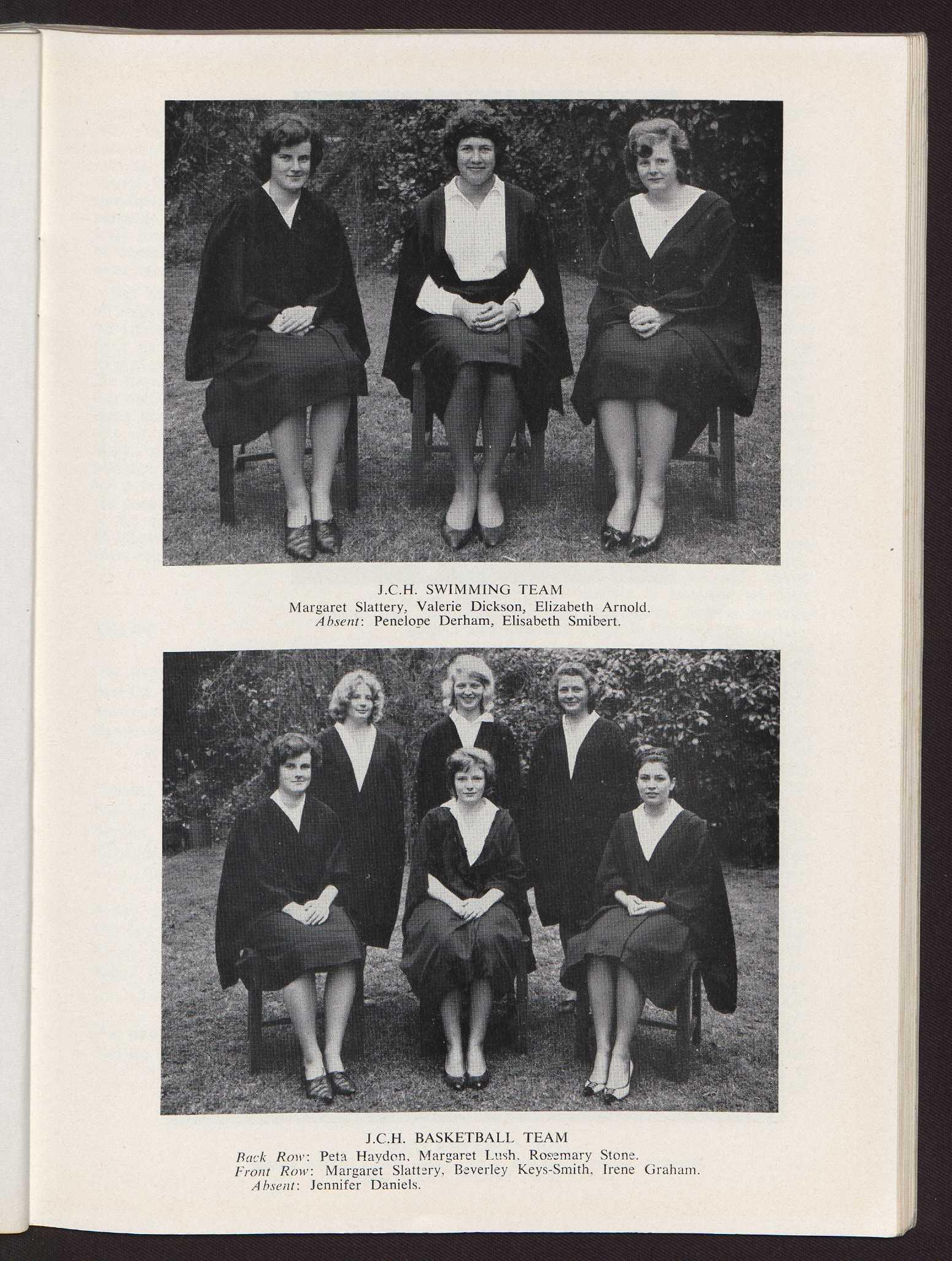
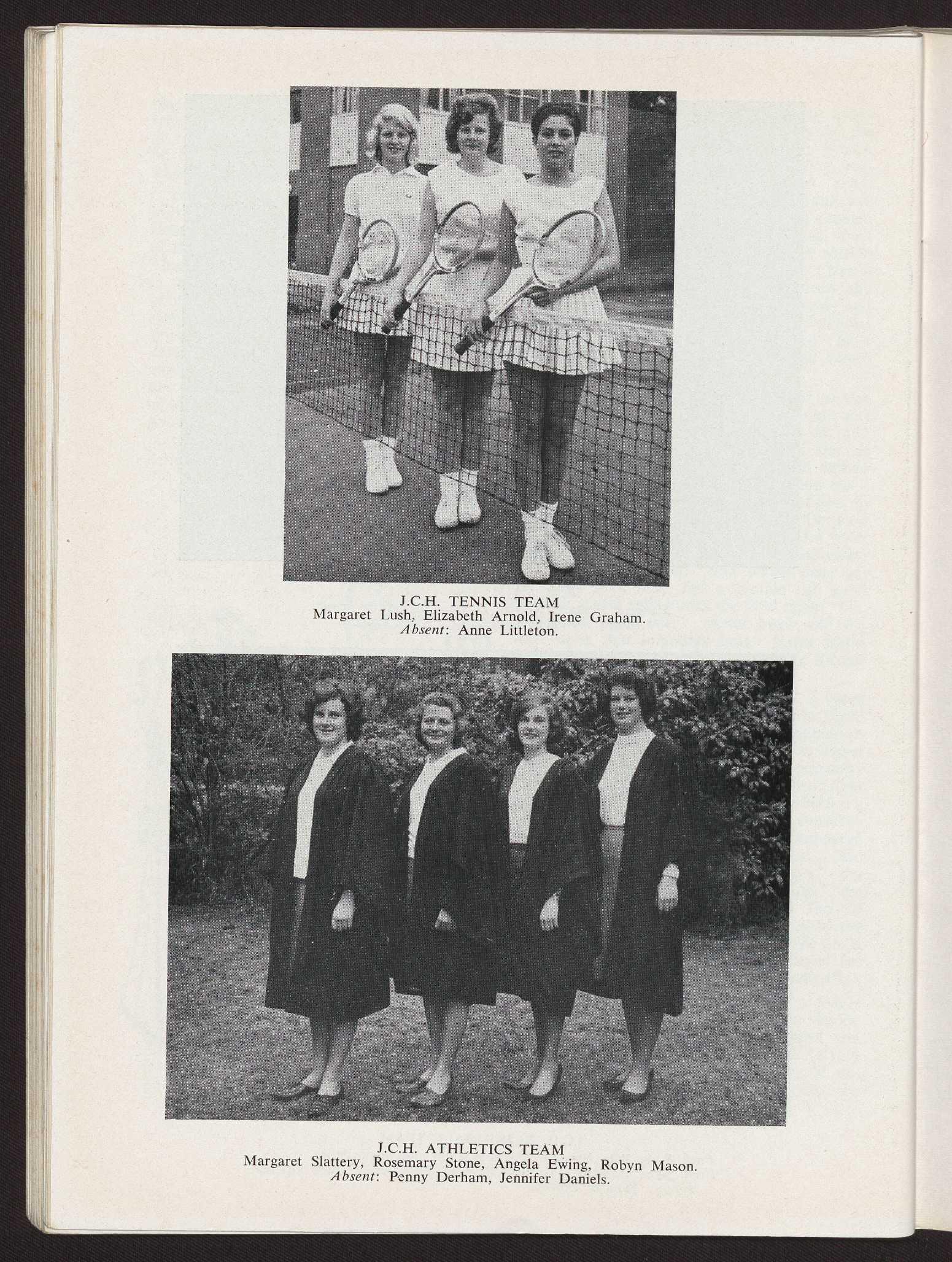
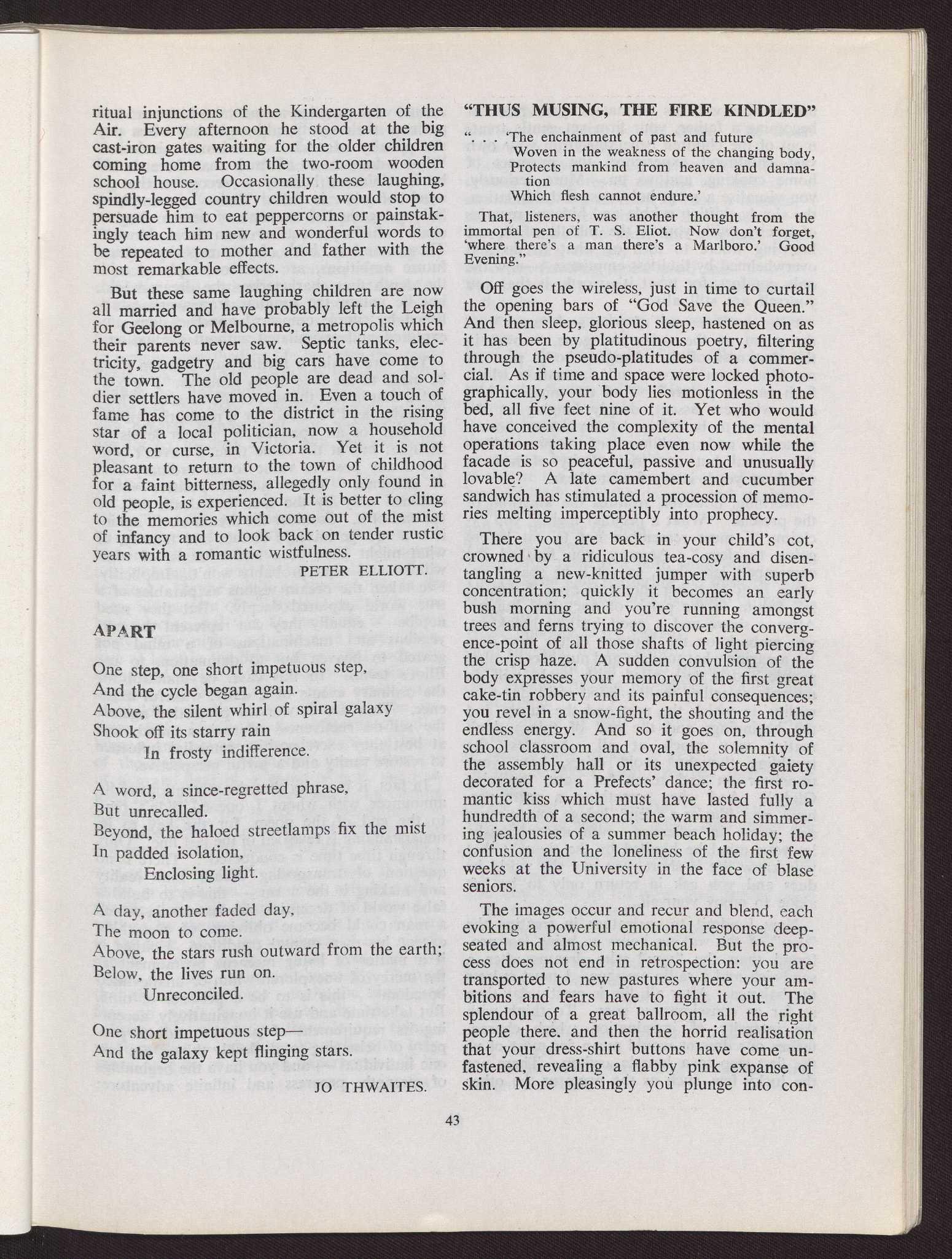
ritual injunctions of the Kindergarten of the Air. Every afternoon he stood at the big cast-iron gates waiting for the older children coming home from the two-room wooden school house. Occasionally these laughing, spindly-legged country children would stop to persuade him to eat peppercorns or painstakingly teach him new and wonderful words to be repeated to mother and father with the most remarkable effects.
But these same laughing children are now all married and have probably left the Leigh for Geelong or Melbourne, a metropolis which their parents never saw. Septic tanks, electricity, gadgetry and big cars have come to the town. The old people are dead and soldier settlers have moved in. Even a touch of fame has come to the district in the rising star of a local politician, now a household word, or curse, in Victoria. Yet it is not pleasant to return to the town of childhood for a faint bitterness, allegedly only found in old people, is experienced. It is better to cling to the memories which come out of the mist of infancy and to look back on tender rustic years with a romantic wistfulness.
PETER ELLIOTT.
One step, one short impetuous step, And the cycle began again.
Above, the silent whirl of spiral galaxy
Shook off its starry rain In frosty indifference.
A word, a since-regretted phrase, But unrecalled.
Beyond, the haloed streetlamps fix the mist In padded isolation, Enclosing light.
A day, another faded day, The moon to come.
Above, the stars rush outward from the earth; Below, the lives run on. Unreconciled.
One short impetuous stepAnd the galaxy kept flinging stars.
JO THWAITES.
. . The enchainment of past and future
Woven in the weakness of the changing body, Protects mankind from heaven and damnation
Which flesh cannot endure.'
That, listeners, was another thought from the immortal pen of T. S. Eliot. Now don't forget, `where there's a man there's a Marlboro.' Good Evening."
Off goes the wireless, just in time to curtail the opening bars of "God Save the Queen." And then sleep, glorious sleep, hastened on as it has been by platitudinous poetry, filtering through the pseudo-platitudes of a commercial. As if time and space were locked photographically, your body lies motionless in the bed, all five feet nine of it. Yet who would have conceived the complexity of the mental operations taking place even now while the facade is so peaceful, passive and unusually lovable? A late camembert and cucumber sandwich has stimulated a procession of memories melting imperceptibly into prophecy.
There you are back in your child's cot, crowned ' by a ridiculous tea-cosy and disentangling a new-knitted jumper with superb concentration; quickly it becomes an early bush morning and you're running amongst trees and ferns trying to discover the convergence-point of all those shafts of light piercing the crisp haze. A sudden convulsion of the body expresses your memory of the first great cake-tin robbery and its painful consequences; you revel in a snow-fight, the shouting and the endless energy. And so it goes on, through school classroom and oval, the solemnity of the assembly hall or its unexpected gaiety decorated for a Prefects' dance; the first romantic kiss which must have lasted fully a hundredth of a second; the warm and simmering jealousies of a summer beach holiday; the confusion and the loneliness of the first few weeks at the University in the face of blase seniors.
The images occur and recur and blend, each evoking a powerful emotional response deepseated and almost mechanical. But the process does not end in retrospection: you are transported to new pastures where your ambitions and fears have to fight it out. The splendour of a great ballroom, all, the right people there. and then the horrid realisation that your dress-shirt buttons have come unfastened, revealing a flabby pink expanse of skin. More pleasingly you plunge into con-
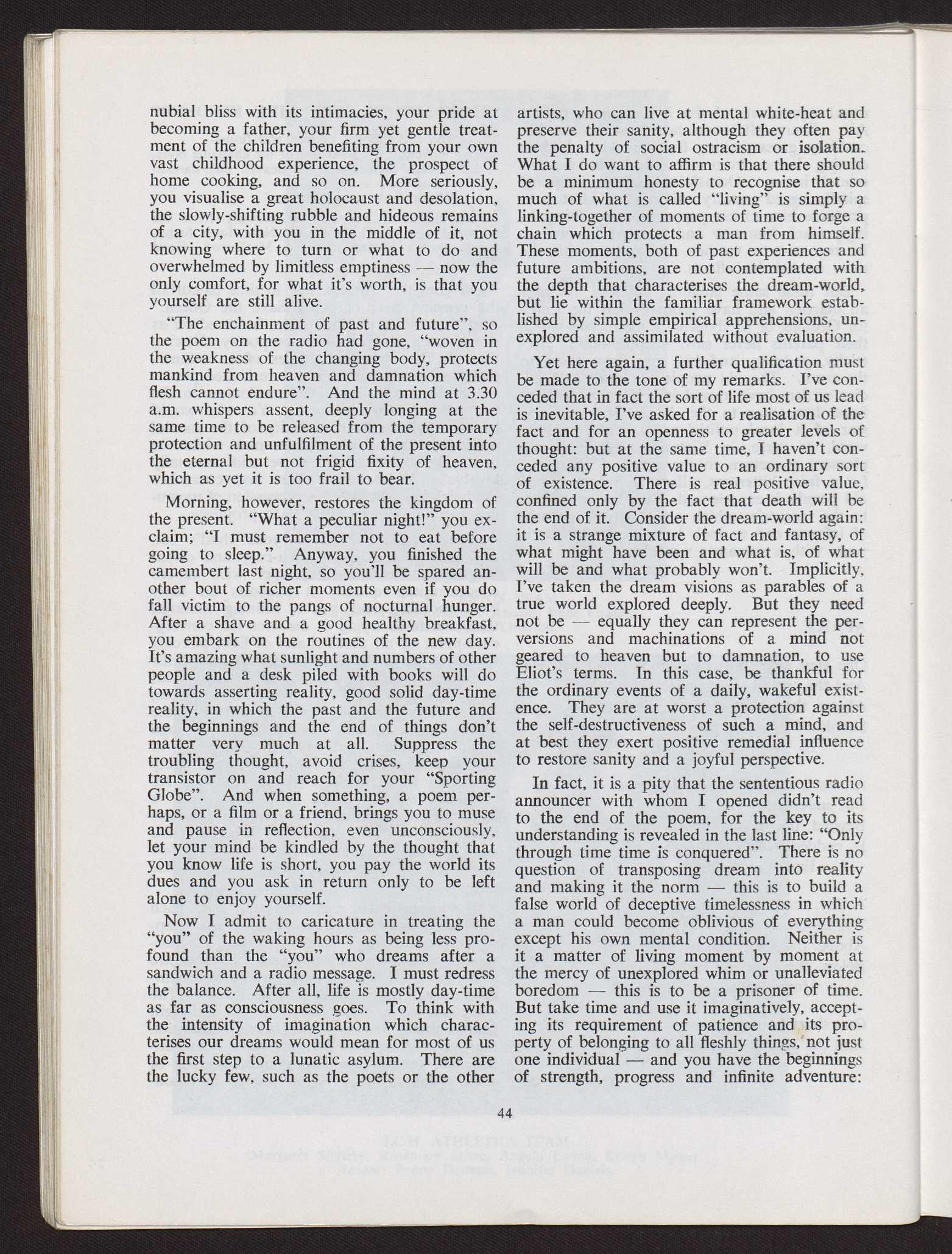
nubial bliss with its intimacies, your pride at becoming a father, your firm yet gentle treatment of the children benefiting from your own vast childhood experience, the prospect of home cooking, and so on. More seriously, you visualise a great holocaust and desolation, the slowly-shifting rubble and hideous remains of a city, with you in the middle of it, not knowing where to turn or what to do and overwhelmed by limitless emptiness — now the only comfort, for what it's worth, is that you yourself are still alive.
"The enchainment of past and future", so the poem on the radio had gone, "woven in the weakness of the changing body, protects mankind from heaven and damnation which flesh cannot endure". And the mind at 3.30 a.m. whispers assent, deeply longing at the same time to be released from the temporary protection and unfulfilment of the present into the eternal but not frigid fixity of heaven, which as yet it is too frail to bear.
Morning, however, restores the kingdom of the present. "What a peculiar night!" you exclaim; "I must remember not to eat before going to sleep." Anyway, you finished the camembert last night, so you'll be spared another bout of richer moments even if you do fall victim to the pangs of nocturnal hunger. After a shave and a good healthy breakfast, you embark on the routines of the new day. It's amazing what sunlight and numbers of other people and a desk piled with books will do towards asserting reality, good solid day-time reality, in which the past and the future and the beginnings and the end of things don't matter very much at all. Suppress the troubling thought, avoid crises, keep your transistor on and reach for your "Sporting Globe". And when something, a poem perhaps, or a film or a friend, brings you to muse and pause in reflection, even unconsciously, let your mind be kindled by the thought that you know life is short, you pay the world its dues and you ask in return only to be left alone to enjoy yourself.
Now I admit to caricature in treating the "you" of the waking hours as being less profound than the "you" who dreams after a sandwich and a radio message. I must redress the balance. After all, life is mostly day-time as far as consciousness goes. To think with the intensity of imagination which characterises our dreams would mean for most of us the first step to a lunatic asylum. There are the lucky few, such as the poets or the other
artists, who can live at mental white-heat and preserve their sanity, although they often pay the penalty of social ostracism or isolation.. What I do want to affirm is that there should be a minimum honesty to recognise that so much of what is called "living" is simply a linking-together of moments of time to forge a chain which protects a man from himself. These moments, both of past experiences and future ambitions, are not contemplated with the depth that characterises the dream-world, but lie within the familiar framework established by simple empirical apprehensions, unexplored and assimilated without evaluation.
Yet here again, a further qualification must be made to the tone of my remarks. I've conceded that in fact the sort of life most of us lead is inevitable, I've asked for a realisation of the fact and for an openness to greater levels of thought: but at the same time, I haven't conceded any positive value to an ordinary sort of existence. There is real positive value, confined only by the fact that death will be the end of it. Consider the dream-world again: it is a strange mixture of fact and fantasy, of what might have been and what is, of what will be and what probably won't. Implicitly, I've taken the dream visions as parables of a true world explored deeply. But they need not be — equally they can represent the perversions and machinations of a mind not geared to heaven but to damnation, to use Eliot's terms. In this case, be thankful for the ordinary events of a daily, wakeful existence. They are at worst a protection against the self-destructiveness of such a mind, and at best they exert positive remedial influence to restore sanity and a joyful perspective.
In fact, it is a pity that the sententious radio announcer with whom I opened didn't read to the end of the poem, for the key to its understanding is revealed in the last line: "Only through time time is conquered". There is no question of transposing dream into reality and making it the norm — this is to build a false world of deceptive timelessness in which a man could become oblivious of everything except his own mental condition. Neither is it a matter of living moment by moment at the mercy of unexplored whim or unalleviated boredom — this is to be a prisoner of time. But take time and use it imaginatively, accepting its requirement of patience and its property of belonging to all fleshly things,' not just one individual — and you have the beginnings of strength, progress and infinite adventure:
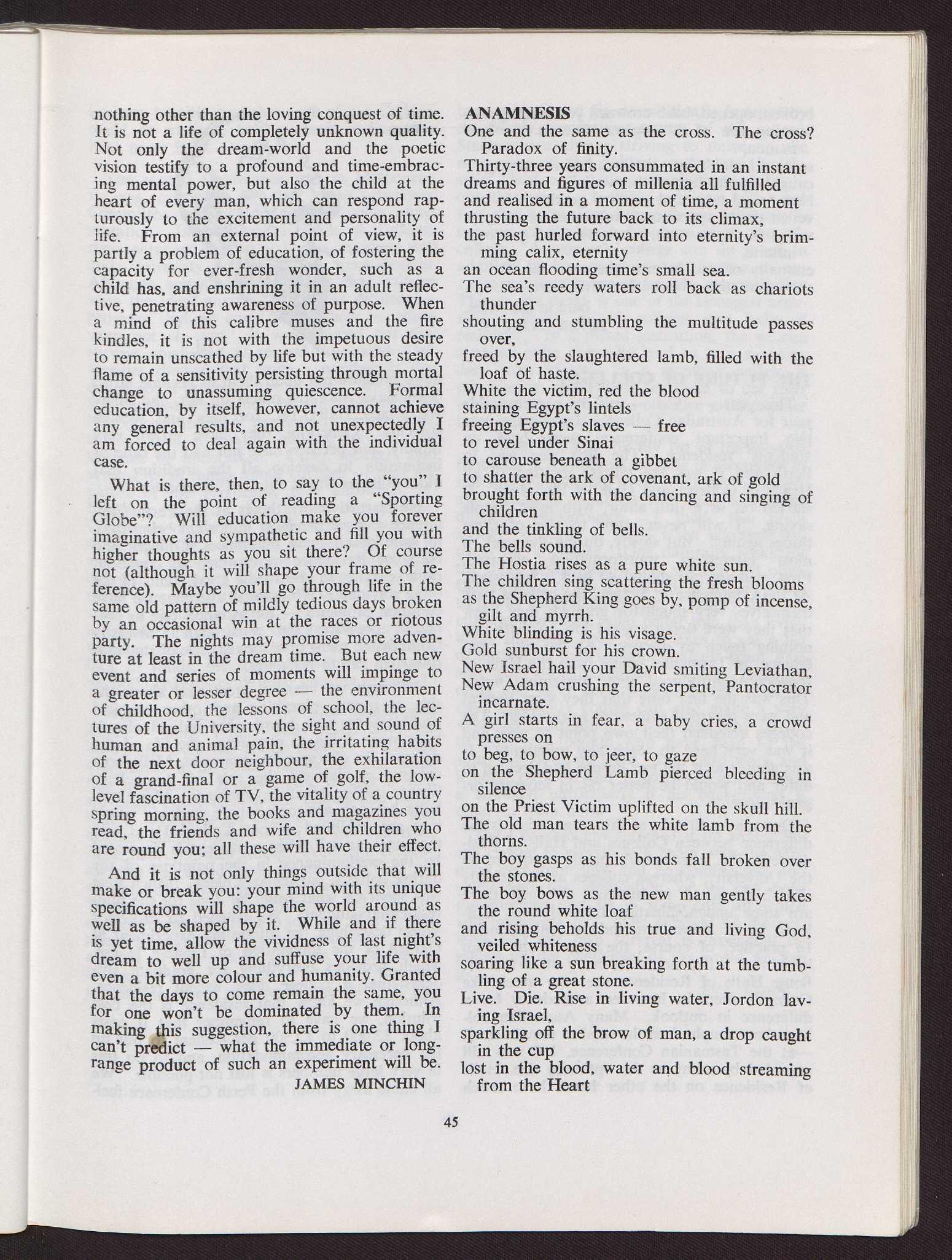
nothing other than the loving conquest of time. It is not a life of completely unknown quality. Not only the dream-world and the poetic vision testify to a profound and time-embracing mental power, but also the child at the heart of every man, which can respond rapturously to the excitement and personality of life. From an external point of view, it is partly a problem of education, of fostering the capacity for ever-fresh wonder, such as a child has. and enshrining it in an adult reflective, penetrating awareness of purpose. When a mind of this calibre muses and the fire kindles, it is not with the impetuous desire to remain unscathed by life but with the steady flame of a sensitivity persisting through mortal change to unassuming quiescence. Formal education, by itself, however, cannot achieve any general results, and not unexpectedly I am forced to deal again with the individual case.
What is there, then, to say to the "you" I left on the point of reading a "Sporting Globe"? Will education make you forever imaginative and sympathetic and fill you with higher thoughts as you sit there? Of course not (although it will shape your frame of reference). Maybe you'll go through life in the same old pattern of mildly tedious days broken by an occasional win at the races or riotous party. The nights may promise more adventure at least in the dream time. But each new event and series of moments will impinge to a greater or lesser degree — the environment of childhood, the lessons of school, the lectures of the University, the sight and sound of human and animal pain, the irritating habits of the next door neighbour, the exhilaration of a grand-final or a game of golf, the lowlevel fascination of TV, the vitality of a country spring morning, the books and magazines you read, the friends and wife and children who are round you; all these will have their effect.
And it is not only things outside that will make or break you: your mind with its unique specifications will shape the world around as well as be shaped by it. While and if there is yet time, allow the vividness of last night's dream to well up and suffuse your life with even a bit more colour and humanity. Granted that the days to come remain the same, you for one won't be dominated by them. In making this suggestion, there is one thing I can't predict — what the immediate or longrange product of such an experiment will be.
JAMES MINCHIN
One and the same as the cross. The cross? Paradox of finity.
Thirty-three years consummated in an instant dreams and figures of millenia all fulfilled and realised in a moment of time, a moment thrusting the future back to its climax, the past hurled forward into eternity's brimming calix, eternity an ocean flooding time's small sea.
The sea's reedy waters roll back as chariots thunder shouting and stumbling the multitude passes over,
freed by the slaughtered lamb, filled with the loaf of haste.
White the victim, red the blood staining Egypt's lintels freeing Egypt's slaves — free to revel under Sinai to carouse beneath a gibbet to shatter the ark of covenant, ark of gold brought forth with the dancing and singing of children and the tinkling of bells. The bells sound.
The Hostia rises as a pure white sun. The children sing scattering the fresh blooms as the Shepherd King goes by, pomp of incense, gilt and myrrh.
White blinding is his visage. Gold sunburst for his crown.
New Israel hail your David smiting Leviathan, New Adam crushing the serpent, Pantocrator incarnate.
A girl starts in fear, a baby cries, a crowd presses on to beg, to bow, to jeer, to gaze on the Shepherd Lamb pierced bleeding in silence on the Priest Victim uplifted on the skull hill. The old man tears the white lamb from the thorns.
The boy gasps as his bonds fall broken over the stones.
The boy bows as the new man gently takes the round white loaf and rising beholds his true and living God, veiled whiteness soaring like a sun breaking forth at the tumbling of a great stone.
Live. Die. Rise in living water, Jordon laving Israel, sparkling off the brow of man, a drop caught in the cup lost in the blood, water and blood streaming from the Heart
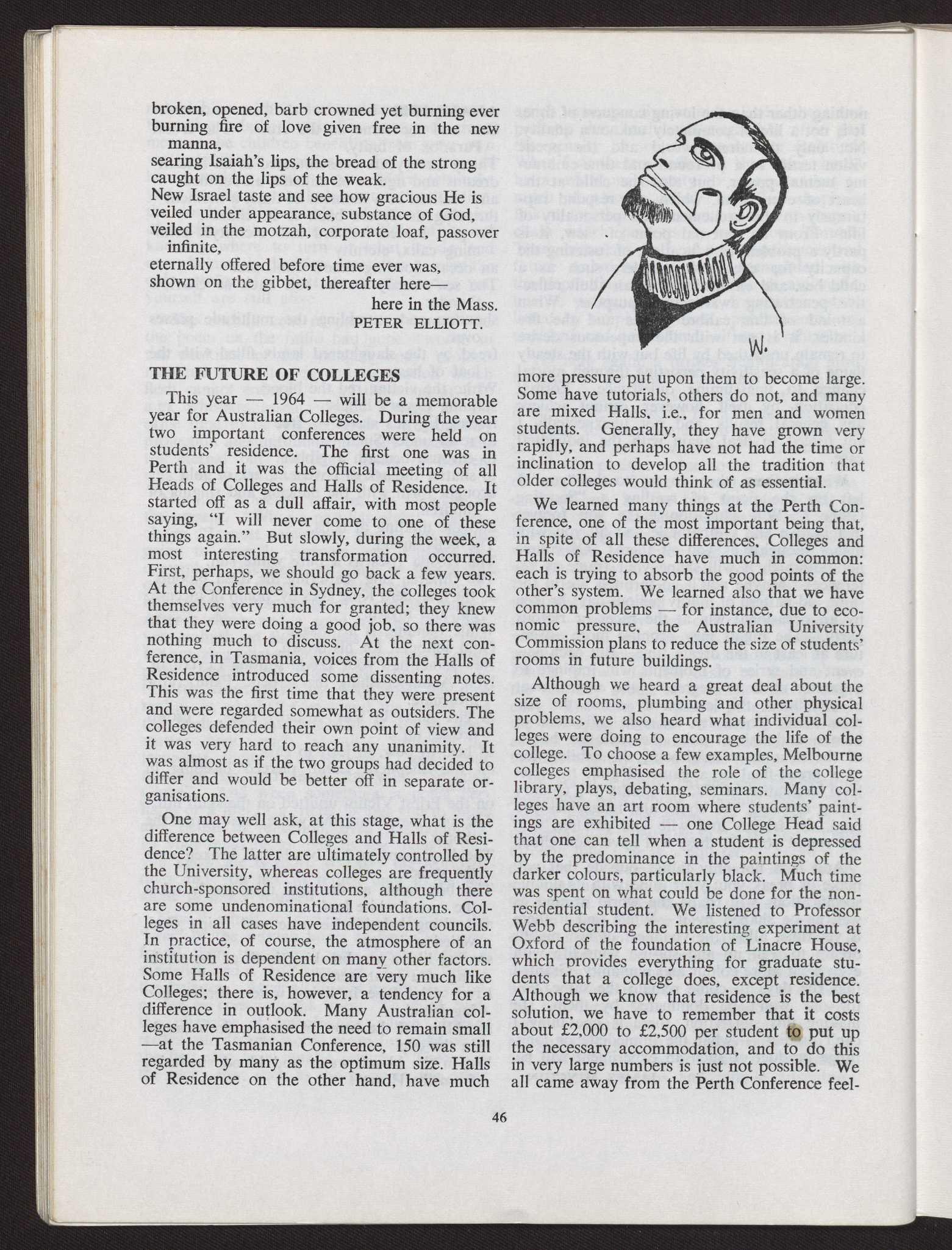
broken, opened, barb crowned yet burning ever burning fire of love given free in the new manna, searing Isaiah's lips, the bread of the strong caught on the lips of the weak.
New Israel taste and see how gracious He is veiled under appearance, substance of God, veiled in the motzah, corporate loaf, passover infinite, eternally offered before time ever was, shown on the gibbet, thereafter here— here in the Mass.
PETER ELLIOTT.
This year — 1964 — will be a memorable year for Australian Colleges. During the year two important conferences were held on students' residence. The first one was in Perth and it was the official meeting of all Heads of Colleges and Halls of Residence. It started off as a dull affair, with most people saying, "I will never come to one of these things again." But slowly, during the week, a most interesting transformation occurred. First, perhaps, we should go back a few years. At the Conference in Sydney, the colleges took themselves very much for granted; they knew that they were doing a good job, so there was nothing much to discuss. At the next conference, in Tasmania, voices from the Halls of Residence introduced some dissenting notes. This was the first time that they were present and were regarded somewhat as outsiders. The colleges defended their own point of view and it was very hard to reach any unanimity. It was almost as if the two groups had decided to differ and would be better off in separate organisations.
One may well ask, at this stage, what is the difference between Colleges and Halls of Residence? The latter are ultimately controlled by the University, whereas colleges are frequently church-sponsored institutions, although there are some undenominational foundations. Colleges in all cases have independent councils. In practice, of course, the atmosphere of an institution is dependent on many other factors. Some Halls of Residence are very much like Colleges; there is, however, a tendency for a difference in outlook. Many Australian colleges have emphasised the need to remain small —at the Tasmanian Conference, 150 was still regarded by many as the optimum size. Halls of Residence on the other hand, have much
more pressure put upon them to become large. Some have tutorials, others do not, and many are mixed Halls, i.e., for men and women students. Generally, they have grown very rapidly, and perhaps have not had the time or inclination to develop all the tradition that older colleges would think of as essential.
We learned many things at the Perth Conference, one of the most important being that, in spite of all these differences, Colleges and Halls of Residence have much in common: each is trying to absorb the good points of the other's system. We learned also that we have common problems — for instance, due to economic pressure, the Australian University Commission plans to reduce the size of students' rooms in future buildings.
Although we heard a great deal about the size of rooms, plumbing and other physical problems, we also heard what individual colleges were doing to encourage the life of the college. To choose a few examples, Melbourne colleges emphasised the role of the college library, plays, debating, seminars. Many colleges have an art room where students' paintings are exhibited — one College Head said that one can tell when a student is depressed by the predominance in the paintings of the darker colours, particularly black. Much time was spent on what could be done for the nonresidential student. We listened to Professor Webb describing the interesting experiment at Oxford of the foundation of Linacre House, which provides everything for graduate students that a college does, except residence. Although we know that residence is the best solution, we have to remember that it costs about £2,000 to £2,500 per student 4k put up the necessary accommodation, and to do this in very large numbers is fust not possible. We all came away from the Perth Conference feel-

ing very humble, and that each of our Colleges could do more to help students to live their lives more fully.
The second Conference was in Melbourne. It was organised by the Vice-Chancellors' Committee, and included a much wider representation. In addition to Heads of Colleges, representatives of student bodies, teaching staff and University administration were present. Although some present thought that colleges were the ideal answer for student residence— provided that we could afford them — others were not so sure. It was pointed out that surveys conducted at several Australian Universities showed that quite a number of students would prefer to live in flats: Mr. Priestley, Student Councillor of the University of Melbourne, made a particularly strong plea, asking that a major housing project for students be undertaken. Other speakers said several harsh things about colleges — they are places of the privileged, they encourage inbreeding; in fact, they are status symbols. Comments on the life of the colleges were no more flattering. Students are too sheltered in a college atmosphere and their maturing is delayed. Even if one does not agree with these comments, one should examine the reasons for their circulation. This is not only of academic interest; if the college image is found wanting, the time may come when, because of lack of funds, the question will be: "Should we build colleges or develop housing projects?"
What has all this to do with Trinity and J.Ç.H.? Both Trinity and J.C.H. have the advantage over the newer colleges of having established a first-class reputation and some fine traditions. However, the danger is that we might easily rest on our laurels and forget that a college is an organic community and not something static — not a job well done once, hence finished forever. Although colleges all over the world have general aims that are similar, they do develop different personalities. Where, then, does the difference lie? Do the social structure and the traditions of a college affect the type of person it produces? One marvels at the success of Eton at producing so many Prime Ministers. What are the factors in the school that encourage this? It has
been said that at Eton ambition is fostered by the highly competitive nature of the school. Students are always striving to move up the next rung of the ladder, encouraged by the strict division of duties and privileges throughout the school. I think everyone will agree that the training of future Prime Ministers is not one of the main functions of a women's college. A women's college can do much in addition to its academic contribution to encourage students to take on responsibility. This, to my mind, is one of the strongest arguments against mixed colleges and halls of residence. In a mixed institution, the women students quite naturally tend to take a secondary role; whereas in a women's college it provides an opportunity for them to use their initiative and to learn to organise matters other than social functions.
I would put high on my list of the modern functions of a college a training in awareness of this rapidly changing world. We can no longer avoid rubbing shoulders with people of many different backgrounds. I think this point should be borne in mind when selecting students for a college. One naturally looks for the more academically able student, but other factors need to be considered. If we are going to try to understand people of widely different cultures and races, what better way than living under the same roof? One likes to see a list of applicants that includes students from Asia and from other countries. Students who are older and have done something else prior to their University course can also make a very valuable contribution. The easy way out is to mix with people who have been to the same school as we have. It is hard work and it needs patience and sympathy to get to know a stranger, particularly if his background is different from ours.
The Chaplain has summed it up well: "We can choose to remain in a room with the windows and door shut and be comfortable and warm and risk suffocation, or we can open the windows and let in some cold air which will invigorate us." The survival of the colleges and our own survival is dependent on taking up the challenges of the world we live in.
EVA EDEN.
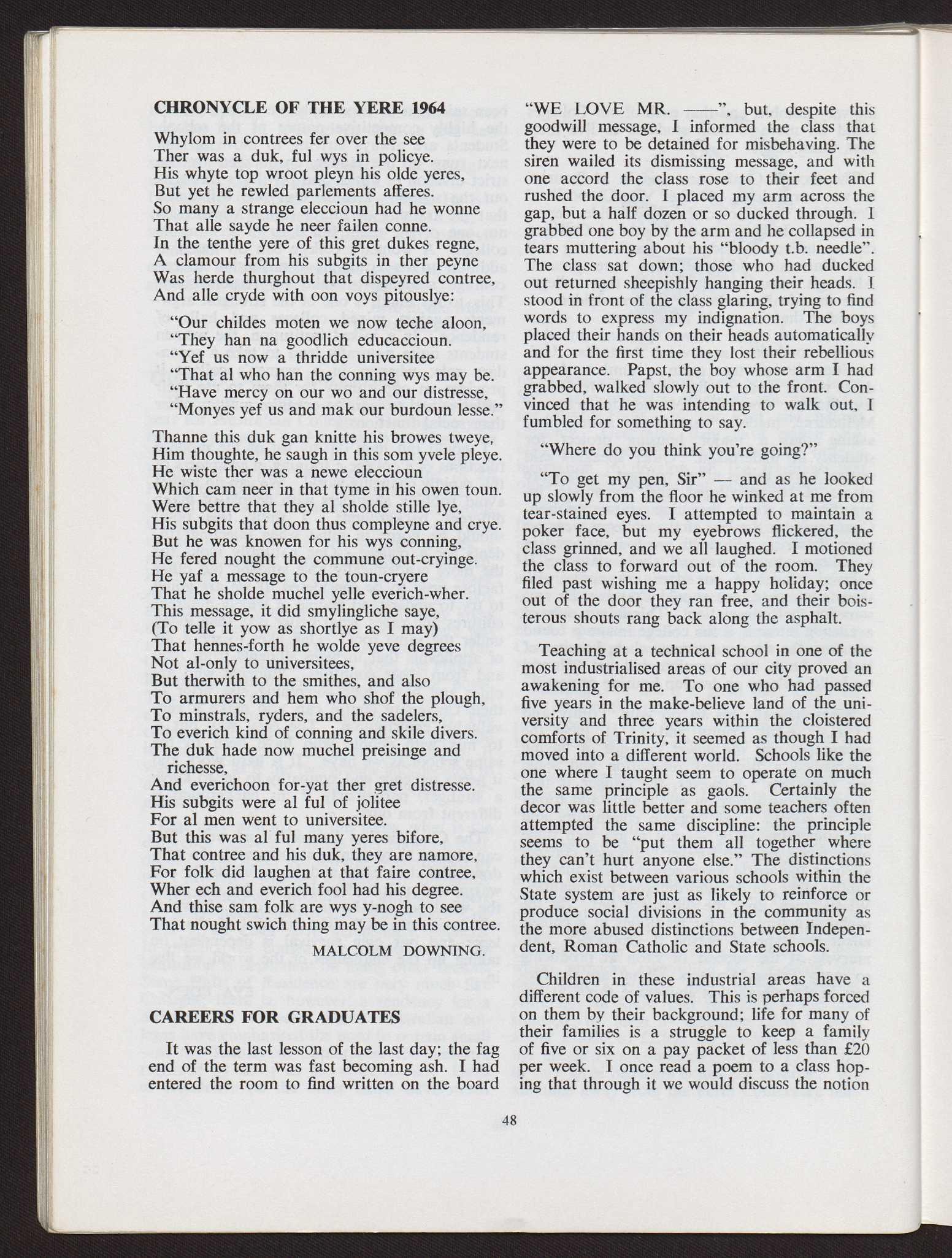
Whylom in contrees fer over the see
Ther was a duk, ful wys in policye. His whyte top wroot pleyn his olde yeres,
But yet he rewled parlements afferes.
So many a strange eleccioun had he wonne
That alle sayde he neer failen conne.
In the tenthe yere of this gret dukes regne, A clamour from his subgits in ther peyne
Was herde thurghout that dispeyred contree, And alle cryde with oon voys pitouslye:
"Our childes moten we now teche aloon, "They han na goodlich educaccioun.
"Yef us now a thridde universitee
"That al who han the conning wys may be.
"Have mercy on our wo and our distresse, "Monyes yef us and mak our burdoun lesse."
Thanne this duk gan knitte his browes tweye, Him thoughte, he saugh in this som yvele pleye.
He wiste ther was a newe eleccioun
Which cam neer in that tyme in his owen toun. Were bettre that they al sholde stille lye,
His subgits that doon thus compleyne and crye.
But he was knowen for his wys conning,
He fered nought the commune out-cryinge.
He yaf a message to the toun-cryere
That he sholde muchel yelle everich-wher.
This message, it did smylingliche saye,
(To telle it yow as shortlye as I may)
That hennes-forth he wolde yeve degrees
Not al-only to universitees,
But therwith to the smithes, and also
To armurers and hem who shof the plough,
To minstrals, ryders, and the sadelers,
To everich kind of conning and skile divers.
The duk hade now muchel preisinge and richesse,
And everichoon for-yat ther gret distresse.
His subgits were al ful of jolitee
For al men went to universitee.
But this was al ful many yeres bifore, That contree and his duk, they are namore,
For folk did laughen at that faire contree,
Wher ech and everich fool had his degree.
And thise sam folk are wys y-nogh to see
That nought swich thing may be in this contree.
MALCOLM DOWNING.
It was the last lesson of the last day; the fag end of the term was fast becoming ash. I had entered the room to find written on the board
"WE LOVE MR. ", but, despite this goodwill message, I informed the class that they were to be detained for misbehaving. The siren wailed its dismissing message, and with one accord the class rose to their feet and rushed the door. I placed my arm across the gap, but a half dozen or so ducked through. I grabbed one boy by the arm and he collapsed in tears muttering about his "bloody t.b. needle". The class sat down; those who had ducked out returned sheepishly hanging their heads. I stood in front of the class glaring, trying to find words to express my indignation. The boys placed their hands on their heads automatically and for the first time they lost their rebellious appearance. Papst, the boy whose arm I had grabbed, walked slowly out to the front. Convinced that he was intending to walk out, I fumbled for something to say.
"Where do you think you're going?"
"To get my pen, Sir" — and as he looked up slowly from the floor he winked at me from tear-stained eyes. I attempted to maintain a poker face, but my eyebrows flickered, the class grinned, and we all laughed. I motioned the class to forward out of the room. They filed past wishing me a happy holiday; once out of the door they ran free, and their boisterous shouts rang back along the asphalt.
Teaching at a technical school in one of the most industrialised areas of our city proved an awakening for me. To one who had passed five years in the make-believe land of the university and three years within the cloistered comforts of Trinity, it seemed as though I had moved into a different world. Schools like the one where I taught seem to operate on much the same principle as gaols. Certainly the decor was little better and some teachers often attempted the same discipline: the principle seems to be "put them all together where they can't hurt anyone else." The distinctions which exist between various schools within the State system are just as likely to reinforce or produce social divisions in the community as the more abused distinctions between Independent, Roman Catholic and State schools.
Children in these industrial areas have a different code of values. This is perhaps forced on them by their background; life for many of their families is a struggle to keep a family of five or six on a pay packet of less than £20 per week. I once read a poem to a class hoping that through it we would discuss the notion
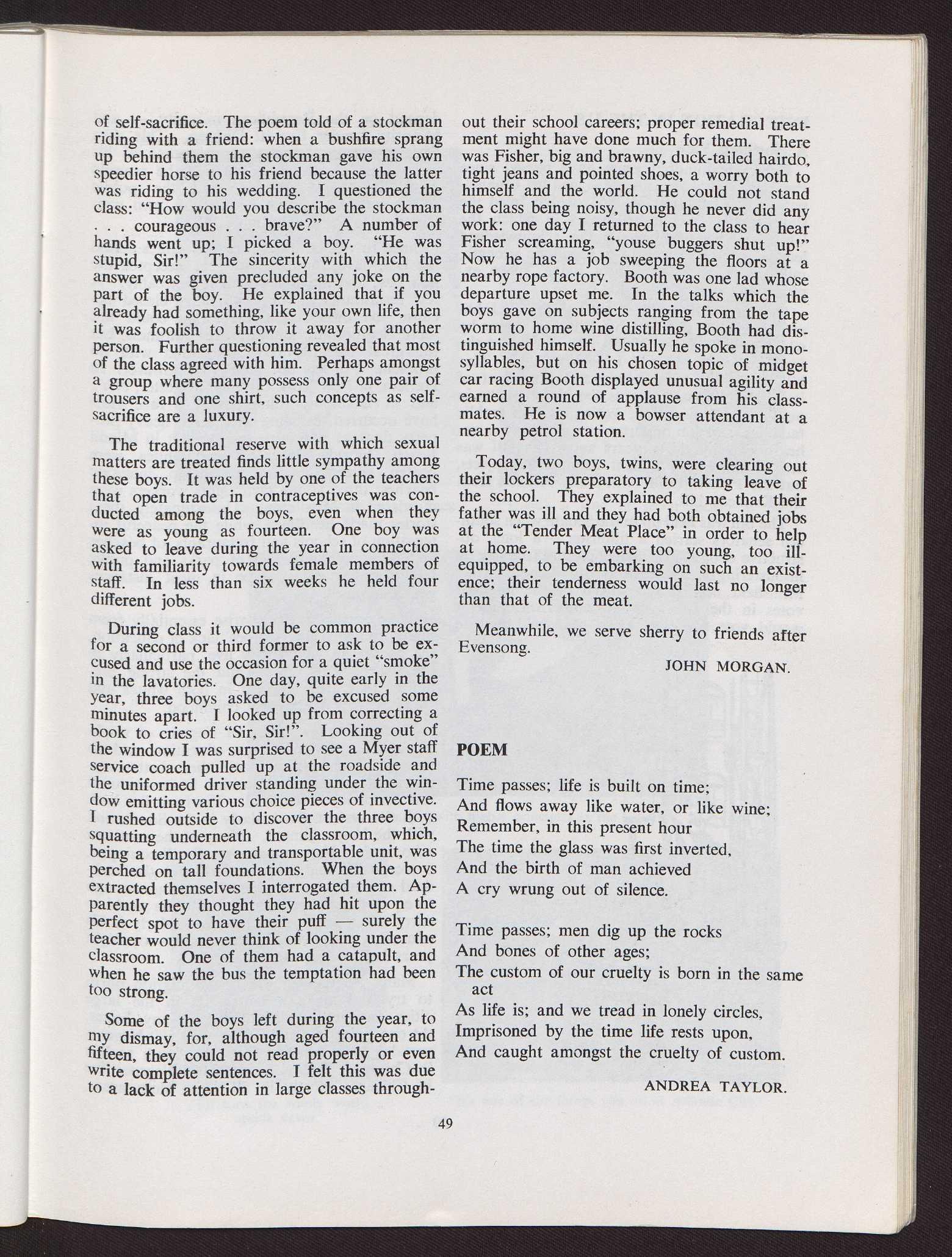
of self-sacrifice. The poem told of a stockman riding with a friend: when a bushfire sprang up behind them the stockman gave his own speedier horse to his friend because the latter was riding to his wedding. I questioned the class: "How would you describe the stockman courageous . . . brave?" A number of hands went up; I picked a boy. "He was stupid, Sir!" The sincerity with which the answer was given precluded any joke on the part of the boy. He explained that if you already had something, like your own life, then it was foolish to throw it away for another person. Further questioning revealed that most of the class agreed with him. Perhaps amongst a group where many possess only one pair of trousers and one shirt, such concepts as selfsacrifice are a luxury.
The traditional reserve with which sexual matters are treated finds little sympathy among these boys. It was held by one of the teachers that open trade in contraceptives was conducted among the boys, even when they were as young as fourteen. One boy was asked to leave during the year in connection with familiarity towards female members of staff. In less than six weeks he held four different jobs.
During class it would be common practice for a second or third former to ask to be excused and use the occasion for a quiet "smoke" in the lavatories. One day, quite early in the year, three boys asked to be excused some minutes apart. I looked up from correcting a book to cries of "Sir, Sir!". Looking out of the window I was surprised to see a Myer staff service coach pulled up at the roadside and the uniformed driver standing under the window emitting various choice pieces of invective. I rushed outside to discover the three boys squatting underneath the classroom, which, being a temporary and transportable unit, was perched on tall foundations. When the boys extracted themselves I interrogated them. Apparently they thought they had hit upon the perfect spot to have their puff — surely the teacher would never think of looking under the classroom. One of them had a catapult, and when he saw the bus the temptation had been too strong.
Some of the boys left during the year, to my dismay, for, although aged fourteen and fifteen, they could not read properly or even write complete sentences. I felt this was due to a lack of attention in large classes through-
out their school careers; proper remedial treatment might have done much for them. There was Fisher, big and brawny, duck-tailed hairdo, tight jeans and pointed shoes, a worry both to himself and the world. He could not stand the class being noisy, though he never did any work: one day I returned to the class to hear Fisher screaming, "youse buggers shut up!"
Now he has a job sweeping the floors at a nearby rope factory. Booth was one lad whose departure upset me. In the talks which the boys gave on subjects ranging from the tape worm to home wine distilling, Booth had distinguished himself. Usually he spoke in monosyllables, but on his chosen topic of midget car racing Booth displayed unusual agility and earned a round of applause from his classmates. He is now a bowser attendant at a nearby petrol station.
Today, two boys, twins, were clearing out their lockers preparatory to taking leave of the school. They explained to me that their father was ill and they had both obtained jobs at the "Tender Meat Place" in order to help at home. They were too young, too illequipped, to be embarking on such an existence; their tenderness would last no longer than that of the meat.
Meanwhile, we serve sherry to friends after Evensong.
JOHN MORGAN.
Time passes; life is built on time; And flows away like water, or like wine; Remember, in this present hour The time the glass was first inverted, And the birth of man achieved A cry wrung out of silence.
Time passes; men dig up the rocks
And bones of other ages; The custom of our cruelty is born in the same act
As life is; and we tread in lonely circles, Imprisoned by the time life rests upon, And caught amongst the cruelty of custom.
ANDREA TAYLOR.
Over one hundred years have passed since President Abraham Lincoln signed his Emancipation Proclamation in 1863, which freed the slaves. Over a hundred years in which the United States has become the acknowledged leader of the free world—in economic strength, military power, standard of living, space exploration, and other fields.
On July 2, 1964, President Lyndon B. Johnson signed the Civil Rights Bill, the means by which the American Negro was to achieve the freedom granted him by Lincoln in 1863. This bill, the most far-reaching and important of its kind yet passed, grants the Negro rights in public accommodation, voting, use of public facilities, and job opportunities which were unheard of only thirty years ago. The bill was one of the late President Kennedy's projects, but the 1964 bill differs in many respects from the Kennedy bill.
The bill was held up in the Senate when southern senators started a filibuster — a long, obstructive debate. To invoke cloture (the gag on filibustering), Senate Majority Leader Mike Mansfield needed sixty-seven of the hundred votes in the Senate. No southern Democrat would vote for cloture, so Mansfield had to
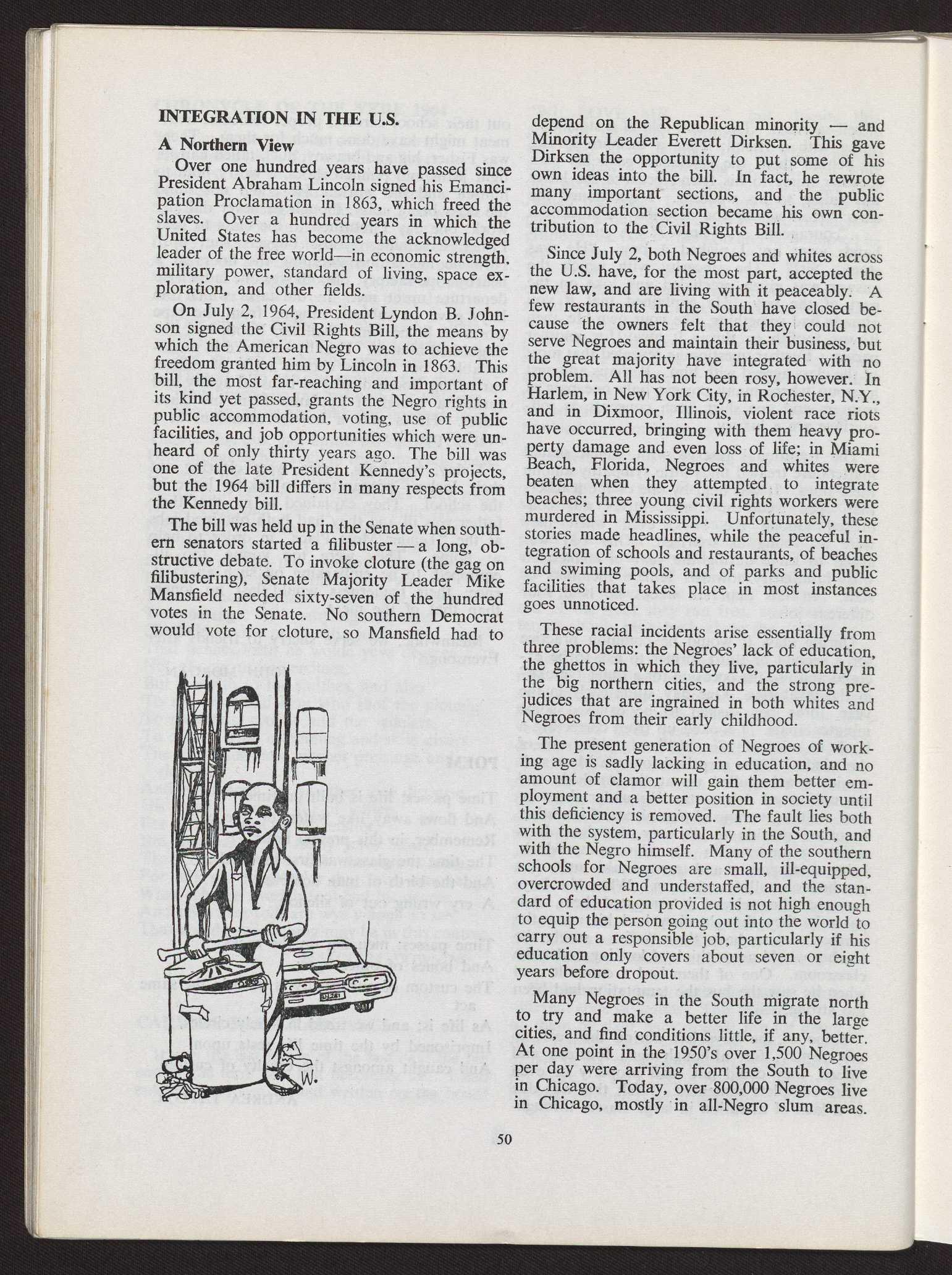
depend on the Republican minority — and Minority Leader Everett Dirksen. This gave Dirksen the opportunity to put ; some of his own ideas into the bill. In fact, he rewrote many important sections, and the public accommodation section became his own contribution to the Civil Rights Bill.
Since July 2, both Negroes and whites across the U.S. have, for the most part, accepted the new law, and are living with it peaceably. A few restaurants in the South have closed because the owners felt that they could not serve Negroes and maintain their business, but the great majority have integrated with no problem. All has not been rosy, however. In Harlem, in New York City, in Rochester, N.Y., and in Dixmoor, Illinois, violent race riots have occurred, bringing with them heavy property damage and even loss of life; in Miami Beach, Florida, Negroes and whites were beaten when they attempted . to integrate beaches; three young civil rights workers were murdered in Mississippi. Unfortunately, these stories made headlines, while the peaceful integration of schools and restaurants, of beaches and swiming pools, and of parks and public facilities that takes place in most instances goes unnoticed.
These racial incidents arise essentially from three problems: the Negroes' lack of education, the ghettos in which they live, particularly in the big northern cities, and the strong prejudices that are ingrained in both whites and Negroes from their early childhood.
The present generation of Negroes of working age is sadly lacking in education, and no amount of clamor will gain them better employment and a better position in society until this deficiency is removed. The fault lies both with the system, particularly in the South, and with the Negro himself. Many of the southern schools for Negroes are small, ill-equipped, overcrowded and understaffed, and the standard of education provided is not high enough to equip the person going out into the world to carry out a responsible job, particularly if his education only covers about seven or eight years before dropout.
Many Negroes in the South migrate north to try and make a better life in the large cities, and find conditions little, if any, better. At one point in the 1950's over 1,500 Negroes per day were arriving from the South to live in Chicago. Today, over 800,000 Negroes live in Chicago, mostly in all-Negro slum areas.
"A man can stand a family just so long.
"There's a kind of secret society at the I'm warning you." top of the world."
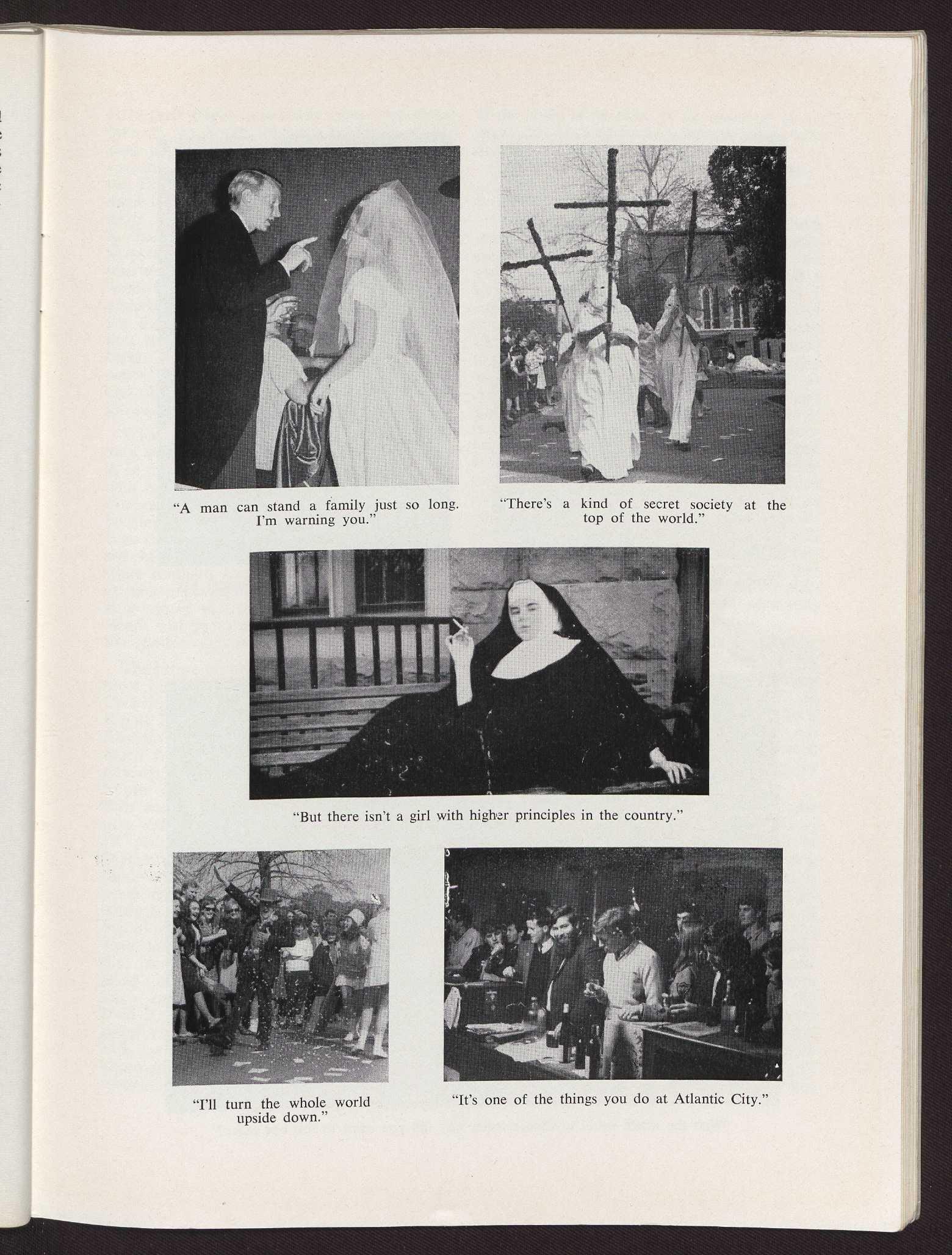
"But there isn't a girl with higher principles in the country."
"I'll turn the whole world
"It's one of the things you do at Atlantic City." upside down."
"Ye-e-s, any booby can fool with it now."

"Why, he must have gone crazy, like the others."
"With the whole world to choose from, why did you come to this one place?"
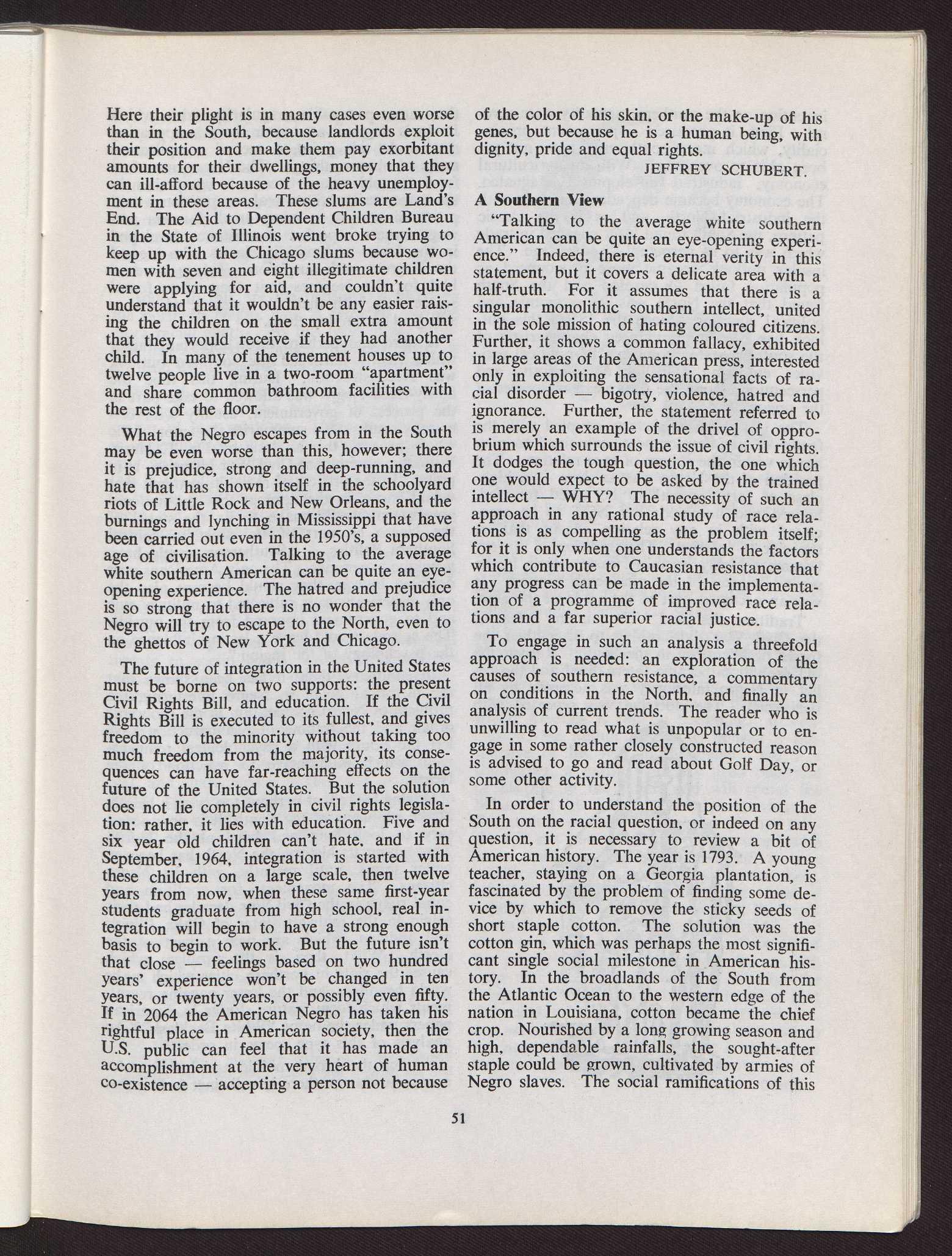
Here their plight is in many cases even worse than in the South, because landlords exploit their position and make them pay exorbitant amounts for their dwellings, money that they can ill-afford because of the heavy unemployment in these areas. These slums are Land's End. The Aid to Dependent Children Bureau in the State of Illinois went broke trying to keep up with the Chicago slums because women with seven and eight illegitimate children were applying for aid, and couldn't quite understand that it wouldn't be any easier raising the children on the small extra amount that they would receive if they had another child. In many of the tenement houses up to twelve people live in a two-room "apartment" and share common bathroom facilities with the rest of the floor.
What the Negro escapes from in the South may be even worse than this, however; there it is prejudice, strong and deep-running, and hate that has shown itself in the schoolyard riots of Little Rock and New Orleans, and the burnings and lynching in Mississippi that have been carried out even in the 1950's, a supposed age of civilisation. Talking to the average white southern American can be quite an eyeopening experience. The hatred and prejudice is so strong that there is no wonder that the Negro will try to escape to the North, even to the ghettos of New York and Chicago.
The future of integration in the United States must be borne on two supports: the present Civil Rights Bill, and education. If the Civil Rights Bill is executed to its fullest, and gives freedom to the minority without taking too much freedom from the majority, its consequences can have far-reaching effects on the future of the United States. But the solution does not lie completely in civil rights legislation: rather, it lies with education. Five and six year old children can't hate, and if in September, 1964, integration is started with these children on a large scale, then twelve years from now, when these same first-year students graduate from high school, real integration will begin to have a strong enough basis to begin to work. But the future isn't that close — feelings based on two hundred years' experience won't be changed in ten years, or twenty years, or possibly even fifty. If in 2064 the American Negro has taken his rightful place in American society, then the U.S. public can feel that it has made an accomplishment at the very heart of human co-existence — accepting a person not because
of the color of his skin. or the make-up of his genes, but because he is a human being, with dignity, pride and equal rights.
JEFFREY SCHUBERT.
"Talking to the average white southern American can be quite an eye-opening experience." Indeed, there is eternal verity in this statement, but it covers a delicate area with a half-truth. For it assumes that there is a singular monolithic southern intellect, united in the sole mission of hating coloured citizens. Further, it shows a common fallacy, exhibited in large areas of the American press, interested only in exploiting the sensational facts of racial disorder — bigotry, violence, hatred and ignorance. Further, the statement referred to is merely an example of the drivel of opprobrium which surrounds the issue of civil rights. It dodges the tough question, the one which one would expect to be asked by the trained intellect — WHY? The necessity of such an approach in any rational study of race relations is as compelling as the problem itself; for it is only when one understands the factors which contribute to Caucasian resistance that any progress can be made in the implementation of a programme of improved race relations and a far superior racial justice.
To engage in such an analysis a threefold approach is needed: an exploration of the causes of southern resistance, a commentary on conditions in the North, and finally an analysis of current trends. The reader who is unwilling to read what is unpopular or to engage in some rather closely constructed reason is advised to go and read about Golf Day, or some other activity.
In order to understand the position of the South on the racial question, or indeed on any question, it is necessary to review a bit of American history. The year is 1793. A young teacher, staying on a Georgia plantation, is fascinated by the problem of finding some device by which to remove the sticky seeds of short staple cotton. The solution was the cotton gin, which was perhaps the most significant single social milestone in American history. In the broadlands of the South from the Atlantic Ocean to the western edge of the nation in Louisiana, cotton became the chief crop. Nourished by a long growing season and high, dependable rainfalls, the sought-after staple could be grown, cultivated by armies of Negro slaves. The social ramifications of this
invention on the southern mentality were several. First, it produced a permanent provinciality, which many southerners have not yet been able to overcome. With an agricultural economy, industrial development stagnated. The economy became dependent on trade with the industrial North, and as is the classic pattern, the South found itself engaged in trade which was to its perpetual disadvantage. The insular outlook became more pronounced as population failed to develop and the South found that the North was its economic and political superior. Since the 1850's this outlook has been a pronounced characteristic of the southern states, colouring its political activities, enforcing a feeling of inferiority and persecution among the Caucasian majorities of the region.
The institution of slavery, coupled with the factor of non-development, combined to play havoc within the sphere of race relations. The position of the Negro was as slave — a highclass of farm animal to be cared for, fed, housed and humored; but NOT to be associated with in any relation except that of superior to inferior. The tradition of slavery became a highly organised caste society in the second quarter of the nineteenth century. It was an accepted part of the credo of the area. Tradition dies hard. The stinging defeat of the Civil War did nothing to strengthen the forces of liberalism in the South. Rather, the old prejudices became internalised and the belief in Negro inferiority was accepted by all concerned. The doctrine was repeated with
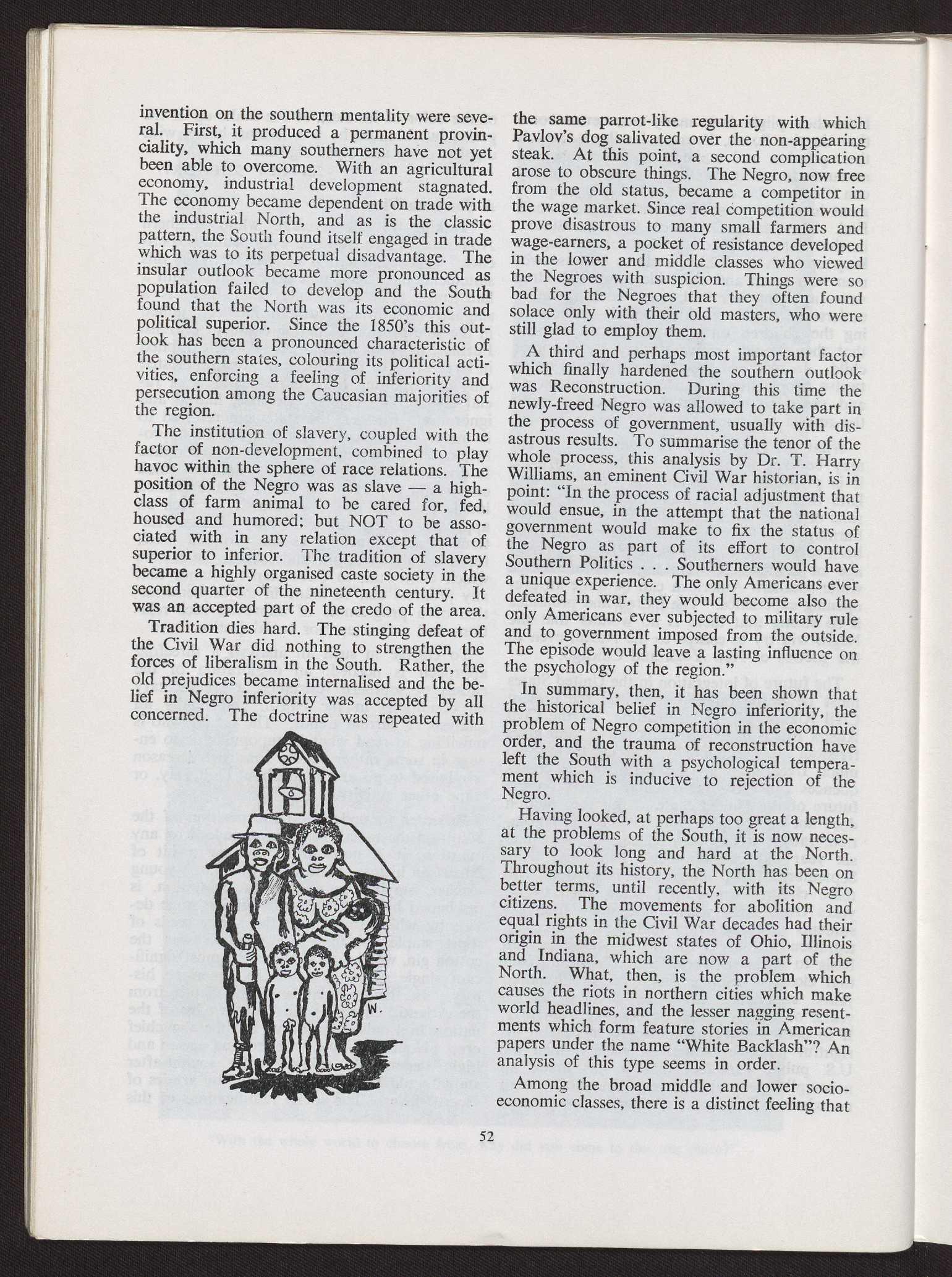
the same parrot-like regularity with which Pavlov's dog salivated over the non-appearing steak. At this point, a second complication arose to obscure things. The Negro, now free from the old status, became a competitor in the wage market. Since real competition would prove disastrous to many small farmers and wage-earners, a pocket of resistance developed in the lower and middle classes who viewed the Negroes with suspicion. Things were so bad for the Negroes that they often found solace only with their old masters, who were still glad to employ them.
A third and perhaps most important factor which finally hardened the southern outlook was Reconstruction. During this time the newly-freed Negro was allowed to take part in the process of government, usually with disastrous results. To summarise the tenor of the whole process, this analysis by Dr. T. Harry Williams, an eminent Civil War historian, is in point: "In the process of racial adjustment that would ensue, in the attempt that the national government would make to fix the status of the Negro as part of its effort to control Southern Politics ... Southerners would have a unique experience. The only Americans ever defeated in war, they would become also the only Americans ever subjected to military rule and to government imposed from the outside. The episode would leave a lasting influence on the psychology of the region."
In summary, then, it has been shown that the historical belief in Negro inferiority, the problem of Negro competition in the economic order, and the trauma of reconstruction have left the South with a psychological temperament which is inducive to rejection of the Negro.
Having looked, at perhaps too great a length, at the problems of the South, it is now necessary to look long and hard at the North. Throughout its history, the North has been on better terms, until recently, with its Negro citizens. The movements for abolition and equal rights in the Civil War decades had their origin in the midwest states of Ohio, Illinois and Indiana, which are now a part of the North. What, then, is the problem which causes the riots in northern cities which make world headlines, and the lesser nagging resentments which form feature stories in American papers under the name "White Backlash"? An analysis of this type seems in order.
Among the broad middle and lower socioeconomic classes, there is a distinct feeling that
the social equality of the Negro constitutes a danger to their established as well as their expected status. An example can be drawn from the attempts on the part of Negroes to integrate schools in the North. It is often the expressed feeling of white leaders that the inclusion of Negroes will lower the quality of available education. The same feelings are operable in objections to integragation of suburban regions and social clubs.
Added to this are the frustrations faced by the northern Negro, who is crowded into the city's racial ghetto. As this facet of the problem has received so much publicity, there is no need to pursue the matter any further.
What shows up in the North seems to be a gross rejection of the North's history in the matter of race relations. There is a rejection in some quarters of northern society which can only be explained by irrational fear. Perhaps this is too simple an explanation, yet it seems to be the only one available, since, after all, there are no iron-clad guarantees given in approaching racial bigotry.
Finally, mercifully, one comes to an analysis of the current trends in relations, which amplify the patterns already noted. The by-word for the current crisis is bitterness. Not, this time, on the part of white groups who are reacting against wrongs done long ago, or imagined threats to social status; rather it is pent-up bitterness raging inside the minority itself: reacting against the system it didn't create and takes no pains to understand. Further, the bitterness becomes a self-defeating phenomena, since it alienates much of the support for civil rights from the white community. Yet it is real, and characterised in the cries of Harlem rioters chanting "Let's do it now!", and in reply to a request to disperse from the streets and go home, "We are home, baby!"
Even to a southern ear long accustomed to a rumbling of discontent, a new vehemence appears in this example reported by the New York Times. Speaking was twenty-three year old David Dennis, a field Secretary of the Congress of Racial Equality. Speaking at a memorial service for James Chaney, a murdered civil rights worker, he said:
'"I'm not going to stand here and ask anyone not to be angry, not to be bitter tonight. We've defended our country. To do what? To live like slaves?"
`Then, with his ` voice rising to a high-pitched scream, he cried out: "Don't just look at me and go home and say that was a nice memorial

service." His listeners stilled, and an almost inaudible gasp rose in the sanctuary.
` "If you do go home tonight and take it, God damn your soul." '
Thus the movement continues with an ugly streak rising to detract from the generally recognised moral tenor; and in reaction angry, stunned supporters withdraw, while hardened segregationists merely act smug.
Thus far an attempt has been made to explore the will-of-the-wisp WHY which shapes attitudes towards the Negro to try to establish for the reader a background for the often insensible which occurs in the racial battleground which America is rapidly becoming. In conclusion, the author wishes to present a perspective of his role in this issue. He is a southerner, a native who has lived one-third of his life in the South and will spend the balance of his life in the same community. For such a person, the problem of race relations is not one which can be discussed with calm, academic dispassion. Instead, it is a presence which he struggles with, even here, ten thousand miles away from the scene of conflict. While he is able to present the arguments from the catechisms of both sides, still there is a feeling that neither side has all of the proper answers. As a result, he can ask only that his readers will bear in mind the things that have been written and realise that time and patience, prayer and perseverance, are necessary to bring about just answers to the issue of racial conflict. This is more than he can expect from the participants.
LYMAN JONES.
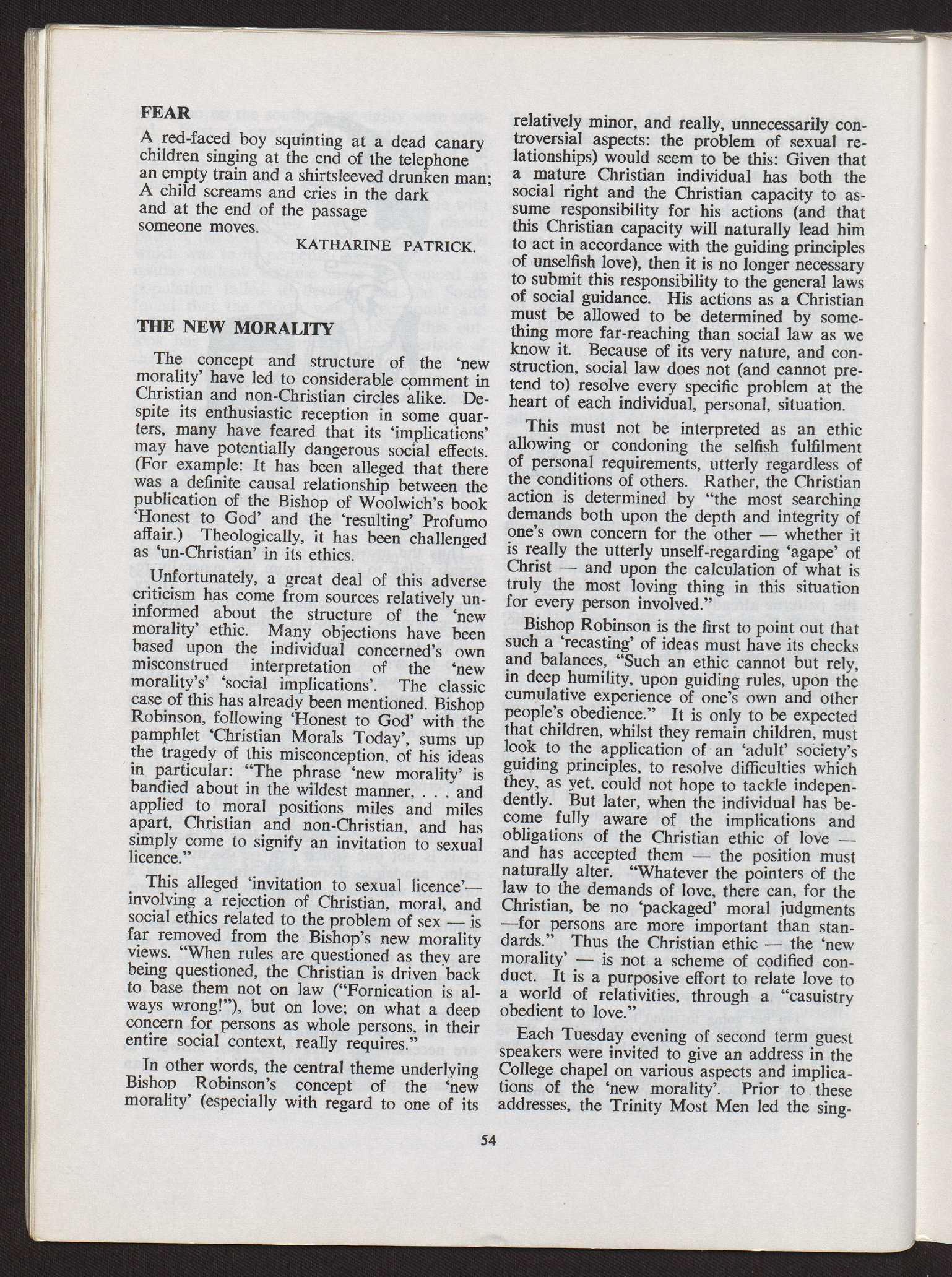
A red-faced boy squinting at a dead canary children singing at the end of the telephone an empty train and a shirtsleeved drunken man; A child screams and cries in the dark and at the end of the passage someone moves.
KATHARINE PATRICK.
The concept and structure of the `new morality' have led to considerable comment in Christian and non-Christian circles alike. Despite its enthusiastic reception in some quarters, many have feared that its `implications' may have potentially dangerous social effects. (For example: It has been alleged that there was a definite causal relationship between the publication of the Bishop of Woolwich's book `Honest to God' and the `resulting' Profumo affair.) Theologically, it has been challenged as `un-Christian' in its ethics.
Unfortunately, a great deal of this adverse criticism has come from sources relatively uninformed about the structure of the `new morality' ethic. Many objections have been based upon the individual concerned's own misconstrued interpretation of the `new morality's' `social implications'. The classic case of this has already been mentioned. Bishop Robinson, following `Honest to God' with the pamphlet `Christian Morals Today', sums up the tragedy of this misconception, of his ideas in particular: "The phrase `new morality' is bandied about in the wildest manner, ... and applied to moral positions miles and miles apart, Christian and non-Christian, and has simply come to signify an invitation to sexual licence."
This alleged `invitation to sexual licence'— involving a rejection of Christian, moral, and social ethics related to the problem of sex — is far removed from the Bishop's new morality views. "When rules are questioned as they are being questioned, the Christian is driven back to base them not on law ("Fornication is always wrong!"), but on love; on what a deep concern for persons as whole persons, in their entire social context, really requires."
In other words, the central theme underlying Bishop Robinson's concept of the `new morality' (especially with regard to one of its
relatively minor, and really, unnecessarily controversial aspects: the problem of sexual relationships) would seem to be this: Given that a mature Christian individual has both the social right and the Christian capacity to assume responsibility for his actions (and that this Christian capacity will naturally lead him to act in accordance with the guiding principles of unselfish love), then it is no longer necessary to submit this responsibility to the general laws of social guidance. His actions as a Christian must be allowed to be determined by something more far-reaching than social law as we know it. Because of its very nature, and construction, social law does not (and cannot pretend to) resolve every specific problem at the heart of each individual, personal, situation.
This must not be interpreted as an ethic allowing or condoning the selfish fulfilment of personal requirements, utterly regardless of the conditions of others. Rather, the Christian action is determined by "the most searching demands both upon the depth and integrity of one's own concern for the other — whether it is really the utterly unself-regarding `agape' of Christ — and upon the calculation of what is truly the most loving thing in this situation for every person involved."
Bishop Robinson is the first to point out that such a `recasting' of ideas must have its checks and balances, "Such an ethic cannot but rely, in deep humility, upon guiding rules, upon the cumulative experience of one's own and other people's obedience." It is only to he expected that children, whilst they remain children, must look to the application of an `adult' society's guiding principles, to resolve difficulties which they, as yet, could not hope to tackle independently. But later, when the individual has become fully aware of the implications and obligations of the Christian ethic of love — and has accepted them — the position must naturally alter. "Whatever the pointers of the law to the demands of love, there can, for the Christian, be no `packaged' moral judgments —for persons are more important than standards." Thus the Christian ethic — the `new morality' — is not a scheme of codified conduct. It is a purposive effort to relate love to a world of relativities, through a "casuistry obedient to love."
Each Tuesday evening of second term guest speakers were invited to give an address in the College chapel on various aspects and implications of the `new morality'. Prior to these addresses, the Trinity Most Men led the sing-
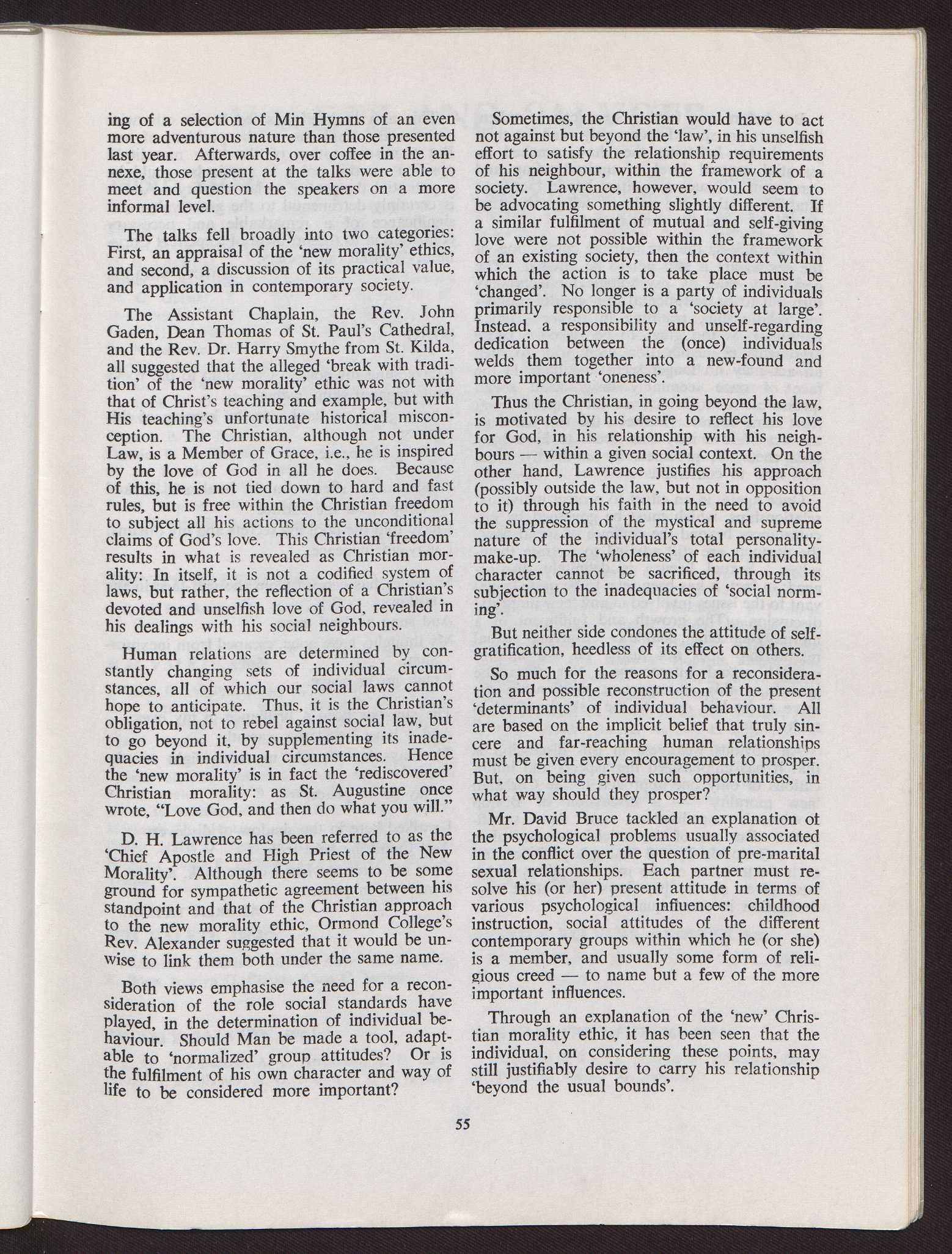
ing of a selection of Min Hymns of an even more adventurous nature than those presented last year. Afterwards, over coffee in the annexe, those present at the talks were able to meet and question the speakers on a more informal level.
The talks fell broadly into two categories: First, an appraisal of the `new morality' ethics, and second, a discussion of its practical value, and application in contemporary society.
The Assistant Chaplain, the Rev. John Gaden, Dean Thomas of St. Paul's Cathedral, and the Rev. Dr. Harry Smythe from St. Kilda, all suggested that the alleged `break with tradition' of the `new morality' ethic was not with that of Christ's teaching and example, but with His teaching's unfortunate historical misconception. The Christian, although not under Law, is a Member of Grace, i.e., he is inspired by the love of God in all he does. Because of this, he is not tied down to hard and fast rules, but is free within the Christian freedom to subject all his actions to the unconditional claims of God's love. This Christian `freedom' results in what is revealed as Christian morality: In itself, it is not a codified system of laws, but rather, the reflection of a Christian's devoted and unselfish love of God, revealed in his dealings with his social neighbours.
Human relations are determined by constantly changing sets of individual circumstances, all of which our social laws cannot hope to anticipate. Thus, it is the Christian's obligation, not to rebel against social law, but to go beyond it, by supplementing its inadequacies in individual circumstances. Hence the `new morality' is in fact the `rediscovered' Christian morality: as St. Augustine once wrote, "Love God, and then do what you will."
D. H. Lawrence has been referred to as the `Chief Apostle and High Priest of the New Morality'. Although there seems to be some ground for sympathetic agreement between his standpoint and that of the Christian approach to the new morality ethic, Ormond College's Rev. Alexander suggested that it would be unwise to link them both under the same name.
Both views emphasise the need for a reconsideration of the role social standards have played, in the determination of individual behaviour. Should Man be made a tool, adaptable to `normalized' group attitudes? Or is the fulfilment of his own character and way of life to be considered more important?
Sometimes, the Christian would have to act not against but beyond the `law', in his unselfish effort to satisfy the relationship requirements of his neighbour, within the framework of a society. Lawrence, however, would seem to be advocating something slightly different. If a similar fulfilment of mutual and self-giving love were not possible within the framework of an existing society, then the context within which the action is to take place must be `changed'. No longer is a party of individuals primarily responsible to a `society at large'. Instead. a responsibility and unself-regarding dedication between the (once) individuals welds them together into a new-found and more important `oneness'.
Thus the Christian, in going beyond the law, is motivated by his desire to reflect his love for God, in his relationship with his neighbours — within a given social context. On the other hand, Lawrence justifies his approach (possibly outside the law, but not in opposition to it) through his faith in the need to avoid the suppression of the mystical and supreme nature of the individual's total personalitymake-up. The `wholeness' of each individual character cannot be sacrificed, through its subjection to the inadequacies of `social vorming'.
But neither side condones the attitude of selfgratification, heedless of its effect on others.
So much for the reasons for a reconsideration and possible reconstruction of the present `determinants' of individual behaviour. All are based on the implicit belief that truly sincere and far-reaching human relationships must be given every encouragement to prosper. But, on being given such opportunities, in what way should they prosper?
Mr. David Bruce tackled an explanation of the psychological problems usually associated in the conflict over the question of pre-marital sexual relationships. Each partner must resolve his (or her) present attitude in terms of various psychological influences: childhood instruction, social attitudes of the different contemporary groups within which he (or she) is a member, and usually some form of religious creed — to name but a few of the more important influences.
Through an explanation of the `new' Christian morality ethic, it has been seen that the individual, on considering these points, may still justifiably desire to carry his relationship `beyond the usual bounds'.
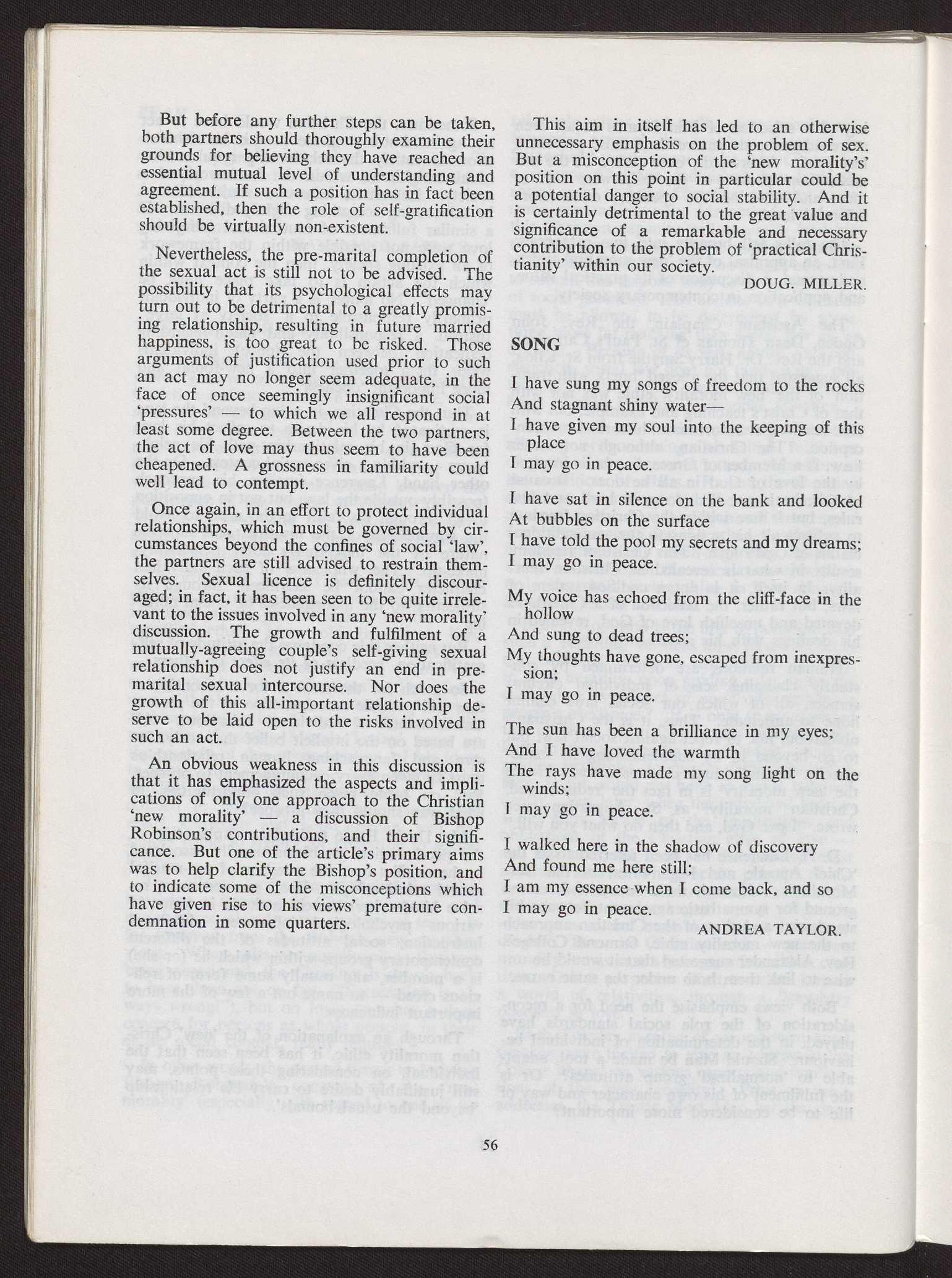
But before any further steps can be taken, both partners should thoroughly examine their grounds for believing they have reached an essential mutual level of understanding and agreement. If such a position has in fact been established, then the role of self-gratification should be virtually non-existent.
Nevertheless, the pre-marital completion of the sexual act is still not to be advised. The possibility that its psychological effects may turn out to be detrimental to a greatly promising relationship, resulting in future married happiness, is too great to be risked. Those arguments of justification used prior to such an act may no longer seem adequate, in the face of once seemingly insignificant social `pressures' — to which we all respond in at least some degree. Between the two partners, the act of love may thus seem to have been cheapened. A grossness in familiarity could well lead to contempt.
Once again, in an effort to protect individual relationships, which must be governed by circumstances beyond the confines of social `law', the partners are still advised to restrain themselves. Sexual licence is definitely discouraged; in fact, it has been seen to be quite irrelevant to the issues involved in any `new morality' discussion. The growth and fulfilment of a mutually-agreeing couple's self-giving sexual relationship does not justify an end in premarital sexual intercourse. Nor does the growth of this all-important relationship deserve to be laid open to the risks involved in such an act..
An obvious weakness in this discussion is that it has emphasized the aspects and implications of only one approach to the Christian `new morality' — a discussion of Bishop Robinson's contributions, and their significance. But one of the article's primary aims was to help clarify the Bishop's position, and to indicate some of the misconceptions which have given rise to his views' premature condemnation in some quarters.
This aim in itself has led to an otherwise unnecessary emphasis on the problem of sex. But a misconception of the `new morality's' position on this point in particular could be a potential danger to social stability. And it is certainly detrimental to the great value and significance of a remarkable and necessary contribution to the problem of `practical Christianity' within our society.
DOUG. MILLER.
I have sung my songs of freedom to the rocks And stagnant shiny water-
I have given my soul into the keeping of this place
I may go in peace.
I have sat in silence on the bank and looked At bubbles on the surface
I have told the pool my secrets and my dreams; I may go in peace.
My voice has echoed from the cliff-face in the hollow And sung to dead trees; My thoughts have gone, escaped from inexpression;
I may go in peace.
The sun has been a brilliance in my eyes; And I have loved the warmth
The rays have made my song light on the winds;
I may go in peace.
I walked here in the shadow of discovery And found me here still;
I am my essence when I come back, and so I may go in peace.
ANDREA TAYLOR.
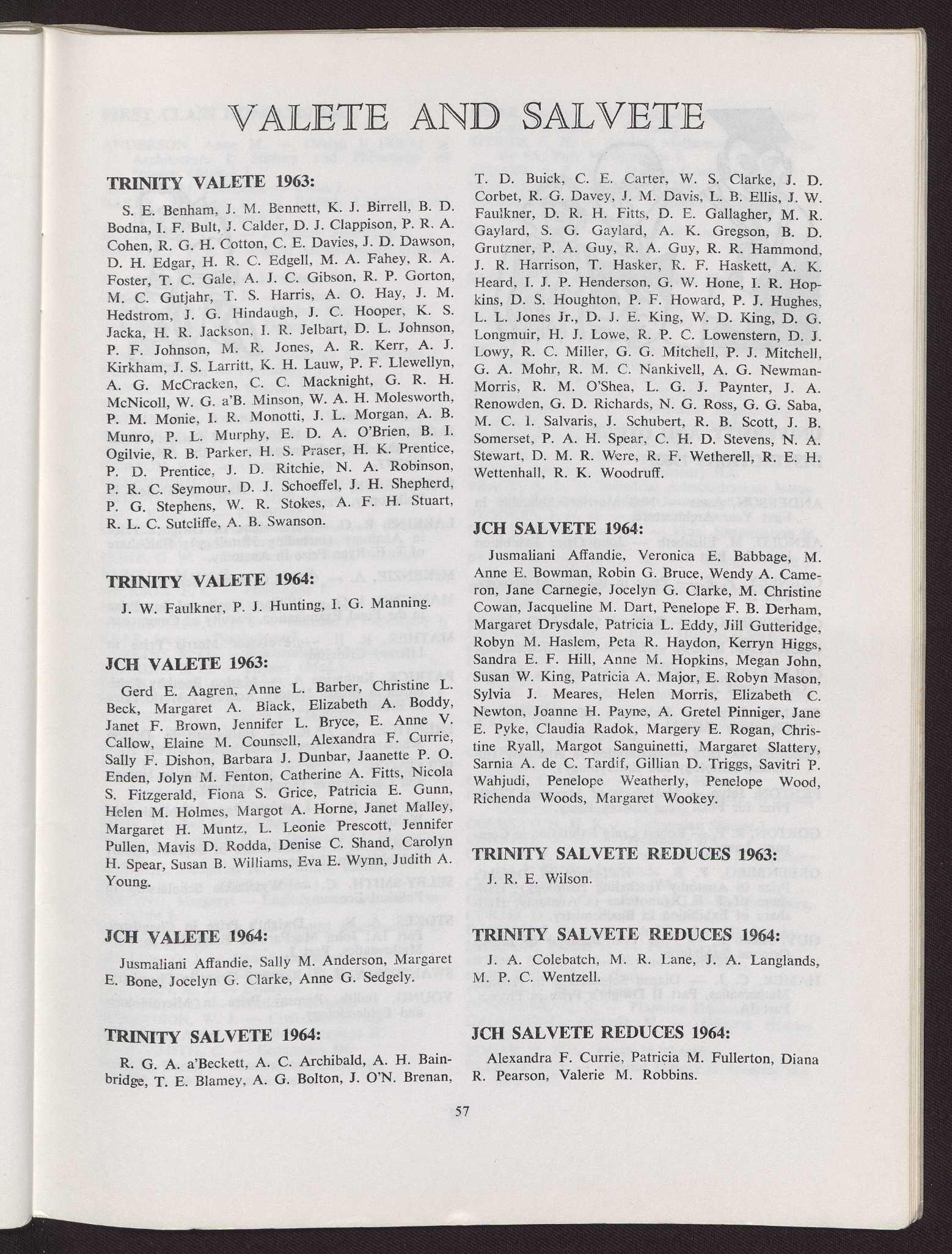
TRINITY VALETE 1963:
S. E. Benham, J. M. Bennett, K. J. Birrell, B. D. Bodna, I. F. Bült, J. Calder, D. J. Clappison, P. R. A. Cohen, R. G. H. Cotton, C. E. Davies, J. D. Dawson, D. H. Edgar, H. R. C. Edgell, M. A. Fahey, R. A. Foster, T. C. Gale, A. J. C. Gibson, R. P. Gorton, M. C. Gutjahr, T. S. Harris, A. O. Hay, J. M. Hedstrom, J. G. Hindaugh, J. C. Hooper, K. S. Jacka, H. R. Jackson, I. R. Jelbart, D. L. Johnson, P. F. Johnson, M. R. Jones, A. R. Kerr, A. J. Kirkham, J. S. Larritt, K. H. Lauw, P. F. Llewellyn, A. G. McCracken, C. C. Macknight, G. R. H. McNicoll, W. G. a'B. Minson, W. A. H. Molesworth, P. M. Monie, I. R. Monotti, J. L. Morgan, A. B. Munro, P. L. Murphy, E. D. A. O'Brien, B. I. Ogilvie, R. B. Parker, H. S. Praser, H. K. Prentice, P. D. Prentice, J. D. Ritchie, N. A. Robinson, P. R. C. Seymour, D. J. Schoeffel, J. H. Shepherd, P. G. Stephens, W. R. Stokes, A. F. H. Stuart, R. L. C. Sutcliffe, A. B. Swanson.
TRINITY VALETE 1964: J. W. Faulkner, P. J. Hunting, L G. Manning.
ICH VALETE 1963:
Gerd E. Aagren, Anne L. Barber, Christine L. Beck, Margaret A. Black, Elizabeth A. Boddy, Janet F. Brown, Jennifer L. Bryce, E. Anne V. Callow, Elaine M. Counsell, Alexandra F. Currie, Sally F. Dishon, Barbara J. Dunbar, Jaanette P. O. Enden, Jolyn M. Fenton, Catherine A. Fitts, Nicola S. Fitzgerald, Fiona S. Grice, Patricia E. Gunn, Helen M. Holmes, Margot A. Home, Janet Malley, Margaret H. Muntz, L. Leonie Prescott, Jennifer Pullen, Mavis D. Rodda, Denise C. Shand, Carolyn H. Spear, Susan B. Williams, Eva E. Wynn, Judith A. Young.
ICH VALETE 1964: Jusmaliani Affandie, Sally M. Anderson, Margaret E. Bone, Jocelyn G. Clarke, Anne G. Sedgely.
TRINITY SALVETE 1964:
R. G. A. a'Beckett, A. C. Archibald, A. H. Bainbridge, T. E. Blarney, A. G. Bolton, J. O'N. Brenan,
T. D. Buick, C. E. Carter, W. S. Clarke, J. D. Corbet, R. G. Davey, J. M. Davis, L. B. Ellis, J. W. Faulkner, D. R. H. Fitts, D. E. Gallagher, M. R. Gaylard, S. G. Gaylard, A. K. Gregson, B. D. Grutzner, P. A. Guy, R. A. Guy, R. R. Hammond, J. R. Harrison, T. Hasker, R. F. Haskett, A. K. Heard, I. J. P. Henderson, G. W. Hone, I. R. Hopkins, D. S. Houghton, P. F. Howard, P. J. Hughes, L. L. Jones Jr., D. J. E. King, W. D. King, D. G. Longmuir, H. J. Lowe, R. P. C. Lowenstein, D. J. Lowy, R. C. Miller, G. G. Mitchell, P. J. Mitchell, G. A. Mohr, R. M. C. Nankivell, A. G. NewmanMorris, R. M. O'Shea, L. G. J. Paynter, J. A. Renowden, G. D. Richards, N. G. Ross, G. G. Saba, M. C. I. Salvaris, J. Schubert, R. B. Scott, J. B. Somerset, P. A. H. Spear, C. H. D. Stevens, N. A. Stewart, D. M. R. Were, R. F. Wetherell, R. E. H. Wettenhall, R. K. Woodruff.
1964:
Jusmaliani Affandie, Veronica E. Babbage, M. Anne E. Bowman, Robin G. Bruce, Wendy A. Cameron, Jane Carnegie, Jocelyn G. Clarke, M. Christine Cowan, Jacqueline M. Dart, Penelope F. B. Derham, Margaret Drysdale, Patricia L. Eddy, Jill Gutteridge, Robyn M. Haslem, Peta R. Haydon, Kerryn Higgs, Sandra E. F. Hill, Anne M. Hopkins, Megan John, Susan W. King, Patricia A. Major, E. Robyn Mason, Sylvia J. Meares, Helen Morris, Elizabeth C. Newton, Joanne H. Payne, A. Gretel Pinniger, Jane E. Pyke, Claudia Radok, Margery E. Rogan, Christine Ryall, Margot Sanguinetti, Margaret Slattery, Sarnia A. de C. Tardif, Gillian D. Triggs, Savitri P. Wahjudi, Penelope Weatherly, Penelope Wood, Richenda Woods, Margaret Wookey.
TRINITY SALVETE REDUCES 1963: J. R. E. Wilson.
TRINITY SALVETE REDUCES 1964: J. A. Colebatch, M. R. Lane, J. A. Langlands, M. P. C. Wentzell.
ICH SALVETE REDUCES 1964:
Alexandra F. Currie, Patricia M. Fullerton, Diana R. Pearson, Valerie M. Robbins.
UNIVERSITY AND OTHER DISTINCTIONS 1963:
ANDERSON, Anne — Nell Morris Scholarship First Year Architecture.
ARNOLD, M. Elizabeth — John Grice in Latin, Part I.
CARNLEY, P. F. — Part II.
CLAPPISON, D. J. —
COCKAYNE, D. J. H.
COLEBATCH, H. K Government A.

JACKSON, H. R. — Half-share of Dwight's Prize in the Final Examination in the School of History.
KAEMMERER, J. P. S. — Hastie Exhibition in in Philosophy, Part I.
Exhibition Prize in Biblical Archeology, Research Grant in Geology. — Daniel Curdie Scholarship. . — Exhibition in Modern
CRANE, Carol — Half-share of Exhibition in Chemistry (Med.).
FEIGLIN, D. H. I. — Exhibition in Anatomy (including Histology and Embryology).
FENTON, Jolyn — Half-share of Margaret Kiddie Prize for Final Year History Essay.
GORTON, R. P. — Robert Craig Exhibition in Company Law.
GREENBERG, P. B. — Half-share of Dwight's Prize in Anatomy (including Histology); Halfshare of T. F. Ryan Prize in Anatomy; Halfshare of Exhibition in Biochemistry.
GUY, Jillian R. -- First Year Bachelor of Music, Ormond Exhibition.
HAMER, C. J. — Dixson Scholarship in Applied Mathematics, Part I; Dwight's Prize in Physics, Part IA.
LARKINS, R. G. — Half-share of Dwight's Prize in Anatomy (including Histology); Half-share of T. F. Ryan Prize in Anatomy.
McKENZIE, A. — C.S.I.R.O. Senior Scholarship.
MANNING, I. G. — William Noall and Son Prize in the Final Examination, Faculty of Commerce.
MATHER, R. E. — Professor Morris Prize in Literary Criticism.
PATRICK, Katharine A. — Marion Boothby Exhibition in British History; Rosemary Merlo Prize in British History.
PRENTICE, A. J. R. — Half-share in Dixson Scholarship in Applied Mathematics, Part II.
PULLEN, G. J. — E. B. Nicholls Prize in Human and Comparative Dental Anatomy.
READ, Julia B. — Biology.
REDFERN, M. J. Exhibition in E
J. F. W. Payne Exhibition in
— Half-share of Supreme Court vidence.
SELBY-SMITH, C. Political Econom
Wyselaskie Scholarship in y
STOKES, A. N. — Dwight's Prize in Chemistry, Part IA; John MacFarland Exhibition in Pure Mathematics, Part I.
SWANSON, A. B. — Research Grant in Chemistry.
YOUNG, Judith, Ramsay Prize in Microbiology and Epidemiology.
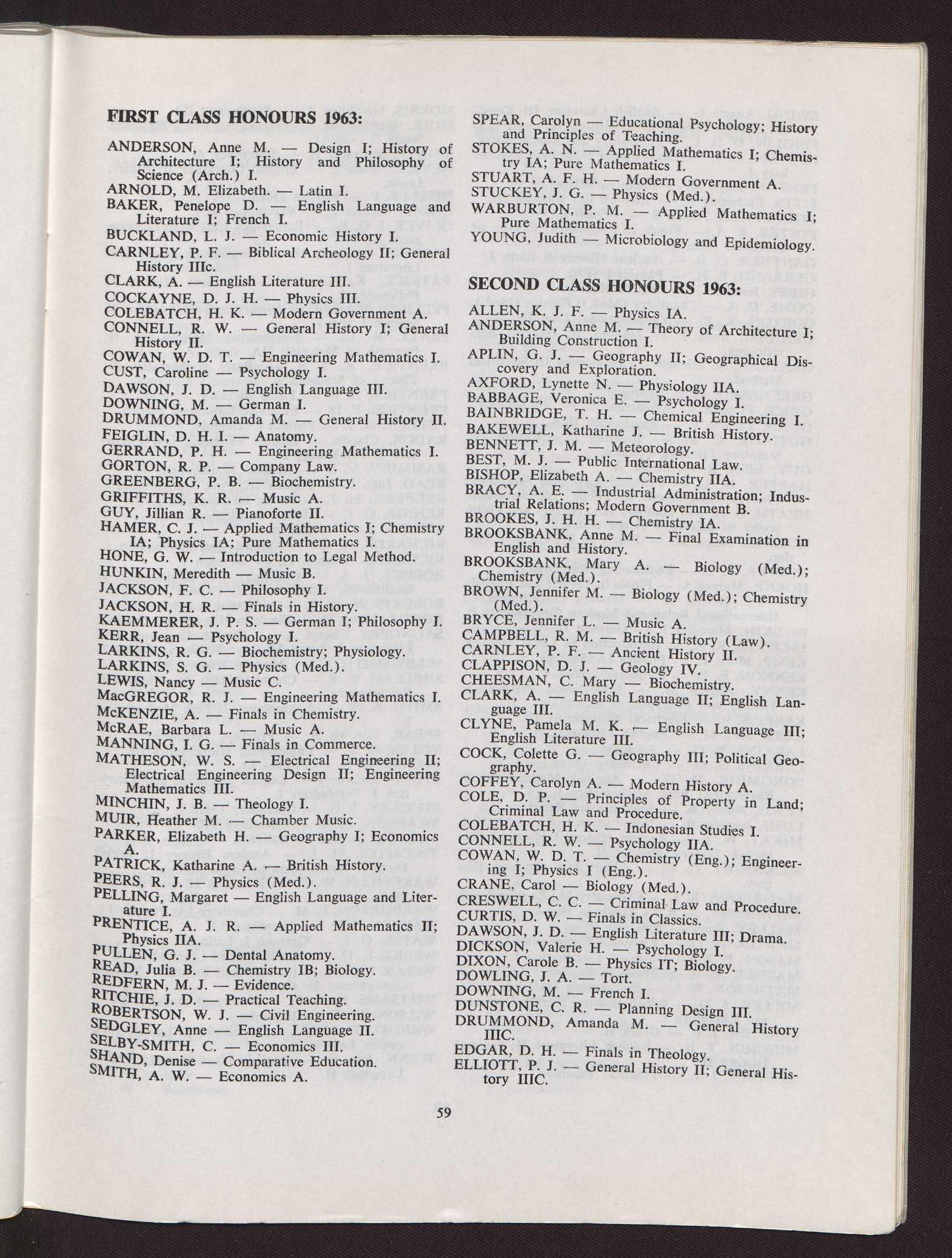
FIRST CLASS HONOURS 1963:
ANDERSON, Anne M. — Design I; History of Architecture I; History and Philosophy of Science (Arch.) I.
ARNOLD, M. Elizabeth. — Latin I.
BAKER, Penelope D. — English Language and Literature I; French I.
BUCKLAND, L. J. — Economic History I. CARNLEY, P. F. — Biblical Archeology II; General History Inc.
CLARK, A. — English Literature III. COCKAYNE, D. J. H. — Physics III.
COLEBATCH, H. K. — Modern Government A. CONNELL, R. W. — General History I; General History II.
COWAN, W. D. T. — Engineering Mathematics I. CUST, Caroline — Psychology I.
DAWSON, J. D. — English Language III. DOWNING, M. — German I.
DRUMMOND, Amanda M. — General History II.
FEIGLIN, D. H. I. — Anatomy.
GERRAND, P. H. — Engineering Mathematics I. GORTON, R. P. — Company Law. GREENBERG, P. B. — Biochemistry.
GRIFFITHS, K. R. r-- Music A. GUY, Jillian R. — Pianoforte II.
HAMER, C. J. — Applied Mathematics I; Chemistry IA; Physics IA; Pure Mathematics I.
HONE, G. W. — Introduction to Legal Method.
HUNKIN, Meredith — Music B.
JACKSON, F. C. — Philosophy I.
JACKSON, H. R. — Finals in History.
KAEMMERER, J. P. S. — German I; Philosophy I.
KERR, Jean — Psychology I.
LARKINS, R. G. — Biochemistry; Physiology.
LARKINS, S. G. — Physics (Med.).
LEWIS, Nancy — Music C. MacGREGOR, R. J. — Engineering Mathematics I.
McKENZIE, A. — Finals in Chemistry.
McRAE, Barbara L. — Music A. MANNING, I. G. — Finals in Commerce.
MATHESON, W. S. — Electrical Engineering II; Electrical Engineeri ng Design II; Engineering Mathematics III.
MINCHIN, J. B. — Theology I. MUIR, Heather M. — Chamber Music. PARKER, Elizabeth H. — Geography I; Economics A.
PATRICK, Katharine A. .— British History. PEERS, R. J. — Physics (Med.).
PELLING, Margaret — English Language and Literature I.
PRENTICE, A. J. R. — Applied Mathematics II; Physics IIA.
PULLEN, G. J. — Dental Anatomy. READ, Julia B. — Chemistry IB; Biology. REDFERN, M. J. — Evidence.
RITCHIE, J. D. — Practical Teaching.
ROBERTSON, W. J. — Civil Engineering. SEDGLEY, Anne — English Language II.
SELBY-SMITH, C. — Economics III.
SHAND, Denise — Comparative Education.
SM ITH, A. W. — Economics A.
SPEAR, Carolyn — Educational Psychology; History and Principles of Teaching.
STOKES, A. N. — Applied Mathematics I; Chemis- try IA; Pure Mathematics I.
STUART, A. F. H. — Modern Government A.
STUCKEY, J. G. — Physics (Med.).
WARBURTON, P. M. — Applied Mathematics I; Pure Mathematics I.
YOUNG, Judith — Microbiology and Epidemiology.
CLASS HONOURS 1963:
ALLEN, K. J. F. — Physics IA.
ANDERSON, Anne M. Theory of Architecture I; Building Construction I.
APLIN, G. J. — Geography II; Geographical Dis- covery and Exploration.
AXFORD, Lynette N. — Physiology IIA.
BABBAGE, Veronica E. — Psychology I.
BAINBRIDGE, T. H. — Chemical. Engineering I.
BAKEWELL, Katharine J. — British History.
BENNETT, J. M. — Meteorology.
BEST, M. J. — Public International Law.
BISHOP, Elizabeth A. — Chemistry IIA.
BRACY, A. E. — Industrial Administration; Industrial Relations; Modern Government B.
BROOKES, J. H. H. — Chemistry IA.
BROOKSBANK, Anne M. — Final Examination in English and History.
BROOKSBANK, Mary A. — Biology (Med.) ; Chemistry (Med.).
BROWN, Jennifer M. — Biology (Med.); Chemistry (Med.).
BRYCE, Jennifer L. — Music A.
CAMPBELL, R. M. — British History (Law).
CARNLEY, P. F. — Ancient History II.
CLAPPISON, D. J. — Geology IV.
CHEESMAN, C. Mary — Biochemistry.
CLARK, A. — English Language II; English Lan- guage III.
CLYNE, Pamela M. K. English Language III; English Literature III.
COCK, Colette G. — Geography III; Political Geo- graphy.
COFFEY, Carolyn A. — Modern History A.
COLE, D. P. — Principles of Property in Land; Criminal Law and Procedure.
COLEBATCH, H. K. — Indonesian Studies I.
CONNELL, R. W. — Psychology IIA.
COWAN, W. D. T. — Chemistry (Eng.); Engineer- ing I; Physics I (Eng.).
CRANE. Carol — Biology (Med.).
CRESWELL, C. C. — Criminal Law and Procedure.
CURTIS, D. W. — Finals in Classics.
DAWSON, J. D. — English Literature III; Drama.
DICKSON, Valerie H. — Psychology I.
DIXON, Carole B. — Physics IT; Biology.
DOWLING, J. A. — Tort.
DOWNING, M. — French I.
DUNSTONE, C. R. — Planning Design III. DRUMMOND, Amanda M. — General History IIIC.
EDGAR, D. H. — Finals in Theology.
ELLIOTT, P. J. — General History II; General His- tory IIIC.
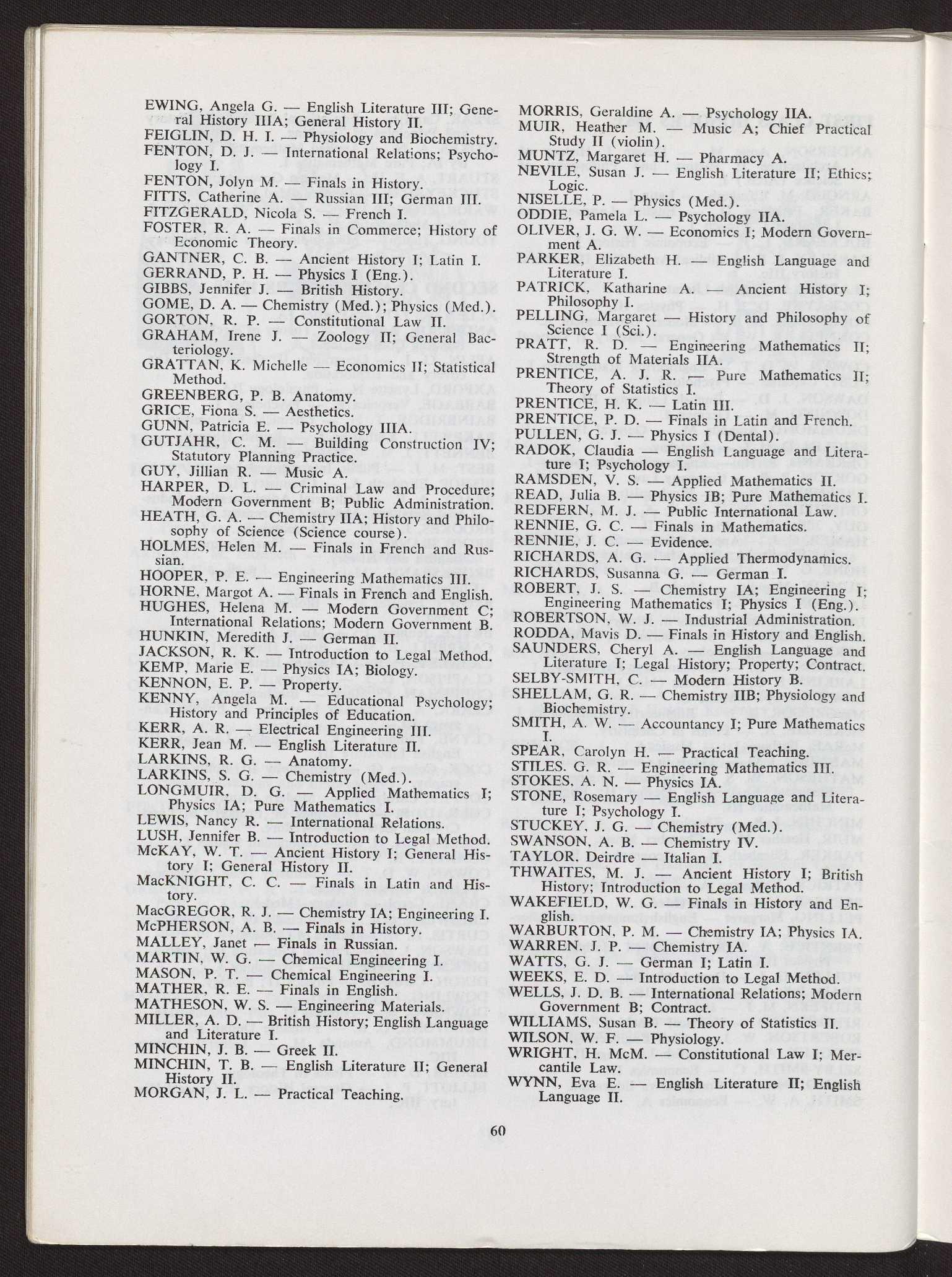
EWING, Angela G. — English Literature III;. General History IIIA General History II.
FEIGLIN, D. H. I. r- Physiology and Biochemistry.
FENTON, D. J. — International Relations; Psycho- logy I.
FENTON, Jolyn M. — Finals in History.
FITTS, Catherine A. — Russian III; German III.
FITZGERALD, Nicola S. — French I.
FOSTER, R. A. — Finals in Commerce; History of Economic Theory.
GANTNER, C. B. — Ancient History I; Latin I.
GERRAND, P. H. — Physics I (Eng.) .
GIBBS, Jennifer J. — British History.
GOME, D. A. — Chemistry (Med.); Physics (Med.).
GORTON, R. P. — Constitutional Law II.
GRAHAM, Irene J. — Zoology II; General Bac- teriology.
GRATTAN, K. Michelle — Economics II; Statistical Method.
GREENBERG, P. B. Anatomy.
GRICE, Fiona S. — Aesthetics.
GUNN, Patricia E. — Psychology IIIA.
GUTJAHR, C. M. — Building Construction IV; Statutory Planning Practice.
GUY, Jillian R. — Music A.
HARPER, D. L. Criminal Law and Procedure; Modern Government B; Public Administration.
HEATH, G. A. — Chemistry IIA; History and Philosophy of Science (Science course).
HOLMES, Helen M. — Finals in French and Russian.
HOOPER, P. E. -- Engineering Mathematics III.
HORNE, Margot A. — Finals in French and English.
HUGHES, Helena M. — Modern Government C; International Relations; Modern Government B.
HUNKIN, Meredith J. — German II.
JACKSON, R. K. — Introduction to Legal Method.
KEMP, Marie E. — Physics IA; Biology.
KENNON, E. P. — Property.
KENNY, Angela M. — Educational Psychology; History and Principles of Education.
KERR, A. R. — Electrical Engineering III.
KERR, Jean M. - English Literature II.
LARKINS, R. G. — Anatomy.
LARKINS, S. G. — Chemistry (Med.).
LONGMUIR, D. G. — Applied Mathematics I; Physics IA; Pure Mathematics I.
LEWIS, Nancy R. — International Relations.
LUSH, Jennifer B. — Introduction to Legal Method.
McKAY, W. T. — Ancient History I; General History I; General History II.
MacKNIGHT, C. C. — Finals in Latin and History.
MacGREGOR, R. J. — Chemistry IA; Engineering I. McPHERSON, A. B. — Finals in History.
MALLEY, Janet .— Finals in Russian.
MARTIN, W. G. — Chemical Engineering I.
MASON, P. T. — Chemical Engineering I.
MATHER, R. E. — Finals in English.
MATHESON, W. S. — Engineering Materials.
MILLER, A. D. — British History; English Language and Literature I.
MINCHIN, J. B. — Greek II.
MINCHIN, T. B. — English Literature II; General History II.
MORGAN, J. L. — Practical Teaching.
MORRIS, Geraldine A. —. Psychology IIA.
MUIR, Heather M. — Music A; Chief Practical Study IÏ (violin).
MUNTZ, Margaret H. — Pharmacy A.
NEVILE, Susan J. English. Literature II; Ethics; Logic.
NISELLE, P. — Physics (Med.).
ODDIE, Pamela L. — Psychology IIA.
OLIVER, J. G. W. — Economics I; Modern Government A.
PARKER, Elizabeth H. — English Language and Literature I.
PATRICK, Katharine A. — Ancient History I; Philosophy I.
PELLING, Margaret — History and Philosophy of Science I (Sci.).
PRATT, R. D. — Engineering Mathematics II; Strength of Materials IIA.
PRENTICE, A. J. R. Pure Mathematics II; Theory of Statistics I.
PRENTICE, H. K. — Latin III.
PRENTICE, P. D. — Finals in Latin and French.
PULLEN, G. J. — Physics I (Dental).
RADOK, Claudia — English Language and Literature I; Psychology I.
RAMSDEN, V. S. — Applied Mathematics II.
READ, Julia B. — Physics IB; Pure Mathematics L REDFERN, M. J. — Public International Law.
RENNIE, G. C. — Finals in Mathematics.
RENNIE, J. C. — Evidence.
RICHARDS, A. G. Applied Thermodynamics.
RICHARDS, Susanna G. — German I.
ROBERT, J. S. — Chemistry IA; Engineeri ng I; Engineering Mathematics I; Physics I (Eng.).
ROBERTSON, W. J. — Industrial Administration.
RODDA, Mavis D. — Finals in History and English.
SAUNDERS, Cheryl A. — English Language and Literature I; Legal History; Property; Contract.
SELBY-SMITH, C. — Modern History B.
SHELLAM, G. R. — Chemistry IIB; Physiology and SMITH,Biochemistry. A. W. — Accountancy I; Pure Mathematics L
SPEAR, Carolyn H. — Practical Teaching.
STILES. G. R. — Engineeri ng Mathematics III.
STOKES, A. N. — Physics IA.
STONE, Rosemary — English Language and Literature I; Psychology L
STUCKEY, J. G. — Chemistry (Med.).
SWANSON, A. B. — Chemistry IV.
TAYLOR, Deirdre — Italian I.
THWAITES, M. J. — Ancient History I; British History; Introduction to Legal Method.
WAKEFIELD, W. G. — Finals in History and En- glish.
WARBURTON, P. M. — Chemistry IA; Physics IA.
WARREN , J. P. — Chemistry IA.
WATTS, G. J. — German I; Latin I.
WEEKS, E. D. — Introduction to Legal Method.
WELLS, J. D. B. — International Relations; Modern Government B; Contract.
WILLIAMS, Susan B. — Theory of Statistics II.
WILSON, W. F. — Physiology.
WRIGHT, H. McM. — Constitutional Law I; Mercantile Law.
WYNN, Eva E. — English Literature II; English Language II.
DEGREES CONFERRED 1963-1964: BACHELOR OF LAWS (Ordinary Degree):
BACHELOR OF AGRICULTURAL SCIENCE:
H. R. C. Edgell
W. A. H. Molesworth
BACHELOR OF ARCHITECTURE:
C.
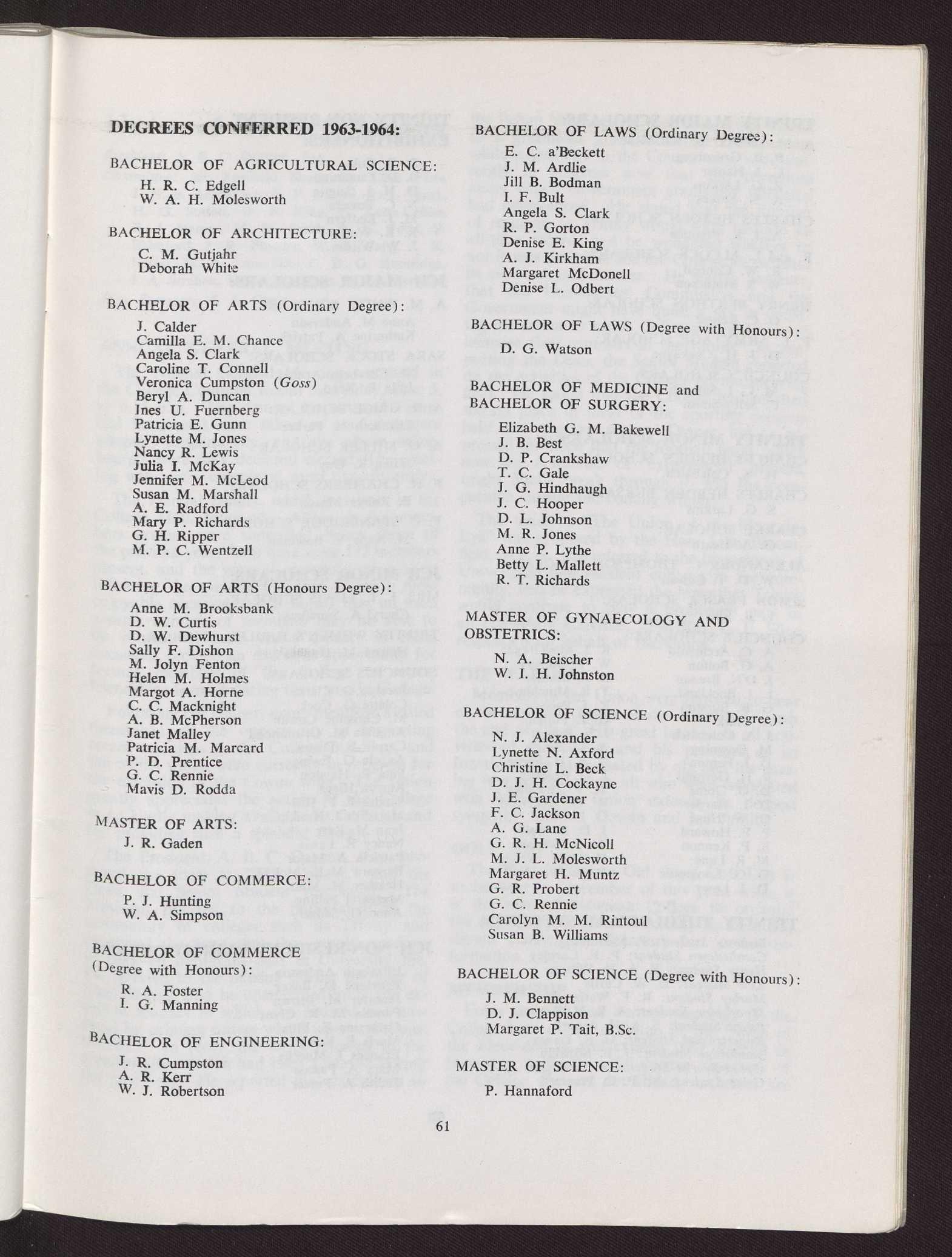
E. C. a'Beckett
J. M. Ardlie
Jill B. Bodman
I. F. Bult
Angela S. Clark
R. P. Gorton
Denise E. King M. Gutjahr
Deborah White
BACHELOR OF ARTS (Ordinary Degree) :
J. Calder
Camilla E. M. Chance
Angela S. Clark
Caroline T. Connell
Veronica Cumpston (Goss)
Beryl A. Duncan
Ines U. Fuernberg
Pat ricia E. Gunn
Lynette M. Jones
Nancy R. Lewis
Julia I. McKay
Jennifer M. McLeod
Susan M. Marshall
A. E. Radford
Mary P. Richards
G. H. Ripper
M. P. C. Wentzell
BACHELOR OF ARTS (Honours Degree) :
Anne M. Brooksbank
D. W. Curtis
D. W. Dewhurst
Sally F. Dishon
M. Jolyn Fenton
Helen M. Holmes
Margot A. Horne
C. C. Macknight
A. B. McPherson
Janet Malley
Pat ricia M. Marcard
P. D. Prentice
G. C. Rennie
Mavis D. Rodda
MASTER OF ARTS:
J. R. Gaden
BACHELOR OF COMMERCE:
P. J. Hunting
W. A. Simpson
BACHELOR OF COMMERCE (Degree with Honours) :
R. A. Foster
I• G. Manning
BACHELOR OF ENGINEERING:
J. R. Cumpston
A. R. Kerr
W. J. Robertson
A. J. Kirkham
Margaret McDonell
Denise L. Odbert
BACHELOR OF LAWS (Degree with Honours):
D. G. Watson
BACHELOR OF MEDICINE and BACHELOR OF SURGERY:
Elizabeth G. M. Bakewell
J. B. Best
D. P. Crankshaw
T. C. Gale
J. G. Hindhaugh
J. C. Hooper
D. L. Johnson
M. R. Jones
Anne P. Lythe
Betty L. Mallett
R. T. Richards
MASTER OF GYNAECOLOGY AND OBSTETRICS:
N. A. Beischer
W. I. H. Johnston
BACHELOR OF SCIENCE (Ordinary Degree) :
N. J. Alexander
Lynette N. Axford
Christine L. Beck
D. J. H. Cockayne
J. E. Gardener
F. C. Jackson
A. G. Lane
G. R. H. McNicoll
M. J. L. Molesworth
Margaret H. Muntz
G. R. Probert
G. C. Rennie
Carolyn M. M. Rintoul
Susan B. Williams
BACHELOR OF SCIENCE (Degree with Honours) :
J. M. Bennett
D. J. Clappison
Margaret P. Tait, B.Sc.
MASTER OF SCIENCE:
P. Hannaford
TRINITY MAJOR SCHOLARS:
A. M. WHITE SCHOLARS:
P. B. Greenberg
C. J. Hamer
R. G. Larkins
A. N. Stokes
CHARLES HEBDEN SCHOLAR:
A. J. R. Prentice
R. and L. ALCOCK SCHOLARS:
R. W. Connell
W. S. Matheson
HENRY BERTHON SCHOLAR:
G. C. Rennie
F. L. ARMYTAGE SCHOLAR:
D. J. H. Cockayne
COUNCIL'S SCHOLARS:
M. C. I. Salvaris
C. Selby-Smith
TRINITY MINOR SCHOLARS:
CHARLES HEBDEN SCHOLAR:
H. K. Colebatch
CHARLES HEBDEN BURSARY:
S. G. Larkins
CLARKE SCHOLAR:
G. A. Heath
ALEXANDER C. THOMPSON SCHOLAR:
W. D. T. Cowan
SIMON FRASER SCHOLAR:
L. B. Ellis
COUNCIL'S SCHOLARS:
A. C. Archibald
A. G. Bolton
J. O'N. Brenan
L. J. Buckland
G. E. Burston
A. Clark
J. A. Colebatch
M. Downing
D. J. Fenton
P. H. Gerrand
D. G. Gome
D. L. Harper
G. W. Hone
P. F. Howard
E. P. Kennon
M. R. Lane
D. G. Longmuir
D. J. Lowy
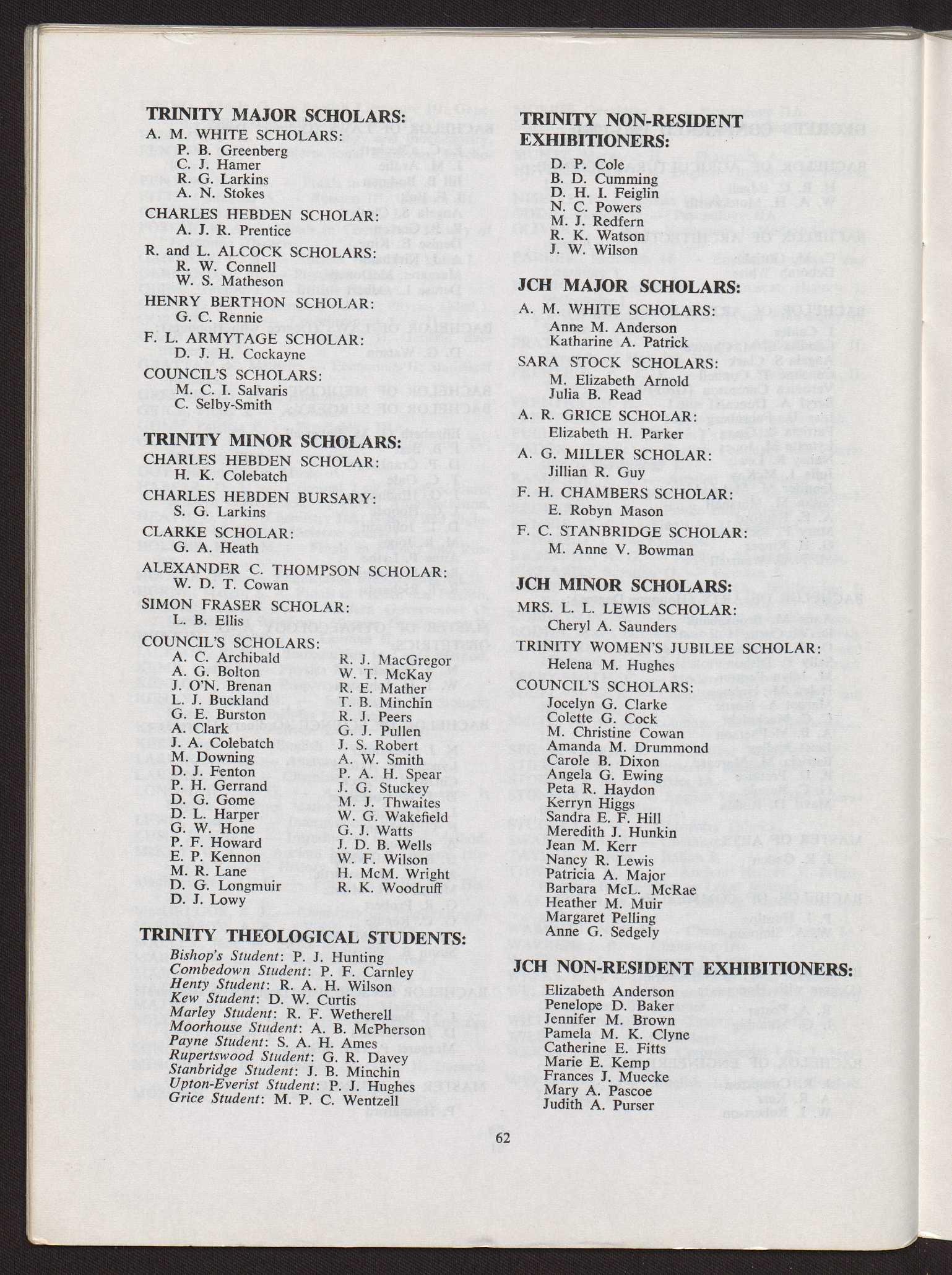
R. J. MacGregor
W. T. McKay
R. E. Mather
T. B. Minchin
R. J. Peers
G. J. Pullen
J. S. Robert
A. W. Smith
P. A. H. Spear
J. G. Stuckey
M. J. Thwaites
W. G. Wakefield
G. J. Watts
J. D. B. Wells
W. F. Wilson
H. McM. Wright
R. K. Woodruff
TRINITY THEOLOGICAL STUDENTS:
Bishop's Student: P. J. Hunting
Combedown Student: P. F. Carnley
Henty Student: R. A. H. Wilson
Kew Student: D. W. Curtis
Marley Student: R. F. Wetherell
Moorhouse Student: A. B. McPherson
Payne Student: S. A. H. Ames
Rupertswood Student: G. R. Davey
Stanbridge Student: J. B. Minchin
Upton-Everist Student: P. J. Hughes
Grice Student: M. P. C. Wentzell
TRINITY NON-RESIDENT EXHIBITIONERS:
D. P. Cole
B. D. Cumming
D. H. I. Feiglin
N. C. Powers
M. J. Redfern
R. K. Watson
J. W. Wilson
JCH MAJOR SCHOLARS:
A. M. WHITE SCHOLARS:
Anne M. Anderson
Katharine A. Patrick
SARA STOCK SCHOLARS:
M. Elizabeth Arnold
Julia B. Read
A. R. GRICE SCHOLAR:
Elizabeth H. Parker
A. G. MILLER SCHOLAR:
Jillian R. Guy
F. H. CHAMBERS SCHOLAR:
E. Robyn Mason
F. C. STANBRIDGE SCHOLAR:
M. Anne V. Bowman
JCH MINOR SCHOLARS:
MRS. L. L. LEWIS SCHOLAR:
Cheryl A. Saunders
TRINITY WOMEN'S JUBILEE SCHOLAR:
Helena M. Hughes
COUNCIL'S SCHOLARS:
Jocelyn G. Clarke
Colette G. Cock
M. Christine Cowan
Amanda M. Drummond
Carole B. Dixon
Angela G. Ewing
Peta R. Haydon
Kerryn Higgs
Sandra E. F. Hill
Meredith J. Hunkin
Jean M. Kerr
Nancy R. Lewis
Patricia A. Major
Barbara McL. McRae
Heather M. Muir
Margaret Pelling
Anne G. Sedgely
JCH NON-RESIDENT EXHIBITIONERS:
Elizabeth Anderson
Penelope D. Baker
Jennifer M. Brown
Pamela M. K. Clyne
Catherine E. Fitts
Marie E. Kemp
Frances J. Muecke
Mary A. Pascoe
Judith A. Purser
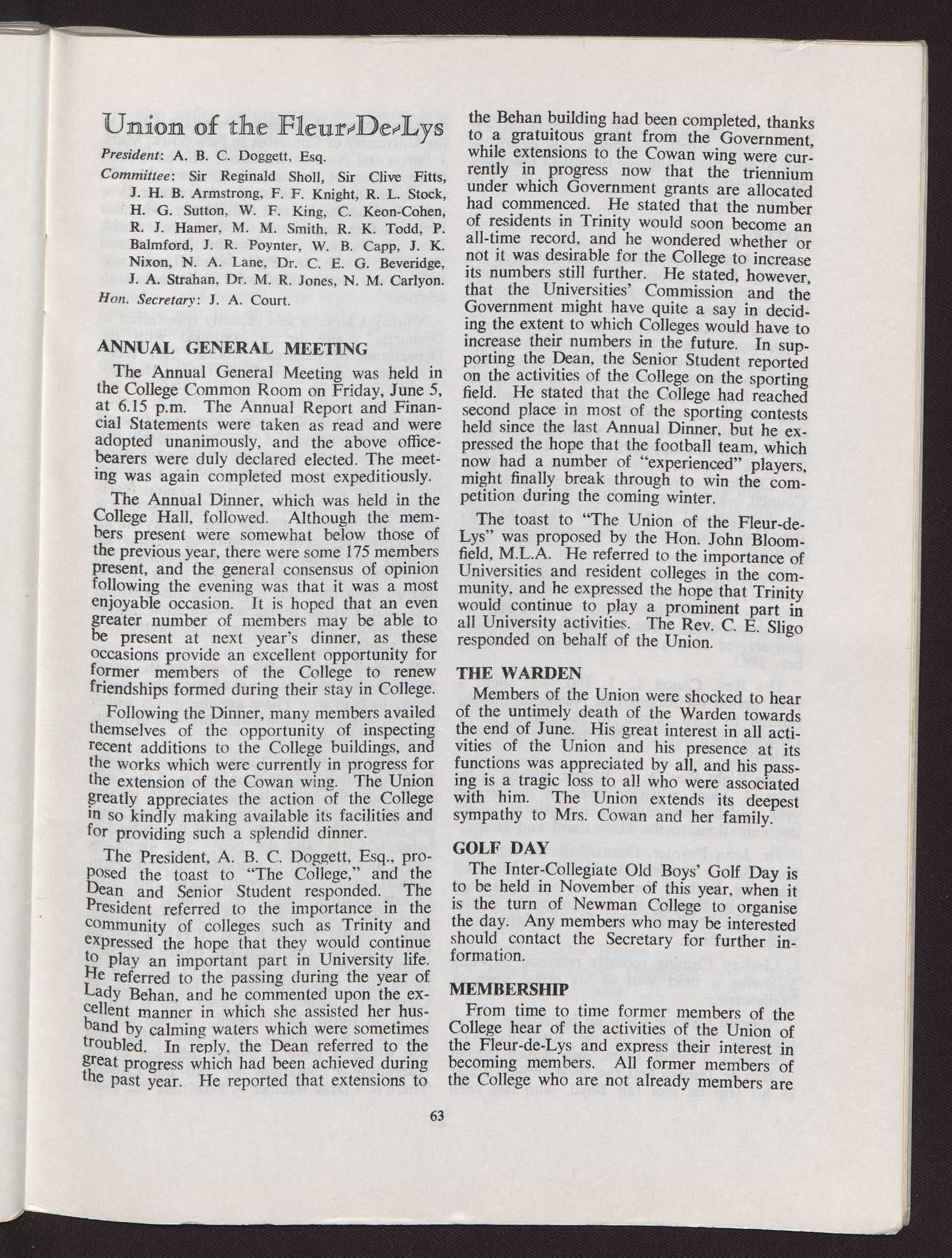
President: A. B. C. Doggett, Esq.
Committee: Sir Reginald Sholl, Sir Clive Fitts, J. H. B. Armstrong, F. F. Knight, R. L. Stock, H. G. Sutton, W. F. King, C. Keon-Cohen, R. J. Hamer, M. M. Smith, R. K. Todd, P. Balmford, J. R. Poynter, W. B. Capp, J. K. Nixon, N. A. Lane, Dr. C. E. G. Beveridge, J. A. Strahan, Dr. M. R. Jones, N. M. Canyon. Hon. Secretary: J. A. Court.
The Annual General Meeting was held in the College Common Room on Friday, June 5, at 6.15 p.m. The Annual Report and Financial Statements were taken as read and were adopted unanimously, and the above officebearers were duly declared elected. The meeting was again completed most expeditiously.
The Annual Dinner, which was held in the College Hall, followed. Although the members present were somewhat below those of the previous year, there were some 175 members present, and the general consensus of opinion following the evening was that it was a most enjoyable occasion. It is hoped that an even greater number of members may be able to be present at next year's dinner, as these occasions provide an excellent opportunity for former members of the College to renew friendships formed during their stay in College. Following the Dinner, many members availed themselves of the opportunity of inspecting recent additions to the College buildings, and the works which were currently in progress for the extension of the Cowan wing. The Union greatly appreciates the action of the College in so kindly making available its facilities and for providing such a splendid dinner.
The President, A. B. C. Doggett, Esq., proPosed the toast to "The College," and the Dean and Senior Student responded. The President referred to the importance in the community of colleges such as Trinity and expressed the hope that they would continue to play an important part in University life. He referred to the passing during the year of Lady Behan, and he commented upon the excellent manner in which she assisted her husband by calming waters which were sometimes troubled. In reply, the Dean referred to the great progress which had been achieved during the past year. He reported that extensions to
the Behan building had been completed, thanks to a gratuitous grant from the Government, while extensions to the Cowan wing were currently in progress now that the triennium under which Government grants are allocated had commenced. He stated that the number of residents in Trinity would soon become an all-time record, and he wondered whether or not it was desirable for the College to increase its numbers still further. He stated, however, that the Universities' Commission and the Government might have quite a say in deciding the extent to which Colleges would have to increase their numbers in the future. In supporting the Dean, the Senior Student reported on the activities of the College on the sporting field. He stated that the College had reached second place in most of the sporting contests held since the last Annual Dinner, but he expressed the hope that the football team, which now had a number of "experienced" players, might finally break through to win the competition during the coming winter.
The toast to "The Union of the Fleur-deLys" was proposed by the Hon. John Bloomfield, M.L.A. He referred to the importance of Universities and resident colleges in the community, and he expressed the hope that Trinity would continue to play a prominent part in all University activities. The Rev. C. E. Sligo responded on behalf of the Union.
Members of the Union were shocked to hear of the untimely death of the Warden towards the end of June. His great interest in all activities of the Union and his presence at its functions was appreciated by all, and his passing is a tragic loss to all who were associated with him. The Union extends its deepest sympathy to Mrs. Cowan and her family.
The Inter-Collegiate Old Boys' Golf Day is to be held in November of this year, when it is the turn of Newman College to organise the day. Any members who may be interested should contact the Secretary for further information.
From time to time former members of the College hear of the activities of the Union of the Fleur-de-Lys and express their interest in becoming members. All former members of the College who are not already members are
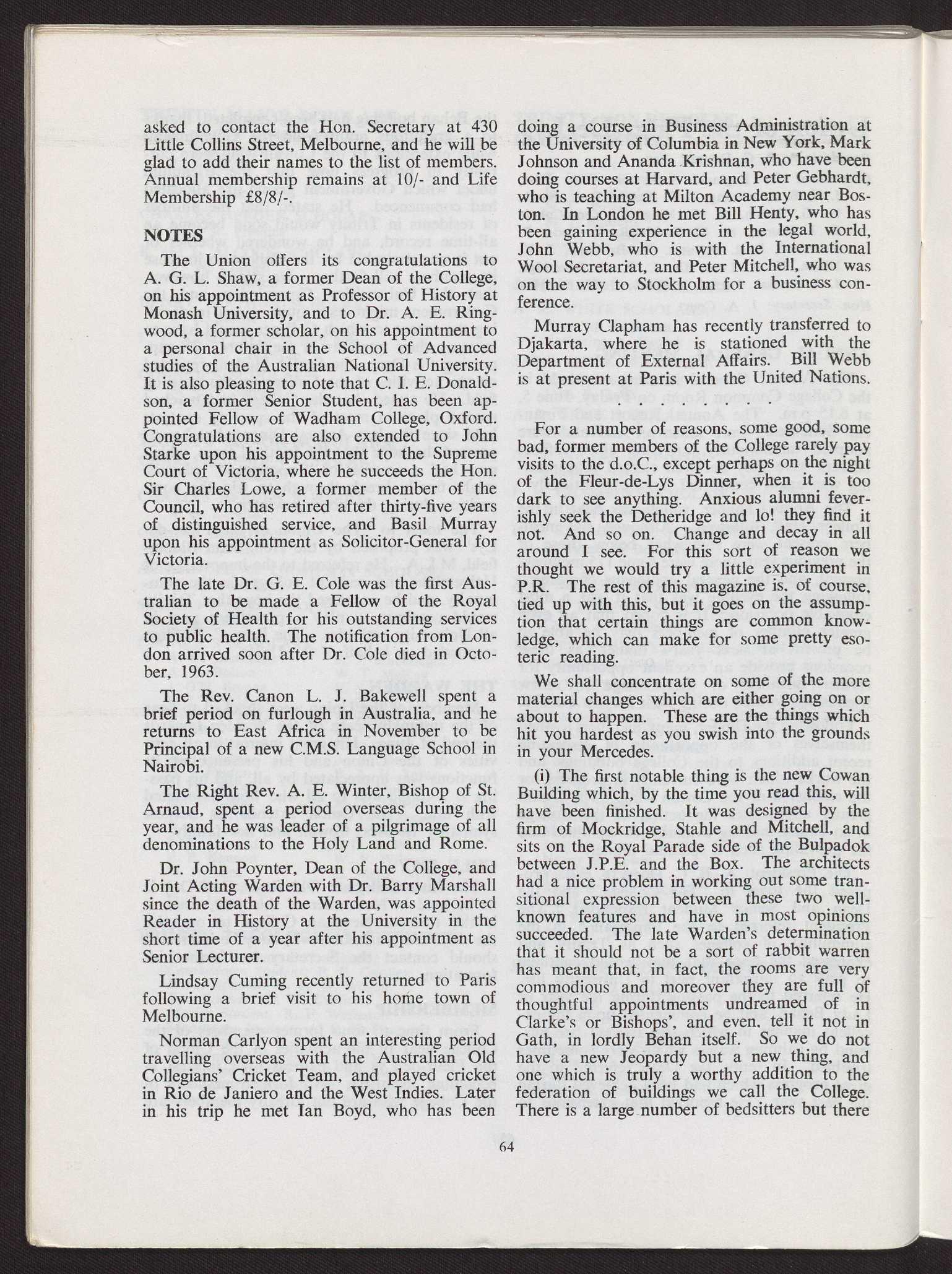
asked to contact the Hon. Secretary at 430 Little Collins Street, Melbourne, and he will be glad to add their names to the list of members. Annual membership remains at 10/- and Life Membership £8/8/-.
The Union offers its congratulations to A. G. L. Shaw, a former Dean of the College, on his appointment as Professor of History at Monash University, and to Dr. A. E. Ringwood, a former scholar, on his appointment to a personal chair in the School of Advanced studies of the Australian National University. It is also pleasing to note that C. I. E. Donaldson, a former Senior Student, has been appointed Fellow of Wadham College, Oxford. Congratulations are also extended to John Starke upon his appointment to the Supreme Court of Victoria, where he succeeds the Hon. Sir Charles Lowe, a former member of the Council, who has retired after thirty-five years of distinguished service, and Basil Murray upon his appointment as Solicitor-General for Victoria.
The late Dr. G. E. Cole was the first Australian to be made a Fellow of the Royal Society of Health for his outstanding services to public health. The notification from London arrived soon after Dr. Cole died in October, 1963.
The Rev. Canon L. J. Bakewell spent a brief period on furlough in Australia, and he returns to East Africa in November to be Principal of a new C.M.S. Language School in Nairobi.
The Right Rev. A. E. Winter, Bishop of St. Arnaud, spent a period overseas during the year, and he was leader of a pilgrimage of all denominations to the Holy Land and Rome.
Dr. John Poynter, Dean of the College, and Joint Acting Warden with Dr. Barry Marshall since the death of the Warden, was appointed Reader in History at the University in the short time of a year after his appointment as Senior Lecturer.
Lindsay Cuming recently returned to Paris following a brief visit to his home town of Melbourne.
Norman Carlyon spent an interesting period travelling overseas with the Australian Old Collegians' Cricket Team, and played cricket in Rio de Janiero and the West Indies. Later in his trip he met Ian Boyd, who has been
doing a course in Business Administration at the University of Columbia in New York, Mark Johnson and Ananda Krishnan, who have been doing courses at Harvard, and Peter Gebhardt, who is teaching at Milton Academy near Boston. In London he met Bill Henty, who has been gaining experience in the legal world, John Webb, who is with the International Wool Secretariat, and Peter Mitchell, who was on the way to Stockholm for a business conference.
Murray Clapham has recently transferred to Djakarta, where he is stationed with the Department of External Affairs. Bill Webb is at present at Paris with the United Nations.
For a number of reasons, some good, some bad, former members of the College rarely pay visits to the d.o.C., except perhaps on the night of the Fleur-de-Lys Dinner, when it is too dark to see anything. Anxious alumni feverishly seek the Detheridge and lo! they find it not. And so on. Change and decay in all around I see. For this sort of reason we thought we would try a little experiment in P.R. The rest of this magazine is. of course, tied up with this, but it goes on the assumption that certain things are common knowledge, which can make for some pretty esoteric reading.
We shall concentrate on some of the more material changes which are either going on or about to happen. These are the things which hit you hardest as you swish into the grounds in your Mercedes.
(i) The first notable thing is the new Cowan Building which, by the time you read this, will have been finished. It was designed by the firm of Mockridge, Stahle and Mitchell, and sits on the Royal Parade side of the Bulpadok between J.P.E. and the Box. The architects had a nice problem in working out some transitional expression between these two wellknown features and have in most opinions succeeded. The late Warden's determination that it should not be a sort of rabbit warren has meant that, in fact, the rooms are very commodious and moreover they are full of thoughtful appointments undreamed of in Clarke's or Bishops', and even, tell it not in Gath, in lordly Behan itself. So we do not have a new Jeopardy but a new thing, and one which is truly a worthy addition to the federation of buildings we call the College. There is a large number of bedsitters but there
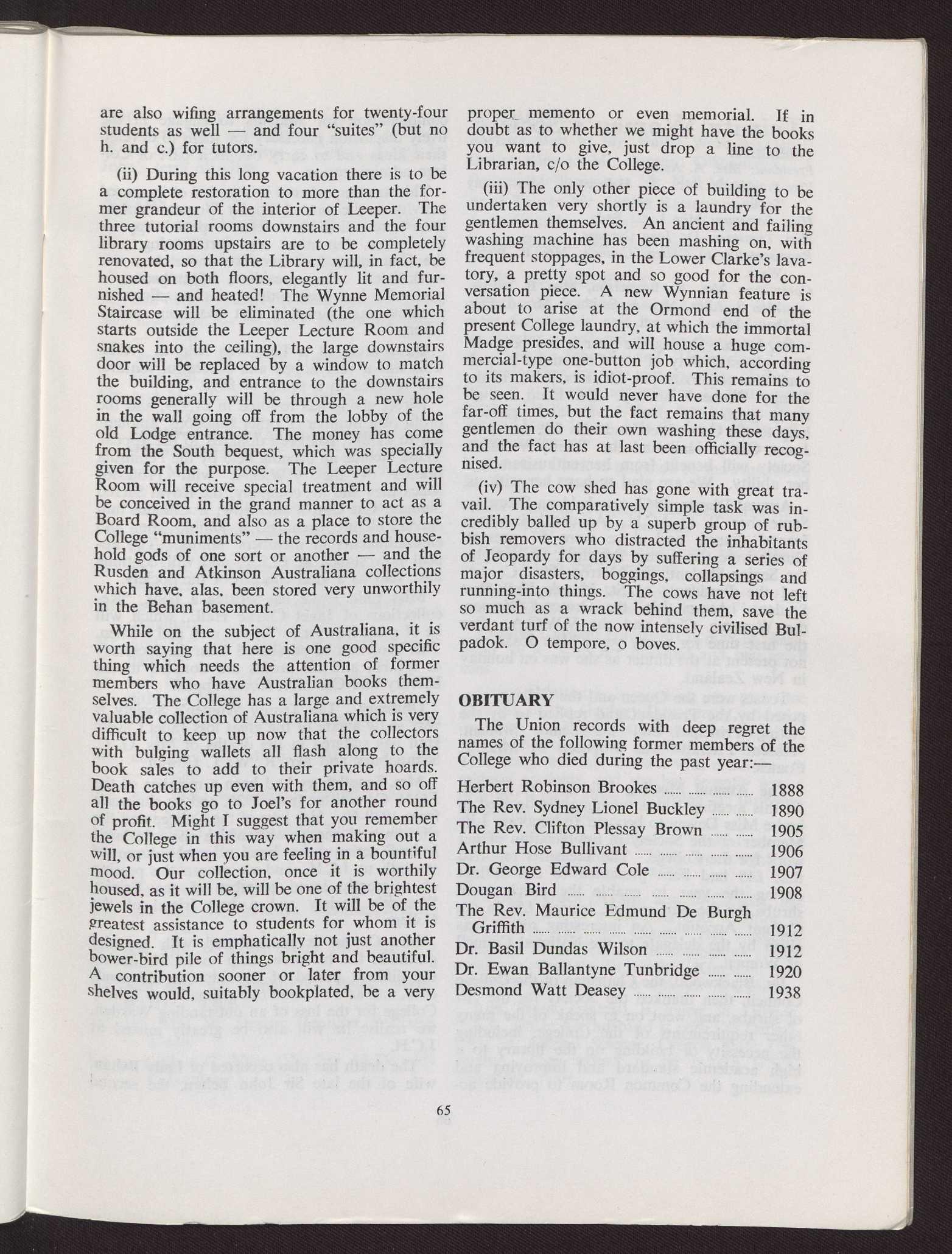
are also wifing arrangements for twenty-four students as well — and four "suites" (but no h. and c.) for tutors.
(ii) During this long vacation there is to be a complete restoration to more than the former grandeur of the interior of Leeper. The three tutorial rooms downstairs and the four library rooms upstairs are to be completely renovated, so that the Library will, in fact, be housed on both floors, elegantly lit and furnished — and heated! The Wynne Memorial Staircase will be eliminated (the one which starts outside the Leeper Lecture Room and snakes into the ceiling), the large downstairs door will be replaced by a window to match the building, and entrance to the downstairs rooms generally will be through a new hole in the wall going off from the lobby of the old Lodge entrance. The money has come from the South bequest, which was specially given for the purpose. The Leeper Lecture Room will receive special treatment and will be conceived in the grand manner to act as a Board Room, and also as a place to store the College "muniments" — the records and household gods of one sort or another — and the Rusden and Atkinson Australiana collections which have, alas, been stored very unworthily in the Behan basement.
While on the subject of Australiana, it is worth saying that here is one good specific thing which needs the attention of former members who have Australian books themselves. The College has a large and extremely valuable collection of Australiana which is very difficult to keep up now that the collectors with bulging wallets all flash along to the book sales to add to their private hoards. Death catches up even with them, and so off all the books go to Joel's for another round of profit. Might I suggest that you remember the College in this way when making out a will, or just when you are feeling in a bountiful mood. Our collection, once it is worthily housed, as it will be, will be one of the brightest jewels in the College crown. It will be of the greatest assistance to students for whom it is designed. It is emphatically not just another bower-bird pile of things bright and beautiful. A contribution sooner or later from your shelves would, suitably bookplated, be a very
proper memento or even memorial. If in doubt as to whether we might have the books you want to give, just drop a line to the Librarian, c/o the College.
(iii) The only other piece of building to be undertaken very shortly is a laundry for the gentlemen themselves. An ancient and failing washing machine has been mashing on, with frequent stoppages, in the Lower Clarke's lavatory, a pretty spot and so good for the conversation piece. A new Wynnian feature is about to arise at the Ormond end of the present College laundry, at which the immortal Madge presides, and will house a huge commercial-type one-button job which, according to its makers, is idiot-proof. This remains to be seen. It would never have done for the far-off times, but the fact remains that many gentlemen do their own washing these days, and the fact has at last been officially recognised.
(iv) The cow shed has gone with great travail. The comparatively simple task was incredibly balled up by a superb group of rubbish removers who distracted the inhabitants of Jeopardy for days by suffering a series of major disasters, boggings, collapsings and running-into things. The cows have not left so much as a wrack behind them, save the verdant turf of the now intensely civilised Bulpadok. O tempore, o boves.
The Union records with deep regret the names of the following former members of the College who died during the past year:—
Herbert Robinson Brookes 1888
The Rev. Sydney Lionel Buckley 1890
The Rev. Clifton Piessay Brown 1905
Arthur Hose Bullivant 1906
Dr. George Edward Cole 1907
Dougan Bird 1908
The Rev. Maurice Edmund De Burgh Griffith 1912
Dr. Basil Dundas Wilson 1912
Dr. Ewan Ballantyne Tunbridge 1920
Desmond Watt Deasey 1938
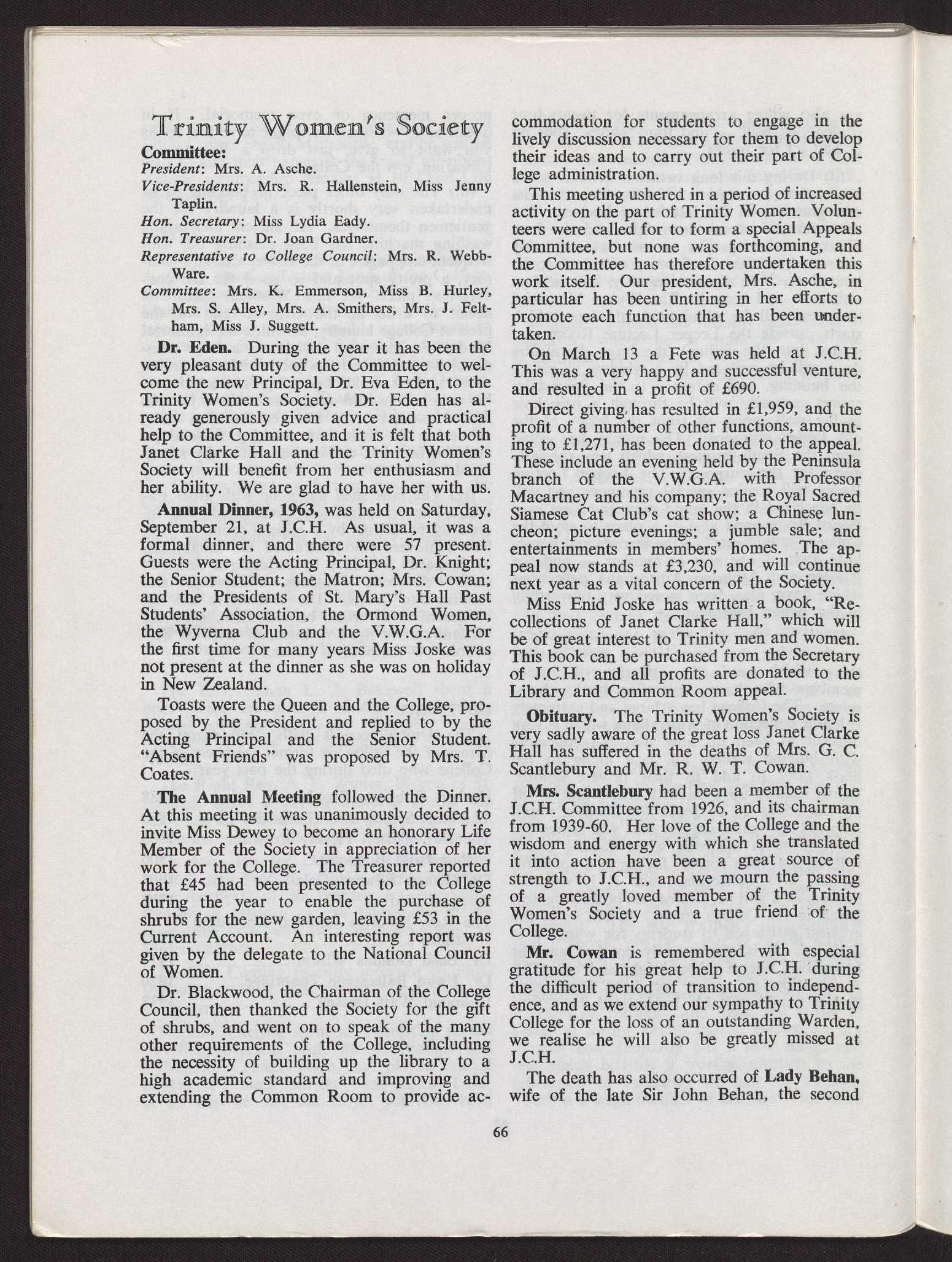
Committee:
President: Mrs. A. Asche.
Vice-Presidents: Mrs. R. Hallenstein, Miss Jenny Taplin.
Hon. Secretary: Miss Lydia Eady.
Hon. Treasurer: Dr. Joan Gardner.
Representative to College Council: Mrs. R. WebbWare.
Committee: Mrs. K. Emmerson, Miss B. Hurley, Mrs. S. Alley, Mrs. A. Smithers, Mrs. J. Feltham, Miss J. Suggett.
Dr. Eden. During the year it has been the very pleasant duty of the Committee to welcome the new Principal, Dr. Eva Eden, to the Trinity Women's Society. Dr. Eden has already generously given advice and practical help to the Committee, and it is felt that both Janet Clarke Hall and the Trinity Women's Society will benefit from her enthusiasm and her ability. We are glad to have her with us.
Annual Dinner, 1963, was held on Saturday, September 21, at J.C.H. As usual, it was a formal dinner, and there were 57 present. Guests were the Acting Principal, Dr. Knight; the Senior Student; the Matron; Mrs. Cowan; and the Presidents of St. Mary's Hall Past Students' Association, the Ormond Women, the Wyverna Club and the V.W.G.A. For the first time for many years Miss Joske was not present at the dinner as she was on holiday in New Zealand.
Toasts were the Queen and the College, proposed by the President and replied to by the Acting Principal and the Senior Student. "Absent Friends" was proposed by Mrs. T. Coates.
The Annual Meeting followed the Dinner. At this meeting it was unanimously decided to invite Miss Dewey to become an honorary Life Member of the Society in appreciation of her work for the College. The Treasurer reported that £45 had been presented to the College during the year to enable the purchase of shrubs for the new garden, leaving £53 in the Current Account. An interesting report was given by the delegate to the National Council of Women.
Dr. Blackwood, the Chairman of the College Council, then thanked the Society for the gift of shrubs, and went on to speak of the many other requirements of the College, including the necessity of building up the library to a high academic standard and improving and extending the Common Room to provide ac-
commodation for students to engage in the lively discussion necessary for them to develop their ideas and to carry out their part of College administration.
This meeting ushered in a period of increased activity on the part of Trinity Women. Volunteers were called for to form a special Appeals Committee, but none was forthcoming, and the Committee has therefore undertaken this work itself. Our president, Mrs. Asche, in particular has been untiring in her efforts to promote each function that has been undertaken.
On March 13 a Fete was held at J.C.H. This was a very happy and successful venture, and resulted in a profit of £690.
Direct giving, has resulted in £1,959, and the profit of a number of other functions, amounting to £1,271, has been donated to the appeal. These include an evening held by the Peninsula branch of the V.W.G.A. with Professor Macartney and his company; the Royal Sacred Siamese Cat Club's cat show; a Chinese luncheon; picture evenings; a jumble sale; and entertainments in members' homes. The appeal now stands at £3,230, and will continue next year as a vital concern of the Society.
Miss Enid Joske has written a book, "Recollections of Janet Clarke Hall," which will be of great interest to Trinity men and women. This book can be purchased from the Secretary of J.C.H., and all profits are donated to the Library and Common Room appeal.
Obituary. The Trinity Women's Society is very sadly aware of the great loss Janet Clarke Hall has suffered in the deaths of Mrs. G. C. Scantlebury and Mr. R. W. T. Cowan.
Mrs. Scantlebury had been a member of the J.C.H. Committee from 1926, and its chairman from 1939-60. Her love of the College and the wisdom and energy with which she translated it into action have been a great source of strength to J.C.H., and we mourn the passing of a greatly loved member of the Trinity Women's Society and a true friend of the College.
Mr. Cowan is remembered with especial gratitude for his great help to J.C.H. during the difficult period of transition to independence, and as we extend our sympathy to Trinity College for the loss of an outstanding Warden, we realise he will also be greatly missed at J.C.H.
The death has also occurred of Lady Behan, wife of the late Sir John Behan, the second
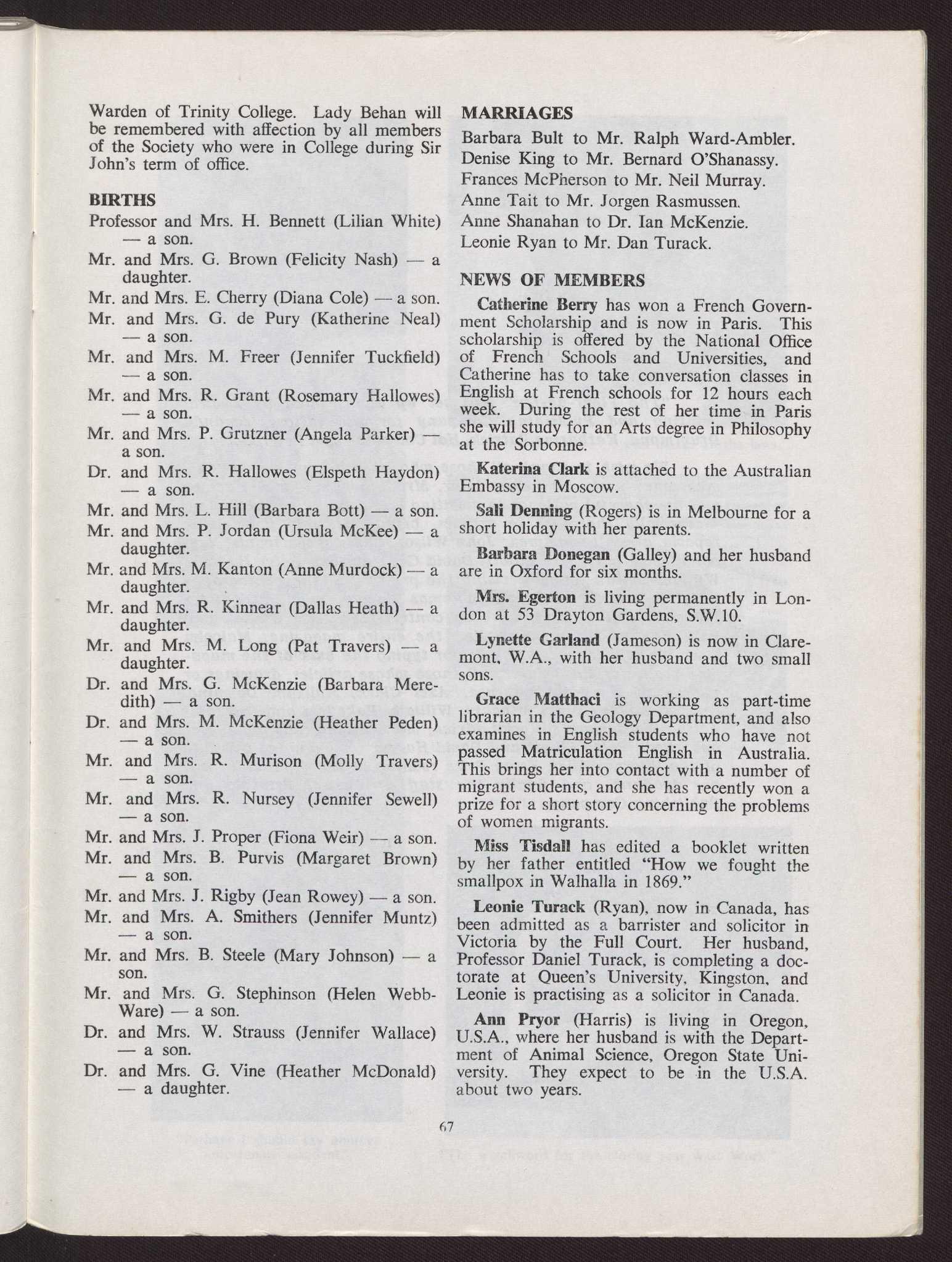
Warden of Trinity College. Lady Behan will be remembered with affection by all members of the Society who were in College during Sir John's term of office.
Professor and Mrs. H. Bennett (Lilian White) — a son.
Mr. and Mrs. G. Brown (Felicity Nash) — a daughter.
Mr. and Mrs. E. Cherry (Diana Cole) — a son.
Mr. and Mrs. G. de Pury (Katherine Neal) — a son.
Mr. and Mrs. M. Freer (Jennifer Tuckfield) — a son.
Mr. and Mrs. R. Grant (Rosemary Hallowes) — a son.
Mr. and Mrs. P. Grutzner (Angela Parker) — a son.
Dr. and Mrs. R. Hallowes (Elspeth Haydon) — a son.
Mr. and Mrs. L. Hill (Barbara Bott) — a son.
Mr. and Mrs. P. Jordan (Ursula McKee) — a daughter.
Mr. and Mrs. M. Kanton (Anne Murdock) -- a daughter.
Mr. and Mrs. R. Kinnear (Dallas Heath) -- a daughter.
Mr. and Mrs. M. Long (Pat Travers) — a daughter.
Dr. and Mrs. G. McKenzie (Barbara Meredith) — a son.
Dr. and Mrs. M. McKenzie (Heather Peden) — a son.
Mr. and Mrs. R. Murison (Molly Travers) — a son.
Mr. and Mrs. R. Nursey (Jennifer Sewell) — a son.
Mr. and Mrs. J. Proper (Fiona Weir) -- a son.
Mr. and Mrs. B. Purvis (Margaret Brown) — a son.
Mr. and Mrs. J. Rigby (Jean Rowey) — a son.
Mr. and Mrs. A. Smithers (Jennifer Muntz)
— a son.
Mr. and Mrs. B. Steele (Mary Johnson) — a son.
Mr. and Mrs. G. Stephinson (Helen WebbWare) — a son.
Dr. and Mrs. W. Strauss (Jennifer Wallace)
— a son.
Dr. and Mrs. G. Vine (Heather McDonald) — a daughter.
Barbara Bult to Mr. Ralph Ward-Ambler. Denise King to Mr. Bernard O'Shanassy. Frances McPherson to Mr. Neil Murray. Anne Tait to Mr. Jorgen Rasmussen, Anne Shanahan to Dr. Ian McKenzie. Leonie Ryan to Mr. Dan Turack.
Catherine Berry has won a French Government Scholarship and is now in Paris. This scholarship is offered by the National Office of French Schools and Universities, and Catherine has to take conversation classes in English at French schools for 12 hours each week. During the rest of her time in Paris she will study for an Arts degree in Philosophy at the Sorbonne.
Katerina Clark is attached to the Australian Embassy in Moscow.
Sali Denning (Rogers) is in Melbourne for a short holiday with her parents.
Barbara Donegan (Galley) and her husband are in Oxford for six months.
Mrs. Egerton is living permanently in London at 53 Drayton Gardens, S.W.10.
Lynette Garland (Jameson) is now in Claremont, W.A., with her husband and two small sons.
Grace Matthaei is working as part-time librarian in the Geology Department, and also examines in English students who have not passed Matriculation English in Australia. This brings her into contact with a number of migrant students, and she has recently won a prize for a short story concerning the problems of women migrants.
Miss Tisdall has edited a booklet written by her father entitled "How we fought the smallpox in Walhalla in 1869."
Leonie Turack (Ryan), now in Canada, has been admitted as a barrister and solicitor in Victoria by the Full Court. Her husband, Professor Daniel Turack, is completing a doctorate at Queen's University, Kingston, and Leonie is practising as a solicitor in Canada.
Ann Pryor (Harris) is living in Oregon, U.S.A., where her husband is with the Department of Animal Science, Oregon State University. They expect to be in the U.S.A. about two years.
(7
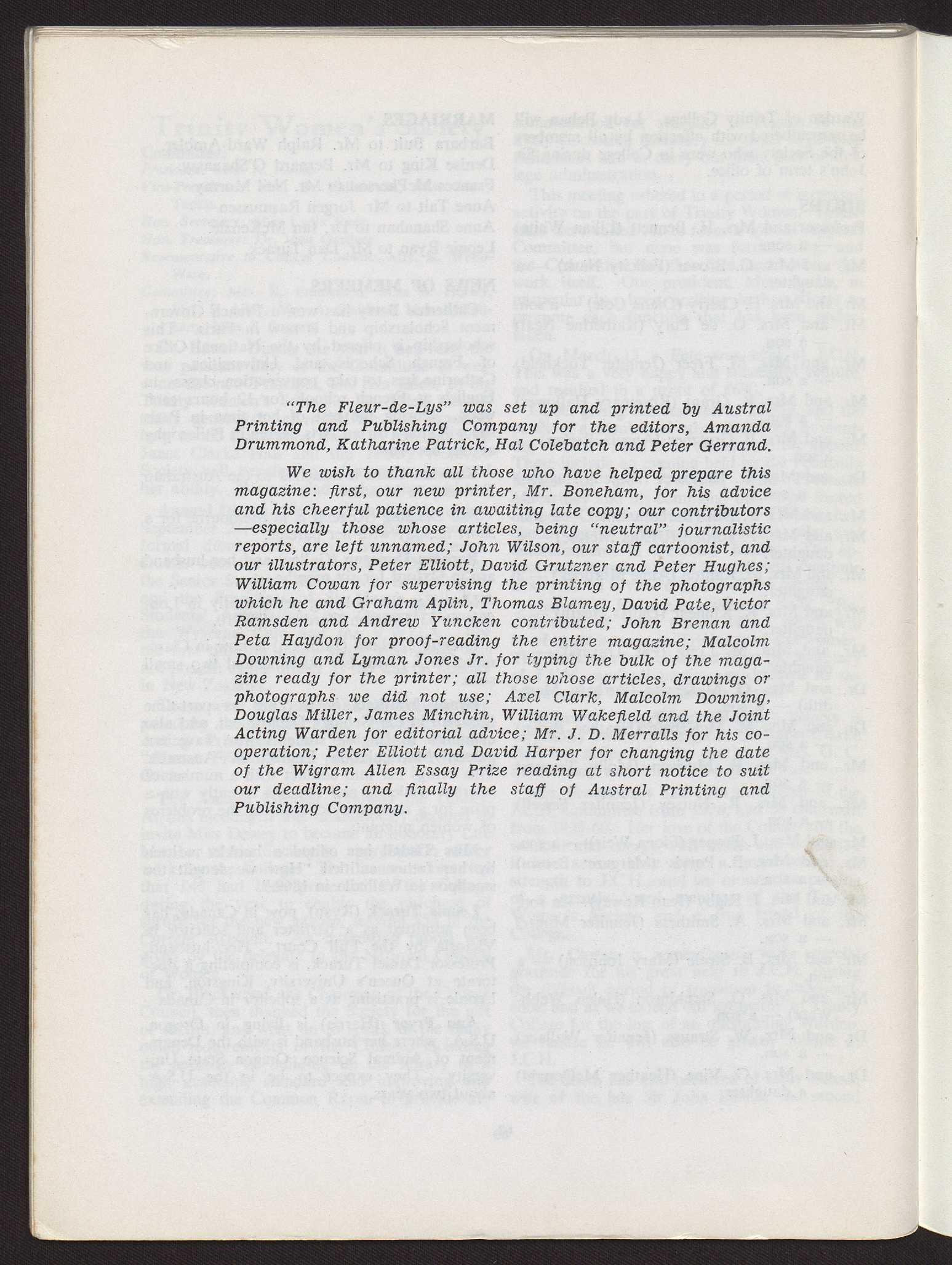
"The Fleur-de-Lys" was set up and printed by Austral Printing and Publishing Company for the editors, Amanda Drummond, Katharine Patrick, Hal Colebatch and Peter Gerrand.
We wish to thank all those who have helped prepare this magazine: first, our new printer, Mr. Boneham, for his advice and his cheerful patience in awaiting late copy; our contributors —especially those whose articles, being "neutral" journalistic reports, are left unnamed; John Wilson, our staff cartoonist, and our illustrators, Peter Elliott, David Grutzner and Peter Hughes; William Cowan for supervising the printing of the photographs which he and Graham Aplin, Thomas Blarney, David Pate, Victor Ramsden and Andrew Yuncken contributed; John Brenan and Peta Haydon for proof-reading the entire magazine; Malcolm Downing and Lyman Jones Jr. for typing the bulk of the magazine ready for the printer; all those whose articles, drawings or photographs we did not use; Axel Clark, Malcolm Downing, Douglas Miller, James Minchin, William Wakefield and the Joint Acting Warden for editorial advice; Mr. J. D. Merralls for his cooperation; Peter Elliott and David Harper for changing the date of the Wigram Allen Essay Prize reading at short notice to suit our deadline; and finally the staff of Austral Printing and Publishing Company.
"Every inch a mammal."
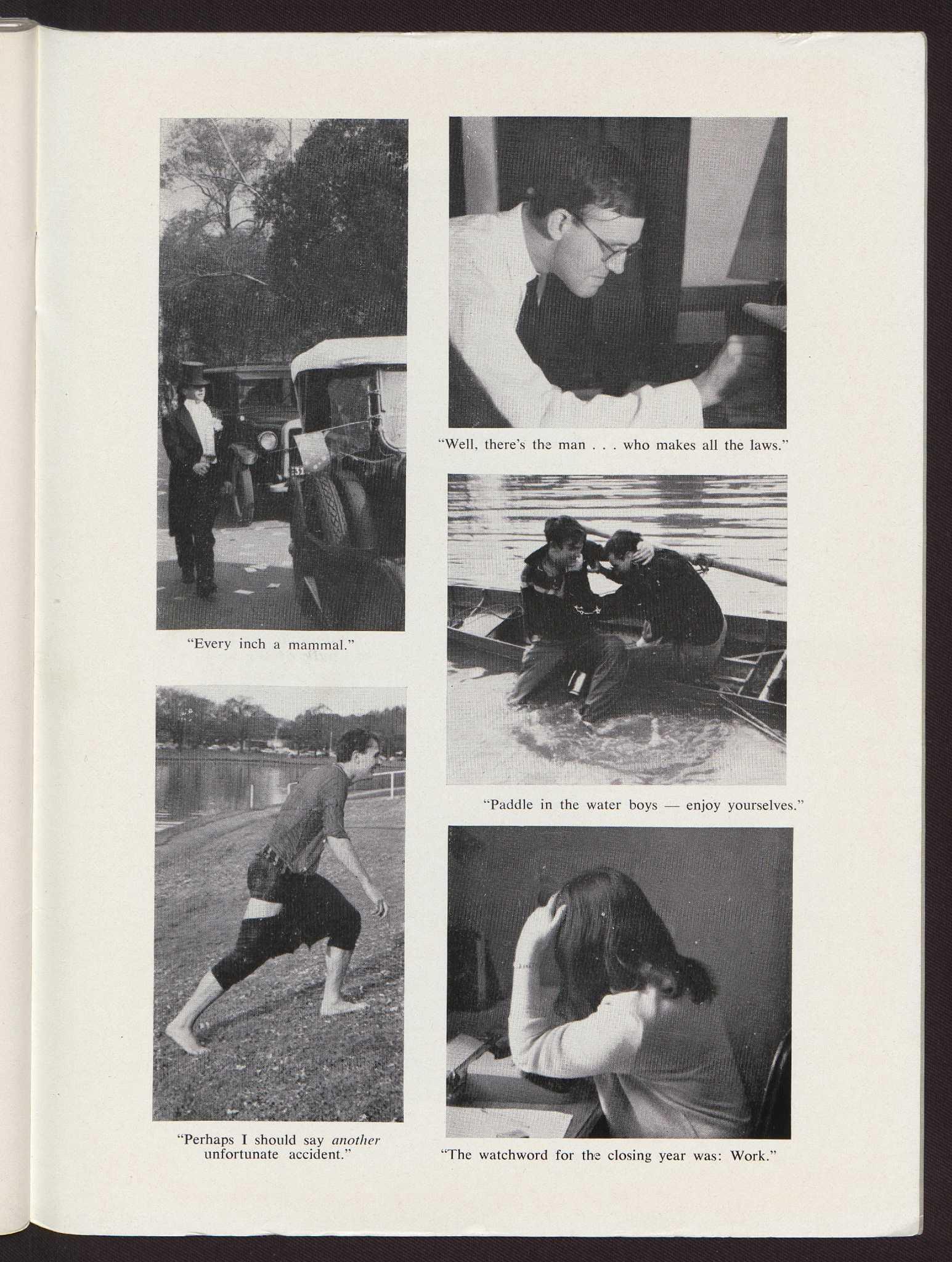
"Perhaps I should say another unfortunate accident."
"Well, there's the man ... who makes all the laws."
yourselves."
"The watchword for the closing year was: Work."
